

Bridging language barriers with honors theses



Bridging language barriers with honors theses
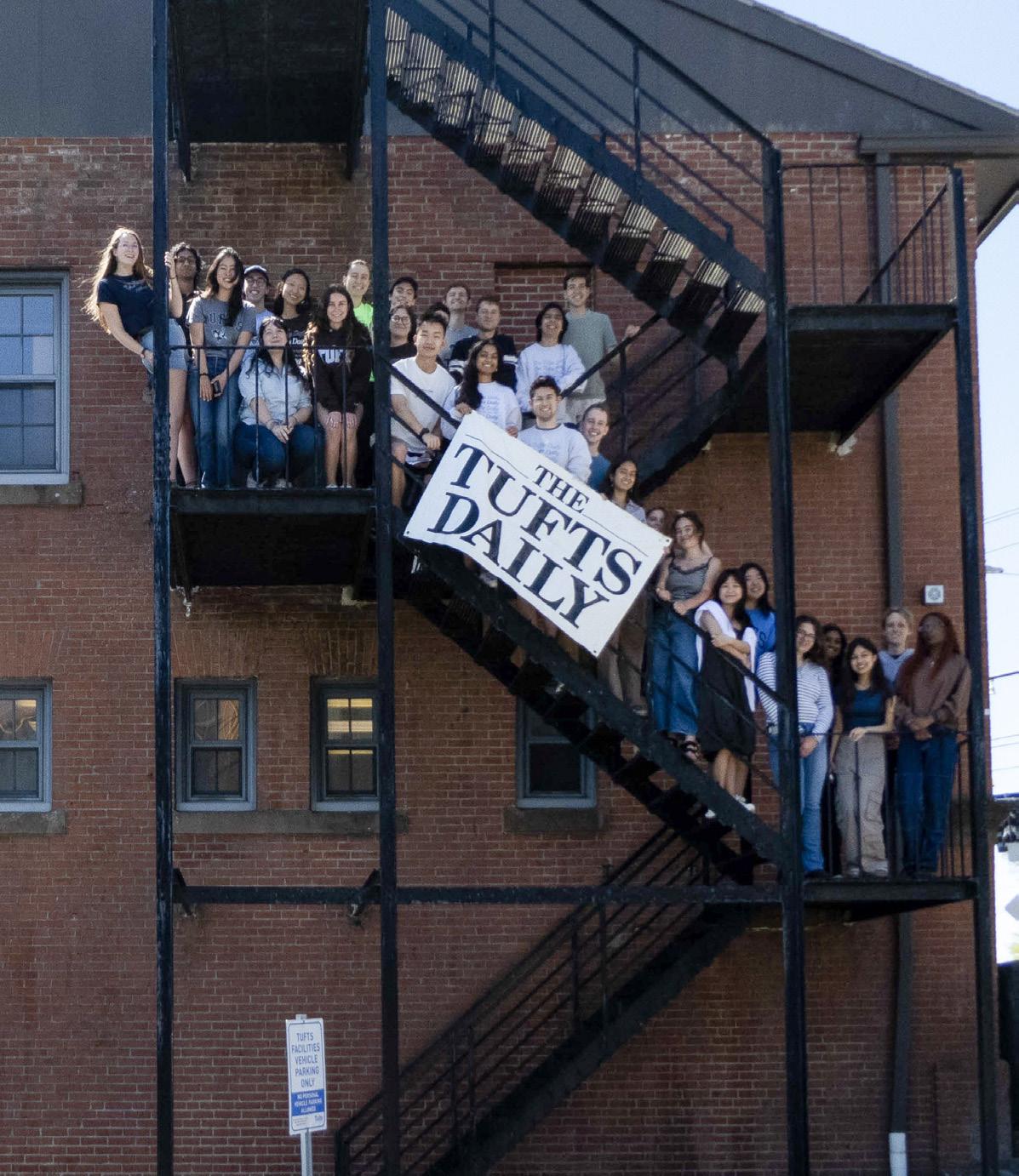
Dear Class of 2025 and the Tufts community, Congratulations on an impressive finish to your undergraduate journey here at Tufts. All of your hard work has culminated in this moment of celebration and accomplishment. Your contributions over the years, in the classroom, on the field and in the studio, have enriched the Tufts community and our collegiate experience. Thank you.
As you reflect on your time on the Hill, I hope you can look to the pages of the Daily for a record of what you and your peers have done.
This semester, the Daily closely followed the detainment of graduate student Rümeysa Öztürk and the subsequent response from the community. we reported on activism at Tufts and within the community, student statements and judicial proceedings.
The Daily published a statement by the managing board, affirming our commitment to the First Amendment and our intention to defend independent
journalism. Additionally, and importantly, you all made your voices heard. The Daily published a number of op-eds regarding the detainment authored by alumni and other members of the Tufts and surrounding communities. Looking to the future, the Daily remains committed to reporting and seeking answers on the details of the detainment.
This semester, the Daily also celebrated its 45th anniversary, examining the past 45 years with our Daily week edition; reported on the NIH funding cuts to the university; hosted a panel in which we interviewed journalists and lawyers about student journalism and constitutional rights; and debuted a column written in Spanish, the Daily’s first non-English article. This academic year, we launched The Tufts Daily Magazine, a collection of longer-form stories crafted over many months, publishing the first and second installments at the end of the fall and spring semesters, respectively.
The Daily is the epitome of a team effort, and I know that
our achievements are only made possible by our incredible leadership. I want to first thank all of the graduating seniors of the Daily — thank you for the work you have put into the Daily, your wisdom and your constant encouragement. Thank you to the executive board — Samantha, Dylan, Odessa, Gretta, Max D., Carmen, Kunal, Aaron, Lia, Rachel, Trey, Jake, Julia, Jaylin, Shea, Aisha, Josh, Evelyn, Grace L., Max A., Grace J., Max L., Matthew, Henry C., Gunnar, Josué, Julieta, Shannon, Max S., Siya, Henry B., Marlee and Arielle. Your passion and commitment are the reasons that this publication can exist. Thank you for being brave this semester and for encouraging bravery in the Daily.
Thank you to the managing board — Liam, Nate, Ellora, Erin, Alex and Claire — for your tireless leadership, advice and support. This has been an extraordinary semester, filled with unexpected challenges, and I am so grateful and glad to have faced them with you.
To the new alumni, standing on the cusp of an exciting new journey: Your Tufts education — inclusive of both a thorough study in your particular field and an exploration of a breadth of subjects — has given you the skills necessary to navigate nuance and change minds. Participating in thoughtful debate and articulately expressing one’s ideas is vital in this moment. This past semester, many alumni made a conscious effort to make their voices heard, and I hope you follow in their footsteps by submitting to the Daily through op-eds and letters to the editor.
As the year closes this May and I walk around Tufts’ campus, I see the trees have turned pink with flowers, and tulips grow at the base of lamp posts. After a long, cold winter, it finally feels like summer. To the rising sophomores, juniors, and seniors, I can’t wait to see you all again in the fall. To the graduating seniors, please keep in touch!
Pax et Lux, Arghya Thallapragada Editor in Chief, Spring 2025
University President Kumar discusses impacts of federal funding cuts, the detainment of Rümeysa Öztürk and accomplishments from the year.
On April 18, the Daily sat down with University President Sunil Kumar to reflect on his second year as Tufts’ president and discuss the shifting state of higher education.
Editor’s note: This interview has been edited for length and clarity.
Tufts Daily (TD) : President Kumar, thank you so much for taking the time to sit down with us today and inviting us into your home. we have to ask, do you really live here in Gifford House?
Sunil Kumar (SK) : Yeah, of course I do. we are in our backyard all the time. It makes for a very short commute and it puts me in the middle of campus. we like living here. It has some problems — it leaks over there, but other than that, it’s pretty good.
TD : To start out on a positive note, what would you consider your most significant accomplishments as president this year?
SK: The biggest one is the residence hall, which is going to make a huge difference to community on campus. Having 650 juniors and seniors back on campus will be very good — that’s a big achievement. The other one is less visible, but equally important: we raised about $180 million this year, and one-third of that is for financial aid. The economic diversity in the class this year will be significantly higher than last year. The rule of thumb is about $80,000 of parental income per year qualifies for the Federal Pell Grant — we used to be 12% last year, we expect to be 15% this year. That’s a 25% increase from last year’s baseline, and that’s partly funded by all the fundraising we have done.
Two other things we’ll announce, and this is particularly relevant given potential pressures on federal funding, is a private philanthropy investment for a Material Science Institute, and we’re building a new learning center for the Cummings School of Veterinary Medicine.
TD : Last fall, the admissions office reported a decrease in racial diversity for the Class of 2028, which was the first class to be admitted after the Supreme Court’s ruling on affirmative action. Has the university shifted its approach to reaching its diversity goals?
SK : First of all, we comply with the law. what that means is we don’t know the racial and ethnic makeup of the applicant pool of the class until the waitlist is closed. we have done two things to adapt to those laws. The first is putting an emphasis on economic diversity as a way to open our doors more broadly, and we will continue to try and become more affordable. The second is outreach. we do have a national reach, and we need to expand that. In particular, we have to expand in the Midwest, in the South, and from urban to rural settings as well. Those are the two strategies to ensure we can put together a class that represents all the forms of diversity in this country.
TD : we want to move towards what’s happening now, and talk about the current landscape of higher education. Currently, college campuses across the nation are facing the threat of losing millions, if not billions, of dollars in federal funding. Do you believe Tufts is facing the same risk, and does the university have a plan in place to respond?
SK : we have already faced some funding cuts. For example, our U.S. Agency for Internal Development funded projects have evaporated. we have lost about 12 research projects already; the amounts are in the $15–20 million range. we have been able to, with a few exceptions, reabsorb the people involved in those projects or find alternative sources of funding at least temporarily, to make sure that we can keep going. we have not had any, I would say, catastrophic impact of any sort.
The other two federal funding impacts have been on the facilities and administration rates for both the National Institutes of Health and for the U.S. Department of Energy. The NIH one would have cost us roughly $30 million a year. It would have quite a substantial impact on the university’s operations. we were one of the plaintiffs to push back on it in the national lawsuit, and we received a permanent injunction, which allows us time to renegotiate with the government or at least wait to see how the appeals pan out.
Our exposure to Department of Energy grants is not that high, but it still would have had a substantial seven figure impact on us, so we did file a declaration. I don’t want to speculate about future risk, but there is enough to play defense against right now.
TD : Are you in contact with other university presidents and leaders?
SK : Constantly. Next weekend, I’m in washington, D.C., with the Association of American Universities. This is 70 of the largest research universities in the country. we both learn from each other, as well as do things collectively, like the NIH and Department of Energy lawsuits. The Boston-area university presidents keep in touch and we try to learn from each other.
TD : Have those conversations influenced any of your responses to the impacts of federal funding that have already taken place?
SK : Collective action wherever possible is more impactful than unilateral action. Now, there have been certain circumstances, like the detainment of [Tufts graduate student] Rümeysa Öztürk, which are unique to us, but wherever we can find common cause, I’m of the opinion that we should do things collectively.
TD : How dependent Tufts’ current operating budget is on federal funding?
SK : we get somewhere between $100–175 million a year from the federal government. So the short answer is, we are quite dependent on federal funding. Our overall revenues are about $1.3 billion
a year, so about 15% of our revenue comes from the federal government for research, primarily. If all of that were to be turned off, which is speculation, our endowment could not cover that.
Our endowment is about $3 billion so it spins off about $130 million a year. Most of it is already pre-committed to things like financial aid. So if you look at the uncommitted portion of the endowment period, it is a small fraction of what it takes to do research. If all of the federal funding were to be dried up, we don’t have a way to substitute. It is going to have a major impact on us.
TD : Considering the fact that the university’s endowment probably wouldn’t be able to withstand the cost that the university has, how could that impact Tufts’ response to a list of demands that the administration could send?
SK : It depends on what is demanded, but I think our past actions have suggested that we will continue to defend our mission, our values and our community. And the other thing I want to reassure you is we’re not going to, regardless of the difficulties we may face in the coming year, arbitrarily increase tuition or change anything in the undergraduate program.
TD : In the light of the detainment of Rümeysa Öztürk as well as the revocation of student visas, a lot of community members have called for you to stand against the actions of the federal government. we were wondering if you could walk us through how you came to the decision to write the affidavit in support of her legal case.
SK : First of all, when people write to me, I hear them. Sometimes acting in the moment may make us feel good, but may not be the maximally effective way. The reason we picked the affidavit as the route was because we wanted to get the facts out there in a very forceful way. To have a sworn affidavit in my name was a forceful way to make the facts of the case apparent in a way that would help her case maximally. It was important to get the fact out that the op-ed was consistent with our statement of free expression and violated no codes of conduct.
TD : There are some people who are hoping that the university could do more in terms of helping Öztürk fight her legal battle. Is there more that the university could be doing?
SK : we are in touch with her legal council when they have requested things we can do. For example, the university also helped coordinate the letter written by 38 members of Congress. we’ll continue to help in whatever way we can.
TD : How is the university planning to ensure the safety of its international students, and also the incoming international students who might now feel more apprehensive about coming to Tufts?
SK : There are three components to our support for international students.
First is information and guidance. The International Center does both group town halls, and individual counseling sessions to make sure we provide the right guidance. Second is to make resources available, both internal and external resources, and these could range from on-campus housing where available to support for transportation to outside counsel. And the third is to ensure that international students can continue their studies, even if they are facing temporary difficulties in securing visas.
TD : we see that university presidents, including yourself, are under really intense scrutiny right now. what is the role of a university president at a time like this?
SK : The public scrutiny is the highest it’s ever been in my career, and I’ve been on a university campus, and only on a university campus, since I was 18 years old. In calmer times, it is easy to interpret the president’s job as one of management. In times like this, you have to be a leader. There’s a distinction between leadership and management, and in particular, as a leader, you have to make sure that our commitment to our mission does not falter, and you have to make sure that everybody in the community continues to be resilient in doing the things we care about, like educating the future leaders.
I do town halls for faculty and staff, three of them this month alone. I always end those by saying, “Keep calm and eat dosa.” If you don’t know what dosa is, look it up. The reason I say that first, is that it’s nice to see 1,000 people smile, and the second is to remind them that we have a commitment to future generations. This isn’t about the next six months or the next four years. The university is 175 years old, and it survived wars and pandemics and much worse, so we have to stay committed to what the university was founded for, and so that is my role.
TD : Tufts has yet to officially instate a policy of institutional neutrality, and we know that the university has been considering it for quite a while now. what progress has been made to determine the university’s stance on institutional neutrality?
SK : we’re very close to a potential policy, or at least a statement. Last fall, the provost set up a working group to study this. They met with students, they met with faculty, they consulted broadly, and what they have come back with is not so much a statement on a policy on institutional neutrality, but a policy on plurality.
On many of these issues there are lots of opinions on campus. The working group’s recommendation is that you should use the principle that you want all these voices to be heard, so you will stay silent, unless it’s essential. The only reason it’s not yet official is this requires a discussion and adoption by the Board of Trustees, which they will do at their next board meeting.
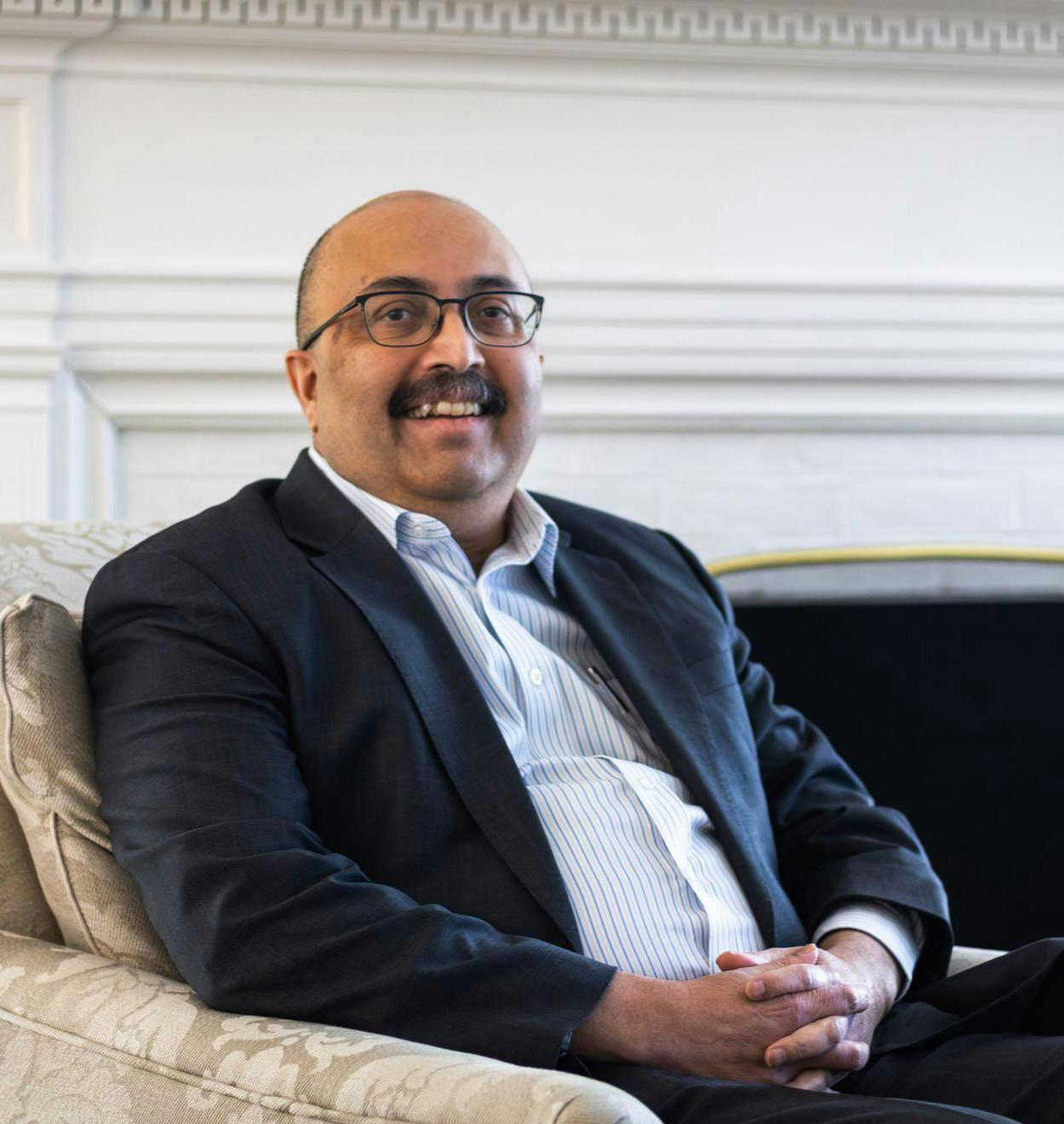
I’m very happy with where that ended up. It’s not a statement that says, “Even if your funding is being cut, you have to keep your mouth shut,” right? It’s a statement that says, “If it’s directly relevant to our mission and our campus, we’re free to defend ourselves or to weigh in on ways that will be in the university’s interest.” I don’t intend to be silent on issues where it’s important for me or the leaders to advance the university’s cause, but it does limit where I can speak as a whole.
TD: what determines whether an issue is essential for you to speak on or not?
SK : This is where you have to exercise judgment. what the statement is saying is, exercise that judgment with great care. You can’t write a formula that says “speak on x, but not on y.” we don’t know what’s coming in six months.
TD : Is that a judgment call that’s made by you specifically, or is that a group of people?
SK : I always consult broadly with the deans and the senior leadership of the university. I’m free to speak on
something as Sunil Kumar, professor of electrical engineering. But in the case of the president, that’s too fine a line to draw. when I say something personally, it’s very hard for that to be interpreted as, “Oh, that was just him as a person, not as president.” So I have to be more careful.
TD : w here do you see Tufts in five years?
SK : I want to start by talking about what I don’t want to see changed. Every time I talk to alums, there’s such a deep affection for the place. There’s some secret sauce here that you don’t want to break — the community — that is what makes Tufts special. I don’t want us to become like any other institution. People sometimes ask me that question, “ what university would you like Tufts to be like?” I don’t want it to be like anything else — I want it to be like Tufts.
But, I do want three things to change. First, it needs more resources and it is my job to develop those resources. The second is to use those resources to open our doors even more widely than we can right now because we are becoming less
affordable to the middle class in particular. I would like to invest even more in student life on campus. And finally, there are parts of our research mission where we can be and are world-class and we need to keep investing in those, regardless of all of these problems.
TD : what do you plan to accomplish next year?
SK : Regarding our affordability, we would like to push hard to publicly signal that we have become more affordable and raise the money in order to do that. we are going to launch a pretty major initiative that we are calling “Student Success” which will have career services and advising, complete wraparound services from pre-admission to advising to mental health to career services as a complement to the academic processes.
we would want to raise more money than we did this year, particularly around financial aid. we are still tr ying to figure out what better we can do for student life. The Pop-up Pub seems to be working — people are complaining that it
isn’t open long enough, so that’s always a good sign. Finally, we will have a couple more research centers funded by non-governmental sources because it is a way to diversify our research funding.
TD : Finally, what message or advice do you have to the graduating class?
SK : Don’t be afraid of this moment. Moments like this come and go — they’ve got this. Looking back in my own life, there’s plenty of opportunities where I could’ve done something that could have made a material difference and made the world just that little bit better. They were all small, but still I could have made a difference and I chose not to because I didn’t believe I could. They have to believe in themselves. I think their Tufts education has prepared them to be leaders. It is okay to fail, but if you have an opportunity, you have to try.
The last is don’t forget what it was like at Tufts. You can excel while being good, doing good and taking care of your neighbor. That’s got to be a lesson for all of life: You don’t have to be a jerk to excel. 100% guaranteed.
The Tufts Community Union Senate confirmed the 2025–26 school year budget for student organizations to be roughly $3 million at its budget meeting on April 20. The budget set is slightly higher than the budget of $2.9 million for the 2024–25 school year.
The budget increase comes from an internal reallocation of resources and the continued surplus funding from the COVID19 pandemic that paused most on-campus activities, according to rising senior Dhruv Sampat, outgoing TCU treasurer and incoming TCU president.
“That change is reflective of growing student programming, record level of activities on campus and a growing number of clubs that we have on campus,” Sampat said.
Sampat explained how the TCU Treasury prioritized understanding club needs by using data from the Office of Campus Life to see the attendance and participation levels of clubs’ meetings and events, which informed whether an organization might need increased budget.
Student organizations are broken down into councils that focus on specific themes, such as pre-professional groups or
publications. Each council receives a budget that is allocated to all of the clubs within that council. Councils 1 and 2, the cultural and engineering councils, saw the largest increase — about 10–15% — a response to rising interest in engineering clubs and a continued desire to expand community spaces for Tufts students.
with increased budgets for certain councils, other councils remained steady, barring slight increases to adjust for inflation.
However, with reallocation of funds across all organizations, Sampat emphasized his desire to support smaller and newer clubs.
“The hope with newer organizations is that they have started because they have identified something here at Tufts that is missing, right? whether that’s a culture, whether that’s a community, whether that’s a pre-professional group,” Sampat said.
“For newer organizations, it’s very important to realize that, just because they’re new, doesn’t mean that they don’t have the same passion and the same vision that some of our existing and preexisting organizations have had.”
Rising junior Amelia Farrar, outgoing associate treasurer and incoming parliamentarian, oversaw Council 3, the media and publications council, which saw
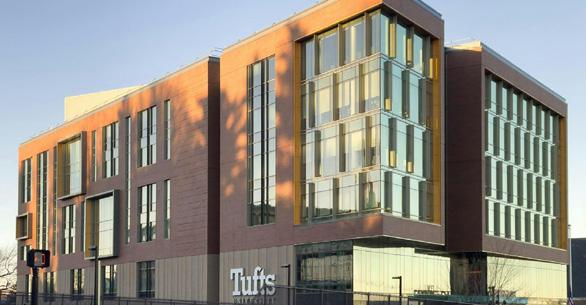
a $5,000 increase to its budget from this year. when dividing the budget, Farrar focused on providing each club with enough to be able to achieve their mission statement. “My goal was, if they wanted to have more [publications] or production in their clubs and more activity in their clubs, to do my very best to get them that,” Farrar said.
The Treasury surpassed its usual supplementary funding budget this semester, primarily due to bookmarks, a type of funding request that organizations can submit. Bookmarks are costs that are expected to be incurred but that don’t have a specific cost, such as hotel rooms or plane tickets.
According to Farrar, there was a high number of bookmarks that led to unforeseen costs. “we were seeing a lot of clubs last year
that had quite a few bookmarks that we thought they could have reasonably estimated during the budgeting process or that our Allocations Board members could have had them estimate, but that never happened.”
The Treasury proposed a soft cap of two to three bookmarks per organization to avoid unexpected spending for next year.
Rising junior Brendan French, the other outgoing associate treasurer, will be the TCU treasurer for the next school year following Sampat’s uncontested election for TCU president on April 28. French proposed several priorities for the upcoming year, particularly focused on simplifying and supporting student organizations in the budgeting process.
One issue French saw was information gaps that formed during leadership changes in
clubs. “There [aren’t] necessarily always robust systems in place within clubs to help with that transition of power, especially for the Treasury,” French said. “A good amount of the treasurers they’re meeting with are new — they don’t really know too much about the Treasury and the budgeting process.”
Sampat shared that the budgeting process is always evolving. “I also would like to acknowledge that it is an imperfect process,” Sampat said. “we try to be more cognizant and more transparent by sharing meeting notes with [the] Senate and with [Allocations Board] members. But you know, it is a very complex and intricate process that sometimes can feel a little bit overwhelming.”
A major long-term project for the Treasury is to digitize the budget request process for student organizations. The goal with this change is to make the process clearer and more intuitive for student leaders.
“what I hope is that we are able to streamline some of the Treasury processes,” Sampat said. “we’re trying to work with student organizations to constantly improve and reinvent ourselves. And it is always our intention to try and better ourselves, even if something has not worked out in the best way that it’s supposed to.”
For rising senior Dhruv Sampat, it’s been a moment long in the making. After winning the 2025 TCU Presidential Election a few weeks ago, he will serve as the president of the Tufts Community Union Senate for the 2025–26 academic year. Involved in student government since high school, Sampat will culminate years of experience serving his fellow students, including two years managing the $2.9 million Student Activities Fund as TCU treasurer, with this position.
Sampat has been a senator since his first year at Tufts, after stumbling across the TCU table at the Student Organizations Fair. when Sampat saw the changes he could make in students’ lives, particularly making it easier for students to join campus clubs, he began to enjoy the role. He cites former TCU President Jaden Pena (LA’23) as an inspiration.
Soon after, Sampat became treasurer, where he learned valuable lessons about the challenging parts of leadership.
“Student activities are something that people are very passionate about and [make] up a big chunk of their time at university. So when you have to give people hard news, it’s obviously not the best day for you or for them,” Sampat said.
Sharing bad news is something Sampat has unfortunately
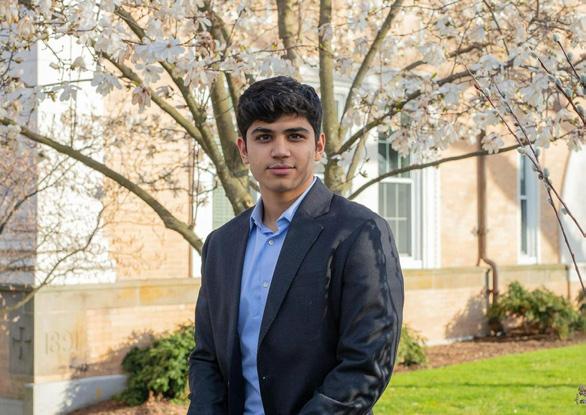
had to do recently. After supplementary club funding ran out with a few weeks left in the semester, senators decided to deny requests that had not been bookmarked the previous year.
“There was a constant pressure between letting students achieve what they wanted to do and us having that limitation on resources, in terms of fiscal resources,” Sampat said. “I don’t think there was a negative impact of that pressure whatsoever. Instead, I think it just made the Senate more cognizant and made the student body more cognizant that there are very limited resources.”
Despite the supplementary funding crunch, Sampat underscored the strong position of the Treasury budget overall.
According to Sampat, the budget currently has a “very healthy
surplus” despite providing the highest amount of supplementary funding in Treasury history. we were able to honor all the bookmarks that we set for most clubs. Any club that we told down the line, ‘we’re going to give you money through that bookmark,’ we were able to honor that,” Sampat said. “But towards the end of the year, we certainly had to take some really difficult calls.”
Sampat said that moving forward, clubs that rely on supplementary funding will have their needs built into their yearly budgets, reducing the burden on the overall fund.
In the role of TCU president, Sampat sees a chance to expand his impact as a representative and cater to students as individuals.
Sampat’s top three priorities are tuition transparency,
accessibility of student infrastructure and increased preprofessional opportunities.
“I think I would deem myself to be successful if I set the foundation for those projects to be carried forward, whether in the next year or the year after that,” he said.
As the cost of attendance at Tufts continues to rise, students are wondering where their money goes. Sampat envisions semesterly town halls with University President Sunil Kumar and other upper-level administrators to break down tuition costs, something he hopes to start as soon as next semester.
“The charges that [students] incur while they’re at Tufts become so burdensome that it can really take away from their experience and become barriers to entry,” Sampat said.
Sampat also sees free printing for all students during exam season and laundry stipends for low-income students as a critical part of a larger effort to make resources more accessible. He added that he plans on continuing to utilize the Student Support Fund and leadership stipends.
Sampat sees the Career Center as his most important partner to improve pre-professional opportunities. He also sees room for collaboration on alumni engagement by giving alumni more incentive to stay in touch with Tufts students and aligning the
work of Tufts’ pre-professional clubs with the Career Center.
“Right now, there’s no exchange of information between our pre-professional societies that the Senate funds and the Career Center itself,” he said. “I think joining those two forces will also have a big impact.”
In Sampat’s experience, one thing will be essential in achieving these priorities: understanding Tufts’ administrative bureaucracy.
“If you know who to speak with and you can speak with the right person within this massive administration, half the job gets done,” Sampat explained. “I’m certain that if we’re able to find the correct mentors, then we will be able to achieve a lot of these accessibility-related goals.” when asked how he would manage his priorities alongside other Senators’ projects, he said wants to give them the best support to be able to pursue their own goals.
Sampat wants the Senate to be a resource that students feel they can go to for guidance and assistance for anything they need.
“I want Senate to be the first thing that pops into students’ minds when they don’t know where to go and they need guidance or help with anything,” Sampat said. “I want people to think about us as a resource and be comfortable enough to come forward and engage with us, whether formally or informally.”
Editor’s note: The 2021–22, 2022–23 and 2023–24 recaps in this article are reprinted from the 2024 Commencement Issue of the Daily, with light edits.
2021–22
The Class of 2025’s first year at Tufts saw the return of majority in-person classes, extracurricular activities and study abroad programs, though new variants of COVID-19 left many pandemic guidelines in place, like masking indoors and routine testing.
To facilitate a return to in-person activities, the university required that all students arrive at Tufts fully vaccinated, assisting international students with vaccinations if they were not yet available in their home countries.
However, not all students were able to live on campus. Approximately 100 first-year students were assigned housing at the Hyatt Place in Medford.
The first week of academic classes was marked by an act of hate. A student reported the removal of a mezuzah — a traditional Jewish symbol — from their doorpost in early September. Later that month, another mezuzah was stolen, and Black Lives Matter posters were found purposefully torn down on campus.
The beginning of the academic year also saw a number of changes in leadership, with the arrival of Dayna Cunningham as the new dean of the Jonathan M. Tisch College of Civic Life, Kyongbum Lee as the interim dean of the School of Engineering and Yolanda Smith as the executive director of public safety.
Tufts students rallied around local campaigns leading up to the 2021 mayoral elections in Medford, Somerville and Boston on Nov. 2. Somerville saw the election of Katjana Ballantyne, its first new mayor in 18 years, while Boston elected Michelle wu, who is the first woman and first person of color to hold the position in the city’s history.
The university announced its intent to establish an Indigenous student identity center under the Division of Student Diversity and Inclusion in November, hiring Vernon Miller as its director
in February. In April, the community voted in favor of a referendum proposed by the Tufts Community Union Senate to add an Indigenous community senator seat to its organization.
After years of construction, the Joyce Cummings Center finally opened its doors to students in late November. The six-story building, for which planning began in 2015, houses the computer science, economics and mathematics departments, and is regularly used to host large-scale student gatherings.
The fall semester was cut slightly short when a December outbreak of the omicron variant of COVID-19 led the university to move all finals online after Dec. 17. The first three days of the spring semester were held remotely due to high caseloads in January.
In February, Tony Monaco announced his intent to step down as university president during the summer of 2023, marking the end of a 12-year tenure. Tufts later announced that Sunil Kumar, formerly of Johns Hopkins, would move into Gifford House and take the reins of the presidency from Monaco.
Following Russia’s invasion of Ukraine on Feb. 24, students rallied to support Ukraine by protesting, compiling resources on the war and putting on a concert to raise money for medical aid to the country.
Tufts saw yet another increase in the number of applications and offered admission to a record-low 9.7% of applicants to the Class of 2026. To compensate for a lack of housing for these incoming first-year students, the university announced its intent to build temporary, dorm-like structures in place of The Mods on the tennis courts on Professors Row.
The working Group on TUPD Arming announced its recommendation on March 29 that the Tufts University Police Department alter its arming status to a ”hybrid model,” comprising a combination of armed officers and unarmed security professionals. This announcement came a year after five workstreams released report recommendations on how the university can become an anti-racist institution.
The Tufts University School of Medicine announced plans to open

a new Center for Black Maternal Health and Reproductive Justice on April 8. The center works to address and combat structural racism experienced in the health care field.
The Class of 2025 got to experience their first Spring Fling — Tufts’ first since 2019 — featuring performances from Tufts student Ella Jane, BIA and Aminé. Senior week also featured in-person events for the first time in three years.
The Class of 2022 celebrated Commencement on May 22, while the Class of 2020 had an in-person ceremony on May 27. Award-winning scholar Erika Lee (LA’91) delivered the commencement address for the Class of 2022, while Neil Blumenthal (LA’02), co-founder and co-CEO of the eyeglasses company warby Parker, delivered the commencement address for the Class of 2020. 2022–23
Students returned to campus in the fall 2022 semester without COVID-19 as a major concern for most community members. Mask mandates were nixed, and testing requirements abandoned as, for the first time since the Class of 2025 matriculated, students were able to gather without the looming possibility of a school-mandated, multiday isolation.
To that end, the university eliminated the units of modular quarantine housing that, for two years,
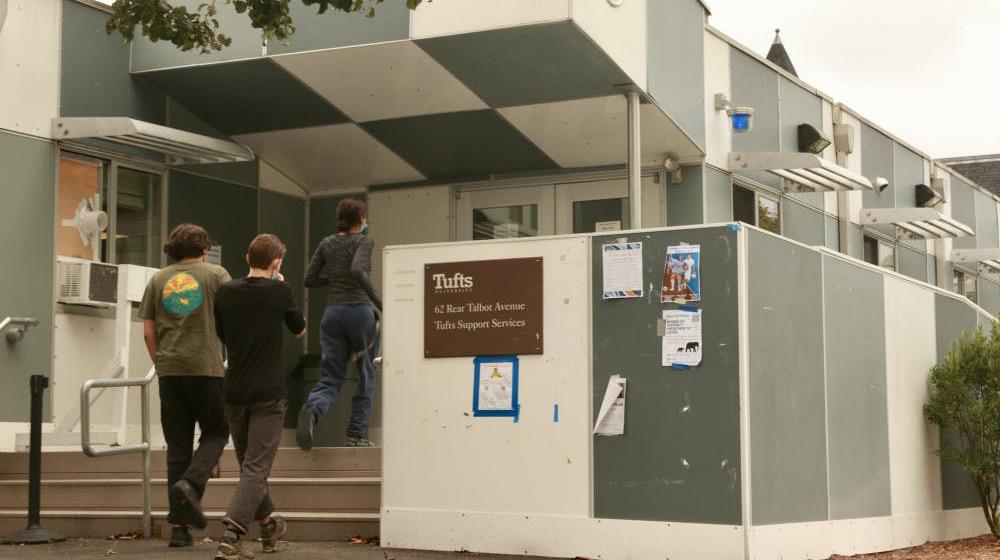
sat atop the varsity tennis team’s former home, replacing them with an archipelago of first-year housing stock. The modular-style dorms, which accommodate 150 firstyears, were branded as “The Court at Professors Row.” As the university plows forward in its plan to grow enrollment, the Courts remain a standard among other, more traditional first-year living arrangements — but likely only until 2027, when the university is projected to finish construction of a multi-story residence hall on Boston Avenue.
Campus expansion was a major theme during the Class of 2025’s time at Tufts.
Following years of construction and myriad delays, the MBTA’s Green Line Extension opened its doors on the final day of classes in December. Dozens of students packed the station before dawn to get a seat on the first train as it rolled toward East Somerville and into downtown Boston. Sens. Elizabeth warren and Ed Markey, D-Mass. — along with former Massachusetts Gov. Charlie Baker — headlined the station’s long-awaited ribbon-cutting ceremony later that morning, in a celebration largely symbolic of the university’s geographic expansion over the last decade.
Tufts also broke ground on — and later opened — a new baseball field named after Sol Gittleman, former provost and professor emeritus. Renovations began at Eaton Hall, the historic quad-facing academic building that reopened in the spring 2025 semester.
The Class of 2025’s second year was also marked by a string of racist and antisemitic incidents in a pattern that has grown familiar to the community. A club sports team was suspended and faced an investigation by the university after some of its members were allegedly involved in an antisemitic incident at a competition off campus. And in April, racial slurs sent via a chat box on Zoom interrupted a Solomont Speaker Series event with the rapper Dee1. Monaco condemned both incidents and reiterated the university’s commitment to anti-racism and the fight against antisemitism.
Attacks against Tufts’ work to fight racism continued during finals week in the fall, when seven bomb threats were sent to a flurry of university departments from an unknown emailer over the course of nine days. The threats, listing “anti white racism” as one motivator, prompted evacuations from residence halls, the Mayer Campus Center, Dowling Hall and a spate of academic buildings, pushing finals online.
Tufts’ upper leadership faced criticism after a pair of Daily investigations uncovered a series of high-level departures and a culture in two administrative departments that former staffers described as toxic. The diversity office opened the academic year with a third of its positions empty after two of its chief officers quietly departed in August. Their departures followed a restructuring in the provost’s office — which oversees the university’s diversity work — and an alleged consolidation of administrative power.
The admissions office, too, was reported to be under investigation by an outside law firm following current and former staffer allegations of racist and antisemitic behavior on the part of the dean, JT Duck. The investigation came as the attack on affirmative action reached the Supreme Court and as the university pledged its support for Harvard University and the University of North Carolina in their ongoing legal battle against the group Students for Fair Admissions. Dean James M. Glaser of the School of Arts and Sciences and Kyongbum Lee of the School of Engineering, respectively, later shared that a thorough internal investigation into the Tufts admissions office found no evidence of discrimination by Duck.
Tufts resident assistants announced their intention to unionize in November. After the administration declined to voluntarily recognize the United Labor of Tufts Resident Assistants, RAs voted 99–3 with 72% turnout to form a union. ULTRA engaged in
negotiations with the university over the course of the spring semester but would not ink a contract until the following year.
It was another record-breaking year for undergraduate admissions, when Tufts delivered offers to 9.5% of applicants to the Class of 2027, the lowest acceptance rate on record. The pool was historically diverse and represented nearly a 50% spike in applications from 2020, when the Class of 2024 was admitted.
Also in the 2022–23 school year, Kyongbum Lee transitioned from interim dean to dean of the School of Engineering, Scheri Fultineer took the helm of SMFA and Howard woolf announced his retirement as Experimental College dean following 40 years in the office.
Spring Fling was headlined by the 2010s pop sensation Flo Rida,
served as provost and senior vice president for academic affairs at Johns Hopkins University, following stints at the University of Chicago Booth School of Business and the Stanford University Graduate School of Business. 2023–24
The Class of 2025’s junior year began with a flurry of union organizing on campus. Amid contract negotiations with Tufts, the newly unionized undergraduate resident assistants went on strike on firstyear move-in day to demand that Tufts pay them a stipend. weeks later, Tufts agreed to compensate the RAs with 80 meal swipes and a $1,425 stipend each semester.
On Sept. 25, the union voted by an overwhelming majority to sign its inaugural contract with the university. The contract represents the culmination of seven months of negotiations and will be valid for three years.
invasions of Gaza, students staged a series of protests, walkouts, sit-ins and die-ins to call attention to the mass killings of Palestinians.
At one protest outside Ballou Hall on Nov. 17, students alleged that TUPD officers physically and verbally harassed them and made them feel unsafe. The protest ended with 18 students facing disciplinary violations and one losing their study abroad privileges for blocking the doors to Ballou in violation of university policy.
Eleven student groups founded the Coalition for Palestinian Liberation at Tufts to call for an immediate ceasefire, now totaling over 40 member organizations. The coalition also demanded that Kumar condemn the genocide in Gaza and that Tufts divest from Israel and end all partnerships with Israeli institutions.
In a series of messages to the university community, Kumar
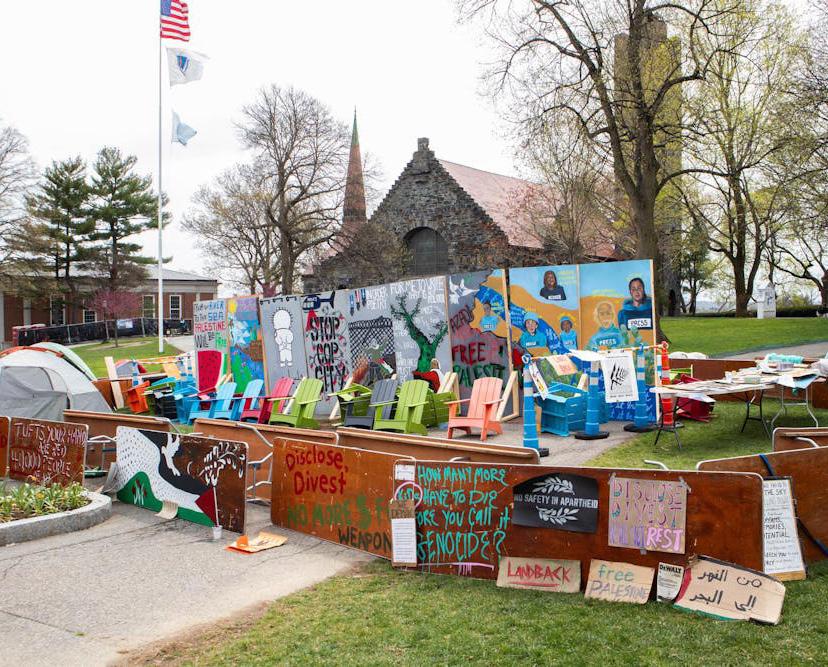
who arrived more than an hour late after many students had already left the annual music festival. Flo Rida was preceded on stage by the DJ trio Cheat Codes, TikTok music star Charlie Curtis-Beard and the Tufts student band Fease.
The performances came a day after the Class of 2024’s Arielle Galinsky, the TCU Senate vice president, declared victory in the race for TCU Senate president. She succeeded Jaden Pena (LA’23).
The final weeks of the Class of 2025’s sophomore year were marked by an end to the national COVID-19 emergency — and to the university’s vaccination requirement. The move represented the elimination of the last of Tufts’ major COVID-19 mitigation policies, which defined much of the graduating class’s tenure at Tufts.
At the 2023 Commencement ceremony — Monaco’s last as university president — United Nations Deputy Secretary-General Amina J. Mohammed delivered the keynote address. Mohammed is known for her work fighting climate change.
Monaco passed the presidential baton to Kumar on July 1, 2023. Kumar is Tufts’ 14th president and the first person of color to fill the position. Before coming to Tufts, he
Tufts Dining workers, represented by the labor union UNITE HERE Local 26, also won a major collective bargaining victory at the start of the school year. In September, they signed a new contract with Tufts guaranteeing them a $9.92 increase to hourly wages to be rolled out over the next 4 ½ years.
Unionized SMFA part-time lecturers reopened contract negotiations with Tufts in the fall, calling for pay parity with part-time lecturers in the School of Arts and Sciences. SMFA Dean Sheri Fultineer announced in October that those negotiations had concluded, without disclosing the terms.
Graduate student workers in the School of Arts and Sciences also raised their voices to demand higher pay and better benefits. Represented by Service Employees International Union Local 509, the graduate students entered negotiations over — and subsequently signed — their next five-year contract. They staged a walkout at Kumar’s Oct. 6 inauguration ceremony to draw attention to their cause.
The Tufts community reacted with shock and grief to Hamas’ deadly attack on Israeli civilians on Oct. 7. As Israel began a brutal campaign of bombing and ground
mounted. Calls for a ceasefire extended into Tufts’ host communities, with the Somerville and Medford city councils both passing ceasefire resolutions in February.
In March, the TCU Senate passed three resolutions proposed by CPLT calling on Kumar to recognize the genocide in Gaza, for the university to divest from Israeli companies and for it to stop selling Sabra products. A fourth resolution pressing the university to end approval for study abroad programs at universities in Israel did not pass. About 300 students came to the meeting to speak in favor of and against the resolutions. Afterward, students reported antisemitic, Islamophobic and anti-Arab remarks and actions made by their peers during the meeting.
Less than 12 hours after the vote, Kumar condemned the resolutions and said that Tufts will maintain all of its business and academic relationships with Israeli institutions.
Later in the month, a group of Tufts students participated in the first-ever Jumbo Spring Break — a five-day program with a civic engagement and community service focus. The students volunteered for Habitat for Humanity in Malden and met with Medford Mayor Breanna Lungo-Koehn, among other activities.
Tufts accepted 10% of applicants to the Class of 2028, a slight increase from the year prior. It was the fourth year of Tufts’ six-year test-optional pilot program, and 60% of accepted students submitted test scores. The price for the 2024–25 school year rose again, surpassing $92,000.
On April 8 — one of the first truly sunny and warm days of the spring semester — hundreds of students gathered on President’s Lawn to admire the partial solar eclipse through protective glasses and makeshift pinhole cameras. Many others traveled north to experience totality.
Jordin Sparks headlined Spring Fling on April 20 with openers Tkay Maidza, Iyaz and student band Sunnydaze.
denounced the Hamas-led terrorist attacks, mourned the loss of Palestinian lives in Gaza and condemned all forms of antisemitism and Islamophobia. He affirmed students’ right to protest but cautioned that “disruption cannot take the place of dialogue.”
Pulitzer Prize-winning journalist Jodi Kantor, Massachusetts Attorney General Andrea Campbell and Congressman Maxwell Frost were among the civic life leaders invited to campus for Tisch College’s fall Solomont Speaker Series.
Tisch College also welcomed hip-hop artist and activist David Augustine, known as Dee-1, as its inaugural Solomont Artist/Scholarin-Residence. In the spring, Augustine taught a course about the intersection of hip hop and social change.
Dean of the School of Arts and Sciences James M. Glaser announced in December that he would depart Tufts in the summer of 2024 after 33 years. Glaser joined the Department of Political Science in 1991 and had served as dean since 2014.
Pro-Palestinian activism continued into the spring semester as the Israel-Hamas war passed the 100-day mark and the death toll
activity, began negotiations for a new collective contract with the university on April 24. SMFA’s professors of the practice are still in contract negotiations with the university.
Senior Saffiyah Coker won the wendell Phillips Award and addressed the senior class at the Baccalaureate Ceremony on May 18.
Fiona Hill delivered the commencement address on May 19. Hill is the chancellor of Durham University and a former adviser to three U.S. presidents, specializing in Russian and European affairs. 2024–25
Following the Supreme Court’s decision to abolish race-based affirmative action in college admissions, Tufts reported a 6% decline in racial diversity among incoming first-year students.
For the second year in a row, move-in day was interrupted by labor demonstrations. This time, protests were organized by the North Atlantic States Regional Council of Carpenters, which accused Tufts of hiring contractors who exploit construction workers.
The union held smaller-scale protests nearly every day over the course of the semester, with groups of workers holding signs reading “STOP wAGE THEFT” and “SHAME ON TUFTS” outside the JCC. Fulltime lecturers and SMFA professors of the practice held their own demonstrations as union negotiations with the university continued.
The university updated its protest guidelines in response to the previous semester’s demonstrations over the war in Gaza. Tufts banned overnight protests and chalking on vertical surfaces and restricted the locations where students can demonstrate or put up postings.
The 2024–25 TCU presidential election was a tight three-way contest between juniors Krystal Mutebi, Joel Omolade and Mikayla Paquette. Omolade was temporarily disqualified from the race by the Elections Commission for alleged campaign misconduct, but the TCU Judiciary quickly reversed the decision and allowed him to resume his campaign. Omolade ultimately won the presidency with 54% of the vote. Fellow Class of 2025 Senator Nessren Ourdyl would serve as vice president.
Tufts students set up a ”Gaza Solidarity Encampment" on the Academic Quad in April, as part of a nationwide surge in pro-Palestinian student activism. Universities around the country drew scrutiny for forcefully cracking down on their protesters and, in many cases, calling in the police to make arrests. Meanwhile, at Tufts, under a no-trespass warning and threats of suspension, the protesters deconstructed their encampment and left voluntarily on May 3. They did not offer a public explanation for why the encampment came down but said they had not negotiated an agreement with the university.
Professors of the practice at SMFA, capping off a year of union
Nine Tufts men’s lacrosse players were hospitalized after participating in a workout led by a Navy SEAL and Tufts alumnus. Twenty four players on the team were diagnosed with rhabdomyolysis, a potentially life-threatening condition. All players were later discharged after several days. A university-ordered independent investigation of the incident concluded that the leader of the workout lacked the appropriate credentials, recommending “increased communication and vetting of team workout plans” in the future.
Tufts revealed details about its planned Boston Avenue dormitory, which will house more than 670 juniors and seniors upon completion. The residence hall will consist of apartment-style units with retail space on the ground level. Construction began in April, and the building’s opening is slated for fall 2027.
Students for Justice in Palestine was suspended by the university in early October. The group posted a graphic depicting individuals holding assault rifles and calling for students to “Join the Student Intifada” and “escalate” at a protest scheduled for Oct. 7; the university also cited “ongoing non-compliance” with previous disciplinary actions as a reason for the suspension.
The Science and Engineering Complex was renamed the Tsungming Tu Complex after the university received a gift of
over $10 million from Professor Loring Tu from the Department of Mathematics.
Bárbara M. Brizuela was appointed 18th dean of the School of Arts and Sciences in November after serving as interim dean since July 2024. She previously served as dean of the Graduate School of Arts and Sciences beginning in 2022; Ayanna Thomas was later appointed to the role Brizuela left vacant.
Campus was shaken by reports of gunshots in the early hours of Nov. 1. Shots were fired near Pizza Days, an off-campus mainstay for late-night pies.
After years without an on-campus pub, Tufts Dining began operating a “pop-up pub” on Thursday nights in Hotung Café. Students enjoyed a cash bar, snacks and occasional special events like trivia throughout the year.
Following its suspension a month earlier, Tufts SJP announced on Nov. 15 its “formal break and disaffiliation from Tufts University.”
The group would have faced suspension through January 2027.
Tufts welcomed several renowned guests, including MSNBC anchor Chris Hayes, who headlined the annual Edward R. Murrow Forum on Issues in Journalism. U.S. Rep. Seth Moulton, D-Mass., former white House Chief of Staff Mick Mulvaney and author Nic Sheff all spoke as part of Tisch College’s Solomont Speaker Series.
Students returned to classes in Eaton Hall in January following a major two-year renovation. The building, which houses departments such as anthropology, classical studies and sociology, features a new glass facade and a modern interior.
Full-time lecturers in the School of Arts and Sciences staged a twoday walkout in January, marching across campus to demand higher salaries. The Somerville City Council passed a resolution in support of lecturers in their contract negotiations.
On March 25, Rümeysa Öztürk, a Tufts graduate student, was detained by federal authorities. In March 2024, Öztürk co-authored an op-ed in the Daily calling on Kumar to endorse TCU Senate resolutions for the university to recognize genocide in Gaza and divest from Israeli corporations. After co-writing the op-ed, Öztürk’s photo and personal information were posted on Canary Mission, a website that compiles and publishes a database of people it considers anti-Israel or antisemitic. Öztürk was on her way to break her Ramadan fast when she was approached by several plainclothes officers who handcuffed her and led her into an SUV. Öztürk was transported to a detention facility in Louisiana, where she remains as of the editing of this article.
Öztürk’s detention quickly made national news and sparked protests across Greater Boston. Just two days after she was arrested, more than 2,000 individuals protested in Somerville’s Powder House Park.

On March 27, Secretary of State Marco Rubio announced that over 300 student visas had been revoked by the State Department. Öztürk, a Fulbright Scholar and valid F-1 visa holder, was not notified that her visa was revoked before being detained.
On April 18, a federal judge ordered Öztürk’s return to Vermont, where she was initially taken before being flown to Louisiana, but the transfer was paused by an appeals court. Ballantyne is running for a third term in the November election, and several candidates have also tossed their hats in the ring for her seat. Contenders include city councilors Jake wilson and willie
Burnley, Jr., as well as local entrepreneur Jason Mackey.
More than 33,400 individuals applied to the undergraduate Class of 2029 ’ about 1,000 fewer than last year.
The cost of attendance will be $96,078 for the 2025–26 school year, a nearly $4,000 increase from this year’s cost. The university attributed the decision to the rising cost of healthcare, renovations and updated cybersecurity, among other reasons. Tufts will continue to meet 100% of students’ demonstrated financial need.
Tinashe headlined Spring Fling on April 26, with openers Quinn
XCII and Hot Chelle Rae. Tinashe is known for the viral hit “Nasty,” and previously headlined in 2017.
Ayomide Oloyede is this year’s wendell Phillips Speaker. He will deliver the address at the Baccalaureate Ceremony on Saturday evening.
Freeman A. Hrabowski III will deliver the commencement address on Sunday morning. The mathematician and education leader formerly served as president of the University of Maryland, Baltimore County, for 30 years.
Chloe Courtney Bohl, Robert Kaplan and Ethan Steinberg contributed to this article.
Editor’s Note: Defne Olgun is a staff writer and photographer for the Daily. She was not involved in the writing or editing of this article.
Tufts plans to offer more on-campus housing to transfer students for the 2025–26 school year. Rising junior Defne Olgun, an outgoing TCU trustee representative; Christina Alch, director of residential life and learning; and Perry Doherty, associate director of residential operations, have been involved in the effort to expand housing for transfer students.
Olgun, a transfer student herself, began meeting with Alch and Doherty in October 2024 to brainstorm ways to make the transition to Tufts easier for transfer students, especially when it comes to housing. Typically, transfer students receive their acceptance letters in early to mid-May, and with their acceptance, students get an email with information about housing.
“ we are able to make a housing guarantee to some, but typically not all, transfer students who receive admission into Tufts,” Alch wrote in a statement to the Daily. “If transfer students do not receive a housing guarantee, they are placed on a waitlist for housing.”
Students who are not guaranteed on-campus housing can join the transfer student Facebook page and begin to meet new

students with whom they could possibly room. From there, the Tufts off-campus housing website is an available resource for students to look for housing.
Angy Sosa, associate director for off-campus engagement, also provides assistance in the search for off-campus housing. She has hosted webinars, shared resources and met with students to make the process smoother, according to Alch.
Securing off-campus housing can be accompanied by more challenges for transfer students because they have to sign their leases in a hurry, often leaving students stuck with higher rents. Additionally, many students live too far away to tour houses before signing a lease, so they have to rely solely on online images.
“Securing housing and finding a sense of community can be challenging for some students,” Alch wrote. “I recognize that living in university housing can help to ease both of those.”
To combat some of these issues, Tufts is offering housing for accepted transfer students from July 21 to Aug. 1 at a price lower than most hotels in the area, so students can tour houses and get a sense of the surrounding community before signing their lease.
Even with the challenges that come with living off campus as a sophomore transfer student, some students do still have good experiences. Helen McCarty, rising third-year transfer student in the School of the Museum of Fine Arts, does not mind her 25-minute commute on foot to
the Medford/Somerville campus from her house in Magoun Square. She often takes the Green Line up to Tufts.
“To be honest, I think it’s a lot better than dorm life,” McCarty said.
On the other hand, Olgun has heard complaints from friends and other transfer students about long commutes.
“I had seen so many of my friends commuting back home really late at night, like two stops on the Green Line, or having to walk 20 minutes to get back home after class, and it was just really inconvenient,” Olgun said.
Olgun met with Matthew Bellof, the advising dean for transfer students, to learn more about how transfer students build community and adjust to Tufts.
“He was able to share with us that a lot of the students who felt disconnected from the community or didn’t feel included at Tufts, or were having a hard time socially, were usually living off campus,” Olgun said.
Rising junior Thomas Bulzacchelli, a transfer student who lives off campus, says he has had a smooth transition to Tufts and has been able to make good friends, starting during orientation week. He does, however, acknowledge what he misses out on as a result of living off campus.
“I have seen the Haskell [Hall] suites, and it feels so community oriented, and there is a part of me that wishes I
could have had that this year,” Bulzacchelli said.
Another problem with off-campus housing is that orientation for transfer students starts the same weekend as undergraduate orientation, around Sept. 1, which is also the day that most students’ leases start. That means that many students have to miss some of the scheduled activities designed to help them transition to Tufts, meet new people and get a sense of campus before classes begin.
Olgun said she has brought this conflict to the organizers of Undergraduate Orientation and hopes they consider this when planning orientation in the future.
“Honestly, orientation was one of the most important parts of [the transition to Tufts] because most of my friends are transfers,” McCarty said.
Rising junior and transfer student Aidan Liwanag says his experience living off campus has been generally good. He began looking for housing early and was able to secure a place close to campus. He attended a seminar where he was able to write a letter and give advice to a future transfer student.
“ w hen looking for houses, I think people have to remember just to not stress out too much and not listen to the property managers on everything,” Liwanag said. “They’ll try to stress you out — you have to remember that [there are] always options.”
Outgoing Tufts Community Union Senate President Joel Omolade sat down with the Daily to reflect on his presidency and the Senate’s accomplishments. Originally from the Bronx, N.Y., Omolade is a senior majoring in political science and community health and a member of the Children of Cultures of Africa dance team. He is also the former president of Tufts’ resident assistants union.
Editor’s note: This interview has been edited for length and clarity.
The Tufts Daily (TD): How has your term as TCU President been? what have you accomplished? And what are you most proud of?
Joel Omolade (JO): This has been such an amazing year. I think there were so many small victories, large victories. On the bigger side were putting medications in vending machines on campus and working with the Office of the President on more career-focused and professional development programs, which are going to be implemented in the next few years. The small stuff like increasing gym hours, working with the Food Insecurity Subcommittee, the “Lyft a ‘Bo” initiative [helping students pay for rideshares to the airport or train station for fall break], the Health Service surveys — there were just so many small things, large things, things behind the scenes that I’m really just so proud of.
TD: when you were running last year, one of your most important goals was to make sure that more students felt like they had a seat at the table. How did you go about bringing more people to the table, and how successful do you think your efforts have been?
JO: Starting off the year, we were able to partner with the Office of
the President on the “Meal with Sunil” series, an opportunity for student leadership clubs to have direct communication and meetings with [University] President [Sunil] Kumar to ask him hard-hitting questions to create a really impactful dialogue. I think it was super fruitful, and I know a lot of student organizations are able to benefit from that.
This year as well, we created subcommittees, which was an opportunity for people who weren’t on the Senate to still have a role in creating Senate projects and Senate initiatives.
with the collaboration with the Office of the President, we had a student leadership town hall in February. we were able to have [Kumar] meet with a lot of other student leaders and have a mini town hall where they were asking really impactful, important questions and [having] really great dialogue.
Being on the Senate, I’m privy to a lot of conversations on matters that don’t affect me as much as they do a lot of other students on our campus. I’m really happy that we’re able to have so many students be a part of “the room where it happens” — to quote “Hamilton” a bit — to be able to ask these questions and to be able to hear straight from the source.
TD: Has the TCU Senate become more active in the labor space this year, especially with the ongoing contract negotiations with the full-time lecturers?
JO: we were able to publish a statement within that same week of that initial walkout putting our solidarity with the workers. That statement was read in front of the Board of Trustees. One thing I’m glad about, and something that didn’t exist when I was the president of the RA union, was seeing that student government support.
A lot of other faculty reached out
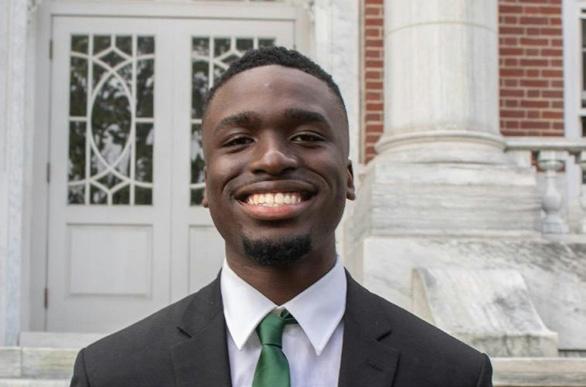
to us and said, “Thank you for being able to stand on our side.” Obviously, the work isn’t over. The work stops when the labor union finally gets a fair contract, but I’m glad that we’re able to at least be advocates in these really important rooms.
TD: This past semester has been a particularly tumultuous time on campus. How has the TCU Senate been navigating these past few months, and what responsibility do you think that the Senate should have in moments like these and going forward?
JO
: There’s a lot of behind the scenes things that the university is working on. In all honesty, especially as someone who can be very critical of the university at times, I have full trust and I’ve only been positively surprised by the work the Tufts administration has [done] to support and protect a lot of our students, especially in the face of other universities that haven’t had that positive response. Seeing Tufts being one of the first, briefly the only, university that was in support and sticking up for international students, was really encouraging to see.
In terms of the simple ways that student government can be
a resource, we’ve been working behind the scenes just trying to communicate resources, especially to students who are most impacted by what’s going on. we’ve been having some dialogues with the Office of the President, the Department of Public Safety as well, to make sure that every student feels safe on this campus, and what happened a few weeks ago doesn’t happen again. On our side, while it’s been a little bit more behind the scenes, we’re so proud about what we’ve been able to accomplish, especially in face of such adversity.
TD: Going forward, what would you like to see change about the TCU Senate?
JO: we’ve been discussing the creation of more committees, especially since we saw how fruitful the subcommittee system was. we’ve been discussing creating more advocacy committees — more opportunities for student clubs who are already killing it and leading the game when it comes to these conversations about what’s going on nationally or globally, to be in these rooms with Senate, with administrators, and to really have the voices be heard. we really realized the Senate is not the voice but more so the
Like many other first-year students arriving at Tufts, Aaron Gruen had little idea of how he’d spend his next four years of college. After auditioning for improv and a cappella groups in search of his niche, Gruen instead turned toward the Daily to try his hand at journalism. Although initially unsure of where this commitment would take him, Gruen — now a graduating senior — leaves behind a legacy at the Daily defined by strong journalism and caring leadership, having guided the paper as editorin-chief, executive news editor and executive investigative editor. “I had absolutely no intention of going where I am right now,” Gruen said of that first semester, adding that the Daily just “stuck.”
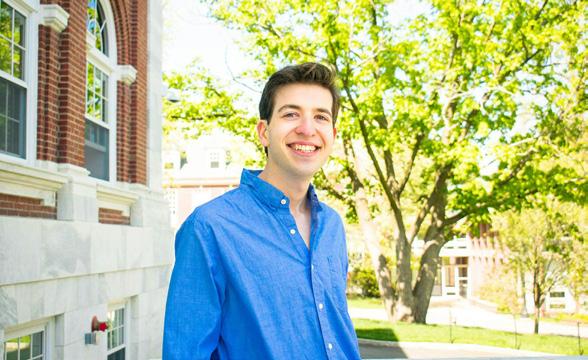
Like many new members of the Daily, Gruen neglected to attend his first DailyCon, the newspaper’s introductory training for new members. Soon after taking some photography assignments, Gruen wrote his first news story covering the end of Tufts’ Portuguese language program. From there, he was hooked.
The story “gained a lot of traction,” and he was eager to continue reporting. One of his next stories, which detailed the COVID-19 pandemic’s impact on disability rights in Somerville, shaped his early conceptions of journalism. Emotional after interviewing a mother about her daughter’s
microphone. And the best way that we can keep on with our mission is to get more and more different student voices to amplify [for] that microphone.
TD: what are your post-graduation plans?
JO: After graduation, I’m working as a paralegal for the next few years while I’m studying for the LSAT. I’m also really passionate about marketing and communications. Hopefully, I can find some way to bridge my interest in law, policy and marketing, and from there, maybe consider working for public office and trying to support more people in the future.
TD: If you could give one piece of advice to underclassmen at Tufts, what would it be?
JO: It would be to say yes to everything. At first I didn’t even think about the Senate honestly, and I didn’t even think about running for Senate president. The Senate has taught me so much about the work that I want to do in the future, my own interests and everything. I would recommend for any [first-years] who are trying to figure out more about who they are: Sign up for Senate. Put your name in the hat. Run and just see what happens.
TD: All right, is there anything else you want to say about your time as president?
JO: This has been a year where I think Senate has cemented itself on campus. I think it’s been a year where the Senate has really shown that our voice does matter, and we’ve tried our best to make sure that everyone knows what’s going on on our campus and how to best effect change. A lot of the projects and legislation that we have already created and curated is only going to be better in the future years. I’m honored to be able to witness and help to facilitate any of that, and I’m just really excited to see what the future is going to look like.
passing during the pandemic, Gruen questioned whether or not reporting was for him.
“It took everything in my power to stay composed during the interview. As soon as I logged off of Zoom, I just broke down and sobbed,” he said. “At first, I thought, ‘This is a sign that I shouldn’t be doing this; journalists are supposed to be stoic and impassive and emotionless and unbiased.’”
But counter to the notion of rigidly objective journalism, Gruen decided to lean into his intense emotions and let empathy, a value he hopes to be remembered for, drive his storytelling.
“Feeling can be an asset; emotions make you invested. If a journalist is invested in the story, then readers will be invested in it,” Gruen said. “It shines through in the writing and the reporting.”
Since then, Gruen has played a key part in covering unprecedented stories on Tufts’ campus, including allegations of professional misconduct within the university’s admissions department. Taking three months to report, the publication of Gruen’s investigative story was a “formative moment” in his career that solidified his passion for journalism.
To established editors, it was clear early on that Gruen would take on leadership high up on the masthead. “I’m not at all surprised that he was extremely successful in his college journalism career,” Chloe Courtney Bohl (LA’24), a former editor-inchief of the Daily and a friend of Gruen’s, said. As his editor, Courtney Bohl took note of Gruen’s tenacious and creative reporting.
“My impression of him was that he was just this energetic, inquisitive, really skilled and shrewd reporter,” Courtney Bohl said. “He clearly was so invested in the mission of the Daily and just put so much of himself into the role.”
As a junior, Gruen became editor-in-chief and led the newsroom during a fall semester marked by campus tension. He said that while serving on the managing board, he and his fellow members put special emphasis on making the Daily’s office a more welcoming space for newcomers.
“One of our priorities as a managing board was to give students, especially new students, somewhere they instantly felt included, respected and valued,” he said. “ we also wanted to create an environment where students were having fun, and so we really tried to emphasize the community aspect of the Daily.”
In addition to his keen eye for journalism, Gruen is known for his consideration of others. At the end of a “whirlwind weekend” of reporting on a labor strike to be carried out by Tufts’ resident assistants, Courtney Bohl said that Gruen offered to prepare her a nicely-made pasta dinner as thanks. Gruen, a cooking aficionado, continues to frequently host and prepare dinners for members of the Daily.
“That was really Aaron in a nutshell,” Courtney Bohl said. “He’s so passionate and energetic about the work, but then he’s also a really good friend. It’s just been a joy working with him and becoming his friend.”
Another of Gruen’s friends and former colleagues, Caroline
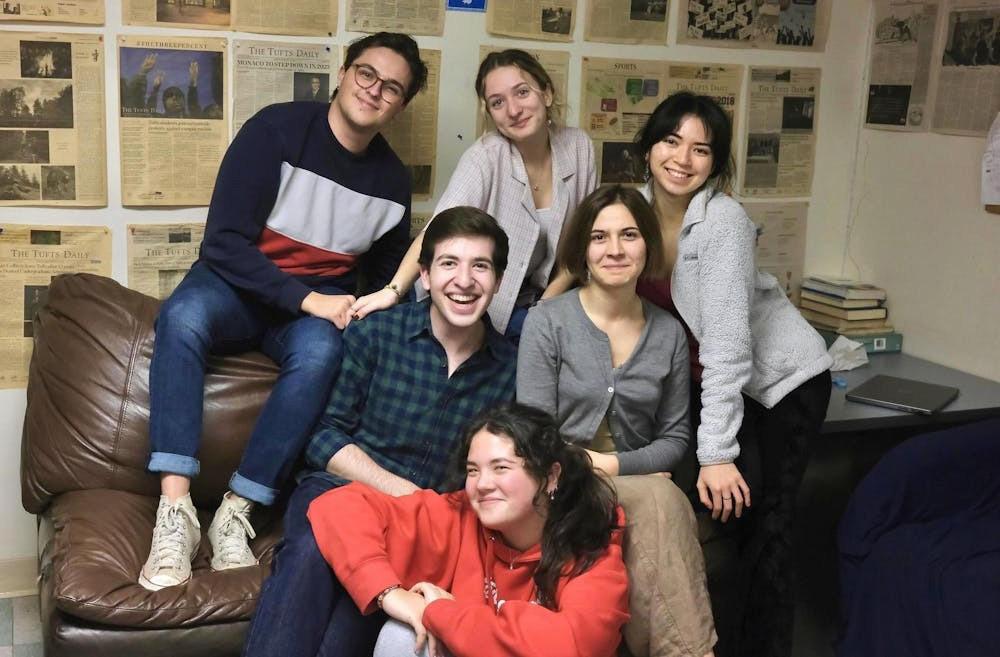
Vandis (LA’24), echoed Courtney Bohl’s praise for the graduating senior. Vandis noted that to her and many others, Gruen is a teacher and mentor. As a reporter once under Gruen’s leadership, I, too, consider myself among that group.
“He just taught so many people what it meant to be a part of the Daily,” Vandis said. “So many people look up to him and learn what they know from the Daily from him.”
Gruen himself expressed a deep appreciation for these mentor-mentee relationships formed in the Daily’s office and underscored
showing up for others — as often manifested through side-by-side editing — as “one of the ultimate acts of care.”
“Everyone gets to grow and then help somebody else grow, and that process never ends at the Daily,” he said. “The most important part is showing a first-year or a sophomore that you — as a junior or a senior — care about them and their work and [want] them to succeed. That you have their back and that their work is not in vain. That they’re appreciated and respected.”
Although he doesn’t plan to pursue journalism after college, Gruen walks away with the hope to continue telling other people’s stories, now equipped with the skills the Daily gave him as a “writer, as an editor, as a human being.”
He has accrued dozens of bylines in the newsprint pages of the Daily since starting in 2021, and yet, it isn’t his coverage he’s finally most proud of. Instead, Gruen prizes the close friendships and memories he formed in the basement of Curtis Hall during late
nights of difficult work on the newspaper.
“I didn’t think twice about them in the moment, but now looking back, I wish I could replay all those moments in my head,” Gruen said, highlighting time spent with his co-managing board members. “I still have those friends, but there’s something about being in that office and working together on a project you all love and care about. … It just so happened that the right people were there at the right time, and I don’t take that fact for granted.”
Josué Pérez Deputy News Editor
Mayor Breanna LungoKoehn met with the Daily to discuss her initiatives and remaining goals for the city as she begins her fourth reelection campaign for Mayor.
Editor’s note: This interview has been edited for length and clarity.
The Tufts Daily (TD) : You’re currently in your third term as mayor of the city of Medford. w hat would you say your accomplishments of this term have been?
Breanna Lungo-Koehn (BLK): with the help of the past and present superintendents and the [Medford] School Committee, we applied for our third phase of the [Massachusetts School Building Authority] process to develop a new Medford High School.
Another big accomplishment is working really well with the school committee and the city council, realizing that cutting budgets year after year is not the right thing for children and staff — especially our teachers
— and so working together to get rid of some things that we felt we weren’t spending the best money on and then to be able to support an override this past November.
I think probably one of the biggest [accomplishments] is charter review.
TD: Now that [the charter has] been approved, do you think it properly represents the needs of Medford citizens, and what impeded the charter from getting passed in the first round of the process?
BLK: I don’t love every single piece of it, but I think it’s definitely a strong document that is going to help govern the city, assuming it passes. I’ll be campaigning for it to pass in November. It’s long overdue.
It’s one of the biggest accomplishments that I set out to do when I became mayor, and even beforehand. There’s things I conceded with. The council wanted the mayor [removed] as chair of the school committee, so did members of the school committee. I did concede there, the mayor will be just a voting member, but will not be the
chair. One thing I really held strong [on] was something that I know that many campaigned on, and that the community really wanted based on the survey, and that the charter study committee really advocated for, which was ward representation.
TD: where would you say there’s room for growth and development, for the city and for you as a leader?
BLK : we want to just make sure we can budget correctly so that we don’t need an override any time in the near future. Keeping up with our streets and sidewalks, creating a plan to rehab our streets and sidewalks to replace all the lead lines — that’s a huge undertaking. It’s going to cost close to $50 million to get done. we just got a loan, hopefully partially a grant from the [Massachusetts water Resources Authority], to do $8 million of that work, as well as our water and sewer infrastructure that is over 100 years old. we also just [went] out to bond for almost $30 million for the [heating, ventilation and air conditioning] systems
for [McGlynn Middle School and Andrews Middle School] because those were in really bad shape. Being able to have somebody in office as mayor to be able to budget all these large undertakings is going to be extremely important.
TD: The city’s finances were a major point of discussion during the 2024 election with the override votes and were cited as a reason that the city needed those votes to pass. what else will you be doing to ensure that the city can have a strong economy and municipal budget in the near future and in the long term?
BLK : It’s not easy because of inflation and the rising costs. we’re struggling through the city side budget now. we’re in decent shape, but we still have a gap to fill, and that is mainly because health insurance continues to rise at a rate that is beyond what we can afford, with still-expanding city services. Our health insurance is up 10% this year, which is $2.5 million, and then our new waste contract is up $1 million.
It’s just a matter of trying to budget right, and trying to work with our [Office of Planning, Development, and Sustainability] and our assessing department to capture our new growth and continue with the development that we’ve started.
There’s so many new businesses wanting to come to Medford. It’s just about being on the phone and having meetings constantly to try to bring in new development to the city.
TD : Consistently throughout your years as mayor, various unions have criticized your performance and just your relationship with them. The leaders of many of these local unions claim that you don’t have their interests in mind or the consideration to engage in bargaining. The fire union, police patrolmen and teamsters union are the most prominent voices. what has caused this upset, and how do you plan to address these concerns?
BLK : Teamsters and fire are resistant to change and
accountability, so they definitely have pushed back when we try to hold them accountable. But the fire contract settled, and there’s a new union president, so we are working much better together. The Teamsters, they’re great. we have two new reps that once they came in, we negotiated almost every contract except one. we had a gentleman who was keeping requests at around 9% a year just for the last election, to try to say that I wasn’t settling contracts. A lot of it has to do with politics — that gentleman runs, usually, my opponent’s campaign.
The police are asking for what the fire and the teachers received, plus a 2% post each year. So it’s just about affordability. The attorney that represents the police, the patrol and the superiors is just adamant that they should get 6% more for those three years than everybody else. It’s about balance and figuring out what we can afford.
TD: The new Tufts dorm has ruffled feathers among residents. Some Medford residents are frustrated that Tufts has in recent years created an imbalance of power with municipal governments. Do you think that power balance exists in a significant way?
BLK : I know that Tufts was amazing to us when [the COVID-19 pandemic] hit, and Tufts helping us was the reason that our students got back into the classroom sooner. I did push back on the dorm
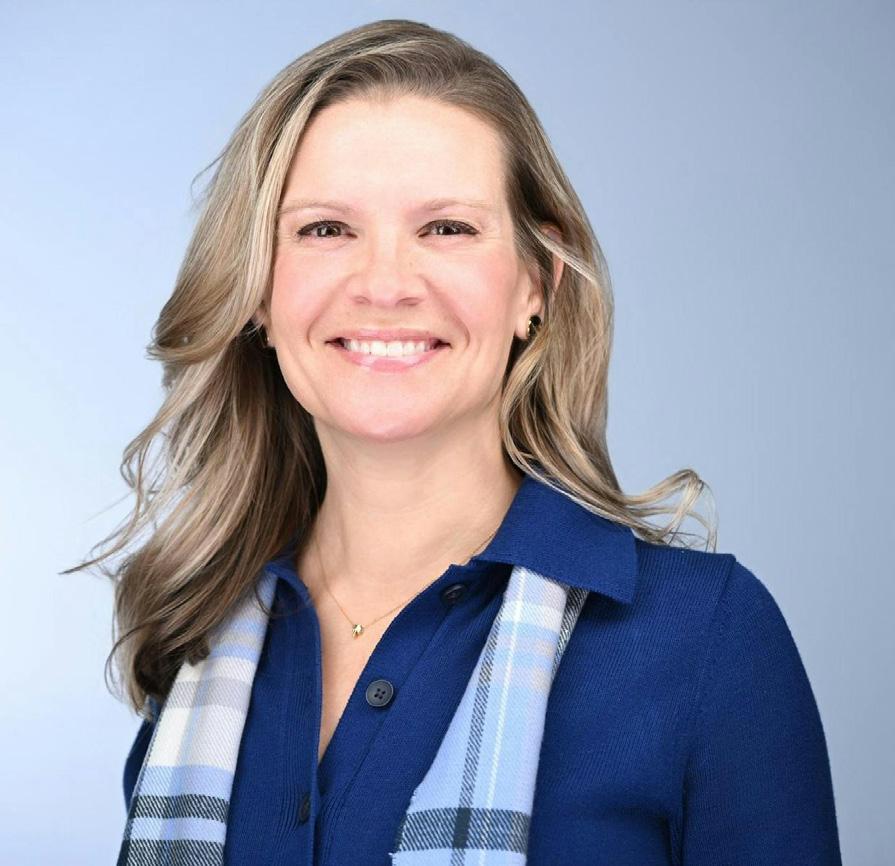
a bit, because I felt like [the fact that] the residents that were going to be shaded for pieces of their days was pretty unfortunate. The [University] President [Sunil Kumar] and myself chatted a few times and they created a fund of $500,000 to support those residences and residents that are
going to be mostly affected by this dorm. They also upped their $250,000 donation to the Affordable Housing Trust to $500,000, so there was some negotiation there.
In the end, I didn’t have control. It was the [Community Development] board, but I continued to say, “I wish that you
didn’t switch your plans from seven stories to 10 stories in somewhat of a last minute fashion.” It doesn’t sit well with me that there was that switch just months before they needed that vote. But I continue to work as best I can with [Kumar] and our government relations team, because I believe that Tufts is
an asset to Medford, and I hear the residents when they say that Tufts should do more.
TD: what would you say your biggest campaign goals will be in this election?
BLK : Completing Medford Square, completing the high school, completing the HVAC project, finishing and making sure that the charter gets on the ballot and then implemented correctly, working through a plan for streets, sidewalks, lead service lines, water and sewer infrastructure.
we also want to continue with our green energy goals. we’ve expanded our [electric vehicle] station network. we are expanding our Blue Bike network. we have renovated almost every park in the city, one way or another, from a basketball court to a full $8 million renovation up at Carr Park that is underway — it’s completely dug up, and that will be another year before it’s complete. So seeing that come to fruition and continuing to rehab our open spaces and our connector paths [is another goal]. Next up is trying to put some work into the school playgrounds because they’re 25 years old, if they have gotten some work like McGlynn, [which] just had a full redo, which is great. But then we have another four or five schools that need new play structures, new padding on the ground. we want to make sure we’re continuing to increase our tree canopy.
[ we want] to get off paper and be more tech savvy.
most stressful semester that I’ve had on the Daily, but also probably my favorite.”
said. “I really like doing interviews now. It’s one of my favorite parts of being on News.”
Editor’s note: The Daily’s editorial department acknowledges that this article is premised on a conflict of interest. This article is a special feature for Commencement 2025 that does not represent the Daily’s standard journalistic practices.
Marlee Stout, a graduating senior majoring in child study and human development, wasn’t planning on pursuing journalism in any sense upon entering college. A general interest meeting for the Daily, though, changed her mind.
“I went to a few [Daily] meetings, signed up for a copy shift, went to DailyCon and I was like, ‘Yeah, these are my people. These people are nerds, and they care about writing,’” Stout said.
She began her time at the Daily in the Copy section, eventually becoming the executive copy editor her sophomore spring. Through that role, she grew more connected to the office environment and the rest of the community. It was her time as an associate editor, though, that really allowed her to immerse herself in the organization.
“we all got really close as [a managing] board just because we spent so much time together. we were always all in the office,” Stout said. “I think that was the
I asked the members of Stout’s managing board to describe her in one word. Rising senior Julieta Grané said “clever.” Graduating seniors Arielle weinstein and Merr y Jiao both said “dedicated.” Jiao amusingly added that Stout was a “chaos-demon.” Graduating senior and editor-in-chief at the time, Rachel Liu, said “bright.”
Stout spent the entirety of her senior year serving as an alumni liaison for the Daily. Some of her responsibilities include fundraising, organizing coffee chats between staffers and former staffers and reaching out to the Daily’s alumni network.
Stout has also ventured into news writing, finding herself interested in a story about the Somerville Public Library closing midday due to concerns about teen violence, and she had thought, “‘Libraries, this is kind of my thing.’”
Stout pitched the story to rising senior Estelle Anderson, then the executive news editor, who suggested that Stout write the piece herself. She wasn’t particularly keen on interviewing people at the time, but has since learned to enjoy the reporting process.
“Interviewing people is so scary, but I’ve gotten better at that,” she
Stout became a regular member of the News section after that, writing pieces on local politics as well as university stories.
Stout has also been incredibly involved in the Experimental College, as a teacher of an Explorations seminar and the Daily’s ExCollege class, as well as a member of the ExCollege Board.
“I taught an Explorations class my junior fall, which is a 14-person seminar for first-year students,” she said. She chose to focus on the evolution of fairy tales.
“My major advisor encouraged me to apply, and so I came up with a couple ideas. I study children’s literature. That’s my main thing, and I’m doing my thesis on it, and I’ve been interested in it since I took a class about it my sophomore spring,” she said
Her time leading the Explorations seminar helped her gain experience teaching — after graduation, she plans to teach in some capacity.
“Post-grad, my vision is to be a teacher at least for a little bit, so I think the ExCollege was a huge step on that journey,” she said. “The teaching part was really hard, but I think it was also really rewarding to figure out the right questions to ask to promote really interesting discussion. … I think
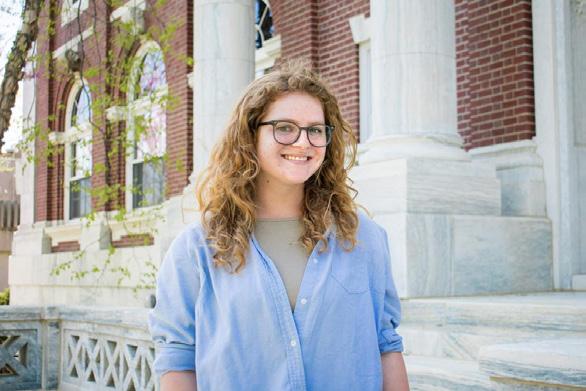
I got better at it as the semester went along, and I had fun.”
At the 2025 Academic Awards Ceremony, Stout was awarded the Marshall Hochhauser Prize, which recognizes students who “have worked within the system to broaden and enrich the intellectual climate at Tufts without regard for personal gain.” She also received The Association of Tufts Alumnae Seventy-fifth Anniversary Award, which was “established to honor students who have provided meritorious service to the Tufts University community, adding to the university by their presence.”
Stout did not have an easy initial transition to Tufts because she joined after a gap year, and campus was still
feeling the effects of the COVID19 pandemic during her first year, but she credits the Daily with helping her find a sense of community on campus.
If she could advise anything, she would suggest that students take advantage of all of the opportunities presented to them — even those they aren’t sure they’re interested in.
“This wasn’t something that I really saw myself doing. I’m not planning to go into journalism,” Stout said. “I think just being open to new experiences and open to things that you don’t necessarily see or expect yourself doing. … So just [be] willing to take advantage of opportunities that present themselves and actually [give] it a shot.”
Editor’s note: The Daily’s editorial department acknowledges that this article is premised on a conflict of interest. This article is a special feature for Commencement 2025 that does not represent the Daily’s standard journalistic practices.
Graduating senior Sam Berman began his journey in the Daily as business director for the fall 2022 semester and continued leading the Daily’s business department for the rest of his sophomore year. He then went on to be an alumni liaison in fall 2023 alongside Ty Blitstein (LA’24) and a social committee chair in spring 2024 with Megan Amero (LA’24) and graduating senior Siya Bhanshali.
There are several things that business directors do to ensure the Daily can maintain its financial independence from the university.
“I had to work a lot with ad outreach and speaking to all different types of vendors and figuring out the optimal plans for each vendor, the optimal advertising plans. … The business director is communicating a lot with a lot of different types of people under different types of timelines, and they often have different tasks,” Berman said.
Tufts University, and the Daily, were emerging from the COVID19 pandemic when Berman was the Daily’s business director.
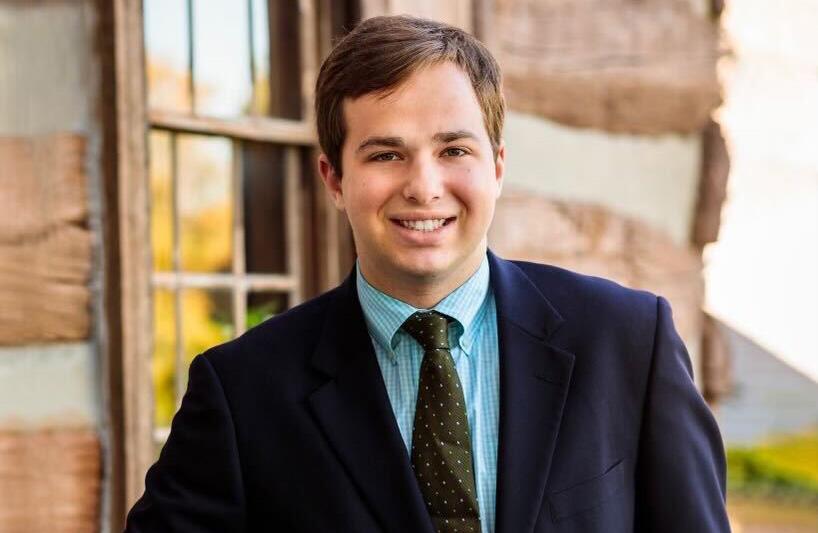
Revenue had dried up for the Daily, preventing staff from completing desired projects.
“COVID decreased [the Daily’s] ad revenue, and the finances were a bit unclear. Things were disorganized. we were a bit unsure where we stood financially, and we had to make a lot of decisions to help the Daily accumulate revenue,” he said.
One of Berman’s first acts as business director was to change the amount of papers the Daily was printing. This was in line with many mainstream newspapers and college newspapers across the nation that were reducing their printing due to a decline in readership.
“ we changed from printing twice a week to once a week, and we had our print editions a bit longer in terms of page count, which saved us some money,” he said.
Berman also looked to increase ad revenue, looking to other student publications for inspiration.
“I also did a lot of research from some of our peer publications to see where we could set our ad prices that we sell,” he said. “Ad revenue is one of our two main revenue streams — we advertised heavily for our other prominent revenue stream, which is Giving Tuesday and donations.”
Berman sought to reorganize a stronger business team that had come and gone in the past. The goal was to increase productivity and gain more ideas and perspectives for the Business section. Additionally, he looked to improve the operations of the department.
“Some other things I did was just create, organize and get our areas that we work in [set up],
Editor’s note: The Daily’s editorial department acknowledges that this article is premised on a conflict of interest. This article is a special feature for Commencement 2025 that does not represent the Daily’s standard journalistic practices.
Even before stepping foot on Tufts’ campus, Daniel Vos knew he wanted to be a part of the Daily.
“I joined the Daily my [firstyear] fall,” Vos said. “I was always interested in journalism in high school, but we didn’t really have a strong newspaper or journalism club, so that was an experience that I was really focused on getting in college.”
Vos joined the News section and never looked back. He began as a staff writer and wrote dozens of articles throughout his Daily career, reporting on a variety of issues facing the university and surrounding communities. He served as executive news editor in fall 2023, and worked on expanding coverage of Tufts’ host cities of Medford and Somerville.
Of the articles Vos has written, two stand out to him as being the most exciting to report on and write about. The first of these aligned with his
interest in international relations, the subject for which he earned his degree in December 2024, after his senior fall.
“The article that I had the most fun writing was … about the [Fletcher School] world Peace Foundation director, and there was some controversy between him and some dissidents in Ethiopia, and they were harassing him online,” Vos said. “So we did a news article about it, and it unfolded in a way I didn’t expect, because there were students on campus who also felt a certain way about him and his work, and I was navigating all of that, but it turned out to be a very interesting article.”
Vos’ other favorite writing experience was at the beginning of his semester as the Daily’s executive news editor in August 2023.
“The [resident assistant] union was protesting and there was a bunch of confusion about whether RAs were going to be working at the start of the semester. Just the energy of that … [it was] really a great time to be writing,” Vos said.
In the middle of that same semester, international relations and campus news became even further intertwined. The Oct. 7 Hamas attack on Israel and subsequent war in the Gaza
like our Google Drive system. we really organized that. I created a thorough budget, a thorough to-do list.”
Berman wanted to make all expenses have a purpose and move the Daily forward financially.
“Another thing was being smart with our money, taking every potential expense into account and deciding whether or not we can afford it, and, if we can afford it: How would it benefit the Daily?” he said.
Berman shared some advice that he gained after a full year on the managing board as business director.
“Come into the position with an optimistic mindset and come in with the attitude of wanting to learn and just to do well — I think those are the most successful business directors,” he said.
He also shared insight into the benefits of working on cohesive managing boards.
“It just allows people to share ideas freely. I’ve been in situations or teams before where I would have some really good ideas, but I’d keep them to myself because I wasn’t comfortable enough,” he said. “But working with these collaborative teams allowed me to share ideas freely and allowed others to share ideas. And the more ideas you have, the more options you have, and the more possibilities … to improve the Daily.”
He reflected on how much he had to learn about managing
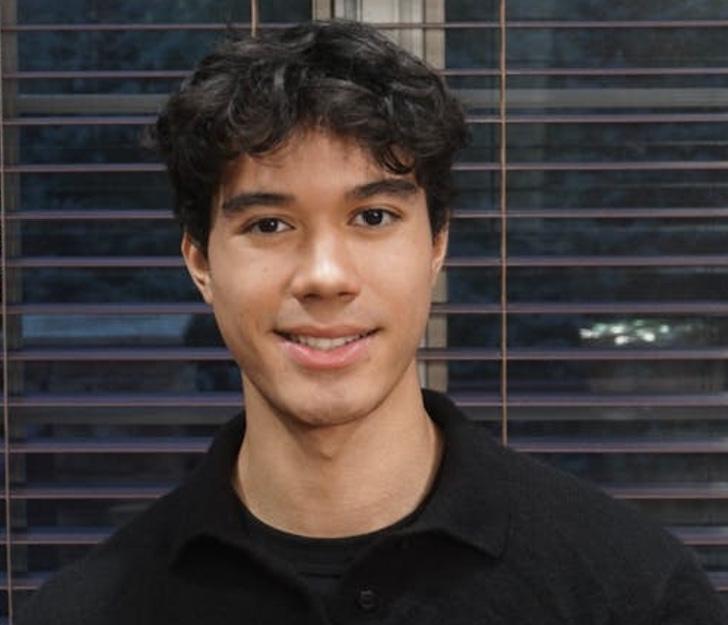
Strip created a contentious climate at Tufts. w hile difficult to navigate for the campus newspaper, Vos believes that the Daily handled coverage of the conflict and its impact gracefully.
“None of us really expected that level of attention to be drawn to the Daily,” Vos explained. “But I do feel like when it all happened, both the News team and the [managing] board … all really tapped into trying to capture a lot of the chaos on campus and recount the events in as impartial a way as possible. we spent hours
finances when stepping into this role, but also how he determined he was to ensure that the Daily as a business could increase revenue and work as a team.
“Even though I didn’t have much experience, I came into it wanting to not only do well for myself, but for the team, and that encouraged me to conduct research on our competitors, or to figure out how else we can earn revenue and increase profits,” he said.
Reflecting on his time in the Daily, Berman said he has grown a lot, particularly from when he was business director.
“It was my best experience I’ve had throughout my four years at the Daily. I made some really great friendships that I’ll have forever,” he said. “I grew, too, as a leader. I gained a lot of leadership skills in communication and leading teams, and public speaking and speaking to all different types of people.”
One of his fondest memories working in the Daily was when the newspaper hit its revenue goal.
“I also will always just remember from both semesters as business director, once we hit our revenue target, and I knew we’d break even, at least,” he said. “Those were really rewarding experiences because I came into the club not knowing much about the Daily. I never knew how to run a business. So it proved to me that hard work can pay off.”
going through the language, how we were going to present things, if we were giving attention to both sides in a way that was fair. And I think we’re all proud of the way we handled it despite it being truly a chaotic time for news.”
According to Vos, being a part of the Daily, especially a member of the News section, is a unique responsibility to bear while being a student at Tufts.
“You have a real obligation in a way that I don’t think many other things that you can do on campus have,” Vos said. “A lot of people depend
on you to produce content, to be on time, to be capturing what’s happening in the community.”
The other significant part of Vos’ experience on the Daily, in addition to reporting, was the opportunity to take on a leadership role while still being a college student.
“You are still very early in your development of skills. At the same time you’re trying to share a little bit of what you’ve learned with other students who are just coming into Tufts. And so, that also motivates you to really push for … something that is, at the end of the day, a student organization, to be something that is truly meaningful.”
Vos plans to attend graduate school for international relations at the London School of Economics and Political Science next fall. He believes his experience at the Daily has instilled in him lifelong professional and personal skills.
“The Daily probably assisted in that in countless ways,” Vos said. “I think I developed a really strong work ethic, I developed hard writing skills and also, leadership skills that I think I can apply to a future career. I also think the network that the Daily provides is something that I’ll hold onto for life.”
Josué Pérez Deputy News Editor
Tufts graduate student Rümeysa Öztürk was detained by Immigration and Customs Enforcement agents on the evening of March 25 on her way to an Iftar dinner. The Tufts community and local residents demanded that she be released from ICE detention and return to her studies at Tufts. This article provides a timeline of actions relating to Öztürk’s case and related activism on and off campus, from her detainment to her release.
Rümeysa Öztürk was detained near her off-campus apartment in Somerville by plainclothes ICE officers. She was transported to a Massachusetts detention center, taken through New Hampshire and Vermont, then flown to an ICE detention center in Louisiana. Öztürk’s attorney filed a habeas corpus petition for her release in Massachusetts.
Secretary of State Marco Rubio confirmed on March 27 that Öztürk’s valid F-1 visa had been revoked. Öztürk’s visa was terminated without notice to her or to the university administration. Sen. Elizabeth warren, D-Mass., and over 30 other senators and representatives of Congress released a letter demanding more information regarding the cause and legality of her detainment. Over 1,000 current and former students of Tufts University signed a petition calling for proactive protection of its community members against federal deportations.
Coalition for Palestinian Liberation held a walkout at Ballou Hall, demanding that Öztürk be released while reiterating calls for the university to divest from Israel. Protestors made seven demands to the university, including to “condemn Rümeysa’s abduction for pro-Palestine speech,” “expunge student disciplinary records” and cut ties with the U.S. Army DEVCOM, which shares a joint research lab with the School of Engineering.
Judge Casper ruled to transfer Öztürk’s case to Vermont, the state in which Öztürk was being held at the time her lawyers filed a habeas petition, denying the government’s motion to dismiss Öztürk’s habeas petition and request to transfer the case to Louisiana.
Öztürk’s counsel filed her written declaration, which recounts the sequence of her arrest and subsequent detention from personal memory. Öztürk described how at the time of her arrest, she initially feared for her life, assuming that she was being kidnapped as a result of being doxxed by Canary Mission. Öztürk stated that she had suffered four asthma attacks while in ICE custody and described the “inhumane” environment of the Louisiana detention facility.
Lawyers argued for Öztürk’s release before U.S. District Judge william Sessions III in Vermont. Öztürk’s lawyers held that the Vermont district court has jurisdiction over the habeas petition, while a Justice Department lawyer argued that Vermont does not have jurisdiction under federal immigration law.
Sessions ordered that Öztürk be moved to Vermont no later than May 1 from Louisiana. Sessions concluded that the Vermont district court holds jurisdiction to consider Öztürk’s request for habeas relief. He determined that Öztürk’s legal counsel could not be faulted for “improper” filing of her immediate custodian in her habeas petition, which the government argued was reason enough for the petition to be dismissed.
The U.S. Court of Appeals for the Second Circuit ruled that the administration of President Donald Trump had until May 14 to comply with the district court’s order to transfer Öztürk to immigration custody in Vermont.
In protest of Öztürk’s arrest, over 2,000 students, faculty and local residents turned out to Powder House Park, just outside of Tufts campus. The protest was organized by several activist groups from the Boston area and the Coalition for Palestinian Liberation. Local officials, including Somerville Mayor Katjana Ballantyne, Massachusetts Reps. Erika Uyterhoeven and Mike Connolly and Medford City Council President Zac Bears, were present at the rally.
U.S. District Judge Denise Casper ordered that Öztürk not be removed from the country unless otherwise ordered by the court.
In a U.S. District Court hearing in Boston, Öztürk’s lawyers argued Casper’s jurisdiction over Öztürk’s case while a lawyer from the Department of Justice argued it should be transferred to a court in Louisiana. Öztürk’s lawyers presented 23 affidavits in support of her release to Casper, including one signed by University President Sunil Kumar.
The university confirmed that the federal government terminated the visa of a second graduate student on April 3 but did not disclose their identity.
Seven post-completion Optional Practical Training participants at Tufts had their Student and Exchange Visitor Information System records or F-1 visa status terminated as of April 11.
A Louisiana federal immigration judge denied bond to Öztürk. The judge determined that she was a “flight risk and a danger to the community.” Öztürk’s lawyers wrote that the judge’s decision was based solely on a memorandum presented by the Department of Homeland Security, which concluded that the op-ed Öztürk co-authored created “a hostile environment for Jewish students and indicating support for a designated terrorist organization.”
After the Department of Justice filed an appeal to Sessions’ April 18 order on April 22, Sessions denied the appeal, reiterating the court’s decision that ICE officers must transfer Rümeysa Öztürk back to Vermont no later than May 1. Sessions wrote that Öztürk’s return is in the interest of her access to sufficient medical treatment as well as in consideration of her religious practices and ability to participate in future proceedings.
Öztürk was released on bail from ICE custody in Louisiana. Her release came hours after Sessions ordered her release in a bail hearing on the same day. He did not issue any travel restrictions.


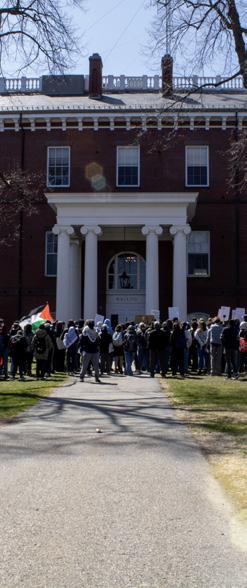
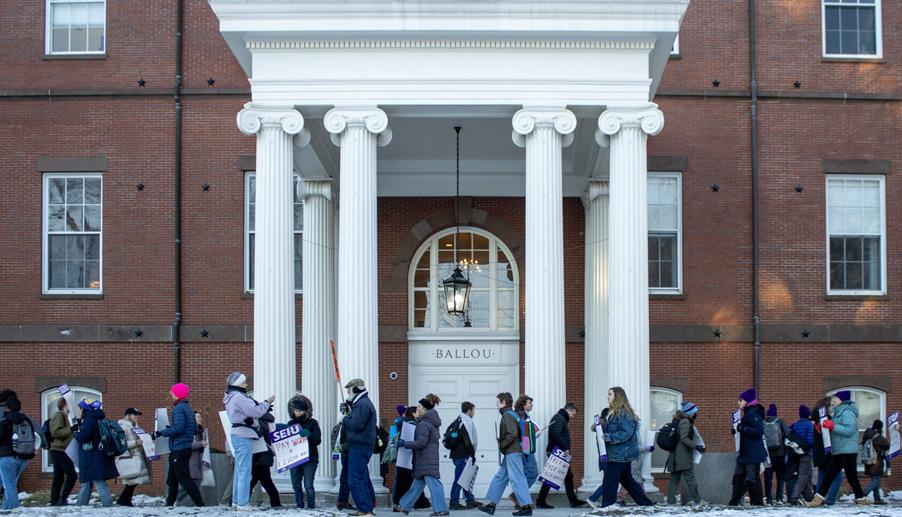
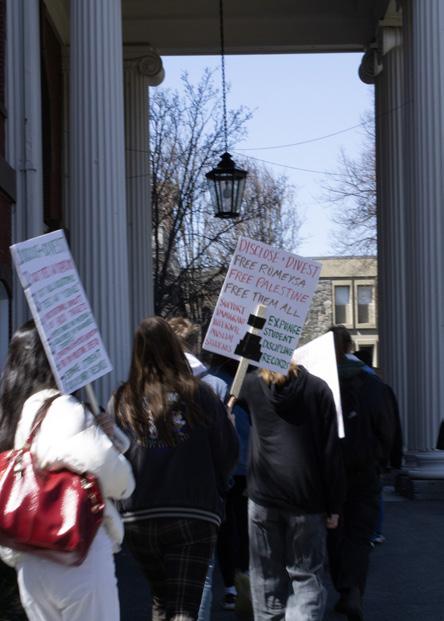
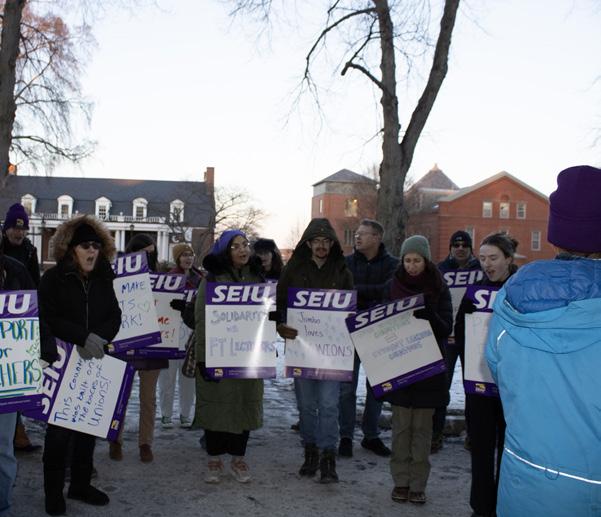
Full-time lecturer 2-day walk-out



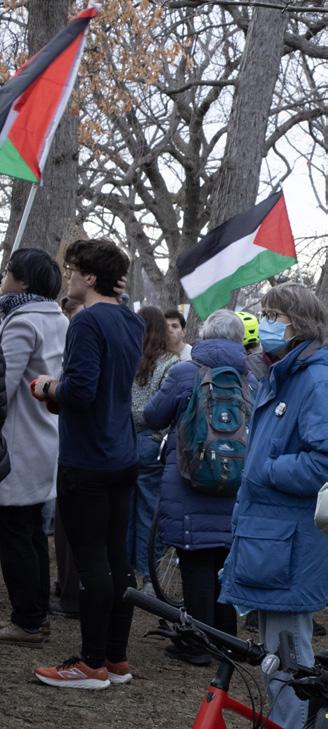
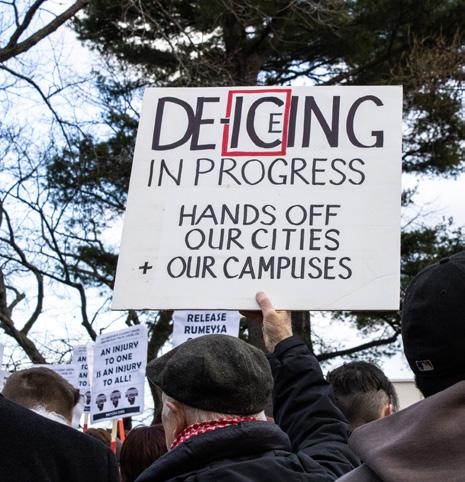
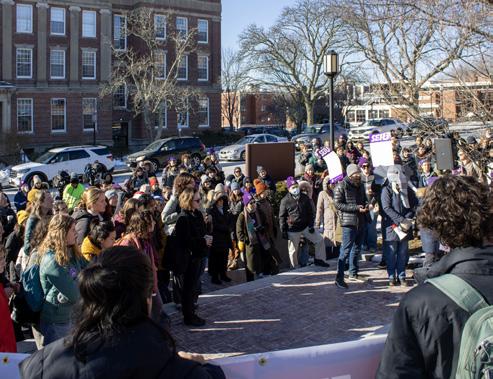
Student walk-out at Ballou to demand Öztürk’s release
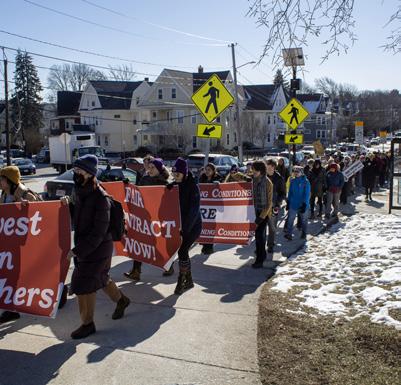
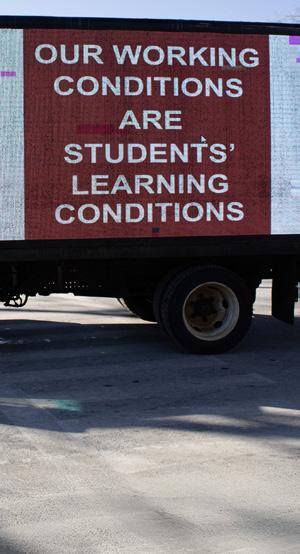
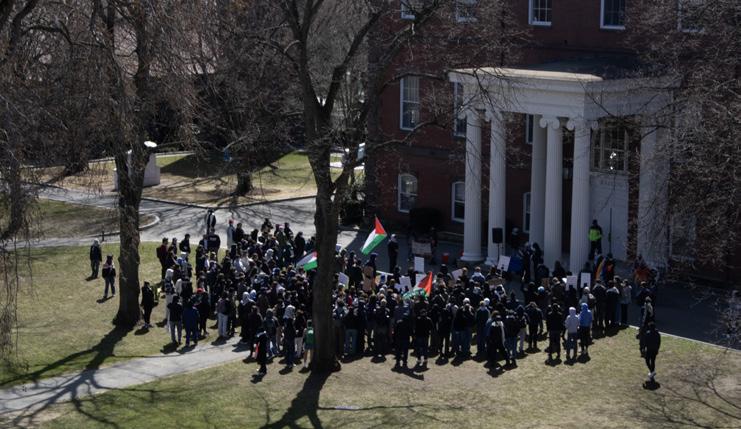
Powder House Park rally
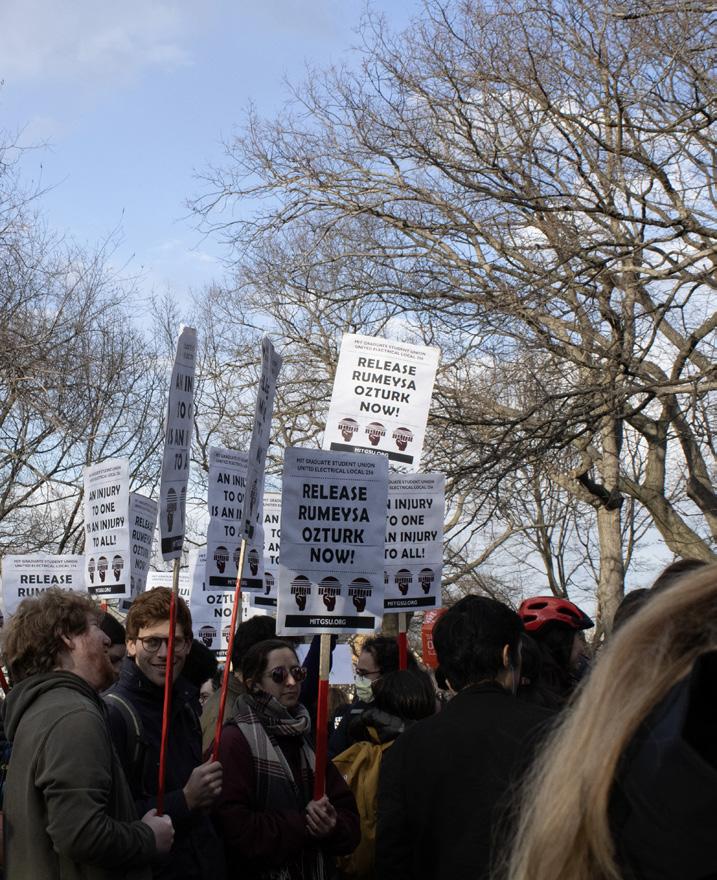
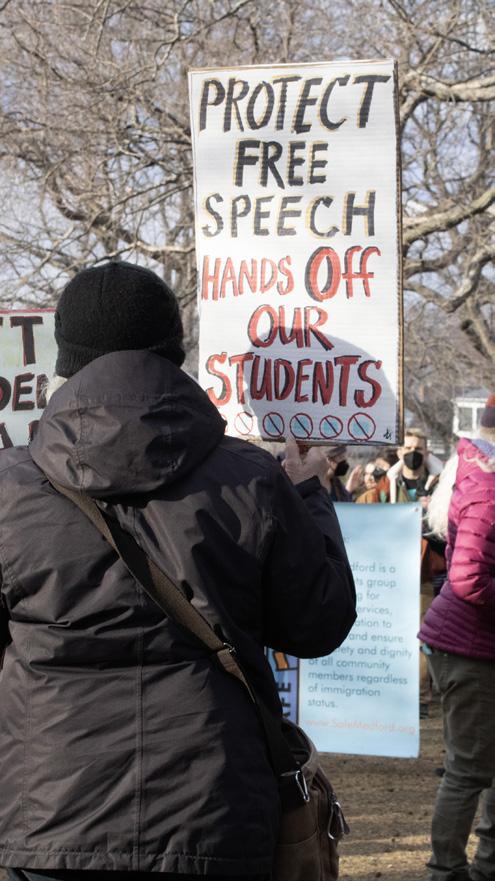
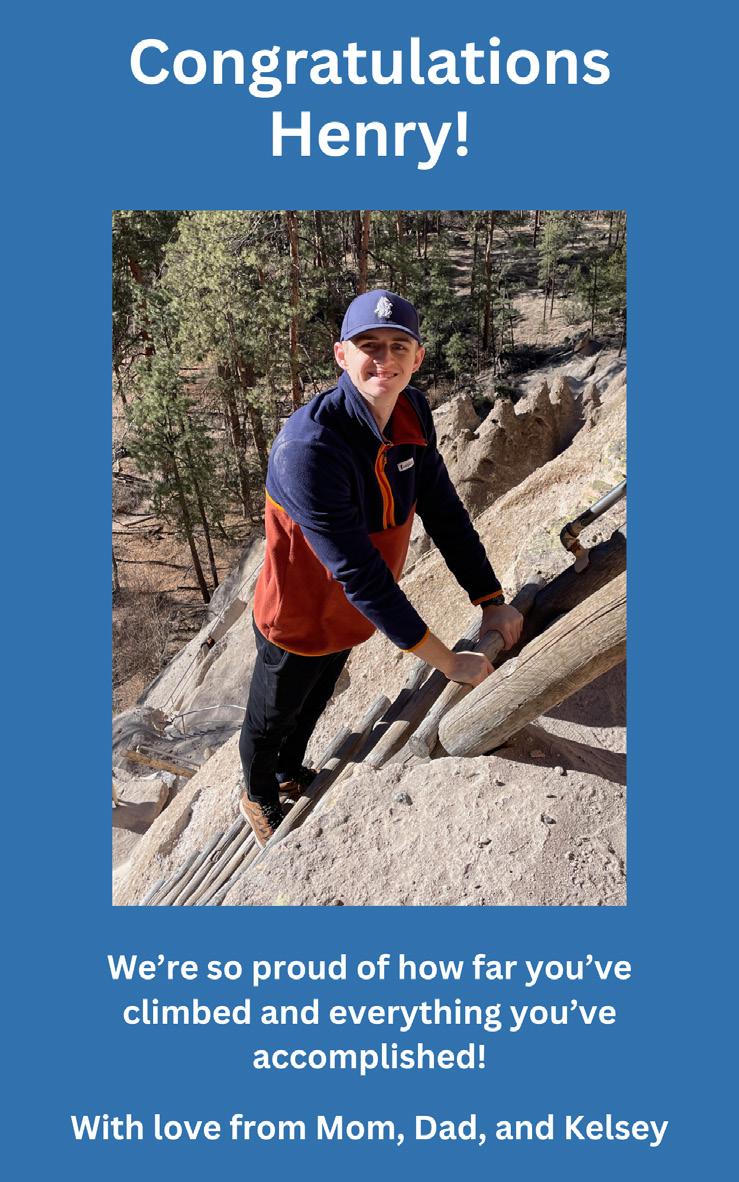
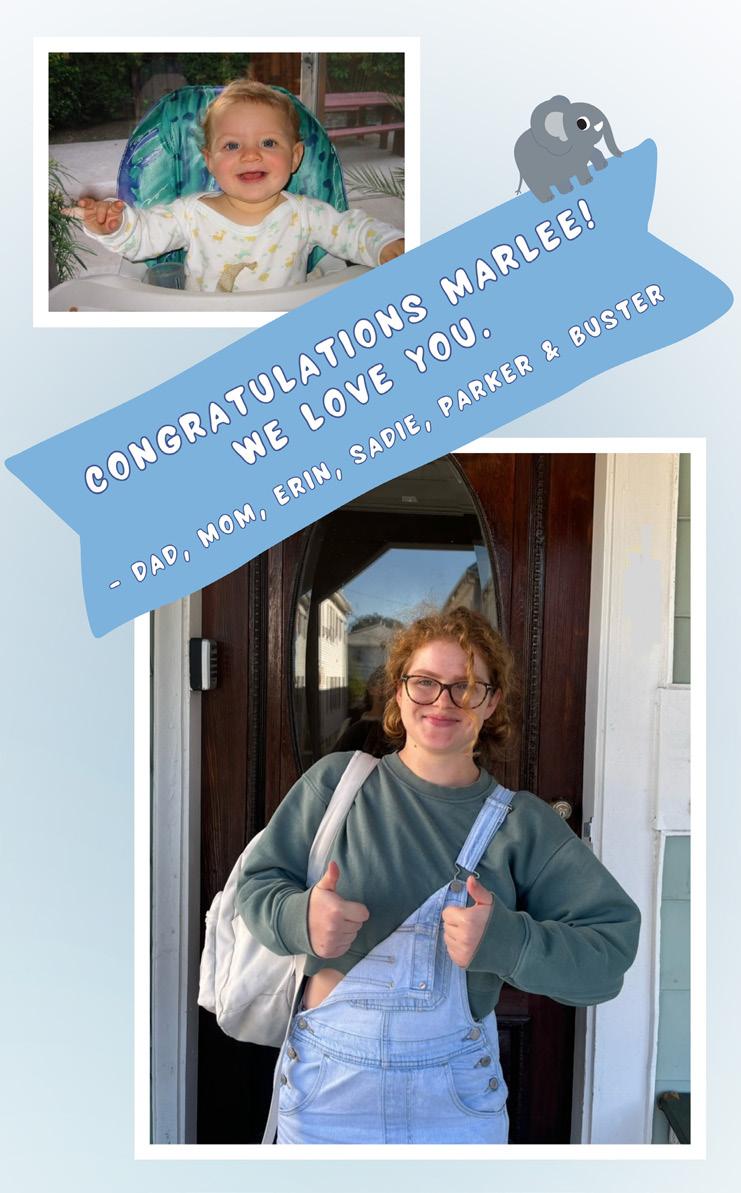
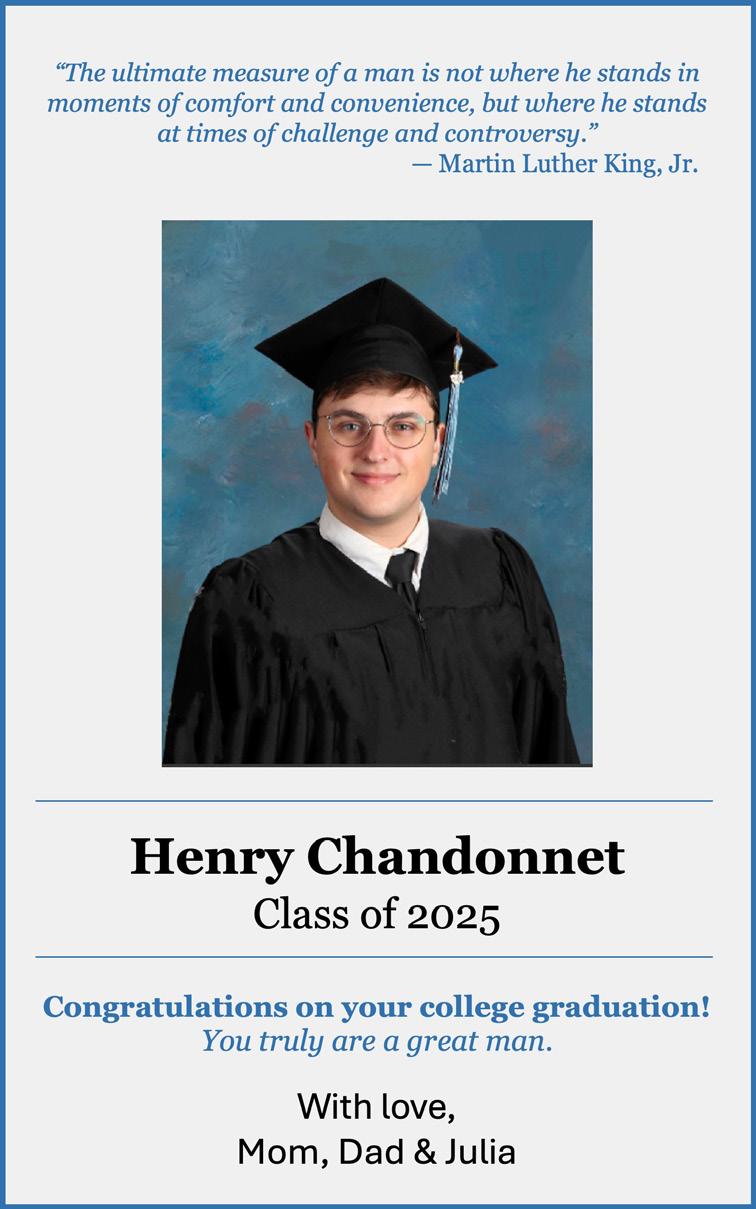
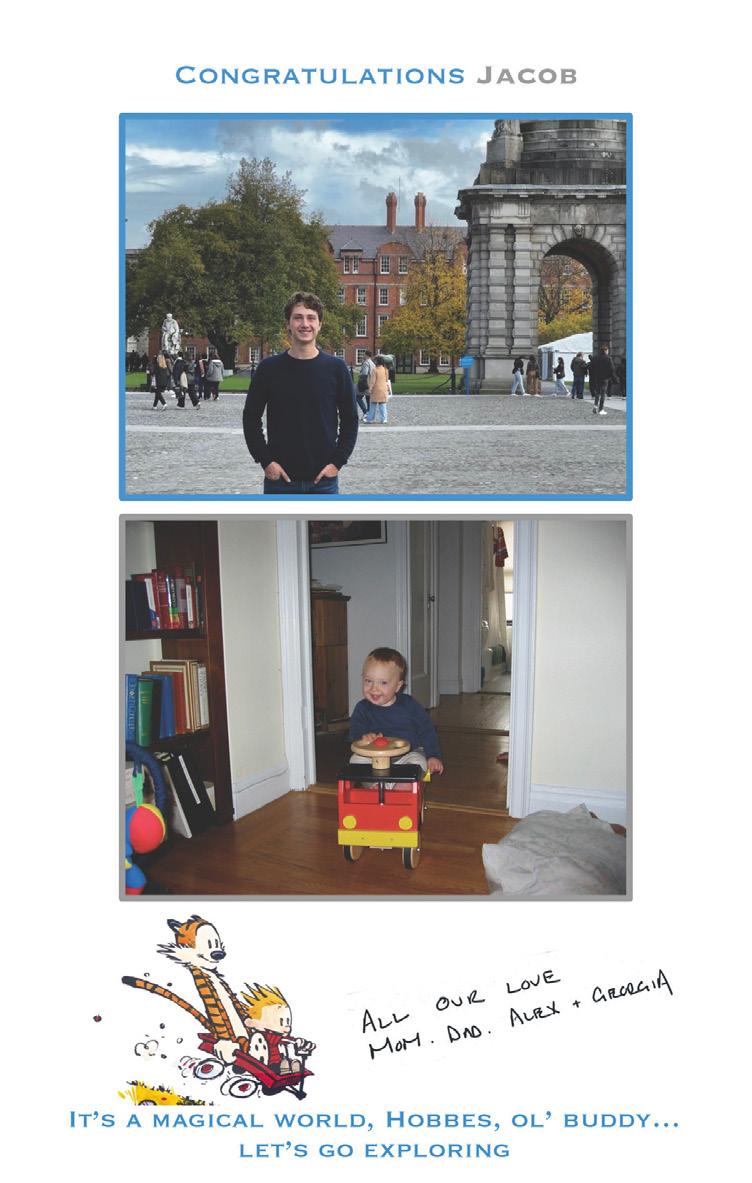
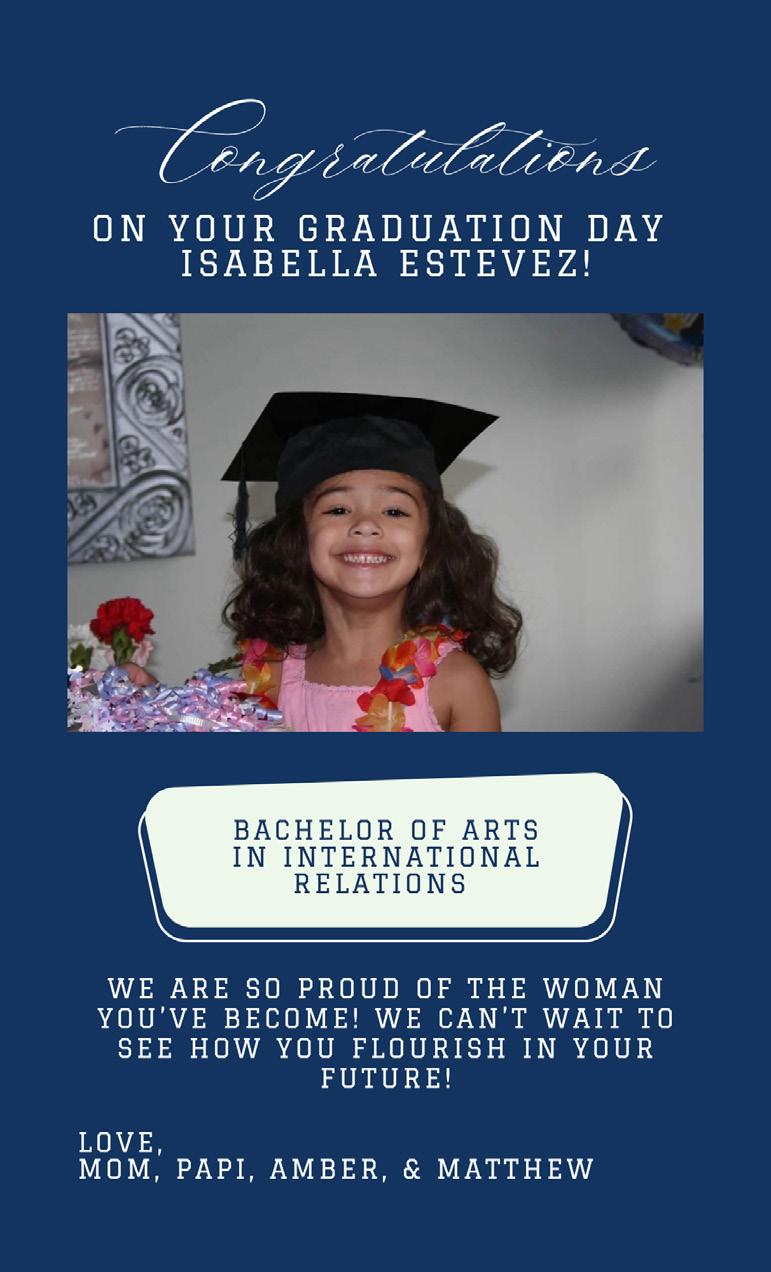
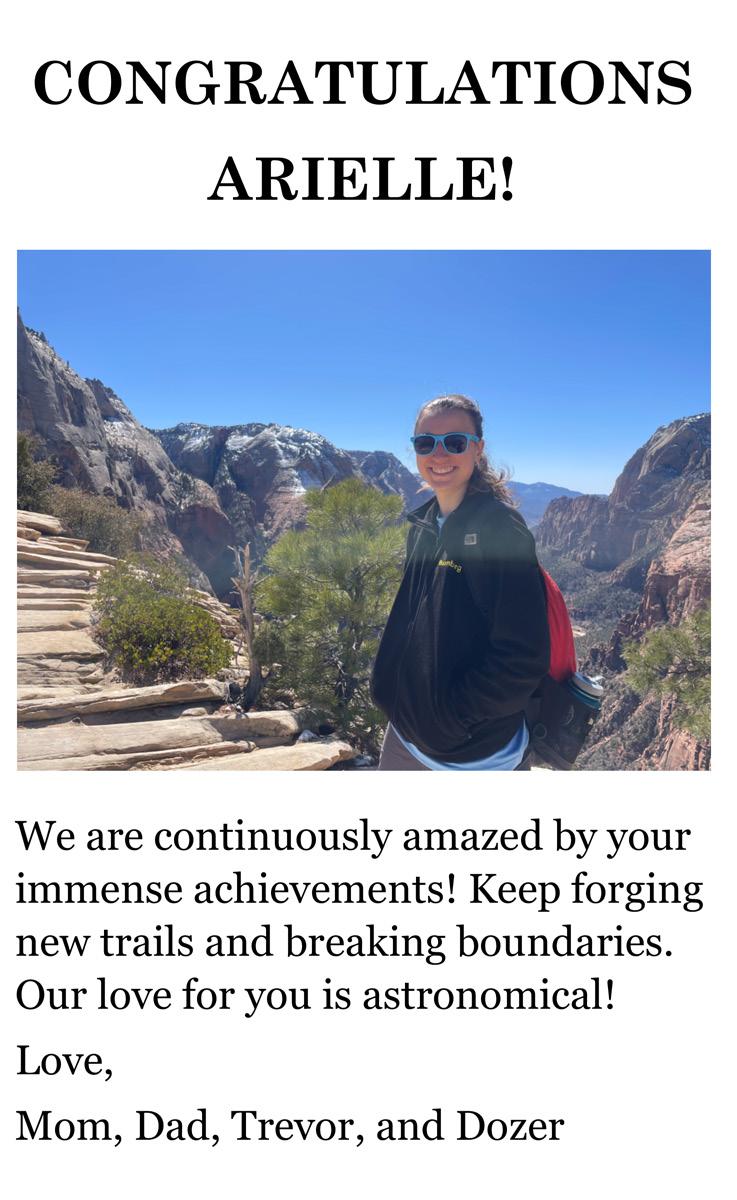
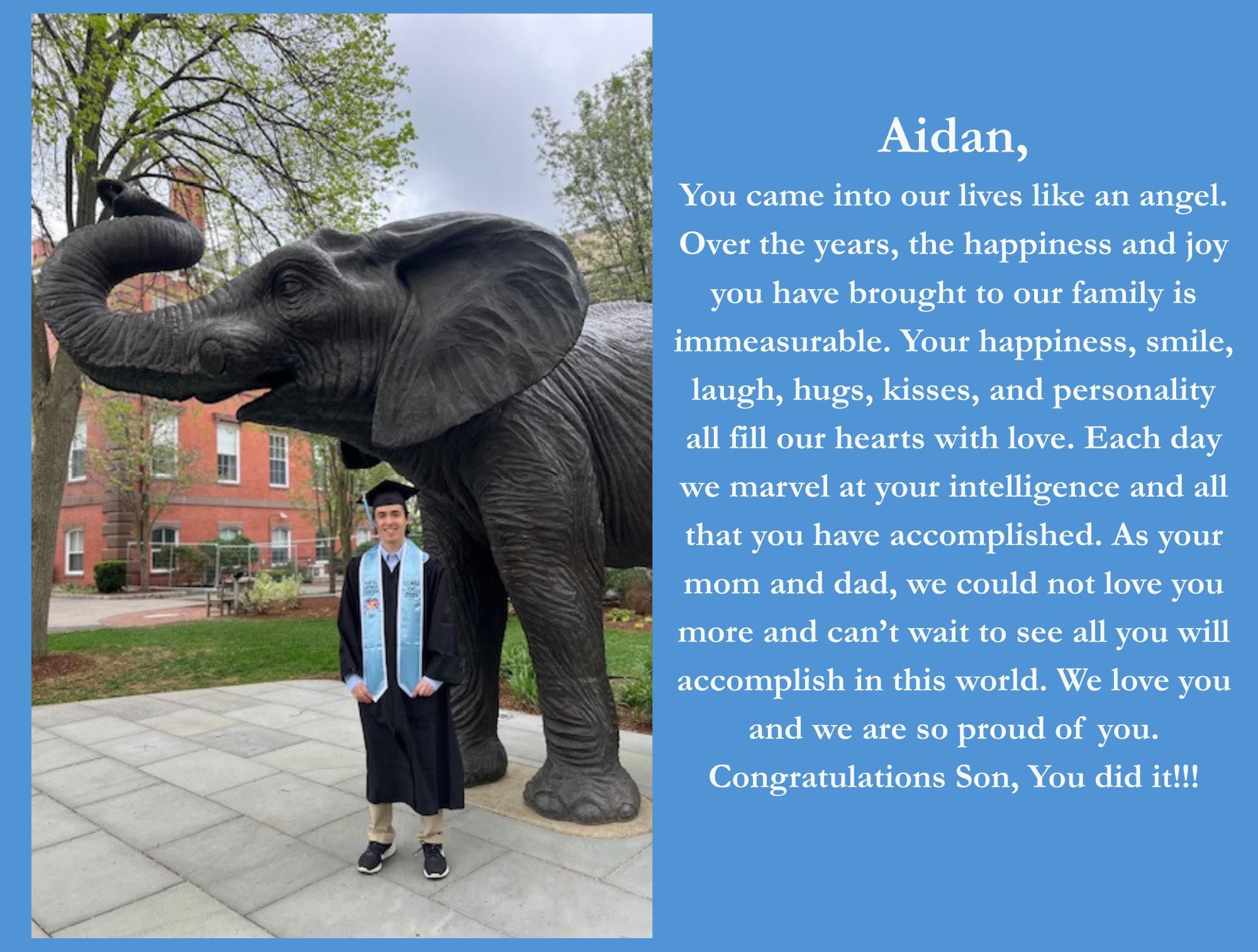
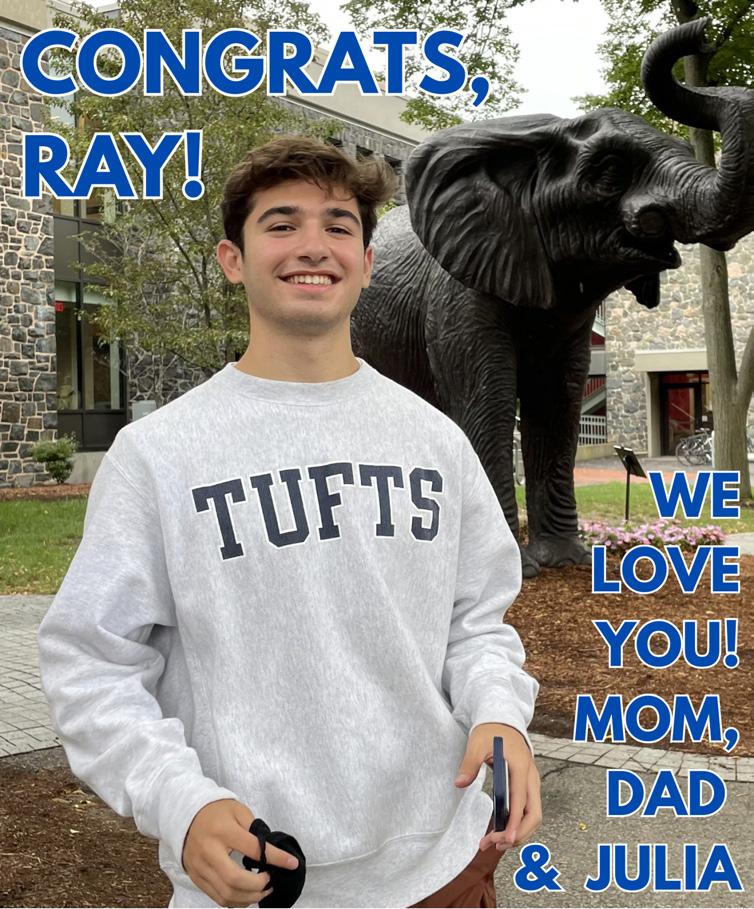
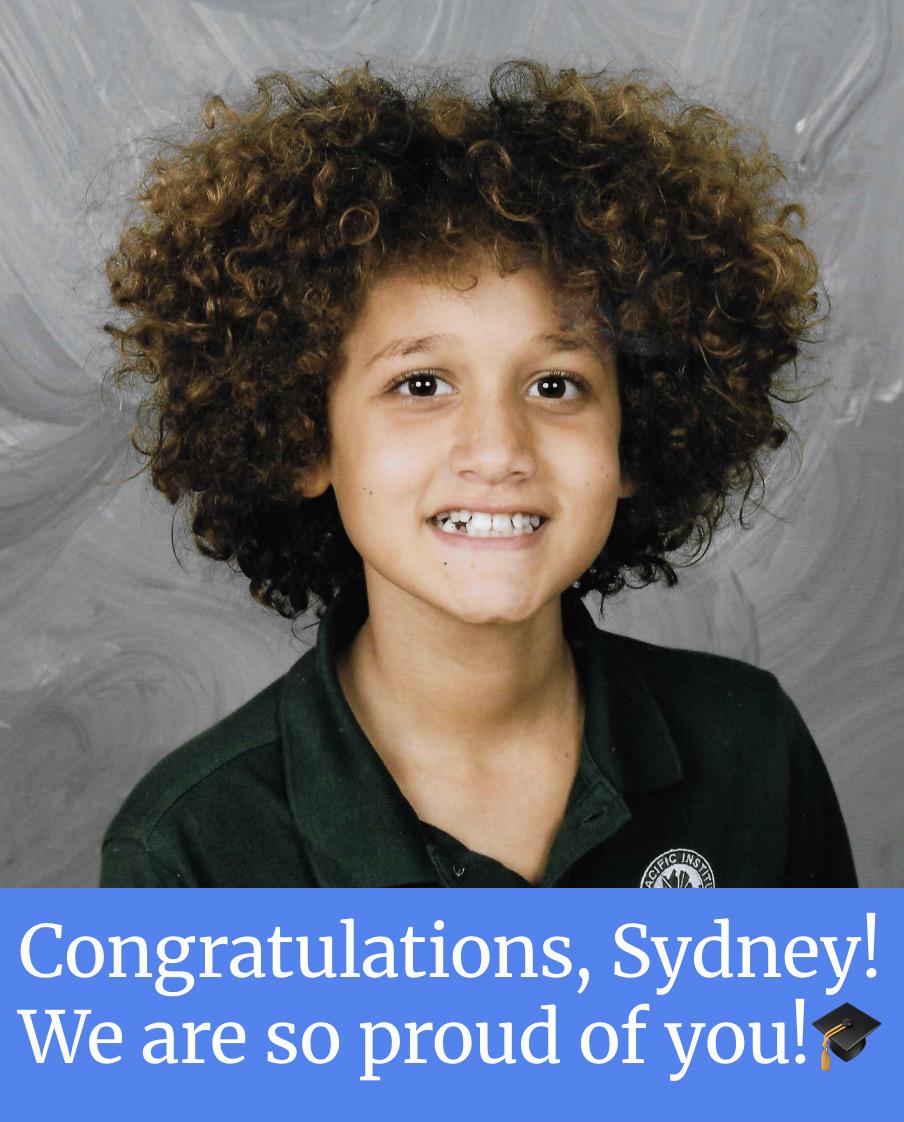


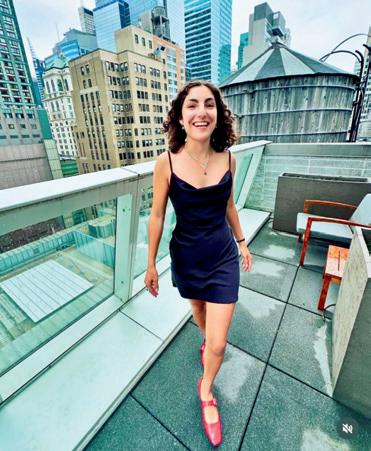
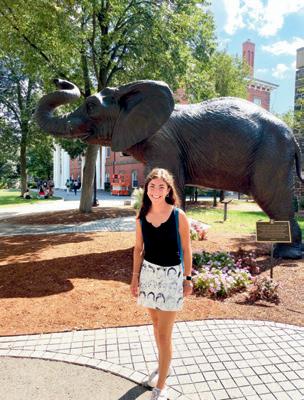



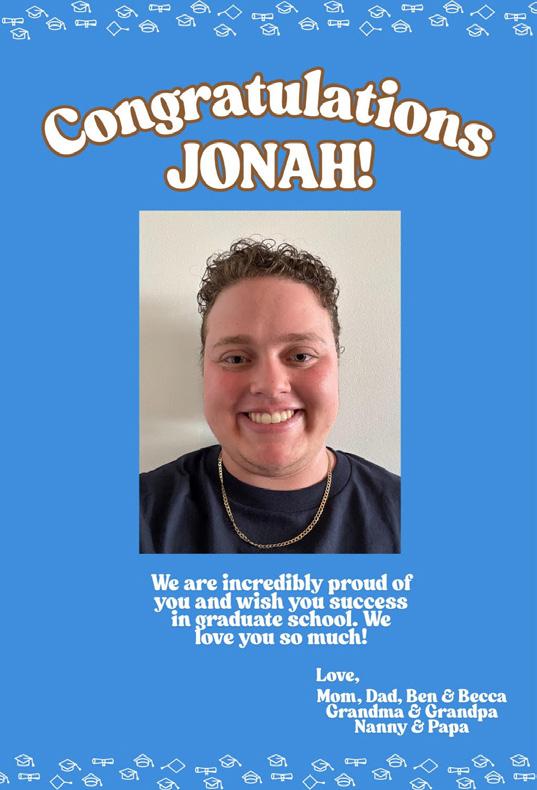
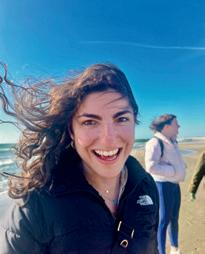
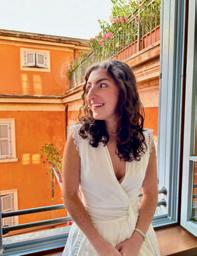

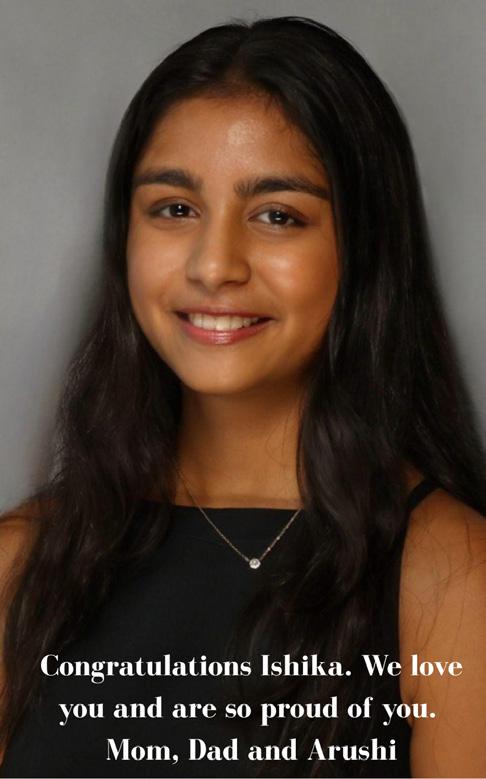
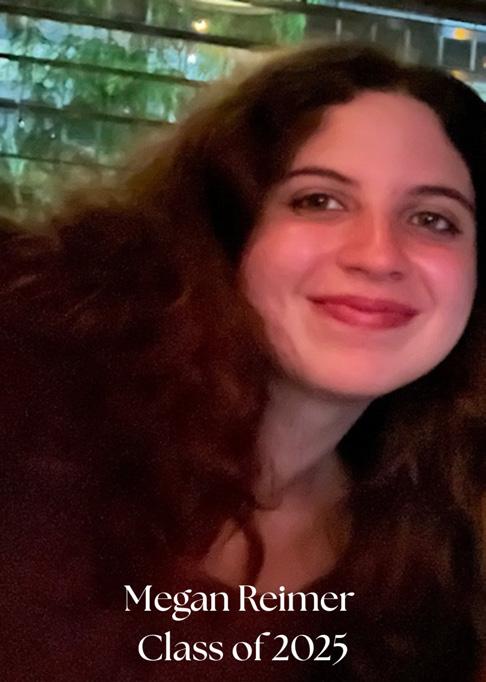
Not long after transferring, she joined the Tufts Mountain Club in search of community.
Editor’s note: The Daily’s editorial department acknowledges that this article is premised on a conflict of interest. This article is a special feature for Commencement 2025 that does not represent the Daily’s standard journalistic practices.
when asked to describe her four years at Tufts in a single sentence, graduating senior Carmen Smoak was inspired by words often attributed to writer and professor Joseph Campbell: “Say yes to the whole catastrophe.”
“It’s gonna be a mess, but it’s a beautiful mess,” Smoak said. “You might as well just say yes to the whole catastrophe and embrace it for all it’s worth.”
Smoak’s early college career was full of change: After a year at Rensselaer Polytechnic Institute, she transferred to Tufts. The move wasn’t exactly a surprise, especially as she realized that she wanted to pursue more diverse interests in academics and extracurriculars.
“I knew I wanted to transfer,” Smoak said, “I had gotten waitlisted from Tufts, and I really, really, really wanted to go to Tufts. The more I learned and the more I transitioned to this combining science and social thing, I was like, ‘Tufts is a place where I can really do that.’”
Smoak has successfully utilized Tufts’ interdisciplinary offerings — she is receiving a bachelor’s degree in applied environmental studies and science, technology and society.
“I transferred, and that was hard,” Smoak said. “It was starting fresh, completely, socially, academically, in a new place. I didn’t know anyone here, and so I just threw myself into TMC.”
Her first October at Tufts, Smoak applied and was chosen to be a coordinator for Peakend, TMC’s annual leaf-gazing trip to the Loj in the white Mountains of New Hampshire. w hile there, she stumbled upon The Mountain wanderer, a bookstore dedicated to mountain maps and guides. Inside, she found a book about hiking the “New Hampshire 48,” the 48 mountains in New Hampshire with peaks above 4,000 feet.
“I was flipping through [the book] and seeing the pages explaining how to do the hikes. I realized a lot of the hikes weren’t insane; this is an achievable goal.” Smoak said. “I was like, ‘I’m in a new place. I want to meet new people. I want adventures. I want all of these things that I didn’t get to have before.’ I wanted a goal that was just mine, something that I could really commit to. So I was like, ‘ what if I did that?’”
It didn’t take her long to get started.
“I was so anxious to start, so impatient. I got a few people from Peakend that were really into the idea of doing a night hike. we decided to nighthike one of the mountains … Tecumseh,” she said. “And then we went and we night-hiked it,
and it was awesome and silly and goofy. And I had so much fun with those people, and I’d never met some of them before.”
Her experience joining the Daily was just as spontaneous.
“I never in a million years thought that I would do journalism,” Smoak said. However, when pulled aside by the fall 2022 executive features editor, Mark Choi (LA’24), who told her that through the Features section, she could report in an area she loved — environmental science — she said yes.
As she spent more time on the Daily, she began exploring new subject matters to write about and rose in the ranks to be the executive editor of both the Features and Science sections.
“Here I am, three years later. I’ve been an exec twice, in two different sections,” Smoak said. “I’ve written articles about a lot of sparse topics — actually a lot fewer environmental articles than you’d think — because it became a way that I could explore stuff that I wasn’t learning in my classes.”
This semester, as the executive science editor, she’s been able to combine more of her academic interests into her writing, such as through an article she wrote based on her capstone project about solitary bees and an article on the science of film photography, using knowledge pulled from a class she took on the topic.
This film photography class has acted as a gateway for Smoak to learn more about her family’s history. At the beginning of the course, her father gave her an
old film camera that he had used throughout her childhood.
“[My dad] said to me, ‘Your mother gave this camera to me at our wedding as a wedding gift, and it has documented the first half of our family’s life,’” Smoak said. “I had this camera that has … documented our family’s life, but what if it could document more? what if it could document the history of our family, or another aspect of our family?”
while Smoak grew up in South Carolina, her grandparents hailed from Arlington, Mass., next door to the campus she now calls home. Her grandfather went to Tufts, and the couple were married in Goddard Chapel. Smoak enjoyed following in their footsteps and using photography to connect to their world, which she otherwise knew little about.
“It was really special to get to go and explore those places that are kind of responsible for my existence,” she said.
Smoak has also been a Sustainable Solutions Fellow in the Office of Sustainability since the beginning of her junior year, when the program began. In this position, she’s been able to do research and modelling that present tangible changes the university can make to improve sustainability. Recently, her work has focused on helping the university reduce emissions in response to a law that will likely soon be passed in the city of Somerville.
Smoak reflected on how her experience as a fellow has affected her view of the university as well as the future of sustainability on campus and beyond.
“I see [Tufts] from the inside,” she said. “I could tell you where energy for every building comes from, and seeing that as a system makes me understand both why it is so difficult to make sustainability change, but also I’ve been able to see how many people are passionate about doing it and that are trying. I think that’s been a little more reassuring. I actually feel like I’ve made progress; I feel like all of us in the fellowship are actually pushing a ball forward.”
Although Smoak has been busy with her academics, the Daily and her fellowship, she’s been able to make her way through much of the New Hampshire 48, one peak at a time. The experience has been just as, if not more, life-changing than expected.
“I got what I wanted out of it. I’ve made so many friends, and I’ve made so many memories, and I have so many silly pictures from hikes,” she said.
Reflecting back on the past three years, Smoak gave advice to her sophomore self.
“Nothing in the next three years is going to look like you think it’s going to look like, and the surprises are going to be the best parts,” she said. “And they are going to teach you more and take you more places than any of the things that you wanted to happen, or that you held so tightly on to.”
Smoak has now hiked 45 of the 48 mountains. During senior week, she plans to traverse the Bonds, the final three mountains on her quest.
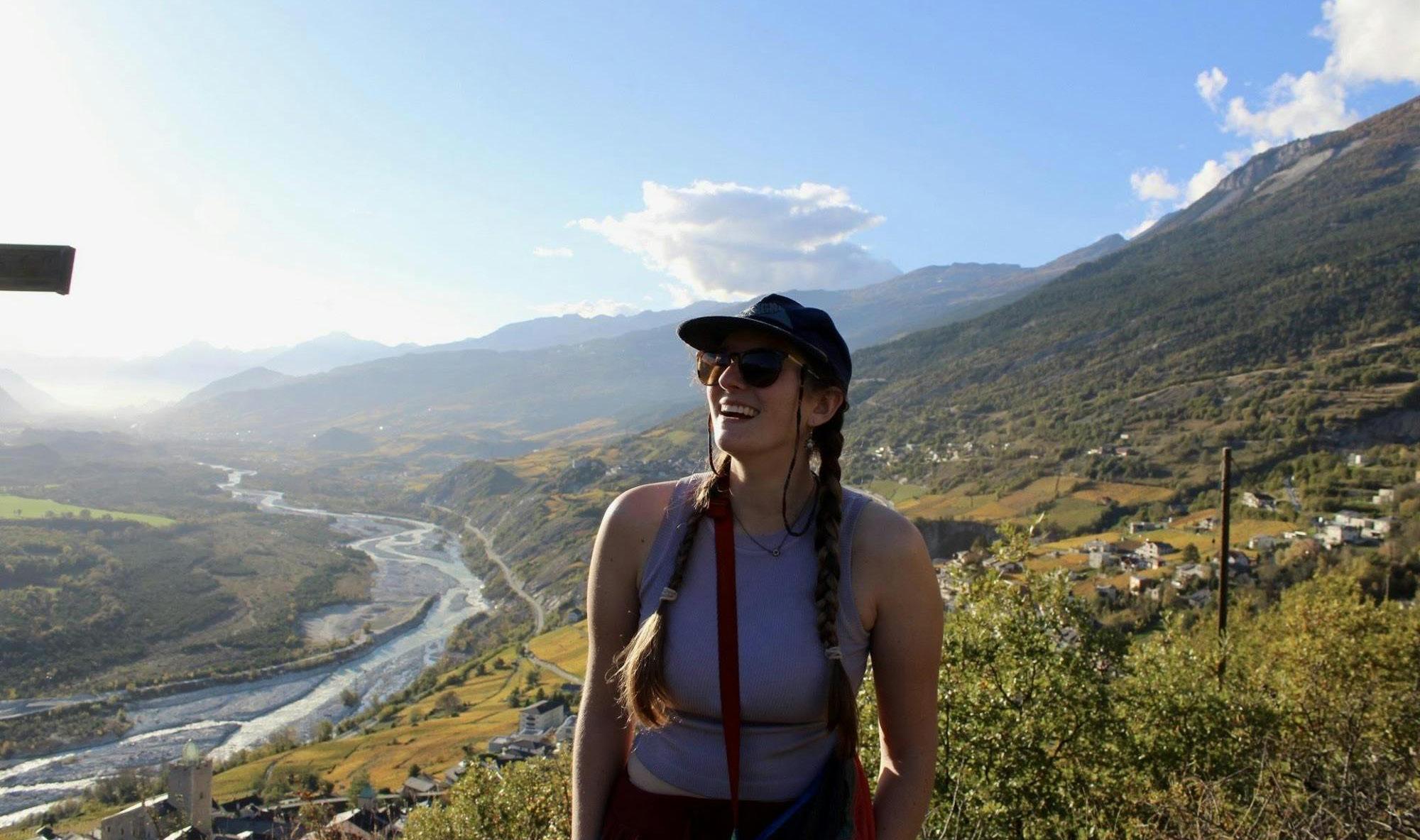
federal research funding, with the Department of Energy coming in second with 13.5%.
In the first 100 days of his presidency, President Donald Trump cut numerous federal jobs and proposed major slashes to budgets across government departments. Some of the departments among the hardest hit are those that fund and support research at universities across the country. Notable standouts include the Department of Health and Human Services, which houses the National Institutes of Health, as well as the National Oceanic and Atmospheric Administration. Additionally, the Trump administration has hit university research by placing restrictions on federal grant funding for university medical research.
These government funding cuts and their massive implications on universities raise the question: How interconnected are university research and government funding? To answer this, it’s important to understand the historical context.
Federal funding for research has been steadily on the rise for decades — with the NIH being the most funded agency — representing a larger trend of medical and health research receiving massive amounts of federal government funding.
Looking specifically into where HHS and NIH funding goes, the largest subcategories are projects researching cancer and those researching allergy and infectious diseases.
“It’s the densest concentration of academic talent in the world,” Lawrence Bacow, former president of both Harvard and Tufts, said in an interview with The New York Times. “Universities and teaching hospitals are to Boston what cars are to Detroit, what energy
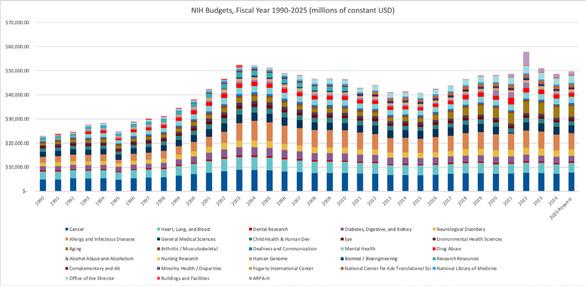
So what do cuts to these research budgets mean for Tufts?
In the fiscal year 2024, Tufts was awarded almost $86 million by the NIH alone, with over $13 million awarded to the Medford/ Somerville campus and over $72 million awarded to the Boston campus. This budget rose to $115.2 million in 2025.
without this funding, Tufts would face difficulties running as a research institution, and its loss would be massively detrimental to the university. Because of this, Tufts, along with 12 other

HHS has historically been the governmental department with the largest federal research funding obligation for basic research, meaning it provides the largest percentage of federal funding for basic research. In 2023, the research funding obligation of HHS was 49.1% of total
impacted universities, filed a lawsuit against the NIH and HHS in February.
Tufts is not alone in this struggle for funding. Boston is feeling this threat as a city made up of universities and research institutions that brands itself as a hub for research and innovation.
is to Houston or finance is to New York.”
Boston was built on the economic influx that came from education and research institutions. Today, it is home to many higher education facilities and multiple research hospitals, all of which are threatened by research funding cuts.
In response to the Trump administration’s order, Massachusetts, along with 15 other states, filed suit against the administration in April for its “unlawful attempt to disrupt grant funding issued by the National Institutes of Health.”
This suit comes out of the same push as Tufts’ February lawsuit and shows a commitment by research institutions to fight for their funding and the essential services they provide to the American public.
w hat exactly will happen with research funding is still unclear due to the multiple lawsuits filed and ever-evolving orders from the Trump administration. w hat we can be sure of, however, is that this semester will be remembered as a significant moment in institutional memory due to the consequences of these cuts.
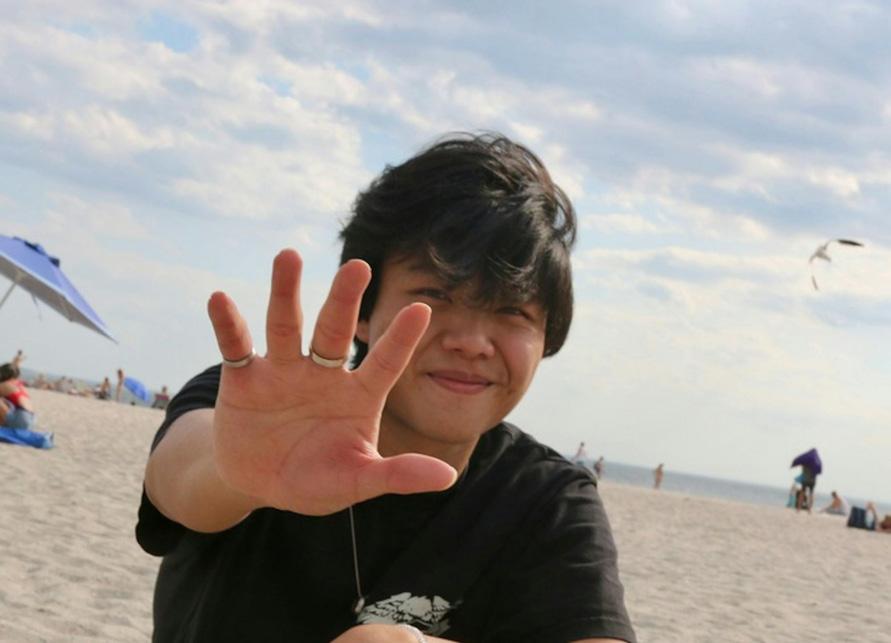
Merry Jiao Senior Staff Writer
Editor’s note: The Daily’s editorial department acknowledges that this article is premised on a conflict of interest. This article is a special feature for Commencement 2025 that does not represent the Daily’s standard journalistic practices.
From sledding down Prez Lawn on laundry basket lids to running half-marathons with friends, Ian Lau, a graduating senior and a former photo and science executive for the Daily, has had what can only be described as a whirlwind four years filled with lifelong friends, supportive communities and unforgettable memories. Now, about to graduate with a degree in biology and biotechnology, he can confidently say that coming to Tufts was one of the best decisions he’s ever made.
But it wasn’t always that easy, especially in the beginning. Transitioning into college can be quite a bit of an adjustment.
“I think I came to college quite guarded, in a sense, in the way that I was not ready to open myself up yet to the idea of the college experience, living independently and engaging with all these different school communities,” Lau said.
But gradually, through his classes, extracurricular experiences and community involvement, Lau was able to slowly find a home at Tufts. In particular, the Daily was one of the first organizations he joined where he felt like he belonged.
“[The Daily] was a pretty integral part of my extracurricular [undergraduate] experience,” Lau said. “The photo section [was] a good, low barrier way for me to just get involved … and it was really fun.”
Going into his second semester, Lau’s involvement at the Daily continued to grow. Under the encouragement of Alex Viveros (LA’22), former editor-in-chief and section founder, he joined the newly budding Science section. But, even more importantly than rediscovering his interest in writing and scientific journalism, Lau found a small place of belonging.
From going on ice skating trips to bonding with STEM and non-STEM majors alike, Lau’s time as executive science editor was one of building community and encouraging up-and-coming writers to shine.
“Those experiences early on … gave me a lot of confidence in terms of what I could do going forward,” Lau said. “It taught me journalism, but also how to build community, how to be a good leader, set an example and how to show up when needed.”
To Lau, the Daily was the place where he found his confidence, not just in writing but also in mentorship.
“Another really important, gratifying part of the whole experience is also seeing the science members, or the photo members
who join your section … grow and get more involved with the Daily,” he said.
with that newfound confidence, Lau also found himself expanding beyond the Daily toward other Tufts communities, including discovering the vibrant, supportive programs at the Asian American Center.
“You meet people from so many different walks of life,” he said. “[ when I] joined the Asian American Center, that really opened up my world view, or perspective, of what the Asian American identity can be and what it means for me.”
In addition to becoming a mentor for incoming students with the center’s Peer Leader Program, Lau also found new confidants and friends alike within the program.
“Joining as a mentor was not only important for inward reflection and learning, but also that I got to meet so many other upperclassmen and mentors for myself who then introduced me to other communities that I’m now a part of still at Tufts,” he said.
Looking to the future, Lau is hoping to pursue a path that reflects his undergraduate experiences of building community and nurturing connections.
“At the center of a lot of these experiences has been having and fostering these intimate relationships with people,” he said. “The biggest thing for me has been pursuing interests that don’t even necessarily have to align with my academic interests but more so [with] personal values and what is rewarding and gratifying.”
Perhaps healthcare?
“Caretaking has been pretty important to me in different senses of the word,” he mused.
Or maybe journalism?
“For me, something that’s shown up throughout undergrad is how important the power of words [is] and how you articulate them in writing,” he said.
Ultimately, though, his goal will always be to help support others.
“Regardless of what profession I’m doing in the future, something that’s front of mind for me is … to prioritize who it is we’re communicating information or ideas to and how it’ll benefit them,” he said.
For the incoming class of Jumbos eyeing college with a jumbled mix of excitement and trepidation, Lau offered some tips to jump-start their journey.
“Remain persistent, and if there’s something you really want to do or go for or want to pursue and you’re interested in, just go for it,” he said. “College is the best time you have for that.”
As for the rest of us, Lau leaves us with some parting words of wisdom to take to heart.
“Be confident in yourself, take risks and give yourself a little bit of grace,” he said. “Sometimes, you just need a little reminder that you are human too.”
Carpi and Sarah Svahn Senior Staff Writer and Contributing Writer
If you ask Malia Brandt her first impression of her roommate, Jove Gorsline, her response is simple: “we vibed.” Ray Feinleib thought Richard Diamond was jacked. For Anita Raj and Sara Francis, a mutual love of fantasy novels sealed the deal. Carlos Pulido thought, “wait, I could be friends with this guy,” about his roommate Max Foley. All of these graduating seniors have been college roommates from orientation week to commencement.
Every Tufts student has a story to tell about their first-year random roommate — especially because just a few questions on a survey is all that determines your fate. Most roommates’ stories end the following May, when the pair parts ways in exchange for a sophomore year suite or dorm shared with closer friends. But for a lucky few, the algorithm finds a perfect match.
Our story — “our” meaning the authors — began in Room 415 of Tilton Hall. Having only shared a few Instagram DMs — and a deep dive into Julia Carpi’s high school film portfolio on Sarah Svahn’s part — we had no idea if we were set up for success.
Our friendship grew in the quieter moments of our first year: in late nights spent folding laundry and chatting, shared nail salon appointments in Davis Square and shameless hunts around campus to find frat parties.
Most four-year roommate pairs found a safe haven in each other
during the first few weeks of college life, but not without braving some trial and error.
Diamond had just stepped off the baseball field when he checked his roommate assignment to see that he had been placed in a quad in west Hall with three girls. Despite the shock, Diamond tried to remain open-minded.
“Maybe it’s not a mistake, maybe this is what college is,” Diamond said. Eventually, the Office of Residential Life and Learning reassigned Diamond to a different quad in west with Feinleib and two other roommates.
It only took until the second night of college, at a mixer on the Academic Quad, for the pair to know that they were going to be friends.
“I kind of realized that, of the people I was talking to, I didn’t actually want to be friends with any of them more than I wanted to be friends with Ray,” Diamond said.
For Raj and Francis, it was at the halfway point of the year that they transitioned from roommates to friends.
Raj called a late night run-in with a family of spiders a “serious trauma bonding” experience for the pair. when they discovered thousands of baby spiders on their ceiling at 2 a.m., they called their resident assistant, killed the mother spider, booked a room at the Hyatt hotel and spent three nights living together away from their dorm in Metcalf Hall.
Pulido and Foley were fast friends. Having never been to the
area before college, Pulido found a tour guide in Boston-local Foley, who introduced him to the Tufts campus, downtown Boston and the ins and outs of riding the MBTA. At night, the two would scoot to the edge of their beds to talk across their U-shaped triple in Carmichael Hall.
From Boston geography to dorm layouts, this pair bridged the distance.
“In high school, I was only really friends with girls,” Pulido said. Now, he calls Foley his ride-or-die.
Gorsline and Brandt’s friendship story simmered more slowly, guided by Thursday nights spent sharing a mini rice cooker in their double in Miller Hall.
“Rice nights” — as the pair called them — provided refuge from the dining halls and opportunities for the two to bond.
After surviving their first year together, the pairs braved their next Tufts milestone: the lottery for sophomore housing.
Pulido and Foley downsized to a double room in Lewis Hall. Gorsline and Brandt relocated to Harleston Hall. Raj and Francis, with a third roommate, moved into a Stratton Hall triple. Feinleib and Diamond also adopted a new roommate and made the trek downhill to Lewis.
For all four pairs, their journey as roommates didn’t end as underclassmen. Each moved into an off-campus house after their sophomore year, where they have rounded out their Tufts experiences.
Living together for four years is a consistent commitment to
communication and compassion — we can corroborate.
“It’s always good to have boundaries and rules, especially with roommates, just so that you can be clear about things. But at the same time you have to be flexible with each other,” Raj said.
For Foley, the recipe to being four-year roommates is even simpler. “Just be considerate,” he said.
“I think you and I somehow started as friends and then became roommates around that,” Feinleib said about Diamond.
Comparing themselves to an old married couple, the two joked about the importance of sleeping in separate bedrooms, having never truly shared a bedroom themselves.
“we’ve never had any of the actual roommate-ness of roommates,” Feinleib said.
Regardless, they tackled the typical roommate topics. Diamond assumes the role of “CDO” — chief dishwashing operator — which he takes very seriously. Feinleib is the opposite.
“I think you exist really well without routine, in a way that I could never,” Diamond said to Feinleib. Diamond’s sentiment rings true across the roommate pairs — opposites attract.
Pulido is the planner. Foley is spontaneous and “always down.”
Although Gorsline and Brandt found shared social spaces in Tufts’ Asian community and cite similarities, they found their own version of balance.
Brandt is a mechanical engineering student — and the
introvert of the pair. Gorsline, a psychology major, is the conversation starter. “You love to chat,” Brandt said to Gorsline.
Ultimately, there is a deep understanding of one another that comes with being a four-year roommate.
Feinleib can name the exact brand of cereal Diamond eats without fail at the end of each day (Kashi GO Protein & Fiber Cereal).
The two of us can deduce an entire conversation from a glance shared across a room, and we know which of us has last used the bathroom based on the shape of the dried-up contact lenses on the floor.
For all of the pairs, the highlight of sharing physical spaces has been the conversations that have unfolded within them.
Neither of us can imagine a Tufts experience that didn’t involve endless conversations shared between twin XLs or across the third floor of our off-campus house, which we call the “penthouse.”
Julia is the best listener Sarah has ever met. Sarah is the funniest person Julia knows. we have guided each other through four years of growing up.
what’s next? The end of college is near. Some roommate pairs will continue to live together post-grad, while others will miss the time they spent sharing a space. As for us, we’re never leaving each other.
So, is there a secret to being a four-year roommate? Maybe it’s luck, maybe it’s innate compatibility, maybe it’s Thursday rice nights.
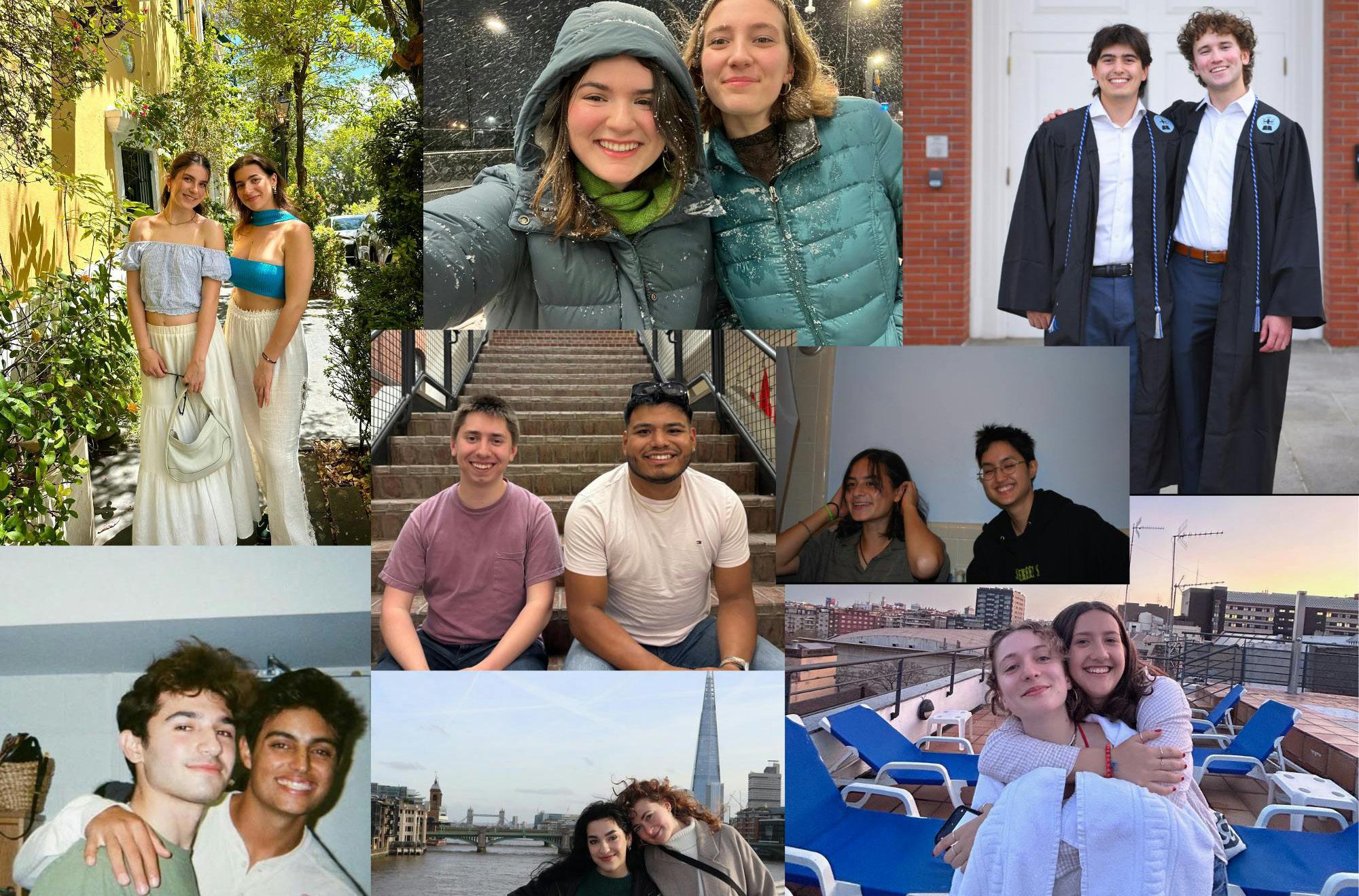
A multimedia installation starring leafcutter ant patterns. Chinese Mexican identity explored through early 20th-century printmaking. These are just a couple of projects that students are pursuing as they finish the SMFA Combined Degree program, where students spend five years earning two degrees simultaneously: a Bachelor of Fine Arts from the School of the Museum of Fine Arts at Tufts University and a Bachelor of Art or Bachelor of Science from the School of Arts and Sciences.
Anneke Chan, a graduating fifth-year student studying international literary and visual studies, emphasized how rare it is to find an opportunity to pursue two different kinds of passions.
“I like to make art, and I felt invested in that. I didn’t want to feel like I was making some sort of compromise between that and pursuing a liberal arts education,” Chan said.
This breadth enables Adrian wong, a graduating fifth-year student majoring in film and media studies, to refine different aspects of his practice.
“I think of my SMFA classes as more like conceptual sandboxes for me to exercise theory,” wong said. “whereas my program at Tufts, the film program, is more practical and technical.”
Sometimes, there is little to no crossover between the degrees. Graduating fifth-year Ava Sakamoto is majoring in community health while fulfilling requirements for medical school. They expressed how frustrating it is that art can be seen as a hobby to be sacrificed for other endeavors.
“I’ve always really liked art as a kid,” Sakamoto said. “People were like, ‘Ava, you’re so smart, but as you get older, you’re going to leave that all behind, right?’ … Like [they’re] saying an artist can’t be as successful as a doctor.”
For Isabella Arabia, their major in biopsychology and their SMFA studio classes go hand in hand. They are graduating this May after only four years in the Combined Dzegree program and will start their master’s degree in biology at Tufts this fall.
“Now I’m more interested in ecology and animal behavior, but it still feels like there’s this kind of perfection in nature and biology that I find really beautiful, and my art is a way for me to explore my interest in science in a different way,” Arabia said. “My art practice now is all about my science and my research, and that allows it to be kind of cohesive.”
To culminate their studies, combined-degree students have the option of doing a semester-long SMFA senior thesis or a yearlong senior honors thesis for their Arts and Sciences degree. This year, SMFA removed selectivity from the thesis experience, allowing any student to embark on one if they choose. Sakamoto is working on a joint SMFA senior thesis with her friend Mimi, but she acknowledges that there are some glaring challenges.
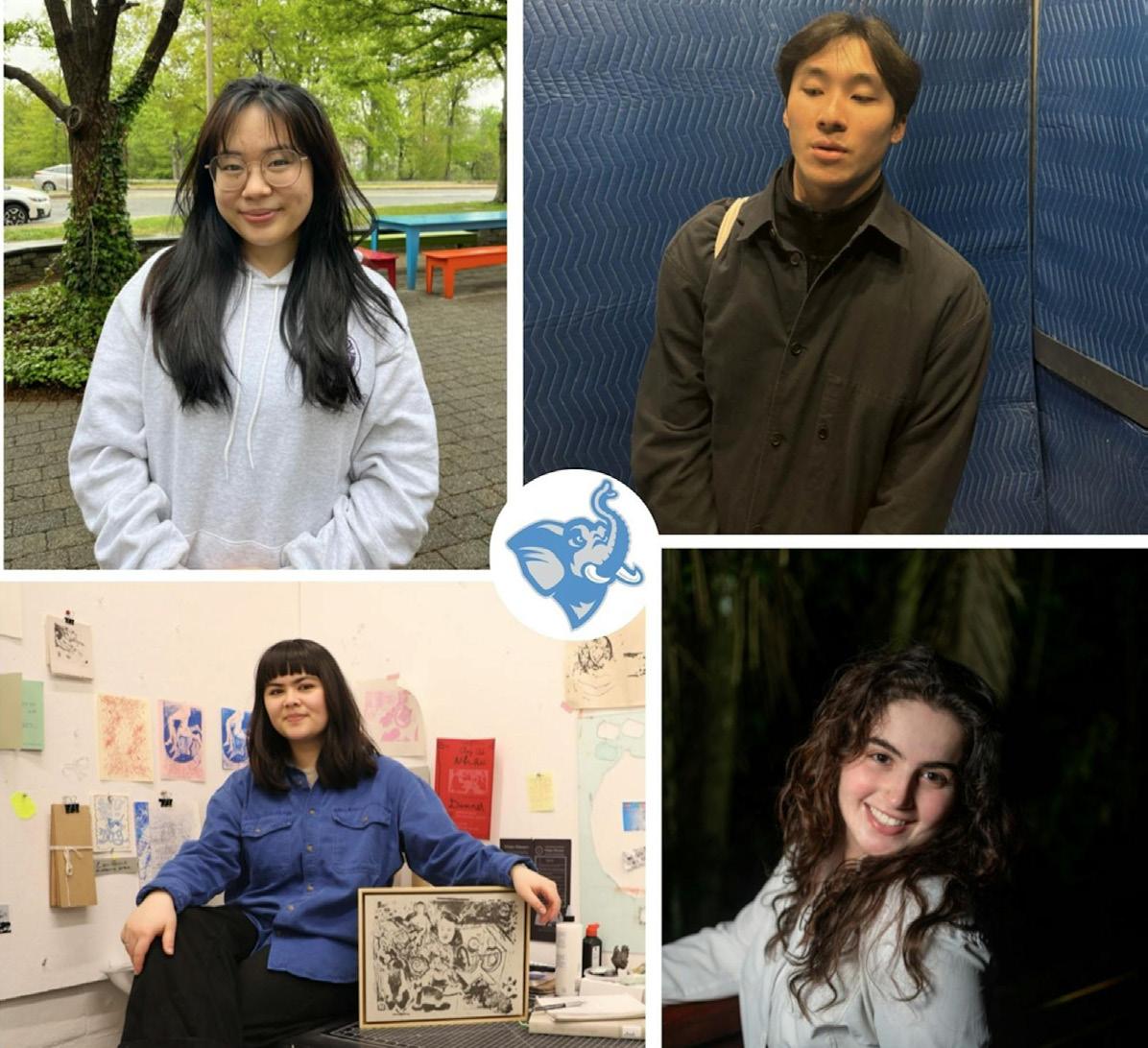
“First of all, it’s only a semester, so that already is [a] time crunch. But then the second thing is, there’s not a lot of opportunities for funding,” Sakamoto said.
Many applications for funding close before students commit to doing a thesis, leaving them have to pay for physical material costs out of pocket. Better guidance and funding infrastructure could be a major help in reducing this financial barrier.
Many combined-degree students choose to live near Medford/Somerville campus, which Sakamoto attributes to the larger student population, student organizations and frequent events.
“I feel like the BFA people are more closely intertwined,” Sakamoto said. “The combined-degree people tend to gravitate toward staying closer to Medford.”
Having a foot in each world can be tricky. Arabia, who attended a conservative high school in South Florida, had initially expected to fit in more with the creative community at SMFA but ended up feeling more at home on the Medford/ Somerville campus after being a resident assistant there since her sophomore year.
“I still felt like, when I came to SMFA, I didn’t fit in, but in a different way,” Arabia said. “At that point in time, it felt like you [had] to dress in a certain way to be considered a real artist, or you [had] to act a certain way, or like certain things. … There’s some
kind of pressure. And then at Tufts, people just don’t take your art degree seriously.”
The typical Class of 2025 combined-degree student started their college career during the height of the COVID-19 pandemic. Chan expressed gratitude for the five-year pacing of the Combined Degree program, especially considering the health restrictions that governed the beginning of her college experience. It’s during the latter half of her time at Tufts that Chan was really able to hone in on her interests in printmaking and book arts, as well as integrate her studio practice with research from her international visual and literary studies major.
“Having matriculated in fall of 2020, I feel like I’ve seen the campus go through many versions of itself,” Chan said.
For strengthening her skills, Chan shared her appreciation for having one more year in college than a typical undergraduate student.
“I really do value having the extra time in this space to understand the kind of creator and thinker and person that I want to be, and also to grow alongside new people and old people.”
However, the fifth year of the program can entail major social shifts. Unlike other undergraduates, combined-degree students watch their peers who entered college with them graduate a year before they do. wong described how most of his Tufts friends are now alumni but how he’s lucky
that some remain in the Greater Boston area and do not let distance or circumstance hinder their relationships.
“I remember, when we were all still in school together … there was this whole family aspect that I really miss nowadays because a lot of my friends aren’t in this vicinity,” wong said. “At the same time, it’s also so validating that so many of my friends have always made the trek to come to my house. … I think it’s really sweet.”
For wong, it can sometimes be easier to resonate with faculty than with younger students. He finds that meeting individually with professors is very accessible at Tufts, where one conversation can lead to another, and common hobbies can become the foundation of friendship.
“Me and one of the art history professors, we do radio together sometimes, and then we talk a lot about music and art. I think that’s amazing because I got to bond with him on a really casual level,” wong said. “Another professor, who I’m studio assisting at the SMFA, we cycle together because we both have this shared obsession.”
All four of these students are heavily involved in campus life and have diverse extracurricular responsibilities. Sakamoto described many combined-degree students, including themself, as “bonkers” for pursuing demanding workloads, which can result in a lot of cumulative stress.
“Everyone is so exhausted right now,” Sakamoto said. “The
pressure [of], ‘I have to leave the comfort of academia and [go] into the workforce soon,’ is getting to be very real.”
wong echoed this sentiment, reflecting on how much his fifth year has impacted him as graduation approaches.
“I definitely feel like I’ve changed a lot. I don’t know if I’ve matured, necessarily. Maybe I’ve become more cynical about the world because I’m about to leave this safe haven, this bubble,” wong said. “Tufts has meant a lot to me, and I feel so familiar and comfortable in this place, so I think the transition is very jarring for me.”
Regardless of where they end up next, these combined-degree students are keen to leave things better than the state they found them in. Their rigorous commitment to interdisciplinary education is bound to shape the way they move through future internships, jobs and higher degrees. Some of them are showcasing their work at the SMFA Senior Thesis Exhibition, where you can learn more about how they dovetail their identities as artists, researchers, scientists and so on.
“It’s hard to define yourself as one or the other,” Arabia said. “I hope one day, after getting a Ph.D. and maybe going into academia — who knows — I can bring the art back in because it’s really important to me and how I see the world and how I want my contribution to the world to be.”
Certain students in the Class of 2025 will be the first, and only, people to graduate from Tufts with their specific major. what do they all have in common? well, on an official level, they’ll each receive a bachelor’s degree in interdisciplinary studies, even though this one degree spans across and beyond the academic concentrations Tufts offers.
This program lets students design their own major that bridges at least three fields of study, culminating in a senior thesis or project. Currently, there are 20 undergraduate students enrolled in the interdisciplinary major, including Isaac Gewirth, Kyle Hammond and Viviana Stulack, who are all graduating seniors.
Stulack came to Tufts thinking she would major in cognitive and brain sciences.
After taking “Children & Mass Media” with Julie Dobrow, who is the program director of the Center for Interdisciplinary Studies, Stulack found a gap in the academic conversation that she was passionate about filling.
“ when it came to different films we were watching or TV shows that we were referencing in our papers, there wasn’t really a space to be discussing how people of different economic classes were being represented
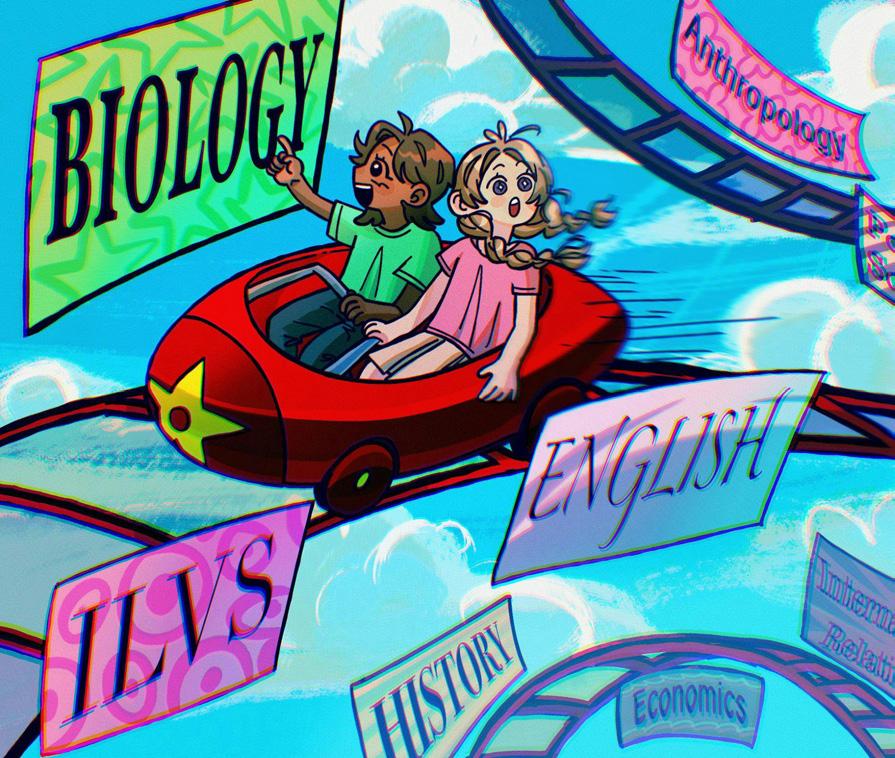
four courses here,” Dobrow said. “There’s some sort of unifying theme that brings all of these different disciplines together.”
Hammond identified the through line in all his courses as “how systems affect people and how people affect the systems.” He titled his major “Human, Business, and Social Development,” which encom -

and not being represented at all,” Stulack said.
Dobrow encouraged her to propose an interdisciplinary major addressing these issues. Stulack chose to title it “Equity and Inclusion in Children’s Media,” combining film and media studies, sociology and civic studies.
Unlike other majors, the interdisciplinary major requires an application and interview process during undergraduates’ sophomore spring. Students must demonstrate that their interest truly falls outside of the traditional major and minor structure.
“[The major is] more than just taking three courses here and
passes economics, sociology, entrepreneurship and urban and environmental policy and planning. The latter two are not offered as standalone majors at Tufts, but Hammond was able to center them in his exploration of how communities build economies.
Occasionally, students will use the major to study within an established interdisciplinary field. That’s what Gewirth did, although at first they didn’t know their area of interest already had a name: material culture studies.
“Rather than studying fine art, it’s studying normal objects of our everyday life,” Gewirth said. Their major lies at the
intersection of art history, anthropology and sociology.
As a woodworker and combined-degree student in the School of the Museum of Fine Arts, Gewirth felt this major “dovetailed well” with their artistic practice.
“I like to contextualize what I’m making physically with a theoretical approach,” Gewirth said. “As I began making furniture, I was really struck by how my identity … became invested in those objects.”
These interdisciplinary students forged unique paths through Tufts’ various departments — and even further afield into international collaborations.
As a Laidlaw Scholar, Hammond had the opportunity to conduct research in Kampala, Uganda, with Tufts professor Justin Hollander and the Urban Action Lab at Makerere University. Hammond’s field studies evolved into his senior thesis about the social and environmental impacts of human settlement in wetland areas, and how communities respond to the interlinked challenges of urbanization and climate change. Hammond pointed to relationship-building and informal interviews as core to his research methods.
“Once people realize, ‘This guy’s not here to take advantage of us,’ [they realize I] really want to understand what’s going on in person,” Hammond said.
Inspired by this work, Hammond plans to return to Tufts next year to complete his master’s degree in urban and environmental policy and planning. Beside academia, he’s also exercising the business component of his major through his faith-based clothing brand, Don’t Sell Your Spirit For Society.
“Being involved in different faith communities on campus and taking entrepreneurship classes, I gained the ability to
After graduation, along with teaching woodcraft at the Eliot School of Fine & Applied Arts, Gewirth will continue working with the designer Mitch Ryerson to make furniture and other projects, including wooden playgrounds that can be spotted at public parks in the Boston area. Gewirth will also have studio space to work on independent projects.
“My favorite thing I’ve made is always the next thing,” Gewirth said.
Stulack also incorporated a creative element into her thesis work. Stulack has a second major in child study and human development, getting the best of both worlds of a structured major and self-designed program. For her interdisciplinary thesis, Stulack wrote a traditional scholarly paper analyzing representations of poverty in children’s media, as well as a pilot episode for a children’s TV show that gave voice to the same topics in a child-friendly format.
[market] my own products,” Hammond said.
All three of these students notably expressed an entrepreneurial or creative drive which exemplified the self-directed nature of students in the interdisciplinary program.
“They’re people who really want to take command of their own education,” Dobrow
“It’s about a HonduranAmerican family of young women, a single mother and three daughters, which is modeled after my own experience,” Stulack said.
Stulack said she hopes to work on Sesame Street or “the next big thing” in children’s media and develop her thesis into a fullfledged show.
“It’s important that [the] people that are telling these kinds of
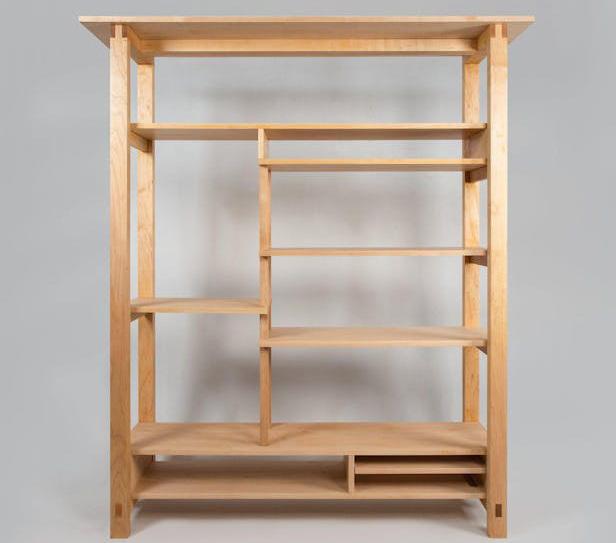
said. “It’s just a joy to work with them.”
For their interdisciplinary thesis, Gewirth talked to producers, consumers and curators of wooden objects all over New England, from Somerville’s Union Square to Vermont. Curators, such as small business owners, are the intermediaries that link the woodworkers to the final user. Gewirth analyzed common values and themes that people associated with wood over its life cycle, such as ethical consumption.
Gewirth completed not one, but two theses for their combined degree. For SMFA’s senior thesis show, they also exhibited a wooden shelf that carried over themes of their written thesis to a physical format.
stories have some form of lived experience,” she said. “I don’t believe I’m an authority to every single person that deals with economic struggle, but I do feel like I can speak about my own experience in a way that holds empathy for all parties involved.”
The possibilities are nearly endless in the interdisciplinary major — it just takes a vision and a plan. Hammond recalled mentoring sophomores who were considering an interdisciplinary major.
“The biggest thing that deterred them … was not believing in themselves enough, and that’s what sort of stopped me at first too,” he said. “You have to set your own path. … The more you can start to think about: what do I want my education to lead to? That really helps.”
The Thesis Honors Program at Tufts allows seniors to lead an in-depth investigation into an area of research within their major. Over the course of both semesters in their senior year, students conduct an independent study of their choosing. Undergraduates from across all majors and disciplines undertake senior honors theses. Graduating seniors Ashley Lopez and Nikita Bhatnagar dedicated their theses to multilingual research.
Lopez is double majoring in biology as well as child study and human development. Interested in pediatric health, Lopez pursued both majors in order to better understand child development. Lopez wrote her senior thesis on the teaching practices that young educators use with English language learners in Head Start preschools, which are federally funded to support children from low-income families in their learning and development.
“There’s very little training or regulation when it comes to what strategies teachers use for ELL students. They could really do whatever they want; they could ignore the student, isolate them,” Lopez said. “A lot of teachers put [ELLs] aside, give them another activity, let them wander around the classroom.”
Lopez’s perspective is informed by her firsthand experience as a Jumpstart Corps member at a Head Start preschool. Jumpstart is a supplemental early childhood education
program that connects volunteer instructors with federally funded preschool programs to “close the kindergarten readiness gap” for low-income families. Twenty-one Tufts students participate in a partnership with several infant and toddler preschool programs around Boston, working as Head Start teachers to provide supplemental instruction in the classrooms of partner schools.
“A very big chunk of the students in Head Start are ELLs,” Lopez said. “I started to pick up on a trend where there was no consistency in what teachers were doing with their ELL students, especially in the classrooms that were a little bit bigger. … I was wondering: Is there anything behind their practices? Especially because [ELLs are] such a big population, and this population is just going to grow.”
To investigate this question, Lopez conducted a qualitative study featuring in-depth interviews with Jumpstart Corps members. Her initial survey, answered by 20 out of the 21 Tufts students in the cohort, asked about teaching practices, the number of ELLs in their classrooms and their future career ambitions.
“A lot of the Jumpstart members I interviewed … mentioned that [they] would love to teach, but the pay is bad, and so a lot of them — in response to that — are doing psychology,” Lopez said. “A lot of them are [pursuing] school psychology, just in general, like a clinical psychologist for children.”
In addition to these interviews, her thesis included stories about working with ELL students. Lopez shared an anecdote
about working with an ELL student from Ethiopia.
“He did not speak very much English, but he was so bubbly and really wanting to interact with everyone, even if he couldn’t speak to them,” Lopez said. “In the playground, whenever he wanted to play tag with kids … he would scream at the top of his lungs and start running. And kids would just either chase him or run away from him. Even though he couldn’t [verbally] communicate that he wanted to play, he still found a way.”
Lopez will be attending the Tufts University School of Medicine in the fall to pursue her goal of becoming a physician.
Bhatnagar is double majoring in biology and community health. Bhatnagar is a member of the Research on Ethics, Aging, and Community Health Lab at Tufts and worked as a clinical care technician on an oncology floor at Tufts Medical Center. Her senior thesis in the Department of Community Health focused on palliative care provision in patients who don’t speak English, often referred to as patients with non-English language preferences.
“Palliative care is a specialized care for anyone with serious illnesses like cancer, heart disease, Alzheimer’s,” Bhatnagar said. “There’s a lot of symptom management, and managing financial, psychosocial and emotional needs.”
Bhatnagar chose to focus on patients with non-English language preferences — who tend to be racial and ethnic minorities — because they are more
vulnerable to care disparities. working as a clinical care technician, Bhatnagar experienced the challenges of communicating with patients with non-English language preferences.
“I was very observant and aware of how it felt to communicate with those patients and how it was a challenge for me, not even being a doctor,” Bhatnagar said. “I was always curious: How are these conversations going in a different language? It’s so distressing to see and hear; you would walk by a room, and patients are crying, and none of them speak English. I was very cognizant of that and wanted to better understand that.”
Her thesis looks at how clinicians feel while providing care to patients with non-English language preferences and whether or not they think that their care has the same quality as that provided to English-speaking patients.
“Just the presence of an interpreter, irrespective of the modality or who it is, means that the conversations are more stilted. You don’t get the flow and back and forth that you would with English-speaking patients. Getting people’s preferences with less nuance is something that’s a problem,” Bhatnagar said in regards to her findings.
Bhatnagar’s committee chair, the primary advisor responsible for overseeing progress on the development of a thesis, was Keren Ladin, an associate professor in the Department of Community Health. Ladin is the director of the Research on Ethics, Aging, and Community Health Lab and first met
Bhatnagar as a student in Community Health 141.
“CH 141 is an applied research class in which [students] get hands-on exposure and hands-on experience directly on one of our projects,” Ladin said. “It’s a really great avenue for students who are really interested in research but … need some more guidance or experience to begin working directly on studies.”
Bhatnagar, who plans to attend the Tufts University School of Medicine in the fall, joined the Research on Ethics, Aging, and Community Health Lab as a clinical research assistant in 2022, where she has investigated disparities in how clinicians provide care.
“Our research is at the intersection of ethics and health policy, looking at questions of resource allocation and distribution, priority setting; questions around shared decision making; and questions around how to improve patient-centered care,” Ladin said about the lab. “Our lab does a lot of research with populations who face acute healthcare decisions at the end of life.”
Ladin encourages anyone interested in pursuing a thesis to expand their curiosity and hone their skills by embarking on this project.
“I think students sometimes are hesitant about doing a thesis; they’re concerned that it’s a big time commitment and challenging … but it is such a rewarding process,” Ladin said. “It’s a really unique opportunity to take something from the stage of an idea or a question, and see it through to fruition.”
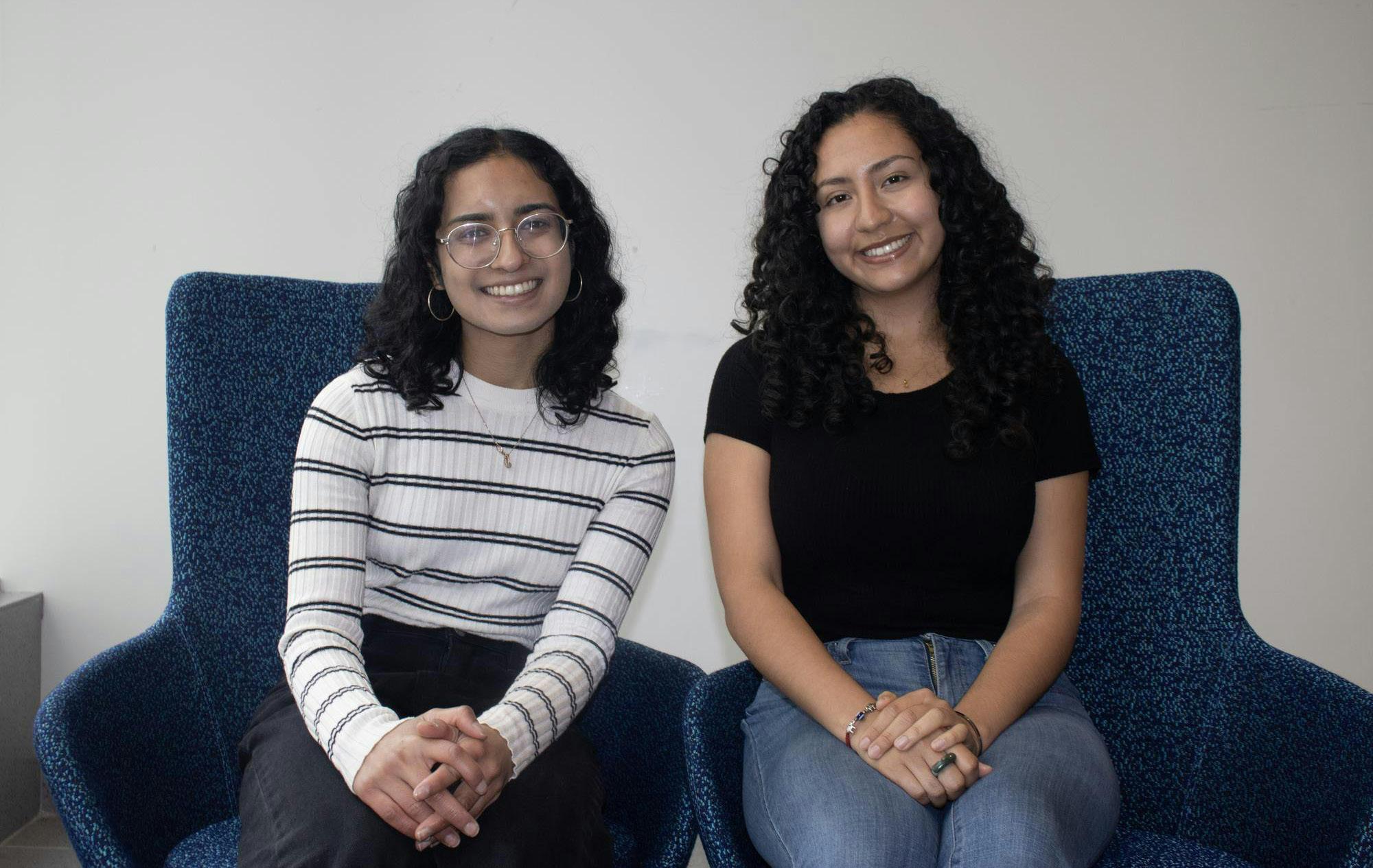
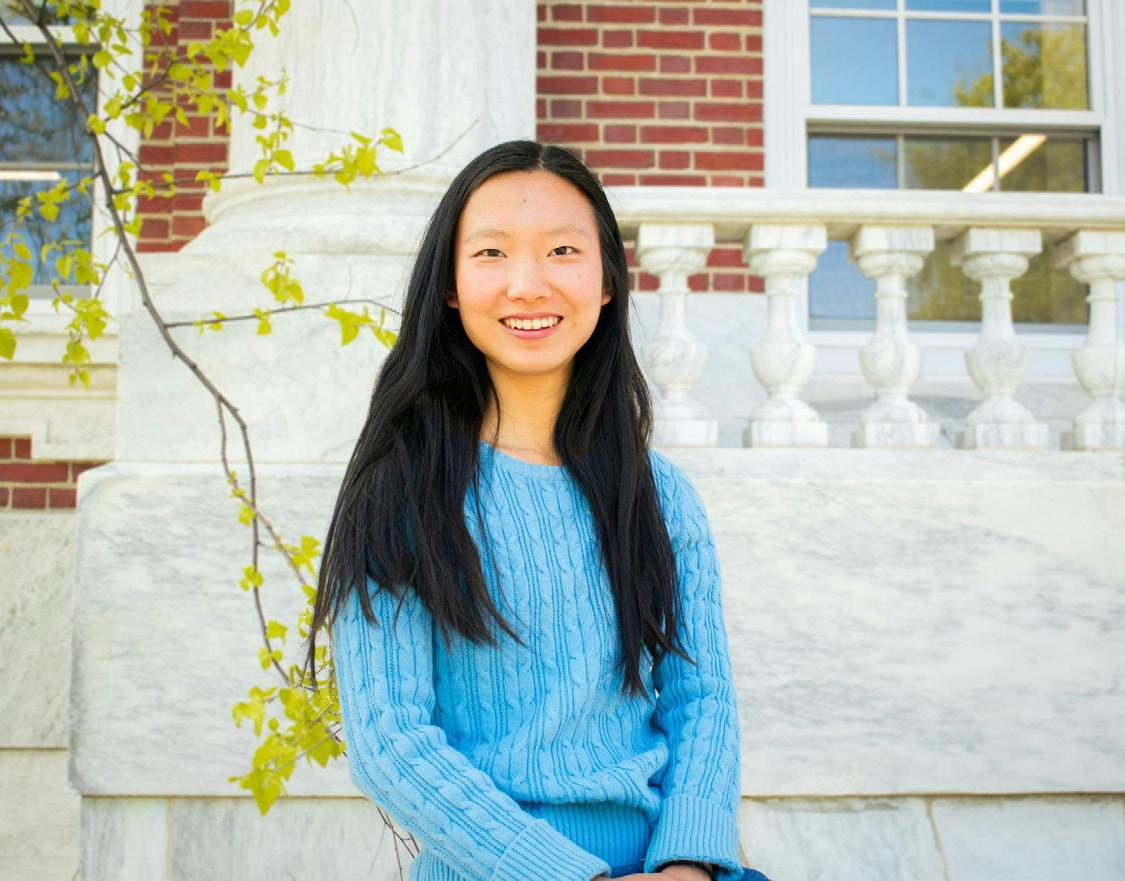
Editor’s note: The Daily’s editorial department acknowledges that this article is premised on a conflict of interest. This article is a special feature for Commencement 2025 that does not represent the Daily’s standard journalistic practices.
Graduating senior Rachel Liu picked up a few shifts as a copy editor at the Daily during her first semester at Tufts, and since then, she has gotten to know every aspect of what it means to be a student journalist. Over her time at the Daily, she has officially contributed to 11 sections across written content, multimedia and production.
“I would just come in and copy edit and do some small tasks for the Daily here and there, and it just kind of snagged me in and held on,” Liu said.
Her mile-long Daily resume contains positions such as executive copy editor, associate editor, executive newsletter editor, editor-in-chief and executive photo editor. Liu holds the record for most executive positions held at the Daily.
while she’s tried her hand at almost everything, copy editing holds a special place in Liu’s heart.
“Something still appeals to me about reading every article, staying in the know and making the little tweaks that we can to improve the overall appearance of the paper,” Liu said.
For the entirety of her senior year, Liu was the executive photo editor, reinvigorating the Photo section and diving deeper into an interest that allowed her to explore new areas of Tufts.
“ when I have the camera in hand, I feel like I’m going on a side quest on campus,” she said. “I went to an [international relations] symposium, and I’m not an IR major. I don’t really interact with the department as much, but that’s what I love — that you just go and see all the different sides of Tufts campus that you normally wouldn’t.”
Liu was a harbinger of change at the Daily, breathing life into smaller sections as well as innovating in the larger sections that she was a part of.
“I think she just genuinely makes every section that she’s ever been exec of better in very concrete, logistical ways,” graduating senior Marlee Stout, a former associate editor during Liu’s term as editor-in-chief, said. “She was one who came up with the idea to have a deputy copy exec. Before her, copy execs were coming in three nights a week every other week, which was horrible. She made Newsletter a section.
She made Photo a section.”
Along with her achievements in the Daily, she is well-known among staff for her kind words and spirit.
“She’s extremely humble, and I think she’s the kindest and most welcoming person in the Daily. There’s no one she doesn’t know, and if there is, she’ll find them, and she’ll say hello, and she’ll introduce herself, and then she’ll remember names,” rising senior Julieta Grané, former editorin-chief and a managing editor during Liu’s term as editor-in-chief, said.
Two semesters ago, when I wrote my first article for the Daily, Liu was the first person to reach out to me. She congratulated me on my work and told me to keep writing, and as I’ve continued my time at the Daily, she has been nothing but supportive. I don’t believe I would have risen in the ranks of the Daily if it weren’t for Liu’s encouragement. Many would say the same for themselves.
“I owe my entire Daily career to Rachel. And I think she’s truly just gone above and beyond,” Stout said.
Liu’s time at the Daily hasn’t been all work and no play. She’s won “The Hunt” — the Daily’s semesterly scavenger hunt — twice in her four years here and has many fond memories in the Daily office in the basement of Curtis Hall.
“[My favorite memories were] just all the little moments in the office, like when it snowed at 2 a.m. and we all ran out and watched the snow in between editing pages of [the print paper],” Liu said.
Outside of the Daily, Liu is a biology major and a French minor. She’s been a part of the Molecular Cardiology Research Institute lab at the Tufts Medical Center and a teaching assistant for introductory biology labs.
“That was a fun community to be a part of — meeting all of the prospective majors
esterday, I stared at the sun. It really hurt. Yet, as I stumbled down Prez Lawn barefoot (#freethefoot) with holes burned into my retinas, I began to realize something about my fiery, eternally-smiling foe: without the sun, the world would be a much darker place.
This joking fact has not gone unrealized by the masses of human history. Sun gods are present in cultures across all seven continents, barring Antarctica. And the sun is certainly no celestial slouch, being frequently depicted as a supreme, life-giving god.
The Egyptian tradition of Atenism is arguably one of the oldest monotheistic faiths, reaching a peak in the 14th century B.C. when it was adopted as the state religion by the pharaoh Akhenaten. Aten, a manifestation of the sun, was represented as a single disk releasing rays of light that produce the entirety of the universe and god itself. Adherents believed that Aten remade the world every day when the sun emerged and thus, death simply was the continued darkness of night. There was no afterlife or pantheon of sympathetic gods, only the cyclical totality of the sun.
and making sure that they didn’t set anything on fire,” Liu said.
Compared to other extracurricular activities, the Daily took up most of Liu’s time.
“I’ve done clubs for fun, but I think the Daily is really my core club community here and what I would most strongly identify myself with,” she said.
Liu reflected on the significant role that this paper holds at Tufts.
“The print paper really does mean a lot to me. I love seeing people with it on campus, even if they’re using it as an umbrella,” she said. “There’s something so essential for a campus to have a physical paper like that you can just pick up, that you can do the crossword in, you can read on the T.”
Liu was editor-in-chief for the spring 2024 semester, which ended in an encampment that garnered national media attention.
“[Student journalists] get the more nitty-gritty than the national [outlets] — the helicopters flying overhead are not going to get the same perspective as us in the crowd, or if we have fostered those relationships like face to face,” Liu said. “So I think that that’s a vital role of student journalism.”
Entering the Daily as a copy editor, Liu didn’t get much experience in the reporting side of journalism until her time on the managing board.
“People whose names I first started seeing pop up on the website or in a byline … getting to meet them in person … [and] seeing them rise through the Daily ranks has been so gratifying,” she said. “I started out as an editor and not a writer; I learned later in my time how vulnerable it is … to have your work be out there with your name attached to it. I’ve gained so much appreciation for everyone who’s been doing that since day one.”
After graduation, Liu plans on moving to Madison, wis., where she’ll be working in healthcare software. while she’s unsure if a journalism-related career or side hustle will be in her future, her work on the Daily has changed the way she understands news.
“I think, as a reader and a consumer of news, the best way to understand how articles come together ... is to actually do it,” Liu said.
A similar tradition emerged centuries later in the Roman Empire, with the cult of Sol Invictus, or “unconquered sun,” being first introduced by the unpopular Emperor Elagabalus in A.D. 219 and then later codified by Emperor Aurelian. This domineering god arguably set the stage for Christianity to later flourish within the Roman Empire, as his monotheistic and light-giving nature bridged well to the early Christian doctrine. Constantine worshipped Sol Invictus for over a decade after converting to Christianity, while the Feast of Sol Invictus, a symbolic rebirth of the sun following the winter solstice on Dec. 25, became our modern Christmas. while the sun is often glorified as fearsome or invincible, Apollo, the Greco-Roman god, displays the more tender qualities of our star. In one story, Apollo’s lover, Hyacinthus, is struck by his own discus and killed, pushing Apollo to create and consecrate the hyacinth flower in memory of his grief. The great being, which surpasses all human and earthly endeavors, can still reach with care to small, worldly matters — our sun, like Apollo, cares for every flower through its gentle light.
In my fifth-grade science class, I learned a surprisingly similar lesson: Solar energy is indirectly the source of almost all energy and life on Earth. Light from the sun feeds photosynthetic plants, which then feed herbivores, who then feed carnivores and omnivores (like ourselves), who then feed detritivores, who ultimately feed the soil. Almost every ounce of life energy that enters our complex food chain can be traced back to the delicate rays of light warming the outside of my eyelids on a sunny afternoon. Even our artificial lights, those bulbs that intend to outstep our sole light-giver, generally trace themselves back to the sun — fossil fuels are imbued with the dormant solar energy of a living being, while the sun’s heat creates the wind that drives our turbines. we are all, at base, children of the sun. we subtly embody its radiance in our every deed; we consider the world with all the clarity it deigns to provide; we smile when it smiles down on us. And yet, with all we have been given, how often do we turn our eyes to the sky? How often do we look at and appreciate this one unchanging fixture of our world, this purveyor of warm life? The sun that burnt my eyes is the same sun that beat the sun-baked Akhenaten into submission. Tomorrow, we know the sun will rise. So, how can our future be anything but bright?
Max Turnacioglu is rising junior majoring in international relations. Max can be reached at maxwell.turnacioglu@tufts.edu.
Grace Nelson
Hi everyone! As I write this, it is currently May Morning here in Oxford, the date of a centuries-old tradition dedicated to heralding in the spring. Each year, thousands gather in front of Magdalen Tower to listen to the choir sing hymns to the tune of church bells and chirping birds. For you all, however, it’s Commencement, a day dedicated to heralding in not just this spring but the rest of the seasons of your lives. with change, of course, we must leave things behind. That’s right: It’s time to say goodbye to Tufts — and to this column.
In reality, this goodbye seems altogether premature. After all, I’m hardly done with my Oxford experience. Trinity term just started this past week, and I have piles of essays left to write before I can even think about packing my things.
If there’s one thing I’ve learned throughout this journey, it’s perseverance. I’ve always endeavored to keep my columns positive — to look on the bright side of things — but Oxford isn’t always as glamorous as one might think. From spending long nights in the Pembroke Library (affectionately called the Plib) to struggling to make new friends, this journey has been quite challenging at times. But, I’m willing to bet your Tufts journey was challenging, too, and look where we are now!
Oxford in the springtime is lovely, but there are certainly downsides (and not just the pollen). So many of my friends are graduating — in particular, my two very best friends at Tufts (love you, RS and BR). I can’t help but wish I were back at Tufts, sitting in those dingy foldable chairs on the Academic Quad, watching Commencement. I’m not ready to say goodbye to these wonderful people I’ve met, but today is about celebrating change, and change is not always easy.
After participating in the May Morning festivities, I took the opportunity to walk through the meadows, admiring the morning fog rolling over the fields. I felt myself longing to take a picture of the scene in my mind so as not to forget this wonderful place I’ve been lucky enough to call home; however, my iPhone camera had to suffice. In your last few days on campus, definitely go on a final stroll around Tufts with your friends and take it all in.
As I said in my first installation of this column, the Oxford comma is defined by what comes after. So, even though saying goodbye now is hard, I’m looking forward to what is yet to come.
Best of luck to all the graduating Jumbos, and thank you to everyone who joined me on this journey!
xx Grace
‘Jack-of-all-trades’: Kaitlyn Wells reflects on college
Ellora Onion-De Associate Editor
Editor’s note: The Daily’s editorial department acknowledges that this article is premised on a conflict of interest. This article is a special feature for Commencement 2025 that does not represent the Daily’s standard journalistic practices.
From her academic interests to extracurriculars, graduating senior Kaitlyn wells might be a perfect example of the quintessential Tufts student, someone whose passions lie in varied arenas — but she didn’t always see this as a good thing.
“I’ve tended to think of myself as a jack-of-all-trades and saw that as a negative thing, but now I realize it’s just more resources that I can leverage in different ways,” wells said.
wells began her college career by pursuing a major in international relations with a concentration in global health and the environment. However, the interdisciplinary nature of the international relations major drove her to supplement her studies with a second area of study.
“About halfway through my Tufts career, I just felt a little too scattered academically,” wells explained. “I decided to pick up something in the biology realm to help me understand sustainability and community health and whatnot, so I ended up pursuing biopsychology as a second major.”
She also ended up fulfilling a minor in economics.
Some of her favorite classes, such as “Environmental Justice Literature, Education for Public Inquiry” and “International
Citizenship and Ballet”, however, have been in completely different departments.
“Although [“Environmental Justice Literature”] was an English class, it touched a lot upon various social sciences, notions of equality, racism, gender issues, history, environmentalism, and it really opened my eyes,” she said.
wells’ Tufts experience has also been defined by deep involvement with student organizations. Since her first year, she’s participated in the Hong Kong Student Association, for which she served as co-president, Sino-U.S. Relations Group Engagement and the Daily.
At the Daily, wells stuck mostly with the Features section because she appreciated the long-form, interview-based narrative writing.
After writing for her first semester, wells became an assistant features editor the following semester. Eventually, she rose to executive features editor in her sophomore spring.
“I learned so much by being an exec. It was very stressful, but in an exhilarating way. … I felt really in tune with The Tufts Daily community,” wells said. “I [felt] supported by the managing board, by the people in my section, the dedicated writers and editors, people in the photo and graphics department that would always collaborate with us.”
During her junior fall, wells became a managing editor of the Daily. “That was such a brilliant experience as well,” she said. “[I] felt so much support and gratitude throughout the whole thing.”
wells reflected on how the Daily has helped her feel more confident in her abilities.
“Thinking back to my [firstyear] fall [when] I was so surprised to be invited to be assistant editor, even though that was really no big deal at the time, I should have been like, ‘Yeah, I’m gonna be an editor,’” wells said. “Over my time at Tufts, I think I’ve learned to be more assured in my capabilities and my worth.”
Heading into graduation and beyond, well s is excited to meet her friends’ families and to make Boston not just her college town but also her home as she transitions into working life.
But the feeling is bittersweet. She’ll miss the little things that brighten her days at Tufts, such as “getting served a bowl at Hodgdon with a smile, or walking into the women’s Center and chilling there between classes, or walking around campus when it’s sunny with music in my headphones.”
Another aspect she’ll miss is the opportunity to attend events for clubs she’s completely unfamiliar with.
“They’re very accessible, they’re very regular and so educational, so enlightening, and I’ll miss having that at my disposal,” wells said.
After spending four years at Tufts, wells has gathered wisdom on the university experience.
Her advice to students who have yet to begin their college career is to remember that happiness can be found almost anywhere.
“I think that honestly, it’s more up to the individual to
find out what makes you happy, and that you can really feel fulfilled anywhere, or you can feel fulfilled at most places,” she said. “As long as you know what you want, what types of people you want to surround yourself with, or at least are willing to figure out those things, you could be at any university and have a good time.”
For helpful and unfiltered guidance, wells recommends having a conversation with an upperclassman.
“Talk to seniors. If you’re an underclassman, talk to seniors or recently graduated people for better personalized advice because … having a real talk with someone who’s not afraid to [not] sugarcoat has been helpful for me,” she said.
wells also recommends making the effort to get to know professors — something she didn’t take full advantage of.
“One thing I wish I’d done better at Tufts is develop better relationships with faculty. … I think what has held me back in the past with professors is not wanting to expose myself for being behind in a course and thereby not wanting to go to office hours,” she said. “I have a feeling that their time is really precious, so I feel bad taking up time, especially if there’s a line of people behind me.”
Oh, and one more piece of advice for all Tufts students.
“Eat the pizza at Carmichael Dining Hall! That is the best pizza that I’ve had in Boston, and I’m not afraid to say it,” wells said. “ That gluten-free crust is mochi-like in texture, and it’s ridiculously good.”
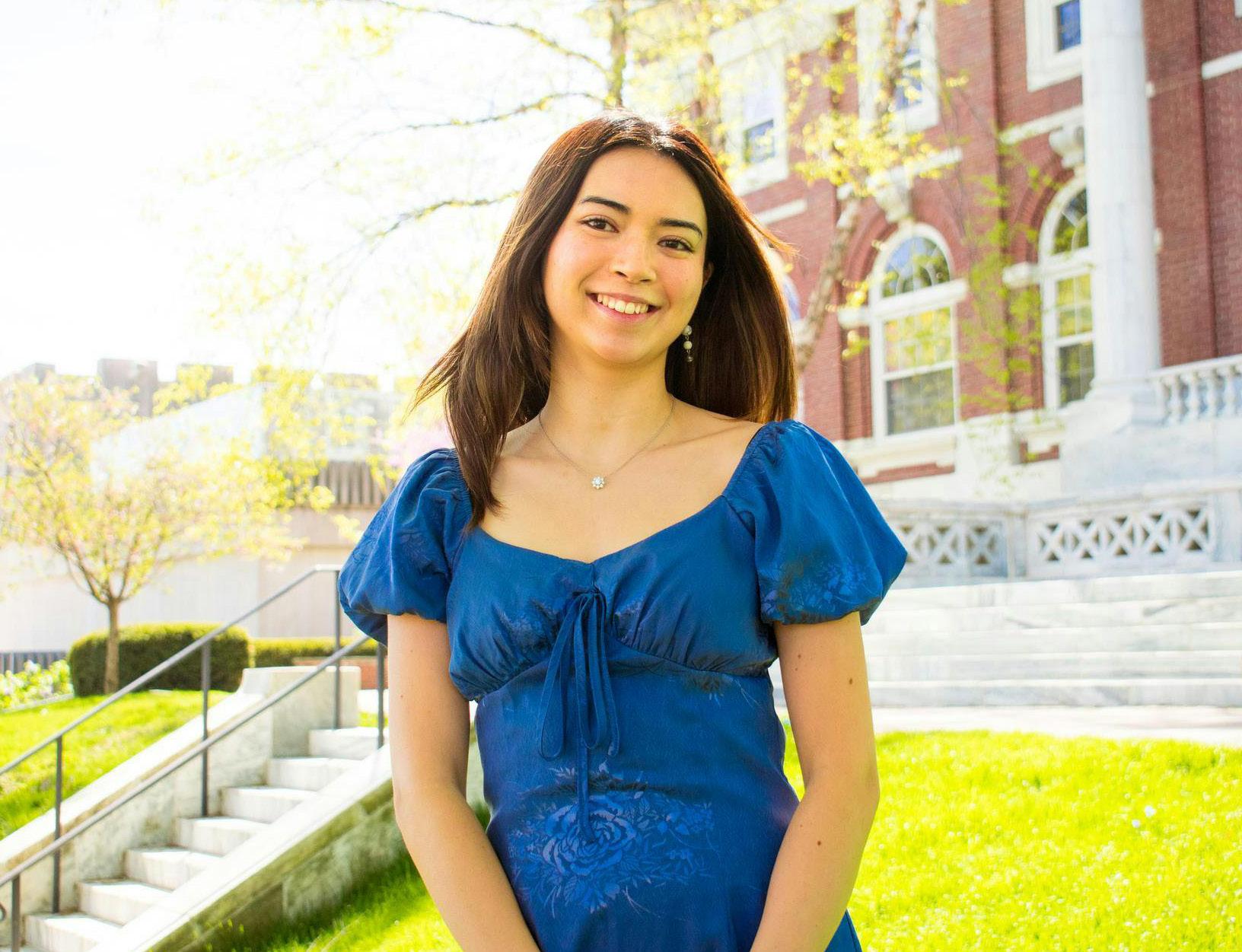
Julia
Editor’s note: The Daily’s editorial department acknowledges that this article is premised on a conflict of interest. This article is a special feature for Commencement 2025 that does not represent the Daily’s standard journalistic practices.
To whom it may concern,
Graduating senior Julia Carpi has run the gamut in terms of opportunities offered at the Daily by serving as an executive video editor, associate editor and executive audio editor. Having worked with her for two years now, we can speak to her work ethic, talent and stellar personality.
Carpi found the Daily to be an important exploratory space given that Tufts does not offer a major in journalism.
“On the surface level, [the Daily] is my journalism and writing education at Tufts,” Carpi said. “ we are learning what it’s like to produce high-quality content. we take it seriously and we can feel proud of the work we put out.”
During her first semester on campus, Carpi found herself dissatisfied with her film classes. She reached out to Ty Blitstein (LA’24), the then-executive video editor at the Daily, and asked to get involved.
“I started halfway through my [first-year] fall because I wasn’t involved in anything and I was like, ‘I should probably do something,’” she said. “I was taking film classes, and I didn’t like them, and I wanted to still do something video-related, but I just really didn’t like the film classes here, and I was too stressed out by how structured they were.”
The Video section was incredibly small at that point in time, and Carpi often found herself the only other person at section meetings
whole point (Year 2 reflection)
Wow. This is crazy. The semester has come to an end. we just needed to survive finals. It’s definitely been a semester. To be honest, it’s definitely been a YEAR.
To get ready for these reflections, I always like to go back and scan through my past publications for this column. Not only do I get to remind myself how much of a comedic genius I am (I often find myself laughing and kicking my feet at my own jokes), but I also get to refresh my memory on how my year has been. Let’s just say, judging by my subtitles alone, you can probably guess the type of year I had: “Current objective — survive,” “Crashing
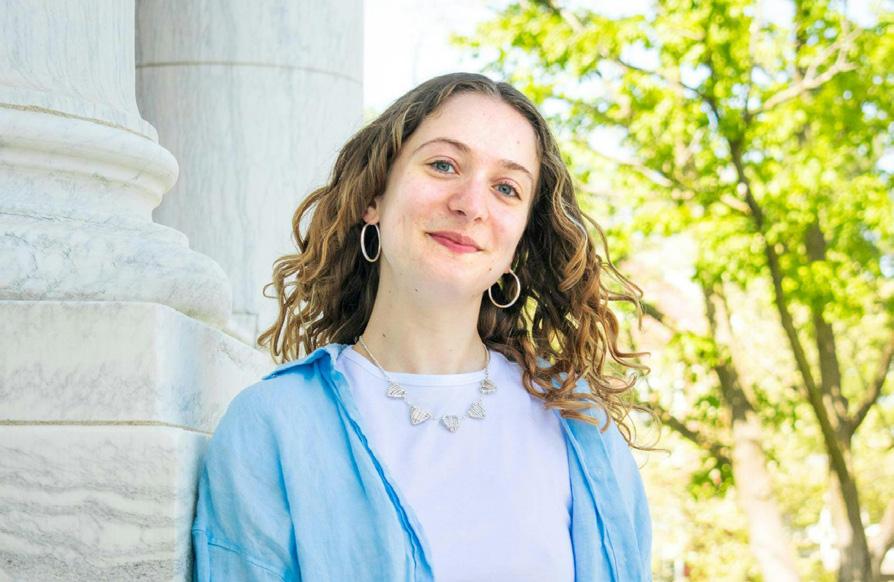
on Zoom with Blitstein during her entire first year.
Carpi’s tenacity showed through as she stuck with the mostly asynchronous section for a year. She later became the executive video editor herself and led the section for the entirety of her sophomore year.
“Our community [during] my sophomore year was so special. we were so close,” she said. “[ we started] from sort of having no one … and then when I finished my sophomore year, we had like 15 people that were all really close.”
The sense of community within the video section grew immensely under Carpi; she takes pride in expanding and bringing life to the section.
As an associate editor during her junior fall, Carpi’s time on the Daily’s managing board connected her to the paper in new ways beyond just the video section.
“Going into it, [I] was super nervous because I was the only person coming from multimedia,
out in Tisch basement,” “ wow, what a semester (it’s only been a month).”
As you can probably tell, we have A LOT to unpack for this reflection. Before I jump in, I wanted to send some thank yous before the year ends. First, to the Daily and its incredibly hard-working staff and editors. As someone who (full disclosure) has not shown up to a single meeting this entire year (I’m sorry — I like to maintain my mysterious persona around the Daily office), I can only imagine how much work goes into sustaining such a functional and crucial operation. To anyone who has had the misfortune of editing one of my columns: Thank you (and perhaps try to fix your karma because something must have gone wrong for you to end up editing this). A Jumbo’s Journey would not be what it is without you — fixing my inordinate number of grammatical errors, removing all the profane words I try to sneak in and ruthlessly deleting every Oxford comma I use (which, for the record, I’m still pissed about).
and I wasn’t super immersed in the mainstream Daily culture of it all. … Video was a little bit on the outskirts, socially,” she said. “But it was just perfect. Everyone balanced each other out. … we all became friends, too, which I think probably is what actually was the really good part.”
Carpi studied abroad in Seville, Spain during her junior spring. Although she didn’t anticipate taking on a large multimedia role at the Daily again, Carpi was asked to serve as the executive audio editor upon her return. Among the many projects she has worked on, Carpi describes one of her favorite projects, Off the Record, which is the Daily’s version of NPR’s Tiny Desk concerts.
“[Off the Record] is the best because it gets multimedia into the office, gets Video into the office, and I love it,” Carpi said.
“It’s also fun because I think the Daily is sort of shielded from the rest of Tufts a little bit, so that’s also a fun way to get bands in the office.”
Second, to my readers: Thank you. This year, I learned that a solid number of people actually read this column (which is surprising). To think there are people out there willing to listen to my rambling thoughts and unsolicited stories is inspiring. Even though I can’t meet all of you and sign autographs (tragic, I know), just know that I appreciate you. I do this for you.
This year is difficult to describe. My first year was full of meeting new people, partying every day of the week (not an exaggeration) and just riding the highs and lows of college. But this year? It was hard to find that same excitement. That same chase. This year, I wasn’t meeting as many new people (unless I tapped into the first-year class, which, just writing that sounds wrong), my body can’t handle going out on a Monday night anymore and college was, just college. For a while, it felt like a routine: sleep, eat, work — repeat. And then wait for the weekend to do a little more sleeping, eating and working.
some ways,” she said. “The Daily [has] the structure and the academic side, and then Burlesque [has] the self-expression, creative side of stuff. … It’s been such a good creative outlet for me.”
Carpi danced extensively growing up but grew tired of the intensity of a structured dance education. In burlesque, she found an adequately flexible environment.
“It is all about having fun and doing what feels good to you and not worrying about how it looks, and that was really refreshing coming from normal dance,” she said.
As she prepares to graduate, Carpi feels appreciative of her time at Tufts. If she were to offer any advice to an incoming student, she would say to live in the moment.
Carpi has also expanded from her multimedia roots, creating a popular love advice column called “Hearts on the Hill” in the Features section this semester.
“I’m so happy I did it because it was so fun and, truly, my little passion project this semester,” she said.
“Hearts on the Hill” has given advice to 19 “Yearners,” as Carpi affectionately calls them.
“I was shocked because I didn’t think I would get anyone writing in, and I got so many responses. So it was so fun. It also was very much like a little diary for me. … I think I just really liked that style of writing, which was good to learn about myself. It’s just more creative, free-form.”
Carpi has also been incredibly busy on and off campus outside of the Daily. Most notably, she has been heavily involved in the Tufts Burlesque Troupe and even co-directed their most recent production.
“Burlesque is the best ever, and I love it because it’s kind of like the opposite of the Daily in
I know that I’m not the only one. And I’m definitely not saying that this is just a sophomore phenomena or that first-years can’t feel this feeling too (once they stop eating with their fingers maybe).
I remember a conversation I had late one night with a friend — one of those unplanned, half-delirious talks that somehow crack everything open. It was at 574 Boston Ave. (surprisingly a conducive environment for emotional conversations), and instead of doing work, we just — talked. Not just about life or college, but about everything. And while the conversation didn’t fix anything overnight, it helped me realize something important.
Sometimes, life just is. Maybe, that’s the whole point. Maybe, college isn’t supposed to be defined by my crashouts in Tisch basement or the parties I attend on weekends, but rather by those peaceful moments sitting on the quad in silence, staring at nothing. The small, quiet moments that don’t make it onto Instagram. The late-night talks
“I think you don’t realize how special the time is that you have here, and there’s so much going on that goes by so fast,” Carpi said when asked to describe the Daily in a few words, one stuck out in Carpi’s mind: community.
“All of the other stuff is important, but community is what I’m taking from it,” she said. “I feel like I have gotten so much purpose at [the Daily] just from obviously the work that we do but also the community that we built for each other.”
Carpi will make an incredibly diligent, dedicated employee anywhere she goes. Though she’s not yet sure what the future holds, she is excited by the prospect of continuing to work in media.
“I want to do something with writing. And I really love talking to people and that feels like a journalism thing, but I’m super open to whatever. I also love multimedia. … So I don’t really know where that leads me. I think news podcasts would be awesome, audio journalism would be awesome or just more long-form writing,” Carpi said. She joked, “Anyone out there with any job openings — I’m on LinkedIn.”
that don’t have neat endings. The ordinary days that, somehow, stitch together into something extraordinary when you’re not even looking. This year has taught me that the journey — our journey — isn’t always loud or obvious. Sometimes it’s subtle. Sometimes it’s just being here, showing up and letting life happen to you.
At the end of the day, that’s what college — or life for that matter — is truly about. This year wasn’t a perfect highlight reel. I wasn’t chasing this picturesque ‘college experience’ like I did my first year. Life is not about sprinting toward some perfect version of life we all have in our heads. It’s about the in-between. The small steps. The quiet moments. And maybe, just maybe, that’s the whole point. Thank you for being on this journey with me. See you next year.
Jeremy Stern Staff Writer
Editor’s note: The Daily’s editorial department acknowledges that this article is premised on a conflict of interest. This article is a special feature for Commencement 2025 that does not represent the Daily’s standard journalistic practices.
when graduating senior Nate Hall first stepped onto Tufts campus, he had no prior experience in journalism — his high school did not have a paper, and he did not expect to join the Daily. Instead, he was all in on doing theater. However, Hall’s friend, graduating senior and Daily staff writer, Sam Dieringer, first encouraged him to attend DailyCon in the spring of 2022.
After being roped in, Hall was set on being a copy editor. However, through reading and editing the articles of his peers, his interest in writing began to grow, and that same semester, Hall joined the Arts and Pop Culture section and began writing reviews.
Hall had no intention of moving up to the managing board, despite his mom telling him, “‘Senior year, you’re going to be editor-in-chief.’” Contrary to his initial belief, Hall is now the managing editor of the Daily, and he credits his journey to the community he built there. Notably, Hall mentions fellow graduating senior Odessa Gaines, the spring
2025 executive arts editor, as his first “Daily friend” and the reason why he kept writing, as the two were both editors for the Arts section and deck stage managers for Torn Ticket II’s production of “Into the woods.” The two learned about the not-so-secret Arts section perk of getting free tickets to Boston theater productions and eventually started co-writing reviews together, which they continued to do for several years.
Moving up the Daily’s ladder, Hall became a deputy arts editor in his junior fall. Despite initially feeling uncertain about his capabilities in this higher position, Hall grew to love the role and the satisfaction from reading other writers’ work.
Then, during his junior spring, Hall became the executive arts editor, joining the executive board for the first time. Hall acknowledged that his track was different, as most editors become executives earlier on, but he attributes it to the beauty of the Daily’s leadership system: “I think everyone’s kind of got a different path at the Daily, and that was my path.”
After a semester on the executive board, Hall continued his path by joining the managing board. He credits his journey to rising senior Julieta Grané, editor-in-chief during the fall 2024 semester, and his fellow executives for pushing him to keep going further.
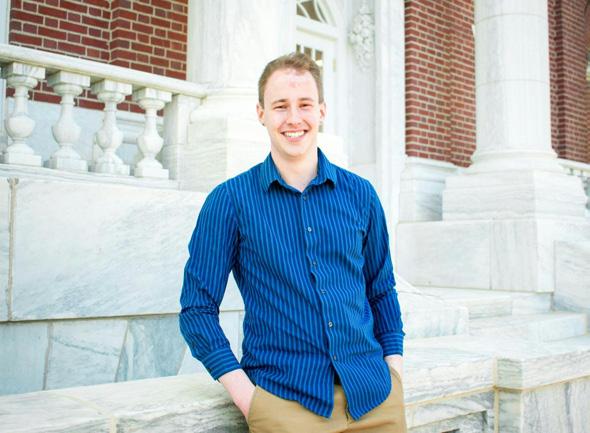
“I’m so glad I [joined the managing board.] … It’s a lot of work; it’s a lot of time in the office,” Hall said. “But it’s really rewarding to get to see the paper come out every week and say, ‘I read all of those articles.’”
Outside of the Daily, Hall is involved with theater at Tufts, having performed in “Mamma Mia” and “Eurydice,” deck stage-managed “Into the woods” and “HAIR” and participated in choir through the music department. Even though he has moved on from student theater, Hall loves to support his friends and knows that performing will always be part of his life.
As a managing editor, Hall still finds time to write for the Arts
Editor’s note: The Daily’s editorial department acknowledges that this article is premised on a conflict of interest. This article is a special feature for Commencement 2025 that does not represent the Daily’s standard journalistic practices.
“To be a fly on the wall, basically, is the dream,” graduating senior Erin Zhu said, smiling. In the background, there was the quiet hum of students in the Mayer Campus Center. Zhu, an experienced college journalist, was finally on the other side of the interview.
Zhu is an international relations major on the cusp of graduation. Unlike most of her class here at Tufts, Zhu’s college journey began elsewhere. “My first year of college, I was at Rutgers in New Jersey,” she explained. Zhu wanted a smaller student body than the over 36,000 undergraduates at Rutgers, so Tufts was a better fit for her. “I didn’t actually join any official publications until I transferred to Tufts sophomore year,” she remarked.
Zhu has always had a penchant for the pen. “when I was really little, I would cut out paper and write in it and then bound it with string and make these little books. So I think there was always
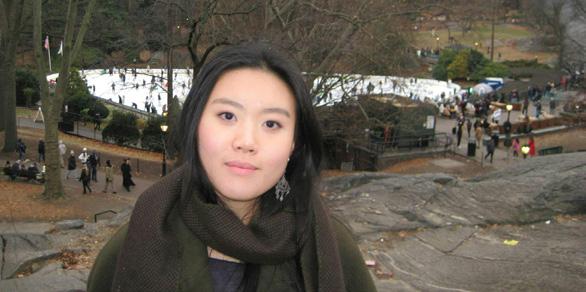
a desire to write and publish, something along those lines,” she said. At Tufts, Zhu found the Daily, which she pegged as the most prolific publication on campus.
This became her foray into the fast-paced world of journalism.
“It’s really cool,” Zhu said. “That it’s a bunch of 20-year-olds in an office basement putting together some really cool stuff. And I wanted to learn from the organization, and I also just enjoy writing. So I think I gravitated towards it for that reason.” when Zhu first joined the Daily, she wrote for the Arts and Pop Culture section. The section stuck.
“I found arts as a comfortable way to explore journalism,” she said. Zhu spent her year at Rutgers as an art history major, so she was familiar with the interplay between politics
and self-expression. But even so, she was initially daunted by publishing her commentary in the Daily.
“At the beginning, I was really preoccupied with coming to the right opinion … having acceptable taste. … But I think over the years, I’ve fortunately been able to move away from that,” she said. Zhu has had a highly successful writing and editing career at the Daily.
“Something I’m rather proud of is forming a strong relationship with the Boston Symphony Orchestra,” she remarked.
In the fall 2024 semester, Zhu served as the executive arts editor for the Daily, and in spring 2025, she joined the managing board as an associate editor.
“I think what’s unique about the managing board position is you get more of a bird’s eye view of
section. This semester, Hall also started a new column, “Center Stage,” and expanded the Daily’s Fun & Games section.
Hall, who had aimed to write a column throughout his Daily career, knew that there was one topic he would want to hone in on: sharing student performance groups’ stories with the community. As he leaves, Hall hopes other writers will continue to highlight these groups. “That is what the Daily is for, it is something that no other newspaper can provide,” Hall said.
Beyond his column, Hall’s alltime favorite Arts section highlight has been writing the Daily’s now highly anticipated yearly Oscar predictions articles.
the publication, and you can think more about the general direction of the paper,” she said. “That’s been really exciting. And of course, working with the people has been really fun and great.”
Being a part of the Daily has also taught Zhu invaluable lessons. “One of the most important skills that I’ve learned in terms of journalism is listening,” she said. “Being able to pick out what other people are saying, to understand them, understand their arguments, understand what positions exist around whatever topic or discourse.”
Spending years as a writer for the Arts section, specifically, has led Zhu’s views on the definition of art to evolve.
“Art was a mirror that you hold up to society, to the world, to other people,” she said. Then, she considered her current stance on art. “Now I feel like it’s maybe tied more to people’s inherent need to feel seen, whether you’re creating or not,” Zhu said. She sees art as a representation of experience — a definition that underscores how intimate and personal the act of creating is.
A lifelong writer and artist, Zhu enjoys being both the critic and the creator. “I think the critic’s end is always more comfortable, for better or for worse,” she said. Zhu has dreams of being a columnist for The
For Hall, it’s the people that make the ‘Dailmunity’ special. “People really look out for each other, and they really pay attention to the work that you’re doing,” he said. Hall has paid this forward by reaching out to writers when he enjoys an article, as he knows the difference this simple compliment can make.
“Little things [like] that remind us that we’re working really hard, but at the end of the day, we’re students,” he said. Playing Just Dance, battling in Bananagrams and drawing in the office are some of the moments that make the late-night production sessions so entertaining for him.
“Just be open to new experiences and new opportunities,” Hall said as his message to new writers. “Don’t box yourself in, because you might not think that you’re right for something, but you won’t know if you are unless you try.”
Ultimately, Hall is glad to have found his place at the Daily.
“It’s been such a rewarding experience in so many ways,” Hall said. “I’ve learned a lot about myself.”
After seven semesters, countless hours in the office and a combined 110 crosswords, articles and editorials, it is difficult to sum up Hall’s insurmountable accomplishments at the Daily.
To Nate — thank you for everything, your contributions big and small. The Daily will surely miss you.
New Yorker, providing social commentary a la Fran Lebowitz. “It’d be nice to live in New York City,” she mused. “Everyone wants to live in New York City, right?”
The past four years as an undergraduate have shaken up Zhu’s outlook on her life. “You know, when people organize the dominoes, and then they organize them perfectly in a way so they all fall just as you expect?” she asked. “That’s how I thought I should do things. I should line everything up, and then I would knock down the first domino, and then I would start living or something like that. I don’t really think I feel that way anymore. I think the stumbling around is inevitable but also probably the fun part and probably the more meaningful part.” She described her perspective as having “gotten looser,” and she has all the more security in herself because of that.
Zhu is now a strong believer in the philosophy of “yes.” “The most important thing I learned is to say yes to things,” she said. “Don’t be so confident that you know what you like and don’t like, and that you know what you are good and what you’re bad at.”
It is this mentality that Zhu will take with her beyond Tufts. wherever her passions lead her, she will follow.
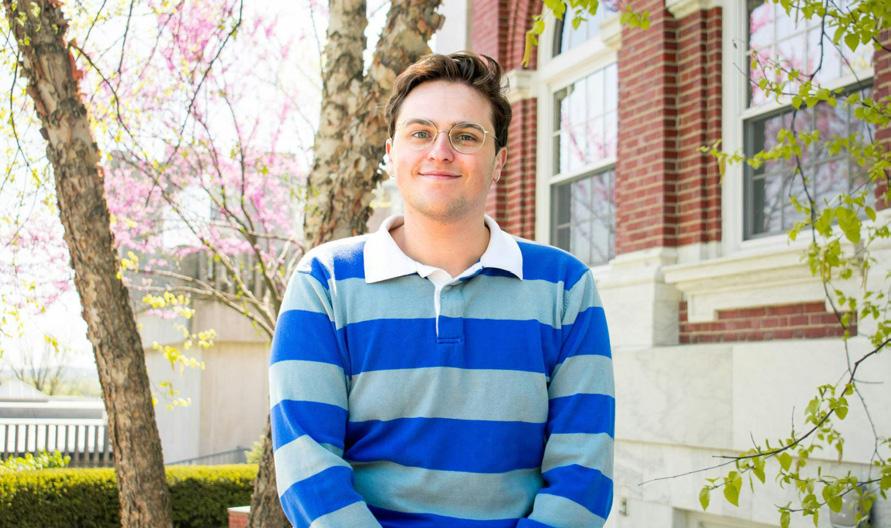
they’re looking for is consistency and that you’re always saying yes.”
Editor’s note: The Daily’s editorial department acknowledges that this article is premised on a conflict of interest. This article is a special feature for Commencement 2025 that does not represent the Daily’s standard journalistic practices.
“This is going to be probably the most unglamorous answer I give you out of all of them,” graduating senior Merry Jiao said when asked about how she’s feeling about applying for jobs this spring.
Jiao, a former managing editor, former executive copy editor and current columnist for the Daily, has had to make a huge change when it comes to her career path.
From there, she started to take a path further into the Daily, applying for the managing board and eventually becoming managing editor her junior spring.
“You’re like, wait, they’re doing late nights. I’m also doing late nights. And also, we’re working on the same articles together,” Jiao said, describing the thought process. “Oh, wait, I could do that. I can be on [the managing board].”
Editor’s note: The Daily’s editorial department acknowledges that this article is premised on a conflict of interest. This article is a special feature for Commencement 2025 that does not represent the Daily’s standard journalistic practices.
Since its founding in 1980, the Daily has traditionally produced short-form news and culture stories. But graduating senior Henry Chandonnet pioneered a new format for the Daily, making way for long-form reporting and striking visuals with The Tufts Daily Magazine.
Chandonnet joined the Daily’s Arts and Pop Culture section during his first semester on campus. As an active consumer of print media, from The New York Times to Vanity Fair, he thought it would be a fun thing to do on the side. But he said the bonds he made with the members of the “Dailmunity” encouraged him to stay on and continue reporting.
“By the end of my [first] year, I was thinking that I wanted to pursue media professionally,” Chandonnet said. “That turned me from like, ‘Oh, I can just write for fun,’ to, ‘I should take this seriously.’”
Chandonnet climbed the Daily’s ranks, serving as both executive arts editor and managing editor before going abroad in his junior spring. Between his Daily work and professional reporting experience, including an internship with People and ongoing employment with Fast Company, Chandonnet is fully immersed in the world of media.
But while serving on the managing board in the fall of his junior year, Chandonnet began to feel like there was something missing — the Daily lacked a space for writers to take what he called “big swings,” or deep cultural dives spanning a larger research sphere than the Daily’s average feature.
Inspired by other college papers’ magazines, namely The Harvard Crimson and University of Southern California’s Daily Trojan, and his own love for
magazine-style reporting in publications like New York Magazine, Chandonnet pitched the idea of The Tufts Daily Magazine: a platform to make space for the “big questions” of collegiate reporting.
“I talked about it kind of jokingly for my first few semesters on [executive] board and then for the final semester on [managing board], and I was like, ‘No, wait, I might do this,’” Chandonnet said. “People were generally pretty supportive. … I was lucky that, except for the financial side, I didn’t really face any pushback.”
Given that the Daily is a financially independent paper, the funding needed to prop up the magazine was certainly an initial obstacle. But once the funding was approved, Chandonnet and the magazine’s first set of authors had all they needed to start work on its maiden issue.
Chandonnet said the magazine’s operations flew largely under the radar in its first semester. “I was telling people over and over again, ‘I want to make a magazine,’” Chandonnet said. “I don’t think that anybody actually believed me until, like, a couple weeks before production.”
But, lo and behold, the inaugural issue of The Tufts Daily Magazine was published on Dec. 5, 2024, with seven longform features and a letter from Chandonnet himself.
In his “Letter from the Tufts Daily Magazine Editor,” Chandonnet spoke on a primary catalyst for its formation: the need to uphold longform journalism in response to the rise of social media ‘reporting,’ especially in light of President Donald Trump’s new administration.
“There are a lot of very shallow political takes out there right now that I think are formed by, chiefly, poor media consumption,” Chandonnet said. “Don’t read the first three [paragraphs] of a New York Times story. Don’t get your news from TikTok. … Read a full story. Read from the lede to the kicker. Understand what’s happening here, and understand it from all the sides
that this reporter took their time to try to find.”
He explained that, although the Daily’s five-days-a-week publishing schedule lends itself well to a rapid news cycle, there is benefit to also incorporating the more intensive format of the magazine.
“Putting out something that has 3,000 word stories across four pages, that is really deep and intensive,” Chandonnet said. “Spend like 30 minutes sitting there reading that — I do think that there’s a moral benefit there. … I just think that the exercise itself is really valuable,” Chandonnet said.
Although he admitted that he doesn’t consider his arts and technology reporting to be necessarily “hard news,” Chandonnet has still felt the impact of the political climate on media and his own stake in reporting.
“ writing has been very empowering for me … especially in the second Trump term, like being able to write about Elon Musk, to be able to write about Silicon Valley hedging to Trump,” Chandonnet said. “It’s very easy to feel powerless. That is one way that I do feel like I have some kind of agency.”
Shortly after the publishing of the magazine’s second issue this April, Chandonnet highlighted some of its recent pieces, namely “ we Are what we Eat” by graduating senior Aaron Gruen and “Athlete Alienation” by graduating senior Kaitlyn wells from the fall 2024 issue, as well as “Architects of Academia” by rising senior Matthew Sage and “Money Matters” by rising senior Dylan Fee from the spring 2025 issue.
when asked about his goals for the magazine following his departure from Tufts, Chandonnet said his primary hope is that it simply continues to operate as a branch of the Daily.
“I was a little afraid that everybody’s looking at the magazine going, ‘Oh, that’s just Henry’s thing, and then when he leaves, it’s gonna die off or whatever.’ So I’m very happy that it’s being taken over,” Chandonnet said. “I am hopeful that they will continue to take big swings.”
An international relations major, she came into this semester with a concrete plan of taking the Foreign Service Officer Test and applying for federal jobs. These plans were dashed when, due to the current Trump administration, federal hiring was frozen, and a week before she planned to take it, the test was canceled indefinitely.
“All those plans went out the window,” Jiao said. “So you got to pivot, right?”
However, this is hardly the first pivot she’s had to make. Following her first year of college, she transferred to Tufts from the University of California, San Diego.
“It’s lovely spending time in 70-degree weather all the time and running up and down the beach and joining all the music groups and being in tech rehearsals for 11 hours a day,” Jiao said. “But sometimes you’re like, let’s see if we can go higher.”
Jiao spoke about the difficulty of the transfer process. “You feel like you’re doing college twice, and it doesn’t feel very glamorous. You don’t feel like you’re being rewarded for doing something really hard.”
That first semester at Tufts, Jiao joined a handful of clubs, including the Daily. She said that signing up for copy editing shifts felt like an easy way to get involved.
“In the beginning, I was in [the Daily office] every other Tuesday for an hour and a half. It wasn’t a huge commitment. I didn’t expect it to go anywhere. It was just like, this is a cool place where I think I could learn a little bit of stuff, and I’m getting a little bit involved.”
At the end of the semester, she was asked by the then-executive copy editors, now graduating senior Rachel Liu and Chris Vergos (LA’24), to apply for the position, a move she was not expecting.
“It’s not about your expertise or your skill set or your prior experience with journalism — what
Another significant turn followed her sophomore year, after a rejection from the Tisch Summer Fellows. After receiving a newsletter about unfilled summer positions, one unexpected position caught her eye: a legislative fellowship for NASA. Not long after sending in an application, she received an acceptance while sitting in class.
“I was like, ‘My future’s going to change,’” she said. “‘I get to put this on my resume forever.’”
The job presented numerous opportunities to experience the day-to-day meetings and functioning of agencies on Capitol Hill.
“what was really cool about the whole internship was seeing how policy gets pushed through Congress,” Jiao said. “There was no pressure on me to make sure that [any] piece of legislation passed. … They were just kind of like, ‘Hey, Merry, you want to come along to this?’”
More recently, after finishing her semester on the managing board, Jiao took a step in a different direction and wrote her first-ever article for the Daily. Inspired by her friend and former executive copy editor Natalie Bricker (LA’24), as well as her love of books, Jiao decided to write a book review column while abroad in London. She described this as a departure from her mindset from when she first got to Tufts.
“I saw the application for columnists coming out [my] first semester at the Daily [and thought,] ‘who has this much to say about a certain topic? … There’s no way that what I say is that valuable that I would want to publish six times a semester on this topic.’” Jiao said. “Then coming out on the other side of [managing] board, [it’s] like, ‘Oh no, like everyone’s just goofing off, it’s just a good time.’”
Now, as she reflects on her time at Tufts and taking the next steps in her life, she’s prepared to take on whatever unexpected challenges come her way.
“I feel like that’s the general message, is that you just take things slow, and things will work out. I say that, and I don’t really believe it, but also, looking back at these past four years, it has worked out.”
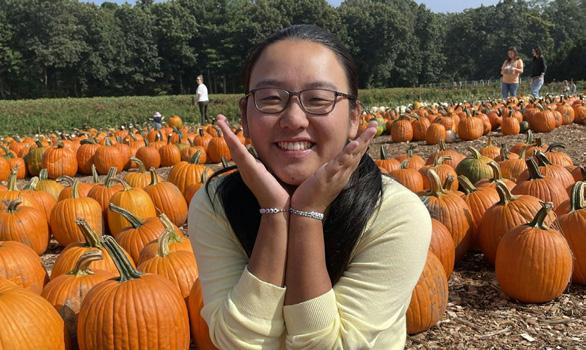
part of her “K-weekly” column, as a choice favorite.
Editor’s note: The Daily’s editorial department acknowledges that this article is premised on a conflict of interest. This article is a special feature for Commencement 2025 that does not represent the Daily’s standard journalistic practices.
“I remember people being like, ‘Do you like to write? Come to DailyCon!’ And I signed up,” graduating senior Odessa Gaines recalled in her Daily origin story. A staple of the Arts and Pop Culture section (and its spring 2025 executive editor), Gaines’ journey with the newspaper began at the student organizations fair during her first year, where her existential need to write encouraged her to join and try something new.
“Since kindergarten … I’ve considered myself a ‘writer.’ I love to write little narratives, short stories, essays, and I wanted to do something that would keep me honest,” Gaines said. “I gotta write!”
Gaines’ work spans an impressive diversity of subjects, embodying the distinct variety that the section pushes its members to explore. She highlighted her two-part article on African American appropriation in K-pop, which she published in the spring 2022 semester as
“I was very proud because a lot of people don’t talk about it that deeply, and that was the first time that I put my opinion out there,” she said. “I knew people out there would be like, ‘Just review the f---ing song,’ but to actually make a point of music in general … it should be about the meaning of what matters.”
Gaines discussed how her two-year-long experience of writing “K-weekly” helped her understand the process of being in the Daily, covering feedback, research, deadlines and ultimately, paving the way for successive columns.
“My writers’ strike column … was more timely, as things were happening every day. The strike ended when I was about to publish an article about the strike not ending — I had to sit there and rewrite it, keep news alerts on and read legal documents,” she laughed.
In addition to her columns, Gaines has frequently collaborated with managing editor and graduating senior Nate Hall. She traced the start of this partnership to a theater production they both worked on.
“ we kind of butted heads a little bit. ... I’m pretty stubborn about things I think I’m right on, and Nate can be too … so having the challenge of sitting
there … also forces you to see from their perspective and open your mind,” she said. “ with the creative process, it’s not going to click immediately, but it’s so good to have a consistent writing partner.”
Her time working with Hall was just one piece of her “Dailmunity” experience.
“I have to shout out Carl [Svahn (LA’24)]; I am so grateful to have been on the section when he was [the executive editor],” she said. “we also happened to share a class during that semester. … One day, we just started talking about Marvel and comic books, and we were just nerding out over it. And it was one of the first times I felt like it was acceptable for me to nerd out.”
Gaines discussed how working with her mentors and peers motivated her to embrace her individuality and principles through writing, especially in the fall 2022 semester when she served as co-chair of the Daily’s then-named Intentionality & Inclusivity Committee (now the Ethics & Inclusion Committee).
“Being so dedicated to journalism, serving the community and standing on your morals really set the tone for me,” she said. “Your first responsibility is to be a journalist; you can’t sacrifice that to please your friends. … If the theatre show is bad, the theatre show is bad!”
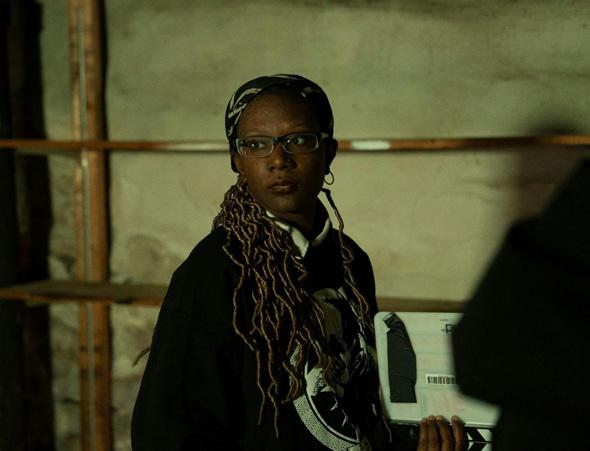
Gaines underlined how her time with the Daily taught her the importance of navigating varying — and even diverging — opinions.
“You have to understand that you can’t just write 800 words about [why] this movie sucks. You have to be able to pinpoint things. That comes through your writing: how to accurately create a position and defend your position,” she said. “Recruiting new members or training students and explaining to them why we do things a certain way … comes down to understanding how to articulate things.”
Four years, three columns and 127 articles later, Gaines
is grateful to have been able to hone her craft with the support of the Daily and its community.
“I owe so much to an organization that gives me so much opportunity to write … to have the room to fail, but also have people who will not let me fail, and have my back and give me feedback and criticism,” she reflected. “It is bittersweet to leave, but I can also go forward knowing that I’m not going to stop writing because of what I have learned here.”
Graduation is a new beginning, and Gaines is ready for it.
“I have so much more to say, and I will say it,” she said.
Editor’s note: The Daily’s editorial department acknowledges that this article is premised on a conflict of interest. This article is a special feature for Commencement 2025 that does not represent the Daily’s standard journalistic practices.
Graduating senior Ryan Fairfield began writing for the Arts and Pop Culture section of the Daily the second semester of his first year. A double major in film and media studies and political science with a minor in English, Fairfield said he chose to join because he realized he missed writing.
Over winter break, he pitched his first idea for an article about the Netflix docuseries “Cheer” (2020–22). He partially credited former executive arts editor Maeve Hagerty (LA’24) for his choice to continue with the Daily, saying she was “so nice and so willing to help out. She made it really easy to join.”
Although new to the Daily, Fairfield was not a new writer. He served as the editor-in-chief for his high school newspaper, where he also wrote about the arts. He compared his writing between high school and college. “I think coming to college, I was able to shift more, write a little bit more interesting, more niche articles,” Fairfield said. “Art features … and art news, rather than just reviews.”
Fairfield has written two columns for the Daily in addition to standalone articles. Both columns focus on fashion, a subject that interests Fairfield. Fairfield was also inspired to write about fashion because he thought there was a lack of coverage on the subject.
“I felt like we didn’t have a lot of fashion content in the Daily section,” Fairfield said. “I kind of want to bring a more consistent discussion of fashion.”
His first column, “Looking Through the Met,” in which he analyzed past Met Galas, presented unique challenges. “when you don’t have the copyright, you really have to rely on the ability to explain what something looks like when you can’t show a photo of it,” Fairfield said.
His more recent, and favorite, column, “Confessions of a College Shopaholic,” was inspired by the film “Confessions of a Shopaholic” (2009). “I love to give advice,” Fairfield said. “It’s a little bit of an advice column, a little bit of me yapping about things, like good decisions I’ve made when it comes to fashion, bad decisions I’ve made when it comes to fashion.”
Fairfield has a different writing process for columns and articles. while for columns, he kept a running list of ideas in his phone, he typically thought of article ideas on the spot. Fairfield praised his executive arts editors for their support, saying, “I’ve never had an article where they’ve been like, you can’t do that.”
Fairfield mentioned an idea for another column he was never able to write. It would have been titled “Drinking with the Stars.” “Legally, I don’t know if I could have done this, but it would be trying all the celebrity alcohols or celebrity drinks,” he said.
In addition to his personal articles and columns, Fairfield wrote articles in partnership with other writers. “The Arts section can feel a little secluded,” he said, noting that collaboration reminds you that “these are real people, and they’re really fun to get to know.” He gave the example of the article “Pop culture moments in 2022 that altered our brain chemistry,” which he wrote with current Executive Arts Editor and graduating senior Odessa Gaines and former staff writer RaiAnn Bu (LA’24). “I think it was just really fun because we all loved pop culture, but we all had different niches,” Fairfield said. “It’s nice to see people’s different styles and their approaches when it comes to writing about arts.”
In retrospect, Fairfield named two articles of which he was particularly proud. The first was an article based on a podcast episode in which influencer Emma Chamberlain explained why she left YouTube. “For a couple months, if you Googled Emma Chamberlain, and you went to the ‘News’ section, it was one of the first things that would pop up and that felt really legit to me,” Fairfield said. The piece was one of the most viewed Arts
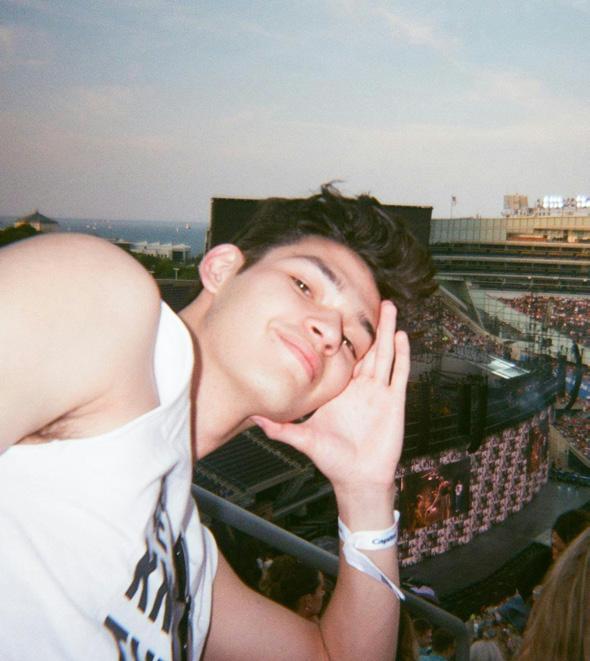
articles of that semester. “That just gave me the little confidence that, oh, people actually care what I’m saying,” he said. He added that he was also proud of an article in which he successfully predicted the winner of the fall 2022 season of “The Masked Singer,” Amber Riley, because he recognized her voice from “Glee” (2009–15). when not writing for the Daily, Fairfield worked as a communications assistant for Tufts Student Life and served as
media
coordinator for Tufts Dining. He described the experience as “a different form of journalism … you never know how much of an impact or how helpful what you said to someone is.”
Although uncertain of his post-grad plans, Fairfield said, “I’d love to continue in social media, ideally, or even journalism. I always joke that the dream is to work for Vogue, and it’s half a joke, half not a joke. … I’m drawn to creativity and outlets that allow me to be creative.”
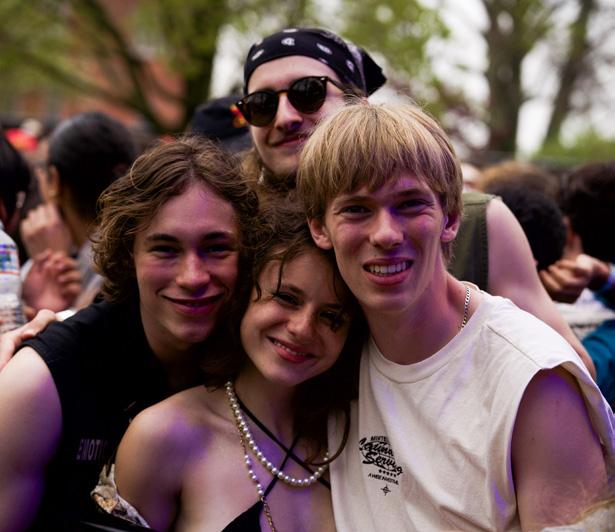
PHOTOS BY JOHN MURPHY


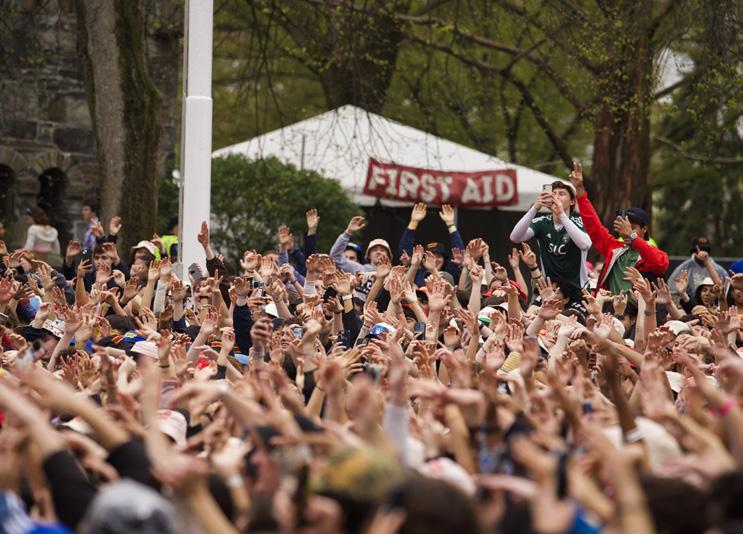






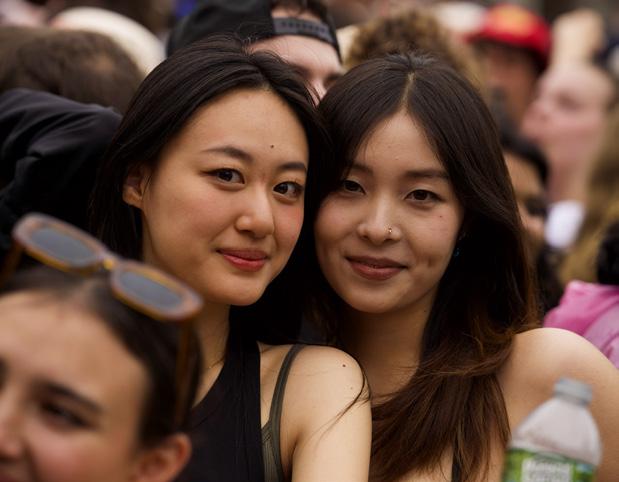


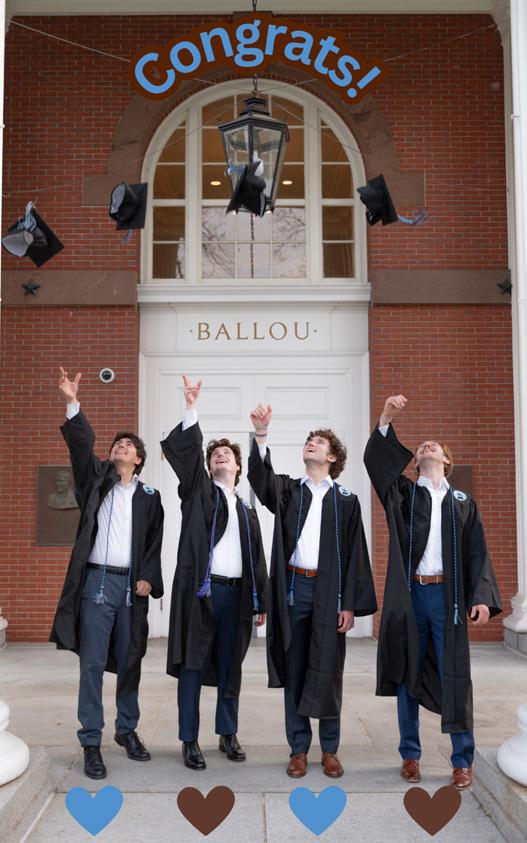
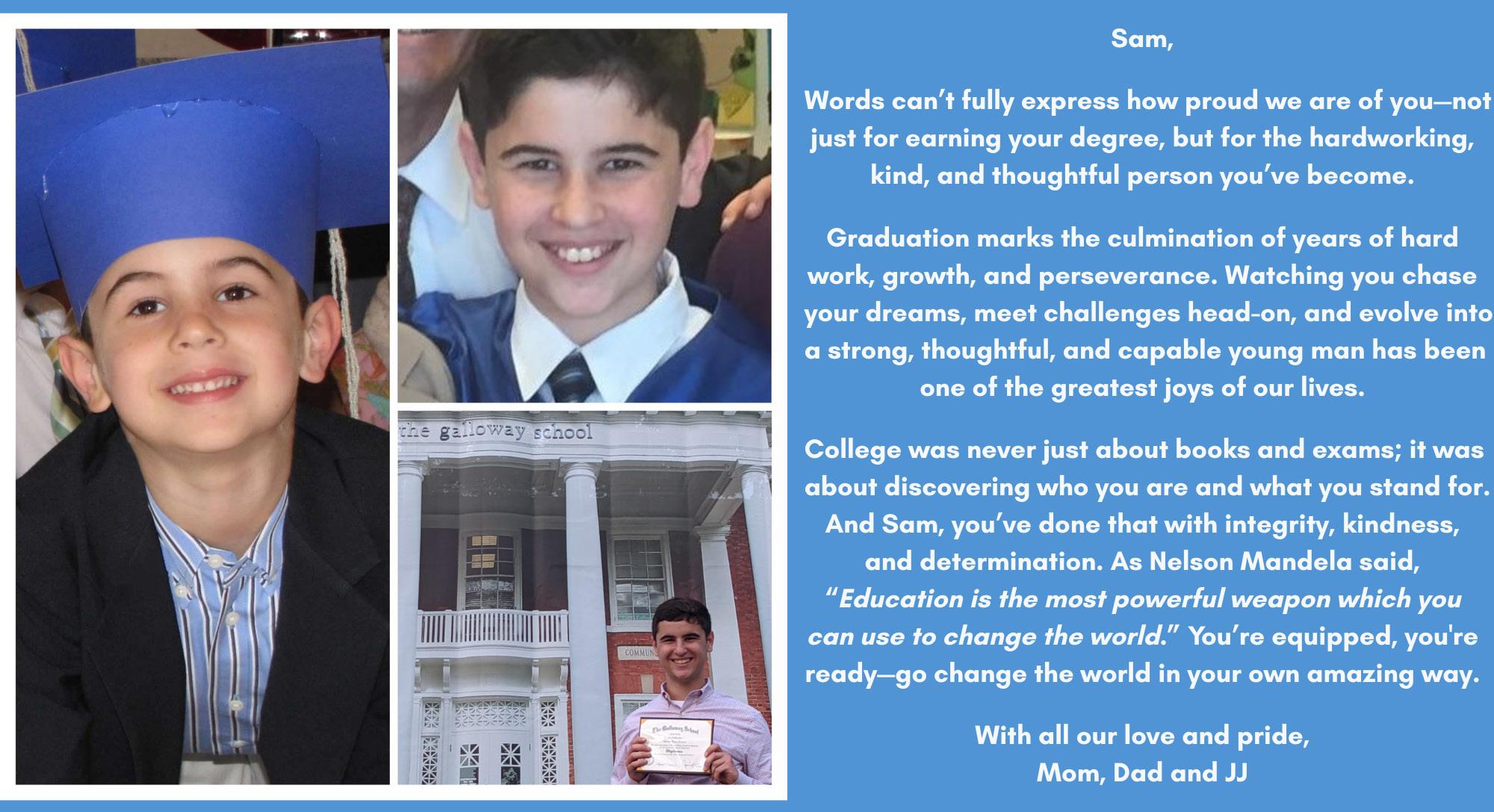
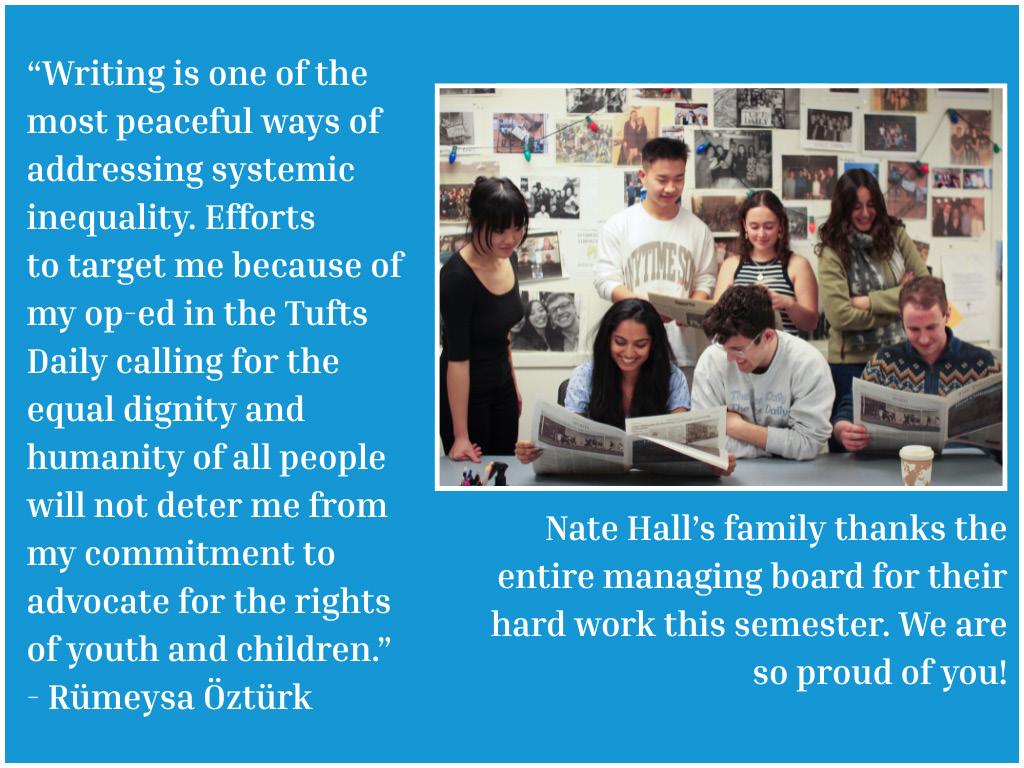
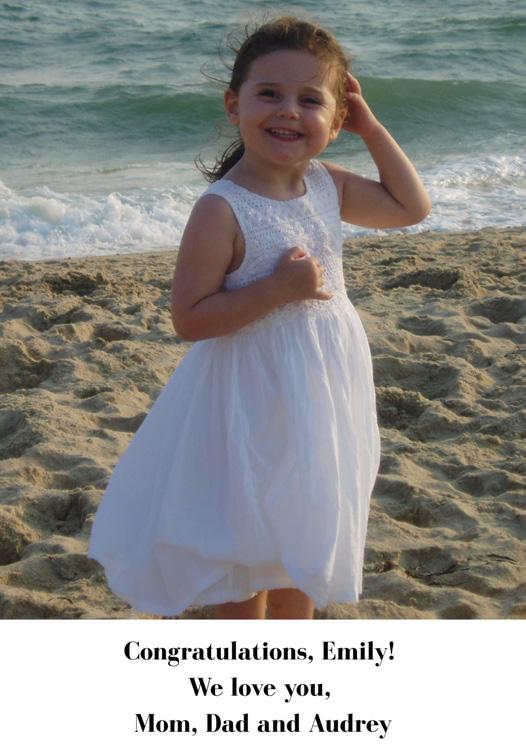
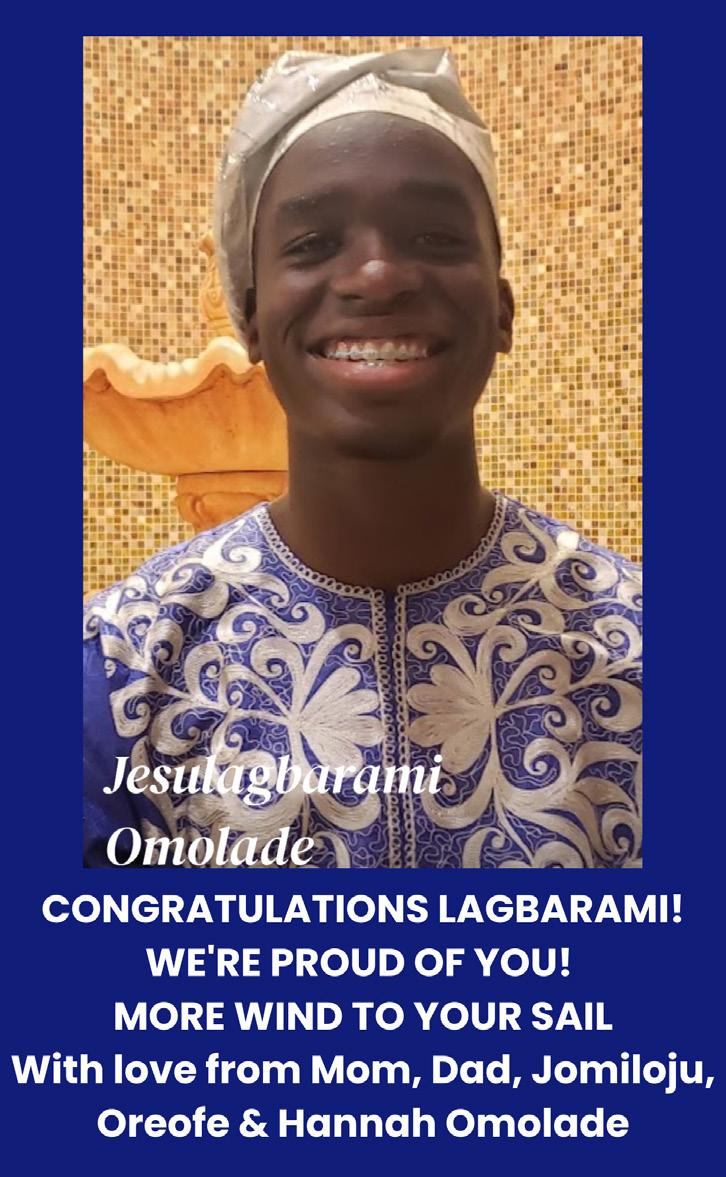

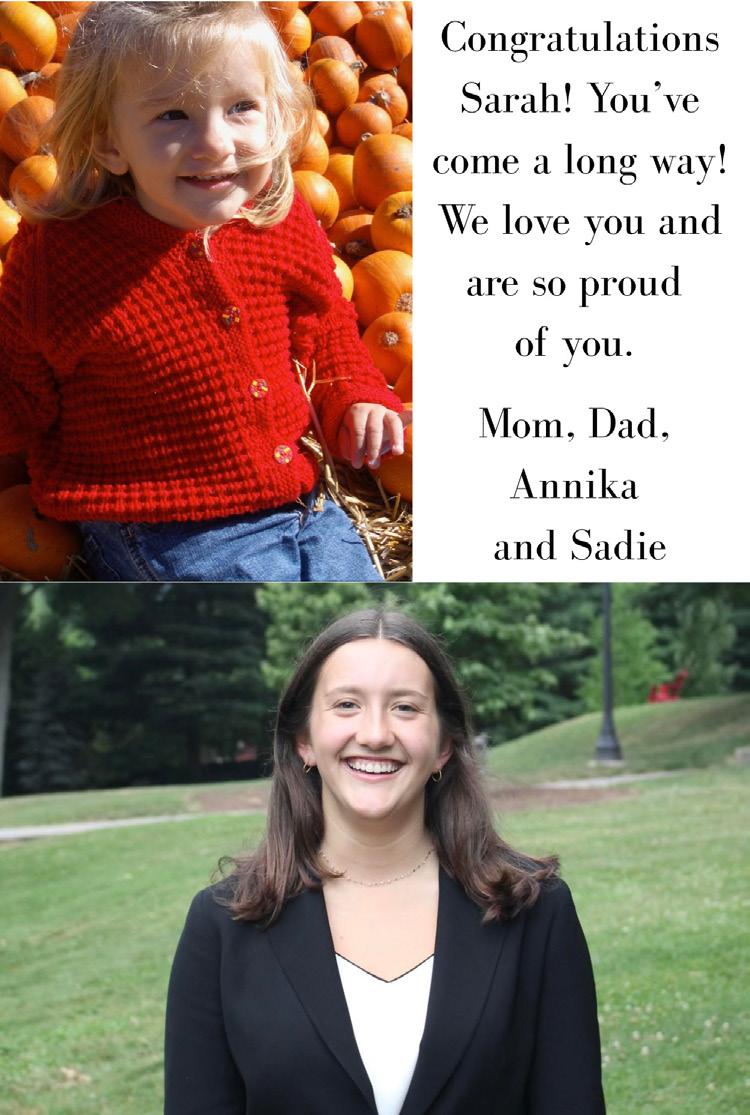
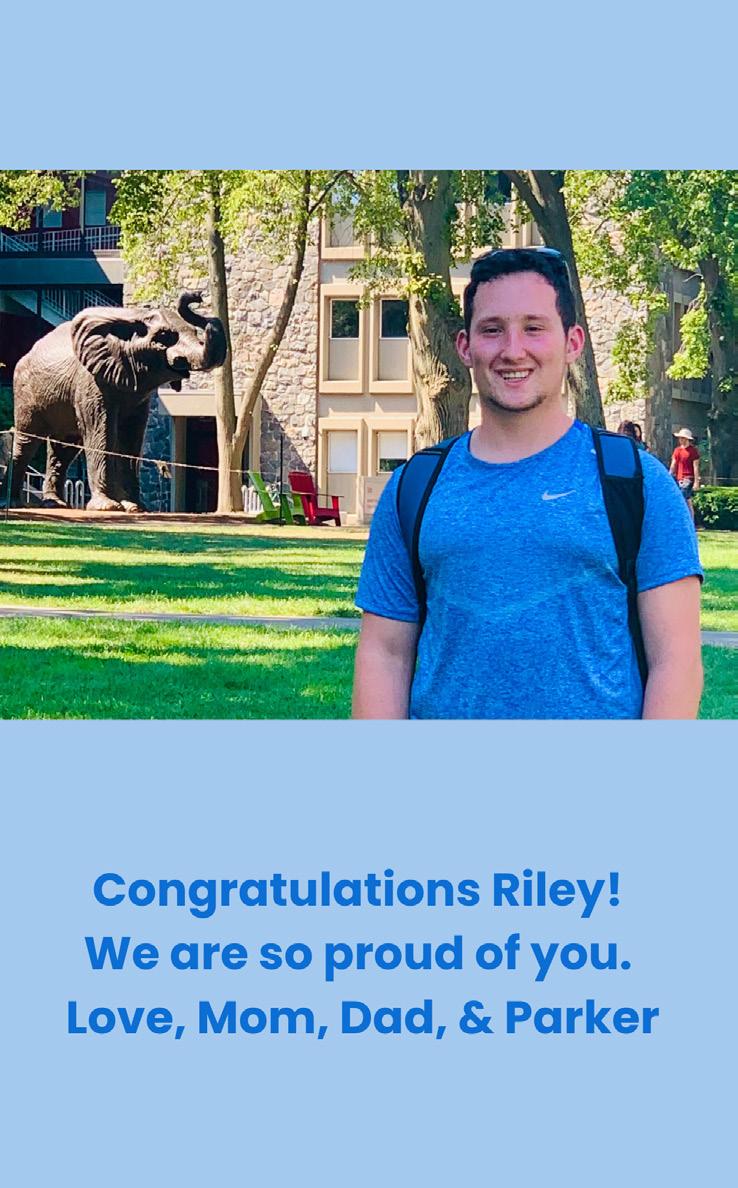
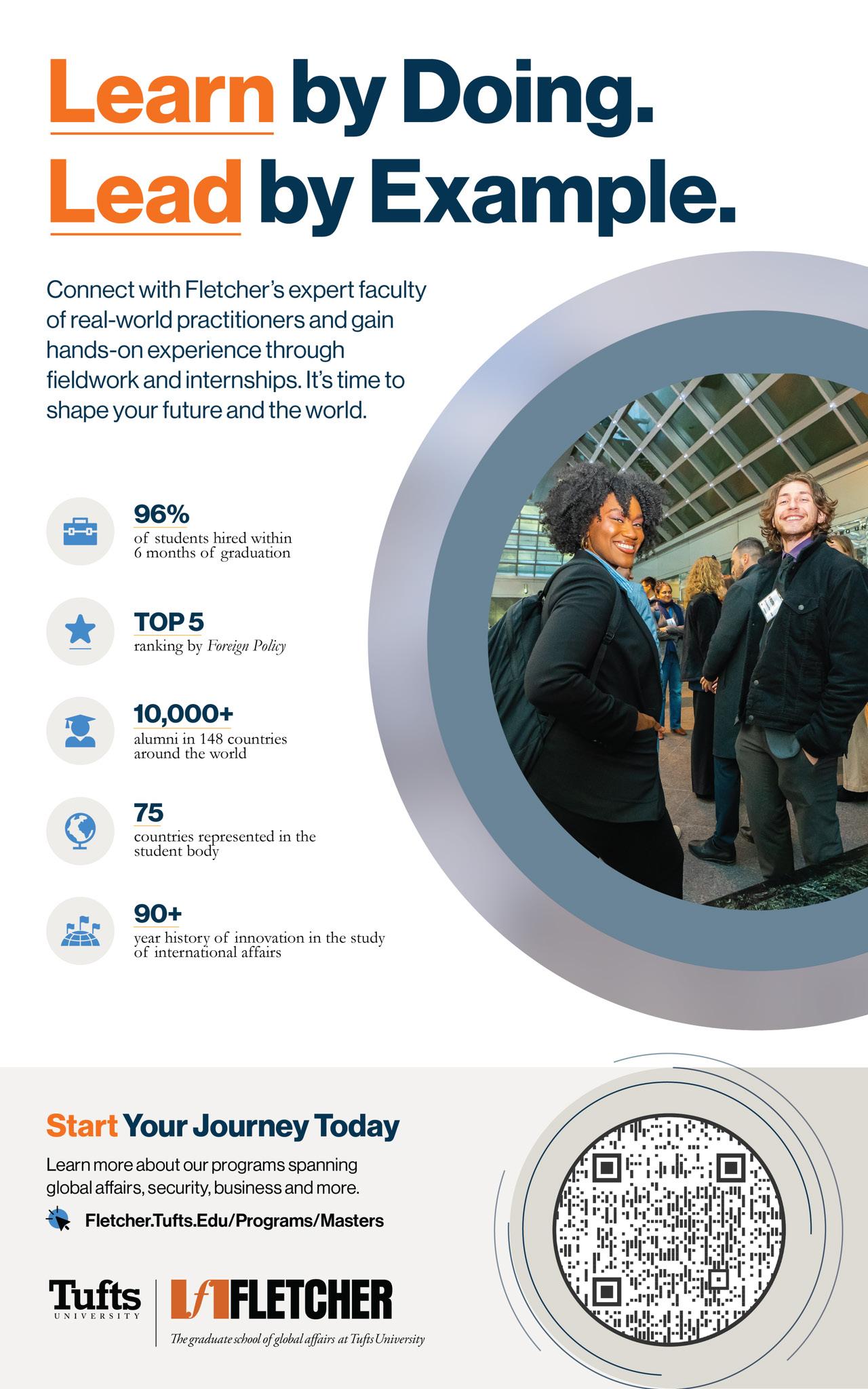
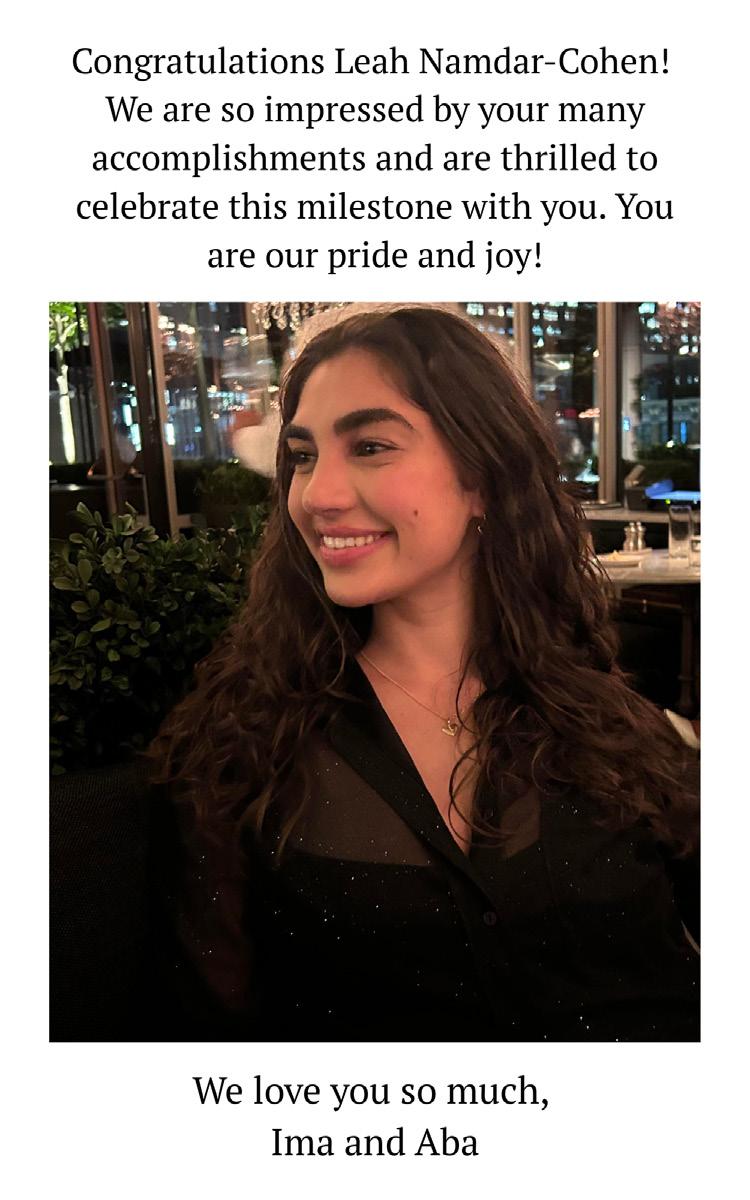

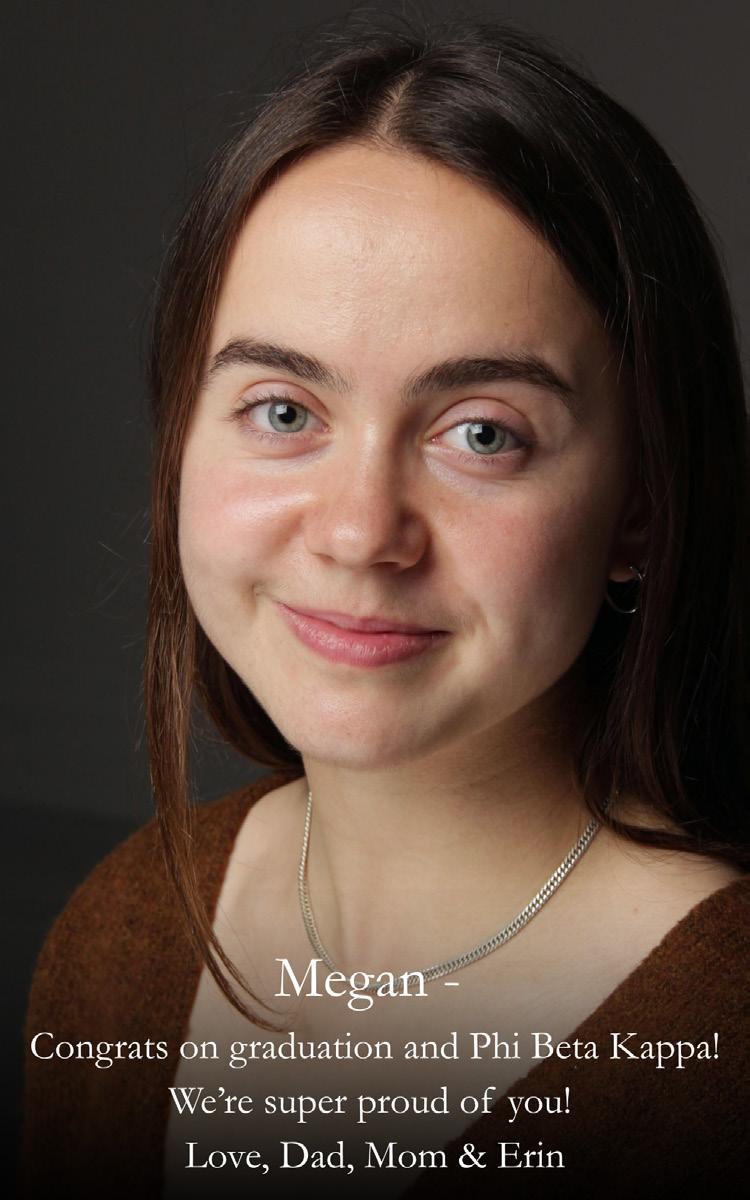


its arts programs, Dettling’s passion for the field was all the more striking.
Editor’s note: The Daily’s editorial department acknowledges that this article is premised on a conflict of interest. This article is a special feature for Commencement 2025 that does not represent the Daily’s standard journalistic practices.
For graduating senior Ava Dettling, art is far more than just a mere pastime.
“The arts [are what keep] people alive,” she said.
Dettling arrived at Tufts as a student at the School of the Museum of Fine Arts, pursuing a bachelor’s of fine arts. However, by her sophomore year, she transferred into the School of Arts and Sciences, where she studies international literary and visual studies with a focus on film and French.
“I’ve always loved film,” she shared. w hile D ettling completed Advanced Placement Art and was part of her high school’s film club, her academic focus remained rooted in the visual arts. “I didn’t have a portfolio or film or anything, and it was just more something that I love to do and study.” It was through her visual arts portfolio that she gained admission to Tufts, but once in college, she gradually shifted toward film studies.
Coming from a high school that wasn’t exactly known for
“The arts were just not taken seriously,” she said. “So I was just very happy to give my whole life to it.”
It wasn’t until sophomore year that she began writing for the Daily — a delay that stemmed largely from the divide between Tufts’ Medford/Somerville campus and the SMFA campus in Boston. Living in Boston her first year, she felt disconnected from the Medford/Somerville community and its student culture. Once she joined the Daily’s Arts and Pop Culture section, though, it felt like a natural fit.
“[Art] is all I do. It’s all I study. It’s all I [do] outside of study. It’s what I wanted to do for work,” she said.
Initially, Dettling wrote about the things she personally loved — her favorite movies and books. But as she gained confidence, her approach to journalism began to shift.
“I was so scared to interview people my first semester,” she recalled. “[But] that makes for really interesting articles.”
Dettling began by interviewing more widely recognized artists. One of her most memorable early pieces was an interview with British musician Declan McKenna about his upcoming tour — an opportunity that felt surreal.
“That was just something I’ll never forget,” Dettling said.
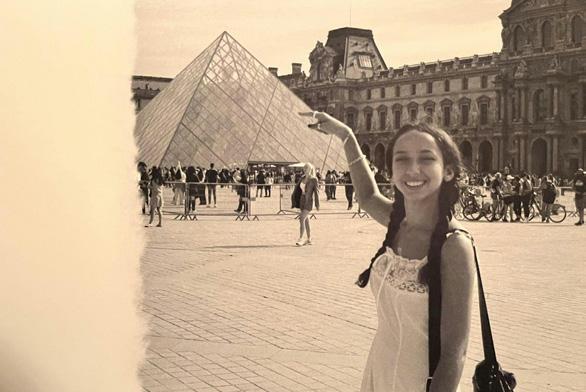
However, after spending her junior year abroad, Dettling returned to campus with a new perspective — especially when it came to spotlighting artists within the Tufts and greater Boston community.
“There [are] so many people here,” she said. Despite Tufts having an entire school dedicated to the arts, she noticed that SMFA students were underrepresented in the Daily’s coverage — and that few SMFA students wrote for the paper at all. “I based my writing more around actual things that are happening locally and local artists and stuff like that.”
That community focus shines in her current column, “Coffee with Creatives,” an interview-based multimedia project where she sits down with Boston-based and Tufts-
affiliated artists. Over the course of the semester, she’s spoken to filmmakers, musicians and visual artists — always with the intention of going beyond surface-level questions.
“I wanted it to be artists talking about what they really wanted to talk about,” she said. “It could be their process. It could be just artists they love. It can be what they just made [or] something like that. But since it’s 500 words, I just really want it to be what they want to talk about.”
what she’s found, more than anything, is how much artists across vastly different disciplines have in common.
“Art is very interconnected,” Dettling noted. “To see them talk about it in the exact same way is so cool.”
Though she never envisioned herself as a journalist,
Dettling has found something meaningful in writing and publishing her work, and in building a portfolio that reflects the full range of her artistic interests. It’s also opened unexpected doors as she looks toward her future.
“This has been the most rewarding part of my time at Tufts,” she said. “I’ve dabbled in painting and drawing and done film and made movies … [but] nothing’s ever been so rewarding as having a portfolio of writing and pieces to say that I’ve written.”
The experience helped her see writing as another medium of creative expression — one that, like film or painting, allows her to explore and elevate the art that surrounds her.
“I just kind of fell into journalism,” she added. “Now that’s [the jobs] I’m applying to.”
As she approaches graduation, Dettling remains steadfast in her belief in the value of the arts — whether through storytelling, creation or curation.
“[The arts are] solely based on passion, and to have that much passion around it is beautiful,” she said.
Through her studies, journalism, future career and creative work, Dettling hopes to keep showing the world what she already knows to be true. “Art saves lives,” she said.
Editor’s note: The Daily’s editorial department acknowledges that this article is premised on a conflict of interest. This article is a special feature for Commencement 2025 that does not represent the Daily’s standard journalistic practices.
In a wood-paneled practice room on the lower level of Granoff Music Center, graduating senior Matthew winkler sat down to talk about his love of classical music, his years writing for the Daily and how composer Gustav Mahler changed his life.
“I can’t think of the exact time I first heard Mahler,” winkler said. “I started the trumpet in sixth grade … but I think when I first actually fell in love with the music … [was when] I got a YouTube recommendation for [Mahler’s Symphony] No. 5. … That opening trumpet just kept building, and the depth of emotion overwhelmed me. It was so stormy and dramatic, but also had these profound moments of beauty in the middle of it.”
Coming from Austin, Texas, music has always been a part of winkler’s life — but not always part of his plan. Coming into Tufts, winkler planned to double major in history and English. “Music was just sort of my hobby and the way I processed emotions, especially composition,” winkler said. After taking a handful of music classes every semester, including Associate Professor Frank Lehman’s “Sound and Structure,”
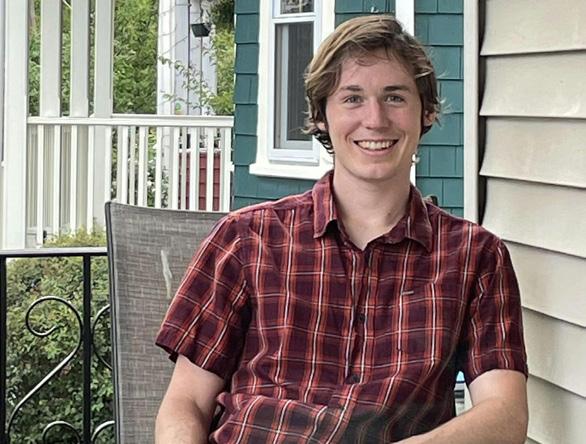
winkler finally decided to study music again.
“I didn’t want to study music because I took the trumpet very seriously in early high school, and then I burned out hard. …
But this sort of academic side of music has been a pleasant surprise I didn’t realize existed until I got here,” he said.
One of his entry points into music journalism came from the Daily, where he began writing concert reviews of the Boston Symphony Orchestra for his column, “winkler’s weekly Symphony Guide,” a name his friend dared him to use. “Boston has been amazing because I’m a nerd about old arts, and Austin is very new arts scene. … I didn’t really have the opportunity to see a world-class symphony perform in Austin.”
His sophomore year, with a BSO
College Card, winkler reviewed a season’s worth of performances. These reviews led him to start interviewing the musicians and performers he was listening to.
“The first interview I ever did was with this band called Oliver Hazard. And I was so nervous. … Ahead of our interview, I transcribed every single song they’d ever written because I was like, ‘I gotta be prepared,’” winkler said.
Luckily, his preparation time has dwindled over his career at the Daily.
“But as I’ve done more and more, I’ve gotten more and more comfortable,” he said. “And I’ve discovered that the best interviews are actually the ones where instead of coming in with all this preparation and preconceived notions of what you should talk about, it actually goes better, even
if you haven’t prepared, to just sort of listen and follow the flow of conversation.”
w hen asked about the importance of younger audiences attending the orchestra and writing reviews, winkler didn’t hesitate.
“I think it starts with education, and I also think it starts with the way that the orchestras choose to present the music and how to program it,” he said. “The depth of emotion [in classical music] is, to me, unparalleled in any other art form. But I think that there are a lot of barriers of entry to getting to that point, and I think symphonies could do a lot more to make the music resonate with an audience member in a way that both appeals to an experienced listener and also a brand new listener.”
winkler recounted a memorable interview he gave with Chad Smith, BSO president and CEO.
“[Smith] aligns with what I want out of these big institutions in terms of public humanities and public arts projects. And I think he’s doing a lot of really great work to try to connect this really abstract, inaccessible music to people who might not normally have the doors open to them to experience that,” winkler said.
And, the inevitable question: what is after Tufts?
In the long run, winkler hopes to pursue a doctorate degree in historical musicology and cites Assistant Professor Jeremy Eichler as an inspiration. winkler spoke about Eichler and his novel,
“Time’s Echo: The Second world war, the Holocaust, and the Music of Remembrance.”
“The craft of his writing is very impressive in a way that connects with the public while still having rigorous historiography about this art form of classical music that just means so much to me,” he said. “The reception that book has received has told me that it is possible to connect with the public about these more inaccessible topics, and [that] there is a hunger for that as well.”
Before his venture into graduate school, winkler will be teaching English for the Teaching Assistant Program in France and contributing to a Five Sisters Production documentary on jazz singer Joya Sherrill with Jennifer Burton, Tufts professor of the practice in the theatre, dance and performance studies department.
To winkler, musical scholarship extends far beyond the limits of academia and reaches something that Alma Mahler — composer, writer and wife of Gustav Mahler — would consider to be “the loving soul.”
“Music is the architecture of time. when a Mahler piece or a Beethoven piece or a Julia Perry piece gets performed, you are hearing the exact same thing that they heard 300 years ago. And there’s something really special about the ability to travel back into that,” winkler said. “Music, to me, more than other art forms, feels like such a window into someone’s soul.”
VIEWPOINT
Mariia Kudina Staff Writer
when I came to Tufts in the fall of 2022, I was still in shock from the start of the full-scale invasion of my home country, Ukraine. I was exhausted by uncertainty: watching the horrific news unfold, not yet knowing how to cope with the daily tragedies caused by the bombings and fighting on the frontline. Speaking up about the war on social media was helping me to feel less powerless. when I heard about the Daily, I realized that writing for the newspaper would be another great way to raise awareness about the war — a tool to turn my frustration into helpful actions. At first I was not sure that I would find support for a column about Ukraine. However, from the very first meeting in the Opinion section, I felt encouraged to express my reflections about the war, and this support helped me tremendously to gain the courage to share my personal, often traumatic experiences through my writing.
At the time of that first meeting, I had not yet voiced the idea of the column but had simply suggested the topic of Ukraine when we were pitching articles. A few days later,
I was incredibly surprised to see a piece about the war in the paper, written by a student who was also at the section meeting. Seeing it was a final push for me to apply to write a column, which I did shortly after. The author of the article later became my editor for a semester, and I am incredibly grateful to him and to all the people from the Daily with whom I worked throughout these three years. All of my editors shared this journey of writing about war-induced death and suffering — but also positive
developments and resistance — with me. without their encouraging words and careful suggestions, not only would my writing not be as strong, but I would have also written less. Thoroughly covering such a traumatic topic without this support system would have been very challenging, especially considering that most of my projects at Tufts also revolve around the war in Ukraine.
During my senior year, I have worked on two theses — a paper and a short film — both covering
topics related to the war. My thesis paper focuses on the documentary “20 Days in Mariupol” (2023), directed by Mstyslav Chernov, and in some ways resembles the articles that I wrote for the column as I have frequently covered the siege of Mariupol. The film that I created for my other thesis looks into how the war affects familial relationships. In particular, it explores how my parents’ relationship dynamic strengthened after my mom returned from her temporary migration to Poland
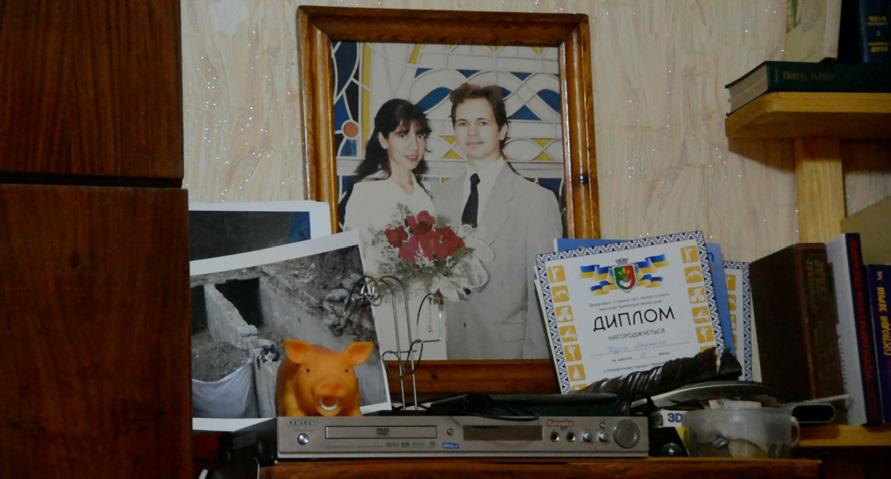
If you’re part of the Class of 2025, you’re likely no stranger to the emotional whiplash of dread, anger and anxiety, sometimes punctuated by flickers of hope and anticipation, that has characterized the last few months. Perhaps you’re part of a student research project whose funding was cut. Or, the jobs that once defined your dream career no longer exist. Maybe, like most of us, you’re facing a dauntingly high level of competitiveness for entry-level jobs. In short, the future does not feel bright. I, for one, do not feel limitless career potential. Regardless of what commencement speakers may say, it is objectively a terrible time to graduate from college. So, how can we, as a graduating class, cope with the fact that our plans are being forced to change due to factors beyond our control?
I am graduating with a double major in international relations and civic studies. From the onset, I felt drawn to the dual perspective the coursework offered: International relations focuses on
at the beginning of the full-scale war. These projects carry a lot of emotional weight, and working on them in addition to writing my column was tough at times. However, due to the support of the Daily and the Tufts community in general, I was able to continue speaking about Russian atrocities in Ukraine. Seeing my work occasionally change the perspectives of people has been very rewarding. I distinctly remember my classmates who did not have ties to Ukraine telling me that my video work made them better understand the realities of the war.
The School of the Museum of Fine Arts and the Daily have given me a safe space to share my experiences and opinions, as well as a platform to learn using soft power (words) to develop the Ukrainian cause. I am beyond grateful that upon my graduation, I feel I am able to invoke at least some small change that could eventually bring justice for my country, and I most definitely feel a lot less paralyzed by the war. with every article and project, I grew to be more confident in expressing my political stances, and I am endlessly grateful to have had this chance to develop as a writer surrounded by such reassuring and caring people.
VIEWPOINT
The road ahead looks grim, but what the hell?
how the world should interact to maximize international prosperity, and civic studies asks how we as a collective community should interact to maximize local prosperity. My concentration is international security, and as I’ve watched the U.S. government teeter between diplomacy and dysfunction, both my anxiety and sense of purpose have become heightened. Unfortunately, many of the jobs I expected to be a starting point for a career in international security have disappeared. The current administration of President Donald Trump has defunded, disbanded or placed hiring freezes on agencies like the United States Agency for International Development. They have derailed pathways to jobs in the State Department. when I subsequently tried to pivot towards a career in civic studies, I was met with a plethora of NGOs who informed me that they now lacked the funds for new hires. I know many of my peers are experiencing similar setbacks in other fields, creating a unique sense of camaraderie among the Class of 2025 over this shared difficult experience.
Over the past few months, my advising conversations with professors have revolved around perspective: How can I navigate the unpredictability of the present while still keeping sight of my long-term goals? Back in December 2024, I envisioned my post-grad self working in a new city, beginning my career. Now, I’ll be starting graduate school this fall. My plans have shifted dramatically, and yet, in the stressful whirlwind of figuring out what comes next, I’ve found joy in the communities I’ve built at Tufts. when job rejections stung and the future felt increasingly uncertain, the spaces I once considered extracurricular became essential. I found solace in rehearsals with the Tufts Symphony Orchestra, conviction in my hot takes for the Daily’s Opinion section and purpose in global conversations with women in International Relations. These communities reminded me that my worth and potential aren’t measured by a job offer but by the relationships I’ve nurtured and the passions I’ve pursued at school. Graduating into a world of uncertainty has, paradoxically, given me
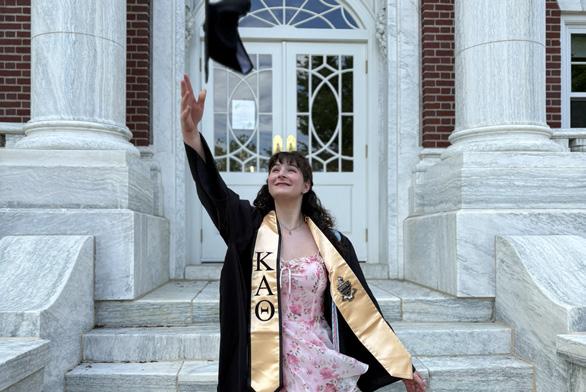
a rare gift: permission to simply be present.
To my peers in the Class of 2025: we can do more than cope, survive or “wait it out.” we can continue to learn in or out of school, participate in civil disobedience, support local businesses, encourage scientific research and choose to be optimistic. I firmly believe we will make time and space for humanity, resistance and a respect for academics in our future. we will create opportunities to reinvent what
others have dismantled, and we will be a vital part of that work. we’re graduating into a world that lacks many of the opportunities we awaited as undergraduates, but we can and will be a part of what comes next. Graduating in May 2025 is painfully disillusioning, but instead of taking this time to wallow in the existential dread and uncertainty of current events worldwide, we can use this time to invent our vision of the future that we will have a chance to carry out.
The Tufts Daily is a nonprofit, independent newspaper, published Monday through Friday during the academic year, and distributed free of charge to the Tufts community. The content of letters, advertisements, signed columns, cartoons and graphics does not necessarily reflect the opinion of The Tufts Daily editorial board.
EDITORIALS: Editorials represent the position of The Tufts Daily Editorial Board. Individual editorialists are not necessarily responsible for, or in agreement with, the policies and editorials of The Editorial Board. Editorials are submitted for review to The Tufts Daily Executive Board before publication.
VIEWPOINTS AND COLUMNS: Viewpoints and columns represent the opinions of individual Opinion editors, staff writers, contributing writers and columnists for the Daily’s Opinion section. Positions published in Viewpoints and columns are the opinions of the writers who penned them alone, and do not necessarily represent the opinions of the Daily itself. All material is subject to editorial discretion.
OP-EDS: Op-Eds provide an open forum for campus editorial commentary and are printed Monday through Thursday. The Daily welcomes submissions from all members of the Tufts community; the opinions expressed in the Op-Ed section do not necessarily represent the opinions of the Daily itself. Opinion articles on campus, national and international issues should be 600 to 1,200 words in length and submitted to opinion@tuftsdaily.com. The editors reserve the right to edit letters for
appear in the Daily. Authors must submit their telephone numbers and day-of availability for
ADVERTISEMENTS: All advertising copy is subject to the approval of the editor in chief, executive board and business director.
On April 22, Knopf Publishing Company released “Notes to John,” a posthumous collection of journal entries Joan Didion wrote after sessions with her psychiatrist. The 224-page work marks the first release of new content by the writer since her 2011 memoir, “Blue Nights.”
The project’s announcement was met with mixed reactions both by fans and by those who were close to Didion before her death in 2021. The prevailing question being raised is whether or not Didion would have approved of the journal’s release.
The ethics of posthumous publishing has been a divisive conversation for millennia. Authors’ consent and approval is constantly weighed against the literary implications of publishing unfinished or discarded works after their authors’
VIEWPOINT
passing. Those who prioritize the former view posthumous works as violations of trust between the author and their executors. Those who prioritize the latter, however, often see the works as something larger than the author themselves, potentially benefiting the field of literature as a whole. which of these two camps Didion would have fallen in, of course, is the question on everybody’s mind. According to Lynn Nesbit, her literary agent, there is no “definitive answer.” However, even a brief perusal of Didion’s bibliography reveals her strong disapproval of posthumous publishing.
In October 1998, Didion published the essay “Last words” in The New Yorker as a contemplation on Ernest Hemingway’s — or, in this case, his estate’s — long history of posthumous publications.

One aspect of the Hemingway estate that she discusses in particular detail is his collection of letters. Hemingway, as she explains, was vehemently opposed to his letters being made public. In fact, she directly quotes a letter to his executors on this topic, where he clearly states: “It is my wish that none of the letters written by me during my lifetime shall be published.” If that wasn’t enough clarity, he continues: “Accordingly, I hereby request and direct you not to publish or consent to the publication by others of any such letters.”
It would seem that such a simple and direct request would leave the executors with no choice but to abide. And yet, as Didion explains, Hemingway’s widow and executor Mary welsh Hemingway would wait only 15 years after his death before directly violating his wishes by publishing his letters. How such an action could be justified once again boiled down to a statement about potentially benefiting the field of literature as a whole.
The question of Hemingway’s posthumous publishings draws somewhat striking parallels to the current conversation about “Notes to John.” In considering whether or not Didion would have endorsed the journal, “Last words” illustrates her likely disapproval with stark certainty.
“The publication of unfinished work is a denial of the idea that the role of the writer in his or her work is to make it,” she wrote. “You think something is in shape to be published or you don’t, and Hemingway didn’t,” she wrote in another section. To read those words and still claim that the question of Didion’s view on
VIEWPOINT
posthumous publishing has no “definitive answer” suggests pure selfishness and complacency.
Didion’s personal opinions regarding posthumous publishing aside, “Notes to John” raises significant moral concerns due to the nature of its content.
“Notes to John,” as it is a reflection on her meetings with her psychiatrist, delves into the most personal and intimate aspects of Didion’s later life. Among these include, according to The New York Times, “her fear of aging and mental decline, her fraught relationship with her parents and, most of all, her agony over [her daughter] Quintana’s addiction and mental illness — a subject she was evasive about in her writing.”
Granted, Didion was no stranger to writing about immensely personal topics.
Among her most well-known lines is her declaration that, “[My husband and I] are here on this island in the middle of the Pacific in lieu of filing for divorce,” in part of her essay “In the Islands.” Further, among her most acclaimed novels is “The Year of Magical Thinking,” which details the months following her husband’s death and daughter’s hospitalization.
“Notes to John,” however, is different for two important reasons.
Most obviously, Didion — as open and personal as her writing was — nonetheless reserved and exercised her right to view certain topics with exceptional reservation. while some use her previous discussions of her husband and daughter, as well as her personal fears as justification for
the journal’s exposure of personal musings, the fact of their publishing should be taken as proof of the opposing view. This is to say, the fact that she has breached these topics in the past proves that Didion already made an active choice regarding the extent to which she was willing to share her experiences with these struggles. By publishing “Notes to John,” her estate is steamrolling this choice and robbing her of her agency to determine the limits of what would be shared.
“Notes to John” is also different from those previous works because its publishing rendered Didion unable to manage and mitigate her outward image both as a person and as a writer, something that was chiefly important to her when she was alive. Didion was, first and foremost, a person who valued privacy and control above all else. She had an intricately woven public persona: one of constant stability and elusiveness, hiding an unmatched eye for observation behind black sunglasses and a cigarette.
Joan Didion, at the end of the day, was not some fictional character — she was a person. Regardless of how thoroughly accurate her public image was to her real self, she held every right to present it as such.
In an interview with NPR, Jordan Pavlin, the publisher and executive vice president at Knopf, describes “Notes to John” as “fill[ing] in those blanks” between lesser-known aspects of Didion’s life. why are we, as the readership, entitled to have those blanks filled in for us? The question is, of course, rhetorical: we are not, and we need to learn how to start respecting that.
Sadie Roraback-Meagher
Deputy Opinion Editor
walking through the halls of Tisch, desperate to find a study spot, my eyes can’t help but dart to what rests on everyone’s desk. No, it’s not books that my peepers are gazing at, but the vast array of colorful Owala water bottles that have taken over campus. I don’t think I’ve gone a single day this school year without seeing one of those brightly-colored vessels shoved into the side pocket of a backpack or standing tall on a desk. Even the Tufts Bookstore has caught on to the epidemic, now selling a variety of Owala bottles for students to hydrate with. Yet, as I sip on microplastic-infused water from my deteriorating bottle, I find myself struggling to understand this trend. wasn’t it just last year that everyone was clenching their Stanley cups? And what about those insulated Hydro Flasks that would thunder when they hit the floor?
Though I’m not au courant when it comes to trends, I predict that water bottle fads will go down as one of the most dumbfounding cultural phenomena of all time. For a generation that preaches about the woes of capitalism and climate
change, our obsession with buying a new reusable water bottle every year is laughable. Truly, how can we expect anyone to take our concerns seriously when we’re sipping on our own poison?
But reusable water bottles weren’t always treated like Chanel handbags. In fact, they were initially only popular among hikers and environmentalists, early adopters of the mantra “reduce, reuse, recycle.” with the dawn of the new millennium, however, reusable water bottles began making their way out of the woods and into the general public’s shopping carts. Consumers started to see them as more than just eco-friendly cylinders but instead as glamorous accessories. They came in all colors, shapes and sizes, growing into a $7.04 billion market by 2015. Of course, it wasn’t just their aesthetic appeal that was raking in the big bucks: Much of the newfound craze for reusable water bottles can be attributed to the rise of health trends that preached a gospel of glugging water. I mean, why drink the recommended eight cups of water a day when you could instead sip in style from your Stanley x Barbie 1959 Original 40 Oz Quencher?
Maybe I see the cup as half empty, but I can’t help but judge this fad. Don’t get me wrong, I think the glorified sippy cups that are Owala water bottles are cute, but the $40 price tag and environmental damage aren’t. It takes a whopping 103.4 liters of water to make just one insulated steel water bottle. To put that in perspective, people typically fill up their bathtub with 100 liters of water. Likewise, manufacturing a single reusable water bottle can result in more emissions than a plastic bottle. For a reusable water bottle to offset the environmental impact of single-use plastic, it has to be used 500 times.
Still, reusable water bottles are the best way to go if you want to be environmentally friendly. Stainless steel bottles like Hydro Flasks and Owalas can last an average of 10 to 12 years, far longer than any flimsy plastic you may sip from. They can also be a major money saver: A $20 reusable water bottle can save an estimated $6,180 a year.
But the value of these steel bottles as eco-friendly alternatives diminishes with each new TikTok trend that summons Generation Z to their nearest Target to obtain the latest jeweled jug of the season.
These fads defeat the point of reusable water bottles by turning them into collectibles, encouraging people to buy a new one even if they don’t need to. Reusable water bottles aren’t meant to be single-use — your current bottle can keep your water cold regardless of what the latest water bottle trend is.
So, when the next water bottle makes a splash, consider if you
really need to buy one before you prematurely retire your old canister. If your current bottle has dents bigger than craters on the moon, then purchasing a new one is reasonable. But if you’re tempted to splurge simply to join in on the latest trend, maybe reevaluate your approach to staying hydrated.
Here’s to more eco-friendly shopping habits — cheers.


when I was notified by my supervisor at the Student Accessibility and Academic Resources Center — also known as the StAAR Center — at the end of my first year that I had been accepted as a writing fellow, I was overjoyed. First of all, it was the first job I had ever been offered. Second, it was the only on-campus job I had been accepted to after applying to countless random positions at the Mayer
Campus Center and Tisch Library through Handshake. I had always wanted an on-campus job because it seemed so cool and rewarding. Now, two years later, I can confidently say I was right, and that my Tufts experience wouldn’t have been nearly as meaningful without it.
First, having an on-campus job is different from merely joining student clubs and organizations. when you work for the university, you become more deeply involved in campus life — not just as a student, but as a part of the school’s
administration. You get to know the staff members who handle behind-the-scenes logistics that keep the university running, and you have the chance to contribute to these operations yourself. It’s an extremely rewarding experience, and one that you’re unlikely to have again after college when you’re no longer directly involved with the Tufts community. while clubs and extracurriculars fulfill intellectual interests and personal passions, working a job adds a layer of practical purpose — and it can make you feel useful too. In the most pretentious way possible, you could even say you have ‘clients’ — your fellow students — whom you are there to serve.
Another major benefit of having an on-campus job is how it helps you discover resources you may not have been aware of, bridging a sense of alienation from the campus that students may experience from not actively exploring what the school offers. For example, before becoming a writing fellow for the StAAR Center myself, I was unaware of all the other tutoring resources the center offers, like appointments
when I arrived at Tufts in 2021, I knew who I was and what I wanted. when I introduced myself across countless icebreakers that fall, I made sure to let anyone and everyone know that I was here to major in international relations and minor in economics, aiming to work in a think tank after I graduated to be close to the political world. This confidence, at the time, seemed well justified. After all, since middle school, I had maintained a passionate interest in Model UN as a vehicle by which I could learn about international affairs and diplomacy, and in my International Baccalaureate program, I regarded my classes as preparation for delving deeper into international relations. In the weeks before I arrived at college and for weeks after matriculation, I remained cleareyed about my future, researching past courses in international relations and listing down the classes I hoped to take in my four years here, as well as extracurriculars which would support my ambitions. Suffice it to say, my clarity did not survive for long. “ western Political Thought I,” taught by Professor Vickie Sullivan, brought me face to face with a new world — face to face with the understanding that there were more things in heaven and earth than I had dreamt of. “Introduction to International Relations” that semester had been online, and I was worn down by years of Zoom courses. At the recommendation of my pre-major advisor, hoping to take care of a requirement
with graduate writing consultants and academic peer tutors. while this was indeed partly due to my lack of attention to Tufts’ academic offerings, I’m confident that many other students are similarly unaware. Likewise, some peers have shared that until they started working at the Tisch Library front desk, they didn’t know you could borrow bikes there. Another friend who works at the Campus Center reception desk told me that she didn’t know you could purchase Charlie Cards and AMC movie passes at the information booth until she worked there. The point is, on-campus jobs don’t just give you a paycheck — they help you understand your school better, introducing you to resources and opportunities that may truly make a difference to your college life.
Lastly, the people you meet along the way also make up a crucial part of your job experience. It is not merely a workplace but also a place where you learn, grow and improve together. You are making friends along the way while also directly working together with
for my major, I decided to take Sullivan’s class. However, the course immediately gave me an experience of the beautiful, especially through an early encounter with Plato’s “Symposium,” which concerns human erotic longings, making my prior aspirations pale in comparison. That, and similar texts, somehow put into words feelings I had only unconsciously been aware of my entire life.
As Sullivan’s mentors did for her, she brought these classic political theory texts to life for me. I still don’t even fully understand the works I encountered in my first fall here but have come to see that they turn, at their peak, into philosophical reflections on philosophizing itself. Plato and others speak to the love of learning I’d had for my entire life before Tufts, showing how the passion for knowledge which I had been only vaguely aware of could flower into a drive that one could organize their life around.
My exposure to political theory did not sweep me away from my life before I had discovered it. In fact, it has helped me live in a more authentic manner. Friedrich Nietzsche’s compelling analysis of the difficulty of attaining true friends made me more committed to building off of the relationships I had formed early in my first year. Philosophical accounts of the difficulty of maintaining sincere commitments in modern society with the rise of a more divided self — beginning with Jean-Jacques Rousseau and stretching to figures like Michel Foucault — has helped me exercise better practical judgement about the endeavors which will and will not genuinely contribute to my self-development. I’ve been led to know when
to drop extracurriculars or other activities when they no longer serve me, no longer holding on out of sheer habit as I did in high school. I haven’t only oriented myself around political theory as a parochial discipline. Classes from both the Department of English and the Department of Religion have shaped my self-understanding and subsequent action, and I am certain that many courses across the humanities have fulfilled this function for countless other students.
As my time at Tufts has drawn to a close, I’ve been reflecting on what I gained from my experience here. A few weeks ago during his office hours, Professor Yonatan Brafman of the religion department asked me how I had developed a strategy for reading texts. My answer was long and winding. By the time I had finished articulating the experiences which proved decisive for how I approach a book, thirty minutes had passed, and I still wasn’t sure I had answered the question properly — a sign that my reorientation towards acquiring crumbs of self-knowledge, prompted three years ago, is far from complete. Yet, there was something satisfying about articulating the episodes I just knew were important in how I have become who I am, and about articulating what knowledge each experience has contributed to. Self-knowledge is an immensely difficult aspiration, as an acquisition, and it is difficult to see how it will be useful in today’s commercial society. My own scraps of self-knowledge, however, have convinced me that no matter what one believes themselves to be, life can be a much more rewarding endeavor
them, helping you form great connections. I can confidently say that my time at the StAAR Center has introduced me to truly amazing, intelligent, caring and funny people — some of whom I have kept in touch with even after they graduated last year.
while there are certain hiring priorities and limited job openings that make it difficult for everyone to be able to get an on-campus job — I only received one offer after submitting many other applications and haven’t gotten a second job since — I would really encourage everyone to apply if they can. On-campus jobs truly shape your undergraduate experience in ways you wouldn’t have imagined or expected at first; I personally had never truly thought of their benefits beyond instant monetary satisfaction.
while the money you make from your on-campus job is temporary, the memories you make from those jobs, the lessons you learn and the people you meet during your journey will become crucial to your college experience and stay with you forever.
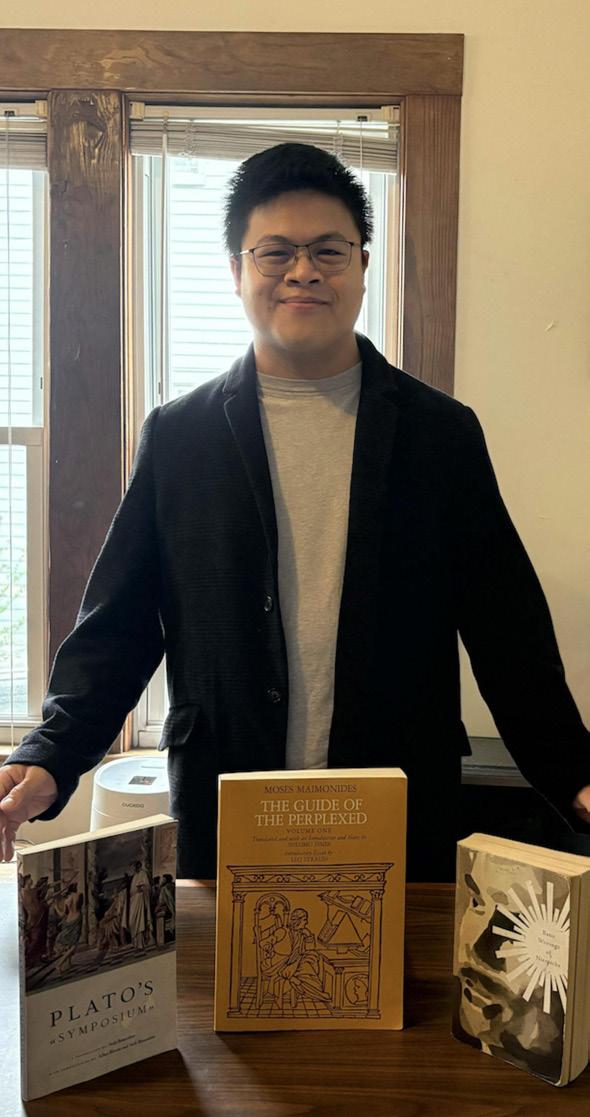
when one is not blind to self-understanding. I hope students at Tufts will take advantage of the
Rowan Chetner Staff Writer
As I prepare to graduate from Tufts, I find myself reflecting on what I’ve learned over the last four years. I’ve learned an incredible amount academically, grown emotionally and matured as an adult. Still, the piece of knowledge that grabs my shoulders and shakes me, screaming, “I am the most important!” is my new, glimmering mindset. Over my time at Tufts, I have realized that our perceptions of “reality” are often fake. As such, why not commit to living authentically, despite what others may think of you?
Our views of the world are con count biases, ly little can dras tically alter our percep tions. In “Social Psychology” with Professor Sam Sommers, I learned about a study showing that the order of adjec tives given to participants to describe an individual impacts how they view that individual. If positive adjectives were placed first, participants had a much more flattering view of this hypothetical person than if negative adjectives were placed first, even though the adjectives were the exact same.

is a bit, so you might as well commit
This is known as the primacy effect, and cognitive biases like it constantly surround us like a swarm of mosquitoes –– you try to eliminate one, but there will always be more. Our biology plays a role in our perspective on life as well. In the book “Thinking, Fast and Slow” by Daniel Kahneman, I learned that humans are innately more attuned to the world’s negatives than its positives. we pick out a singular angry face from a group of smiley faces faster than vice versa. Our evolution programs us this way, as threats are often more urgent to our survival than pleasures. No wonder we often unintentionally focus on the downsides of our environments rather than the upsides. Understanding this phenomenon, when I am going about my day and feel like everything is going awry, helps me remember my mind is probably playing tricks on me. I take a breath and remind myself that my perception of this “terrible day” probably isn’t reali -

I see as false, I have also come to appreciate that the way others may perceive me is likely also somewhat artificial. Others may perceive me based on minute factors, such as the narrative they con struct from a quick first impression, how they were feeling just before interacting with me or via accounts from their friends, riddled with adjectives in random, but nonetheless impactful, orders.

If perception is so unstable, why not just commit to being yourself? If everything we see and experience is interpreted through distorted lenses, why not live life with whimsical authenticity? If objective life is a figment, or a bit, why not commit to it?
when I say that “life is a bit,” I’m borrowing language from comedy. A “bit” is a performance or running joke someone com mits to, even if it’s ridicu lous. I believe life

are probably inaccurate. while coming to accept that the world
Since our lives are so skewed by perception, we might as well lean into our roles and perform with intention and authenticity.
The realization that the way I see the world is more or less an illusion — and, likewise, the way the world sees me is also more or less an illusion — has empowered me to live my life to the fullest. Although this ethos has been cultivated throughout my time at Tufts, it has flourished during my senior year, as I learned to truly lean into myself.
w hen my friend and I danced with big, waving arms and loud, scratchy voices at a basement party, we received some not-so-admiring sideeyes. But my friend and I were having fun, and the unenthu siastic spectators had zero clue who my friend and I truly are, so why should I care? Earlier this semester, I wrote an article about how much I appreciate JoJo Siwa. Some may think the article is cringey, and maybe it is, but does it really matter? If

“reality” is so far from the truth that oftentimes it could be considered a joke.
Olivia Zambrano Opinion Editor
More than 47,000 species are currently threatened with extinction. Just last year, the International Union for Conservation of Nature Red List reported five newly extinct species and five others moved to the critically endangered list. Scientists from Dallas-based biotech company Colossal Laboratories & Biosciences are working to revive extinct animals in order to “jumpstart nature’s accestral heartbeat.” However, its choices in animals are questionable: Tasmanian tigers, mammoths, dire wolves and dodo birds. Colossal Laboratories & Biosciences’ mission, although a marvel of modern technology, is a shoddy attempt to restore balance to mother nature without addressing humanity’s failure to protect animals that went extinct in the last decade.
The company refers to its work as “functional de-extinction,” a process that manipulates genomes to ensure that once-extinct animals will survive climate change, disease and human interference. It claims that “resurrecting” these species, will enrich biodiversity and replenish ecosystems.
Recently, its goals have come to fruition. Colossal Laboratories & Biosciences supposedly revived the dire wolf — a species of wolf that died out around 12,500 years ago.
As much as I would like to say that letting go of the “objectivity” of how I perceive the world and how the world perceives me has set me free from the all-powerful hands of “caring what other people think,” I admit I oftentimes still feel self-conscious and wary of how others view me. However, accepting the inherent subjectivity of the world has empowered me to act authentically, even if I have to fake comfort sometimes.

the perception of people I don’t even know carry any weight?
Scientists need to stop playing God
‘Supposedly’ is the key word. No matter how aggressively the media is trying to reframe this as the revival of an entire species, it’s undeniable that, scientifically, it’s not. To summarize an immensely complicated process, scientists extracted DNA from dire wolf fossils to create genomes — sets of genetic information. They then compared these genomes to living species, such as wolves and foxes, to find that dire and gray wolves share 99.5% of their DNA. Using CRISPR-Cas9, a gene editing technology, scientists spliced gray wolf genes and replaced them with those of a dire wolf.
Although comparable to the dire wolf and presenting phenotypically as such, the dire-gray wolf hybrids are technically “genetically modified gray wolves.” However, Colossal Labs & Biosciences is holding firm in its stance that it has, in fact, revived the species. In an abstract on its website, Jeffery Kluger, an editor at large at Time Magazine, writes: “The pups are wolves. Not only that, they’re dire wolves.”
Its schtick — to “fix” humanity’s extinction problem — is entirely misleading. Nothing is being “fixed.” Colossal Labs & Biosciences claims it’s the key to the survival of keystone species that keep entire ecosystems alive. The keystone species it highlights on its webpage are wolves, elephants, rhinos, whales and buffalo — animals its efforts aren’t concentrated in reviving. The animals it’s resurrecting
So text your crush first. wear that silly shirt you’ve been wanting to wear. Ask the person in your class who you think is cool to hang out. If you’re worried about how they might perceive their peris clouded and your ception of how they perceive you is too. I will take my commitment to authentic acceptance forward as I venture beyond Tufts as an undergraduate (and into the scary and disparate realm of graduate school at Tufts) with the knowledge that it will do me well. Reality is a sandstorm of cognitive biases — trillions of specks of sand prevent us from seeing clearly, no matter how hard we squint. So let’s just let go of the validity of “factual perception” and commit to the bit. w ho knows, it could be fun.
with the supposed goal of ecosystem replenishment died off anywhere from 89 years ago to roughly 10,000 years ago, and their former ecosystems have continued to survive without these animals.
Colossal Labs & Biosciences purports to be a company focused on enriching biodiversity by reviving species that keep ecosystems alive. Instead, it’s reviving an assortment of species that went extinct, for the most part, thousands of years ago. The company admits that it has no plans for
environmental release. It frames this as an ethical boundary to its practice but fails to recognize that this refutes its advertised mission. Colossal Laboratories & Biosciences bounces back and forth between claiming its goal is to “slow” humanity’s impact on biodiversity and advertising that it’s aiding existing species in adapting to their changing ecosystems. without actions that reflect these ambitions, the company’s only apparent motive is to “resurrect” extinct animals for the shock value.
Colossal Laboratories & Biosciences uses its funding and popularity to deliberately “resurrect” the most commonly talked about extinct animals. Under the guise of enriching biodiversity and ecosystems, the company toes the line between spectacular and unethical. Mother Nature ran her course, and scientists should leave the past in the past in favor of protecting existing animals rather than playing God.

Michaela Loughran Staff Writer
Content warning: This article contains mentions of sexual misconduct.
People tend to believe that prison is one of the worst places one can end up in America. Little do they know, psychiatric hospitals are eerily similar to prisons. Like prisons, the food is unappetizing and flavorless, the mattresses are stiff as boards and not at all conducive to sleep and the showers have minimal privacy and tiny towels that come nowhere close to covering one’s full body. Both healthcare professionals and patients characterize the inpatient hospital environment as carceral in a way that, according to the AMA Journal of Ethics, is “not conducive to well-being or recovery.” Yet the websites for inpatient programs still tout “exceptional care” with false promises that patients will get better.
The vast majority of mental hospital patients are not hospitalized for violent behavior, yet they are often subject to similar conditions as violent criminals. This includes severe restrictions of access to the outdoors during hospitalization despite the growing scientific evidence of links between spending time in nature and improvements in mental well-being. The restriction of access to nature often coexists with the lack of exercise, another key ingredient to mental well-being. The similarity between conditions in prisons and mental hospitals is not lost on patients and can lead to the mistaken
perception that they deserve imprisonment. These beliefs can produce feelings of guilt and isolation, as though the patient did something wrong in struggling with an illness they did not choose to have. Overall, this experience of perceived imprisonment only worsens mental health and well-being and interferes with recovery.
In addition to having a miserable atmosphere, these hospitals also tend to not be very safe, particularly for female patients. w ith patients outnumbering supervisors, it is impossible for all patients to be supervised at all times, and this allows for inappropriate sexual behavior to thrive in social spaces. This behavior can range from verbal sexual harassment to actual physical harassment, like unwanted touching. The general trend of underreporting sexual misconduct is applicable to these cases as well, potentially due to normalization among staff of patients’ sexually aggressive behavior. Sexual violence and physical violence are persistent threats throughout mental hospitalization, producing a constant feeling of dread and lack of safety among patients.
Yet another harmful aspect to how these hospitals are run is restricting the frequency of visits for patients. In some hospitals, patients are only allowed two visitors a week, which further contributes to the sense of isolation described earlier. In combination with the lack of access to the outdoors, this may produce a distressing feeling of detachment from the outside
world, which does not support recovery. Given the fact that social support and connection are huge predictors of mental health recovery, these hospitals should not be restricting visits by loved ones, especially when vulnerable admits may struggle to socialize. For this reason, phone calls are insufficient. They need in-person contact with any existing support they may have. Having someone on the outside rooting for a patient can be an essential driving force behind their recovery. Overall, the average mental hospital in this country has lackluster, prison-like conditions that are not at all conducive to the recovery of patients. These conditions are one of many manifestations of the marginalization and discrimination faced by people with mental illness in this country. Patients need to be given more outlets to discuss issues with their experiences, particularly uncomfortable interactions with other patients. People struggling with mental illness to the point that it requires hospitalization deserve more compassion from the staff with whom they interact. At a minimum, they deserve comfortable conditions for basic needs like eating, sleeping and showering. Some people with mental illness in inpatient care have taken a bold leap to try to get better, and the institutions that provide care need to live up to their purported missions. Otherwise, people who already struggle with feeling unsupported and isolated become indefinitely trapped in that reality.

Evan
and Sadie Roraback-Meagher
The Conversation Tufts has
Sadie Roraback-Meagher: Heya Evan!
Evan Wang: Hey, Sadie. How’s your semester winding down?
Sadie: “winding” doesn’t seem very fitting. A better question would be: How is it crashing down in flames?
Evan: wow, I sure am going to miss your pessimism this summer. what will I do without you?
Sadie: well, you can always look at the news to cheer you up!
Evan: Sigh.
Sadie: You know, despite all the doom and gloom in the world, Tufts has been giving me hope. Compared to its peer institutions, Tufts has shown exceptional resilience in light of what has happened on our campus. From University President Sunil Kumar co-signing a letter pushing back against the Trump administration’s attacks on universities to filing a school-backed declaration in support of Rümeysa Öztürk, Tufts has been taking a stand against the current threats facing higher education.
Evan: It’s not all sunshine and rainbows, though. while Tufts has certainly made moves supporting international students and combating President Donald Trump, it is still lacking when it comes to engagement with the general community. Just look at the carpenter protests or the full-time lecturers’ walkout. Tufts hasn’t done much to address these demonstrations, all while carrying on like it’s a normal Tuesday.
Sadie: well, well, look who’s the pessimistic one now! But I see your point. Tufts is not free of flaws, even though it has been doing a good job presently. As seen in the case of Columbia, whose administration floundered in the face of Trump, things could always be worse.
Evan: Is that optimism I’m hearing?
Sadie: I’m just trying to brighten the day for the grads.
Evan: In that case, let me be the negative one instead.
I question if institutions should be political juggernauts. How much should universities be wading into the political deep end — shouldn’t that be the job of individuals and communities?
Sadie: I agree with you a bit, but your point actually has me thinking about something else: How will this graduating class go forward in the wake of political threats?
Personally, I’ve been quite moved by the number of op-eds from Tufts alumni that the Daily has received in the wake of Öztürk’s detainment. I hope this graduating class will continue to be engaged with the Tufts community.
Evan: I agree. Seeing all those community members join in the conversation was encouraging, but I wonder if it will truly change the university’s politics. I’m inclined to believe donors are the ones who have the biggest sway.
Sadie: well, I can’t say that money doesn’t talk, but I think you are underestimating how important a vocal alumni network can be.
Evan: Sure, I can see what you’re saying. But for this alumni network to be impactful, more people need to join in. whether that means signing a petition or submitting op-eds to the Daily, I hope that this graduating class will make an effort to join in the conversation and show what change really looks like.
Sadie: Agree! It will certainly be an uphill battle going forward.
Evan Wang is a rising junior majoring in history. Evan can be reached at ewang14@ tufts.edu. Sadie Roraback-Meagher is a rising junior majoring in political science. Sadie can be reached at sadie.roraback_ meagher@tufts.edu.
Over the past few months, I, like so many others, have been thinking a lot about what it means to be getting a liberal arts education. At a time when the world is changing with the advent of new technologies, changing markets and constant commentary from family friends that artificial intelligence will leave us unemployed, “why liberal arts?” is a question that has become even more important.
At Tufts, we’re always talking about the unique classes that a liberal arts college offers. I’ve taken classes that span from a look at how the law controls our society to a seminar about different types of building materials, with obligatory social psychology classes in between.
Tufts bridges gaps by bringing together parts of academia that don’t conventionally intersect. The different schools of the university include Arts and Sciences, Engineering and the Museum of Fine Arts — with more graduate schools covering law and diplomacy, health sciences and civic life. Since we have direct access to so many different disciplines, it’s no wonder that Tufts students often double or triple major.
At this moment, there’s a clear need for a defense of academic
institutions. we are watching a massive, coordinated attack unfold on education by a federal government and political party that looks to destroy academia as we know it. The American Association of Colleges and Universities published “A Call for Constructive Engagement” in late April with signatures from over 600 college and university leaders — including Tufts President Sunil Kumar. Tufts has already made clear that it will stand up against the persecution of its students, like in the case of graduate student Rümeysa Öztürk, and respond to efforts to stifle research through indirect cost caps by suing the National Institutes of Health and filing a declaration in a lawsuit opposing the Department of Energy. Tufts must rise to the challenge and be a leader in this movement by upholding its core values of civic engagement and defend its — and every academic institution’s — role in our society.
In parallel, it’s becoming more important than ever to think about what Tufts’ response to the changing world should be. It’s becoming more important than ever to respond to the changing needs of a space based on thought and action while the value of a college education is being questioned.
Tufts should bring together the undergraduate experience by consolidating all undergraduate
schools under a coordinated brand called “The College,” encompassing every undergraduate student no matter their degree. Currently, all undergraduate students are officially referred to as “Arts and Sciences, Engineering, SMFA at Tufts.” Instead, referring to undergraduate students as students of “The College” is simpler and allows for further specification of Arts and Sciences, Engineering or the SMFA where needed. Using “The College” could create a more cohesive identity than “AS&E students (including SMFA at Tufts)” in conversation.
“The College” would acknowledge the interdisciplinary nature of a Tufts education and stop students from being divided into different schools, functioning similar to nearby Harvard University with its Harvard College. The college experience at Tufts is intertwined between the various schools and programs, and reviving an old term could represent our common undergraduate experience to the outside world.
One major (or minor?) problem is majors and minors themselves. without a doubt, double majoring and adding multiple minors is an alluring idea.
If many are majoring in multiple areas and exploring fields beyond that, does our system of majors and minors effectively recognize the work of students? Tufts
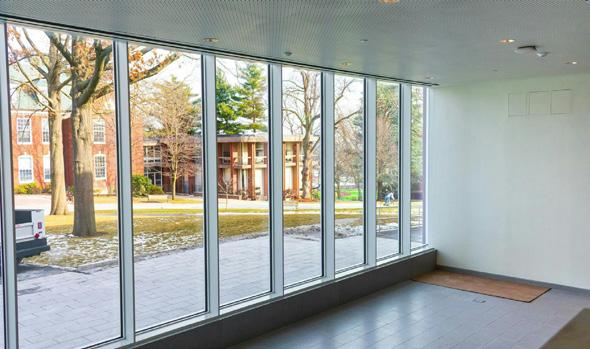
students are earning the benefits of exploring many fields through the foundation, distribution and major requirements, but it would be naive to think that there isn’t importance in recognizing the individual pathways that students are undertaking for all of the opportunities that come after Tufts. You get to be specialized in many different disciplines, but isn’t there a better way to convey what we’ve covered?
Tufts should redefine how our coursework is represented. Degrees are conveyed as a Bachelor of Arts, Science or Fine Arts, but we should add more information to the major students choose. Someone could be majoring in psychology, but we could add a descriptive title like “with environment and political action.”
we should r epresent the individuality in everyone’s coursework like an interdisciplinary studies title would. Being interdisciplinary should be a core part of the Tufts identity as seen by the world. By virtue of being a student here, everyone should have a minor in interdisciplinary studies.
All of this is to say that Tufts should embrace interdisciplinarity. It might be time for new terms to change the paradigm of how Tufts presents itself and its students. w hy is Tufts’ greatest strength a secret only for those who dare to seek it out? There’s no one path forward, but I hope there are steps we can take from here.
Congratulations, Class of 2025! Welcome to the Tufts University Alumni Association!
Elizabeth Amador
Dear Class of 2025,
As you walk across the stage and receive your diploma, remember that this is your Commencement — a beginning. It is the start of your life as a Tufts graduate! when you graduate, you automatically become a member of the Tufts University Alumni Association, an over 130,000 person network of Jumbo alumni that I am proud to lead as president.
Alumni are involved in a wide range of Tufts activities including: interviewing prospective students, organizing events to bring together alumni, helping students and peers navigate their career paths, participating in extracurricular alumni events (such as those for alumni of the Tufts Community Union Senate, the Daily, Tufts’ various a capella groups, sports teams and so on) and taking leadership positions in any of the alumni programs, from which they can support the alumni association and the university.
So, after you have taken some time to celebrate graduation and as you settle into the next stage of your life, here are some ways you should consider engaging with the Tufts community:
Help recruit the next generation of Jumbos. The Tufts Alumni Network is an easy way to stay connected. Over 30,000 students apply to Tufts each year, and an alumni interview helps Tufts see a candidate in a more personal way. It can also help the applicant understand why Tufts is the right place for them. Young alumni are wonderful interviewers as they are up to date with all things Tufts.
“Every year I meet talented young people applying to Tufts,” David Meyers (LA’96) wrote in an email. “we talk about how their experiences may have prepared them for Tufts, and how Tufts can help them pursue their dreams. It’s an incredibly rewarding way to stay connected to Tufts and connect with future Jumbos.”
Use the Tufts Career Network and Alumni Career Service. Summer is the perfect time to connect with your Jumbo career network. The Herd brings together alumni and students for career conversations, networking, mentoring, job shadowing and other professional development activities. Meet and network with fellow alumni working in your current or desired field. You can also connect with a variety of professional networks and identity-based communities.
The association offers up to $1,500 for a wide range of career-enhancing activities such as conferences, professional memberships, licensures, certifications, graduate school application fees, artist residencies, film screenings and independent projects. You propose it, and the Alumni Association might just fund it! There are special grants given to young alumni (those within 10 years of graduation). The application for 2026 opens in December.
“The Tufts Alumni Professional Development Fund gave me a ‘boost’ when I was ready to take the next step in my career a few years back. The fund is an important way that Tufts continues to support alumni after graduation,” Caitlin Quinn (LA’11) wrote. “Now, as an application reader for the Professional Development
Fund, I enjoy learning about the varied interests among Tufts graduates and how they are innovating in the world and chasing their passions!”
All alumni have access to free, lifelong career services including career advising, webinars, networking events, career fairs, job listings and more. And make sure you join the Tufts career networking group on LinkedIn.
Network, have fun and meet Jumbos of all ages, professions and schools. As a new graduate you are now a member of BOLD — ‘Bos of the Last Decade. BOLD is committed to connecting alumni who have graduated in the last 10 years through social events, volunteering and philanthropy.
For Jumbos of any age, we have numerous regional chapters across the United States and around the world. They organize a variety of social events for alumni in their area. These chapters are a great way to meet fellow alumni of all ages and careers, to network, learn and have fun.
“I have been a leader of the London Alumni Network for 20 years,” Vikki Garth (LA’81) wrote. “we have had lectures, panel discussions, cultural dinners, happy hours, networking, art, sports and theater events. They are fun, interesting and you network with alumni from all schools, professions and graduation years. It’s a great way to get to know your Tufts community!”
Shared-interest groups are another great way to connect with Jumbos. These chapters bring together alumni with shared professional interests and other affinities. Examples include the Tufts Lawyers
Association, Tufts women’s Network, Tufts Black Alumni Association and Pride on the Hill.
“Being involved with [Tufts women’s Network] NYC positively impacted my career and personal life in ways I never could have imagined when I graduated. Meeting alumnae from a wide range of classes and industries made networking enjoyable, interesting, and educational,” Maria Maccarone (LA’90) wrote. “Never underestimate the power of the Jumbo connection at any point in your career!”
I’m already excited for your opportunity to reconnect with classmates for reunions in 2026, 2030, 2035 and every five years after. These weekends are a wonderful opportunity to reunite with classmates, relive Tufts memories, rediscover the campus, reignite your passion for learning and reengage with one another. If you would like to volunteer to help plan your reunion, contact Alice Shah in the Office of Alumni Engagement.
“Joining a reunion committee is one of the easiest and most rewarding ways to start volunteering! You get to work alongside your class committee and the Tufts Office of Alumni Engagement to contact and bring back fellow classmates, bring back classmates to campus, plan fun reunion parties and activities, and drive class fundraising challenges,” Jen Faucon (LA’90) wrote.
Many sports teams, the TCU Senate, singing groups and other student organizations have alumni groups. They are a great way to continue engaging with the activities you enjoyed at Tufts. To learn more about these opportunities,
contact Miriam McLean in the Office of Alumni Engagement.
“Staying involved with Tufts through the Friends of Tufts Swimming & Diving has been one of the most rewarding parts of being an alum,” Chris Valente (LA’05) wrote. It’s a way to give back to the program that shaped my experience at Tufts, and to help current and future Jumbos have the same opportunities. whether it’s through events, mentoring, or supporting student-athletes, there are so many ways to stay involved.”
Be an alumni leader. It’s never too early to step up and help shape alumni engagement. You could take a leadership role in any of the alumni chapters I’ve already mentioned or even run for the Tufts Alumni Council, the governing body of the association, where you can serve on committees supporting activities of alumni around the world in partnership with the Office of Alumni Engagement.
As president of the Tufts University Alumni Association, I get to meet and connect with alumni across the world. I am energized by the passion and ideas I hear and the commitment I see from alumni every day. I believe that our success as a community hinges on how connected we are. Alumni engagement is not just beneficial — it is essential. It leads to student and alumni success.
Your fellow alumni are talented, engaged, interesting, fun and always happy to help — so don’t leave Tufts behind, stay involved!
Sincerely, Elizabeth Amador, president of the Tufts University Alumni Association
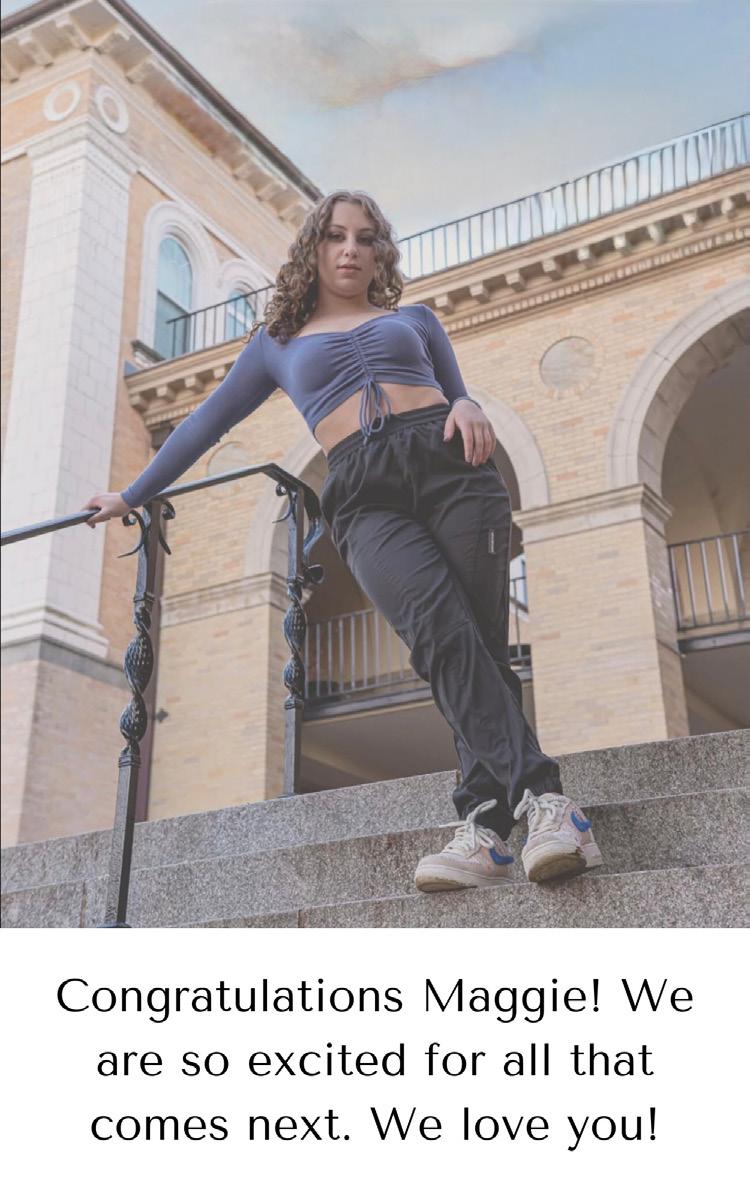

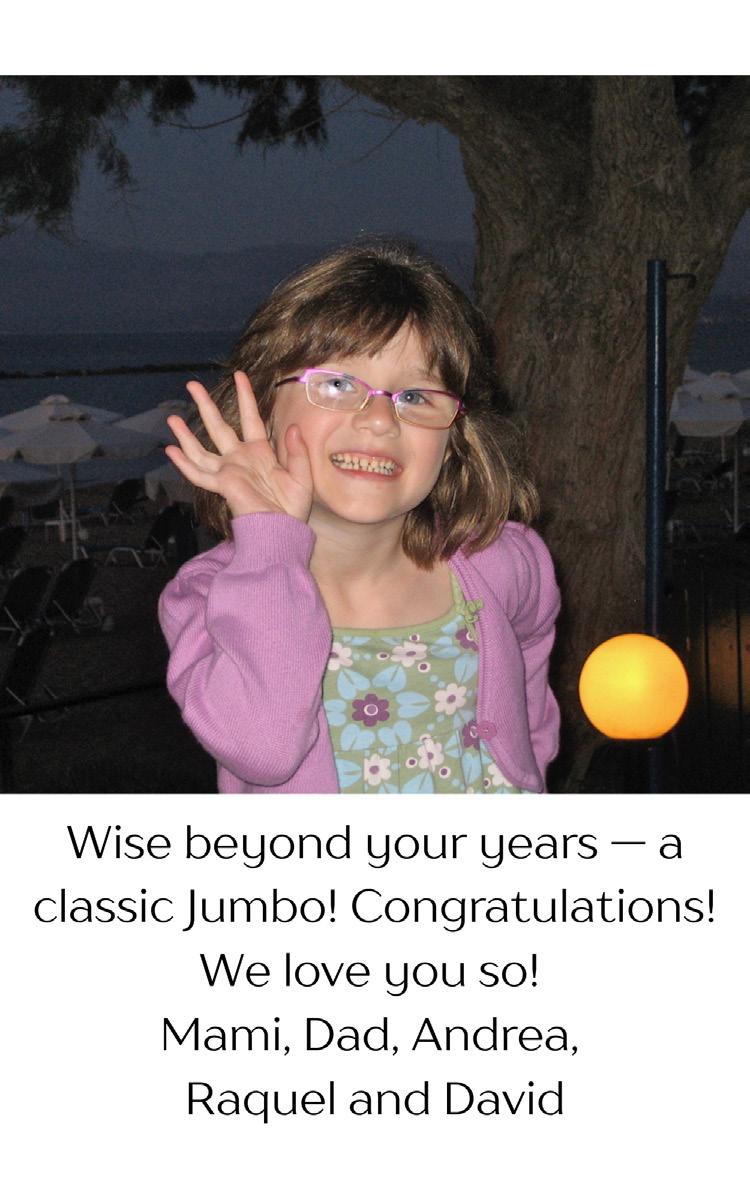
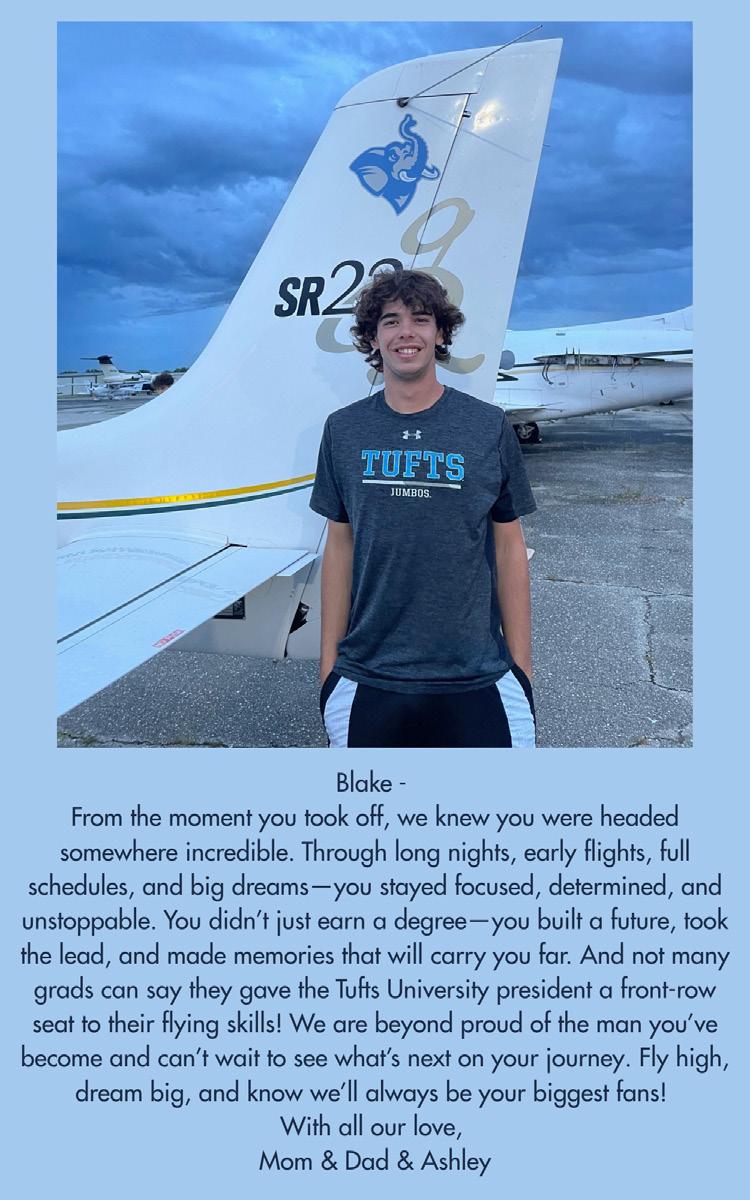
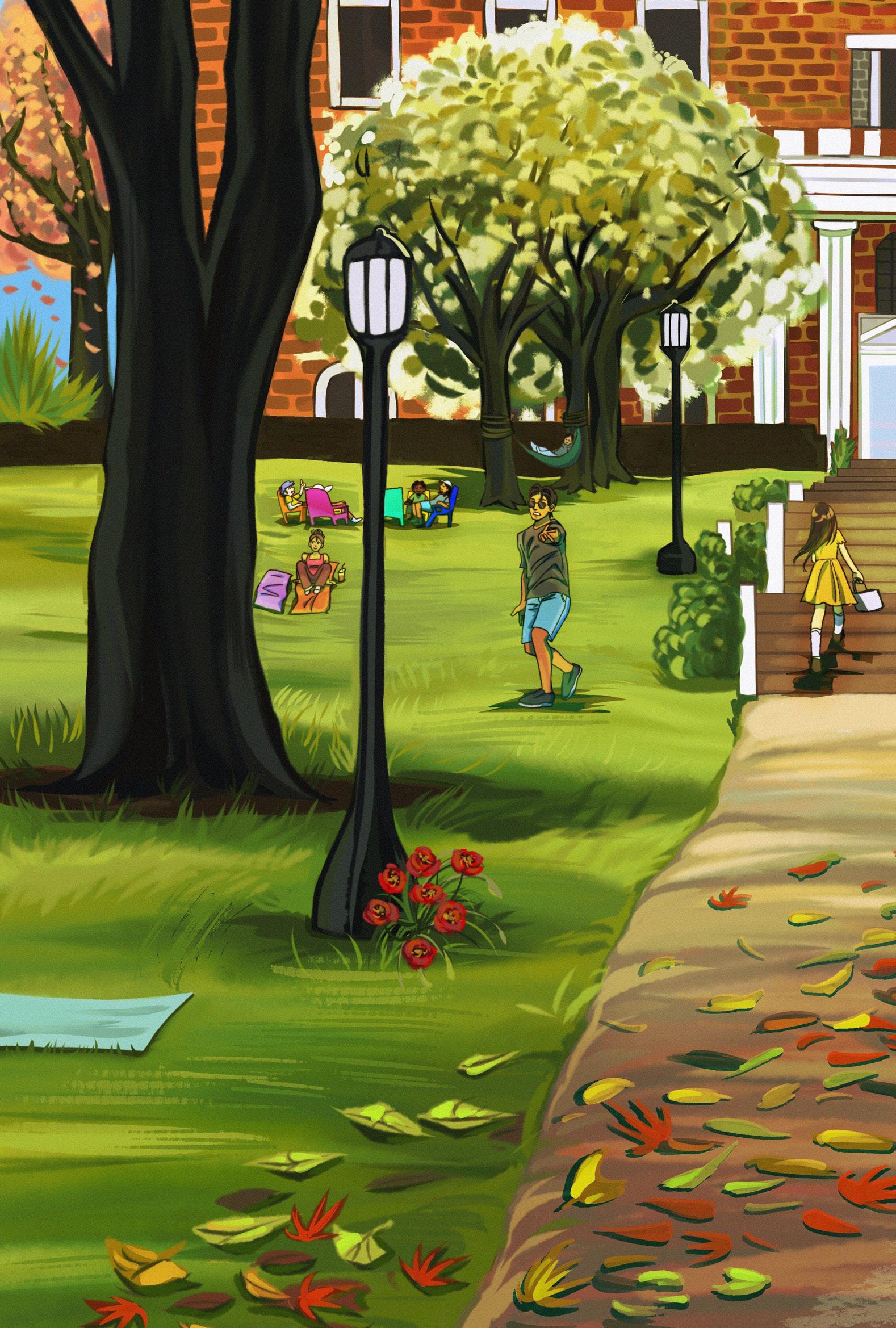
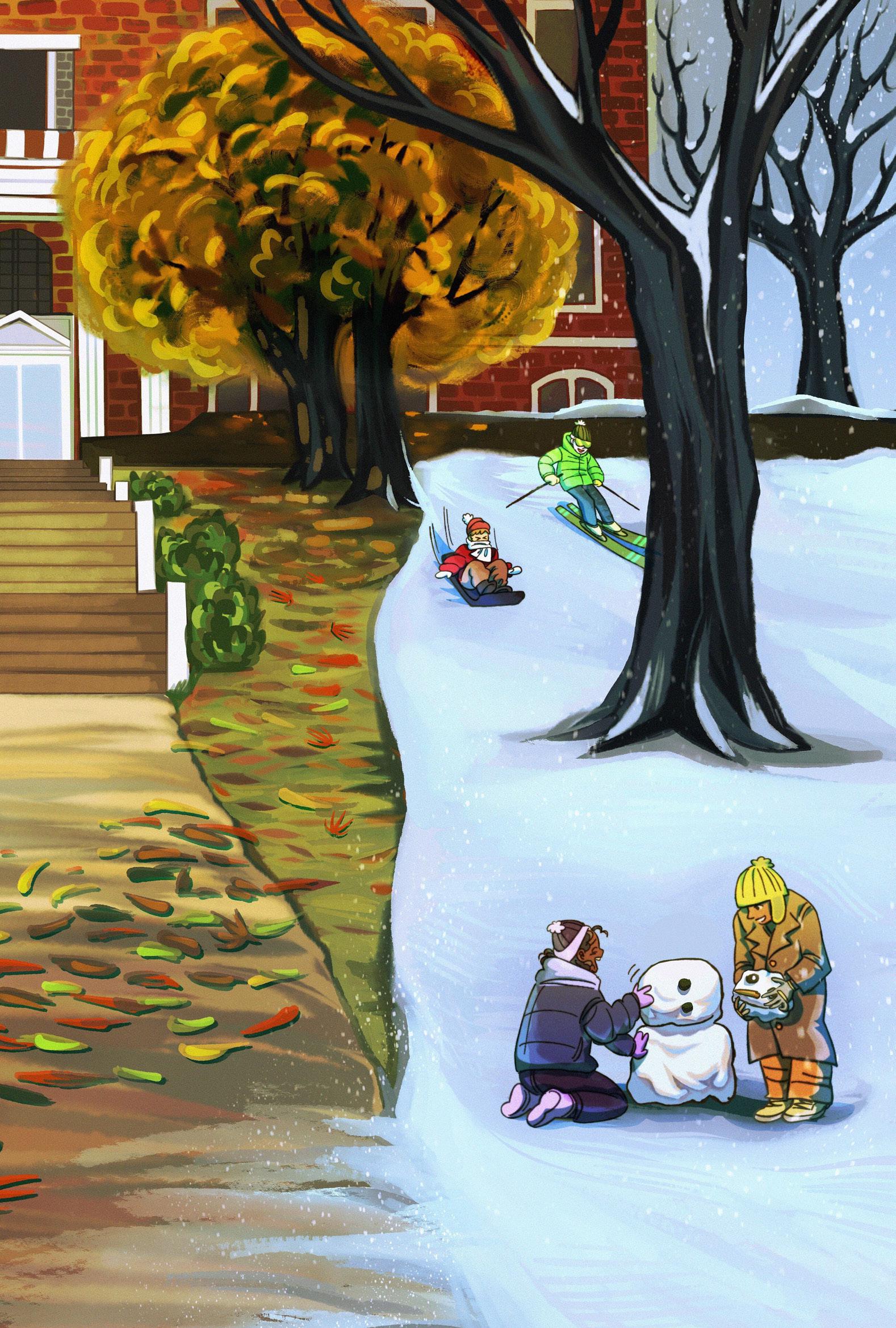
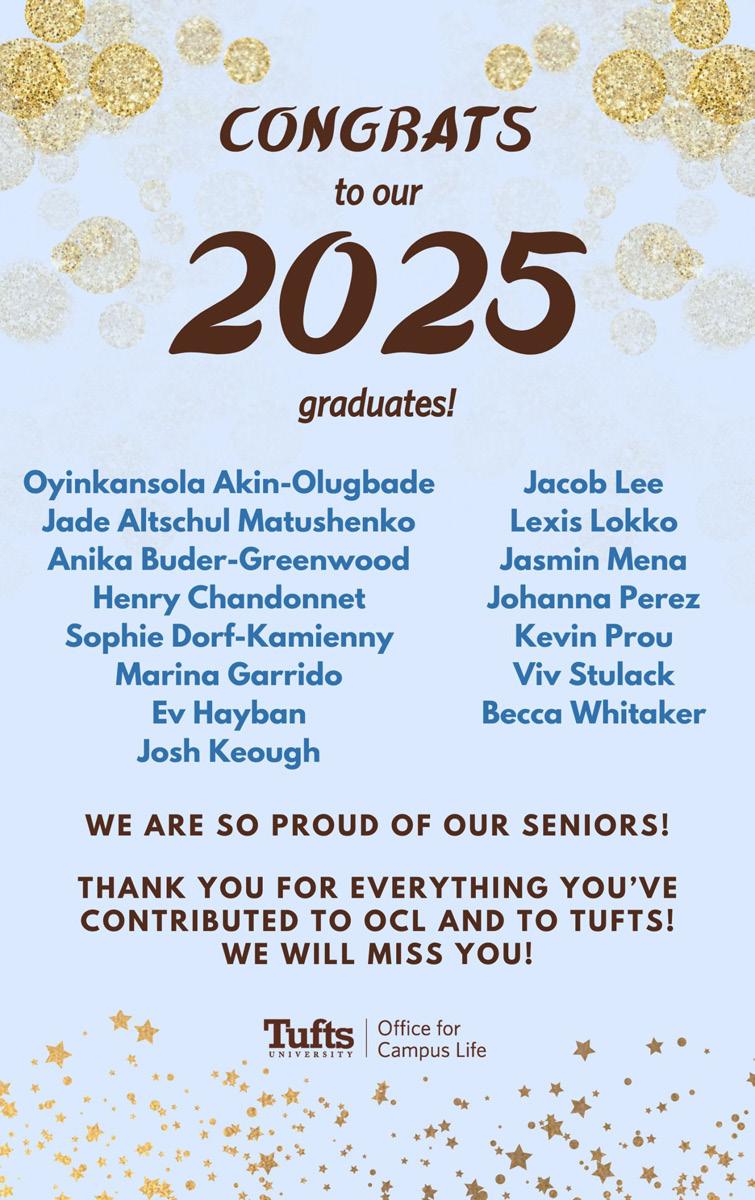
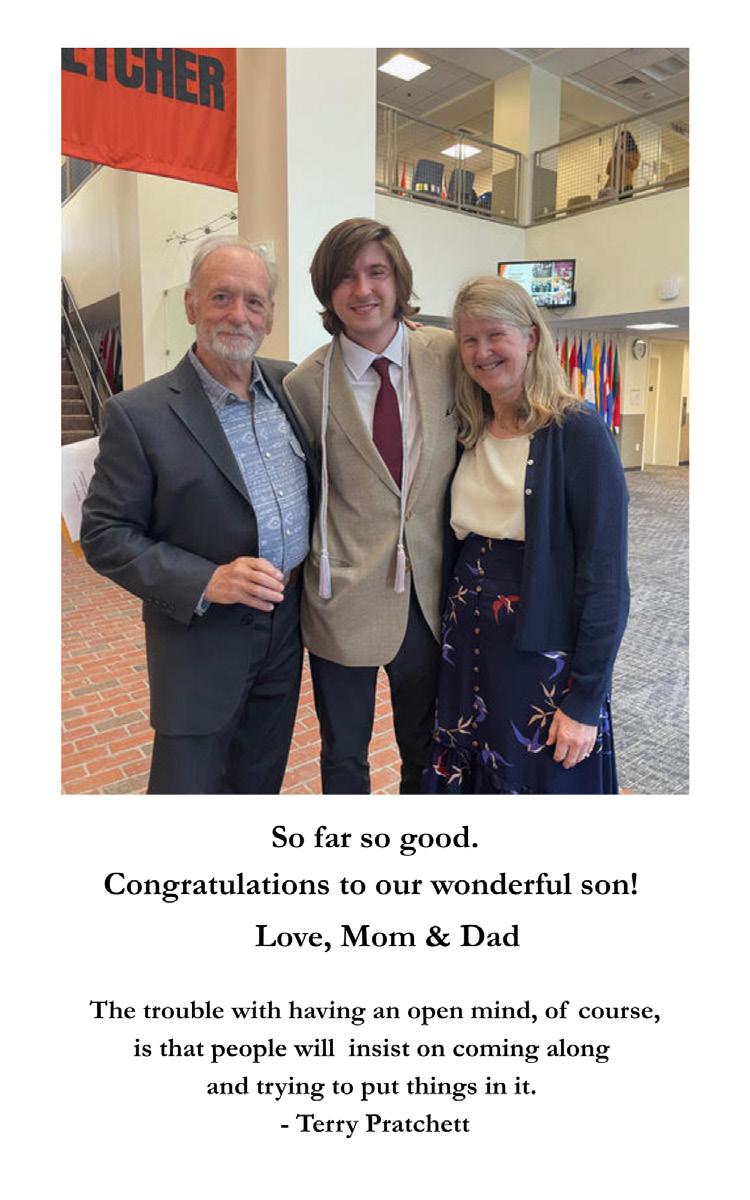

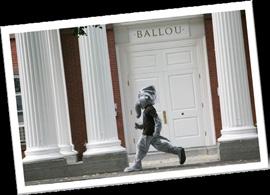
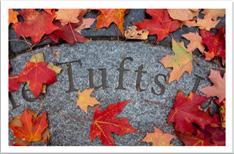

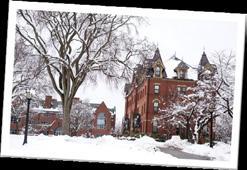

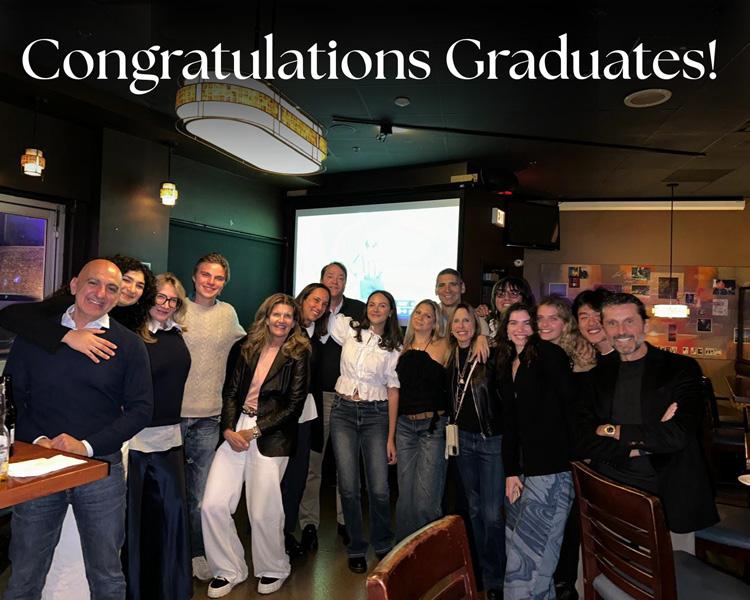
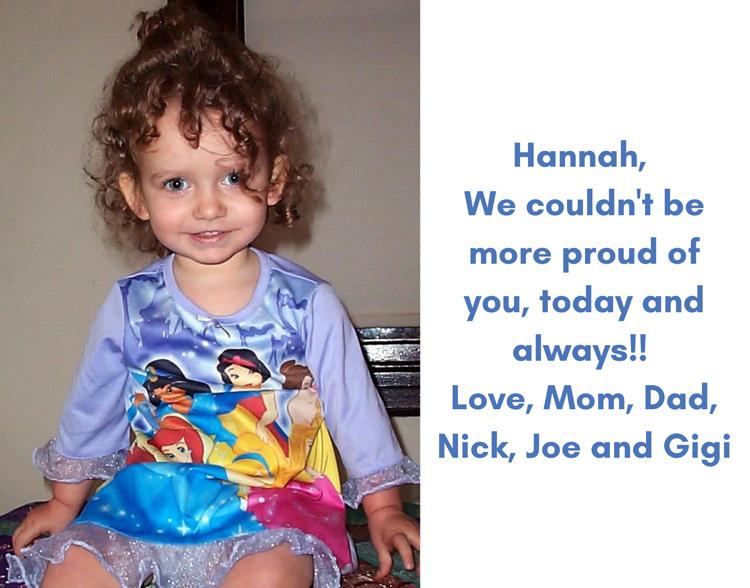
The Editorial Board
Tufts students spend upward of 200 days each year at school. while it often feels like so much is going wrong in our world, both near and far, we want to make your time here more enjoyable by drawing attention to some of our favorite parts about life on the Hill.
Our outdoor campus is interspersed with grassy patches and lovely seating like the stools behind Bendetson Hall or the terraces next to Paige Hall and Miner Hall.
In the winter months, for those who venture out into the snow to sled, ski or slide on President’s Lawn, they’re buffered from dangerous collisions by haystacks that are placed by trees or poles — thanks to the staff who so graciously anticipate students’ behavior and want us to be safe while we have fun.
Each spring, after battling the cold and the horrors of midterms, the Medford/ Somerville campus blooms with tulips, daffodils and lilacs. As the days get longer and we finally leave the basement of the Tisch Library, the colors that sprout all over campus are a beautiful sight that almost makes us forget how long the winter has been. Remember to take a moment to thank the
Tufts Facilities team for all the preparation and upkeep they do to make our campus so stunning.
The area surrounding Tufts is beautiful as well, and we want to remind readers to take advantage of its walkability. Depending on which side of campus you live on, you probably have easy access to communities like Davis Square, Medford Square or Ball Square. Our regular shuttle can help shorten the distance too. For some fresh air, the closeby Alewife Greenway Bike Path and Somerville Community Path offer some more natural solace. And maybe take a dip in the Mystic River, just a long walk or short bike ride away. w hen all that walking tires you out, stop by fan-favorite Kindlevan Café for a smoothie. The smoothies are consistently good, take no time at all to pick up and are served with so much care from the everkind and patient workers — a perfect pick-me-up for your midday slump. It’s no wonder they sell out every day.
Most of all, we are so appreciative of how friendly the Tufts community is. It’s amazing to see our peers show up to support their friends at all sorts of events, from dance performances that draw lines outside Cohen Auditorium to
off-campus gallery openings where a friendly face can make all the difference. It’s incredible to have a community at Tufts where our friends are there for us and take an interest in the extracurriculars we dedicate our time to.
Students here are driven, but not overly competitive. we support each other in our classes. we even teach each other about our niche
— and oftentimes unconventional — interests through the Experimental College. we make clubs and activities open to anyone, regardless of who they are or their experience. From a myriad of bands to club field hockey, whatever you’re interested in is open for you to join. Love permeates the Tufts community — you can sense it as students, staff and faculty warmly greet each
other on campus, or as someone quickly serves you food at a campus event. To everyone graduating, a huge congratulations, and to those with a couple more years left, we hope that Commencement will serve as a reminder that your journey at Tufts may fly by quickly, so remember to savor the journey and take a moment to smell the roses.
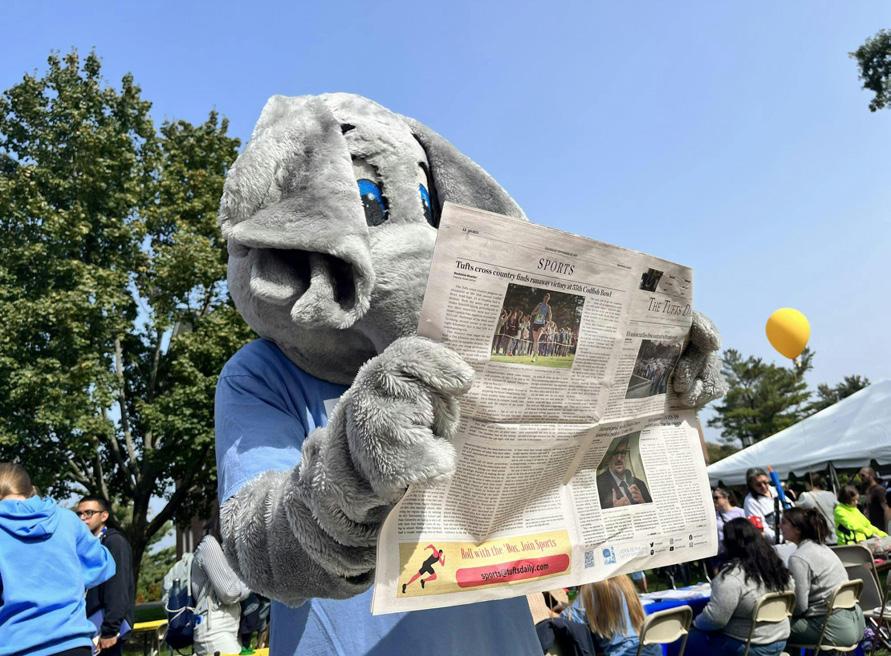
Summer is upon us! As yet another school year comes to a close, the Editorial Board has brainstormed some changes that we hope can improve students’ experience at Tufts.
This year, students at the School of the Museum of Fine Arts became the first in the Boston area to receive unlimited CharlieCard access through the University Pass Program through the MBTA. Tufts should work to expand this program to every Tufts student. with the recent extension of the Green Line to the Medford/Tufts station,
the close proximity of the Davis station on the Red Line and a number of buses that run through campus, Tufts students should be encouraged to take advantage of the T and explore the greater Boston area.
To make this even more seamless, we think every Tufts student ID card should have an embedded CharlieCard chip like our neighbors at MIT and Harvard do.
Laundry should be made free for students in on-campus housing.
Students pay upward of $10,128 for accommodation, yet they still have to pay out of pocket for their laundry. while this may be a measure to save on water and energy, perhaps
we should be trusting and educating our students to make sustainable choices.
we want more chairs and spaces to sit. There should be a webpage dedicated to spaces you could study or hang out across campus, in addition to the existing pages for academic spaces. As we mentioned in our editorial about Tufts’ roses, we love the hidden spaces across campus but think that more of them should be available to the Tufts community and they should be easier to find.
Tufts should offer more on-campus jobs to reduce the competitiveness of the jobs
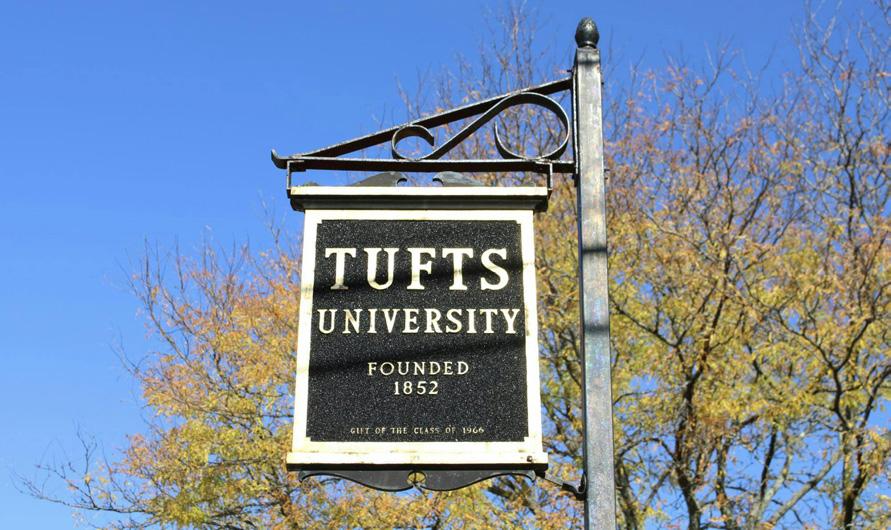
currently open to students on federal work-study or to any student simply looking for a job. Tufts should also work to bring more local businesses onto campus or encourage nearby businesses to hire Tufts students.
we think the Career Center could be a better resource and more successful in meeting the needs of students by increasing the range of industries that it offers support for. Bringing in more employers from industries less represented in the Boston area could make it easier for students to access more opportunities, potentially also involving faculty and alumni that have networks with industry in the area.
The Student Organizations Fair in the fall is an incredible event that brings together so many student organizations and students looking for on-campus activities. So, we think hosting another fair at the start of the spring semester would be beneficial in getting students involved in more activities and facilitating a second cycle of general interest meetings across campus.
we would love for Tufts to adopt a longer shopping period for courses. Though our timeline for dropping courses is generous, the add period is merely a week, meaning students only get to go to class once or twice before the deadline. This makes it difficult to get a good sense of a class, see if it fits expectations and find another one if necessary. Extending the add deadline by even
a few more days would enable us to better fine-tune our schedules.
Tufts should continue to work to expand the courses offered to students, increasing the disciplines represented, and to grow increasingly popular programs. The university should encourage students to take advantage of the Boston Area Consortium — including Boston University, Boston College and Brandeis University — by having departments share information about their consortia counterparts and putting the information in front of students more.
Every time a student organization or the Committee on Student Life brings an ice cream or food truck to campus, there are lines as far as the eye can see. Building on this enthusiasm, Tufts should work to bring more food trucks to campus from adjacent neighborhoods so that students can purchase food from local businesses, the same way Harvard University does for its Science Center Plaza. This could be made possible by working with the cities of Medford and Somerville, local business associations and local vendors.
Each of these changes on its own may not make or break anyone’s time at Tufts, but every step towards improving student’s quality of life improves our campus culture. The Editorial Board hopes to inspire conversation about the ways that the little things make a difference to every student’s experience.






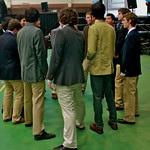
ACROSS
1 Ran out of juice
5 Rapper Lil ___ X
8 Fleur-de-___
11 Rotten
14 Dove's sound
17 Foreign aid program shuttered by the Trump admin.
19 "Doctor Who" network
20 Sinus doc
21 Mythical creature with a horn
23 Graduation ceremony featuring speeches from Ayomide Oloyede and 63A
26 Doctor of Marvel films
27 "___ Waldo?"
28 Dada artist Jean
29 Playful, like a kitten
31 Ballpark figure
32 Take the penalty, perhaps
34 "This ___ test"
37 Campfire residue
40 Place for a massage
41 Final research project for many Tufts graduates
45 Frat letters
47 Attempt
49 What students do at Dewick and Carm
50 Place for a plug
51 Instruction on a cake found by Alice
53 Bro's sibling
55 Venue for ice hockey games
58 Gasoline rating number
59 Fleet of warships
61 Farm enclosure
63 President of Tufts since 2023
65 Where many firings take place
66 Broadway's ___-Manuel Miranda
68 Youngest-ever U.S. congresswoman
69 This year's graduates
77 Blood type letters
78 "Abbott Elementary" network
79 "Rolling in the Deep" singer
81 What Tufts grads wear as they receive their diplomas
88 "Wanna ___?"
90 North America's highest peak 92 How many soccer matches end
Organic compound
Actress Ruby or Sandra
Spanish farewell 98 Head for, on horseback 99 "___ soon?"
101 Rose of Guns N' Roses
103 Show appreciation at a poetry slam 104 Ceremony where Tufts students become graduates
108 Pot pie veggie
110 Naval rank: Abbr.
111 De Armas of "Knives Out"
112 China collections
114 Storybook monster
116 Lakeside rental
119 Former name of the Tsungming Tu Complex
120 Snook and Silverman
123 Always on the go?
126 Ceremony for incoming Tufts students
130 "To Kill a Mockingbird" setting
131 Slice of history
132 A ways away
133 "Feel me?"
134 In freshman year, yours was probably a twin XL
135 All Tufts students, until 1892
136 Hollywood VIP
137 Wrath
138 Poker player's giveaway DOWN 1 Do some voice-over for a foreign film
2 Caesar's "vidi" 3 Per person 4 Cuts into cubes 5 Curry and Tatum, for two 6 Aladdin's monkey
7 Throw away
8 2028 is the next one 9 QB's mistake 10 Tennis star Graf 11 More hectic 12 Picnic pests 13 Scottish dagger 14 Bamboozle
15 URL ending 16 Washington's bill
18 Pub pastime
22 Small island
24 Reacted joyfully
25 Wipe clean
30 Rock's ___ Speedwagon
33 Nay sayers
34 REL 16: Introduction to _____ (Tufts course)
35 Tuscan cathedral city
36 "Hereditary" director Ari
37 Field of study
38 "West Side Story" gang member
39 Source of a scandalous comment
42 Home Depot purchase
43 Finn on the Mississippi 44 Words to a backstabber
46 Itsy-bitsy 48 Chihuahua's cry
52 Poet ___ St. Vincent Millay
54 Attempted insult that backfires embarrassingly
56 Not black-and-white 57 Windsor or granny 60 Donkey
62 Minor criticism
64 Like some stares
67 "Straight Outta Compton" group
70 Sink in the middle
71 High-pitched woodwind
72 Kander's partner, on Broadway
73 Passing craze
74 "The ___ of You" (2024 rom-com)
75 Sells, as a machine
76 Jerry's friend on "Seinfeld"
80 Big name in online financial services
81 Approximately, to a historian
82 Negative particle
83 "Top Chef" host Lakshmi
84 "Up and ___!"
85 Evening, in ads
86 Cole of "Black-ish"
87 Students take them in lectures
89 Gossip
91 Xfinity and Verizon, for short
94 Symbol on the Texas flag
96 Photographer's concern
100 Transcription software named for an aquatic mammal
102 Paper size
105 X-ray follow-up, perhaps
106 Comics cry
107 Severely injured
109 Wide variety
113 "Stranger Things" genre
115 Really bother
116 The "one" in a one-two punch
117 Dutch cheese
118 Proctor's call
121 Camouflage
122 Flowerpot filler
123 Catch red-handed
124 Grand ___ Opry
125 Angry
127 Singer Grande, to fans
128 You might have one if you live off-campus
129 "TBH" alternative

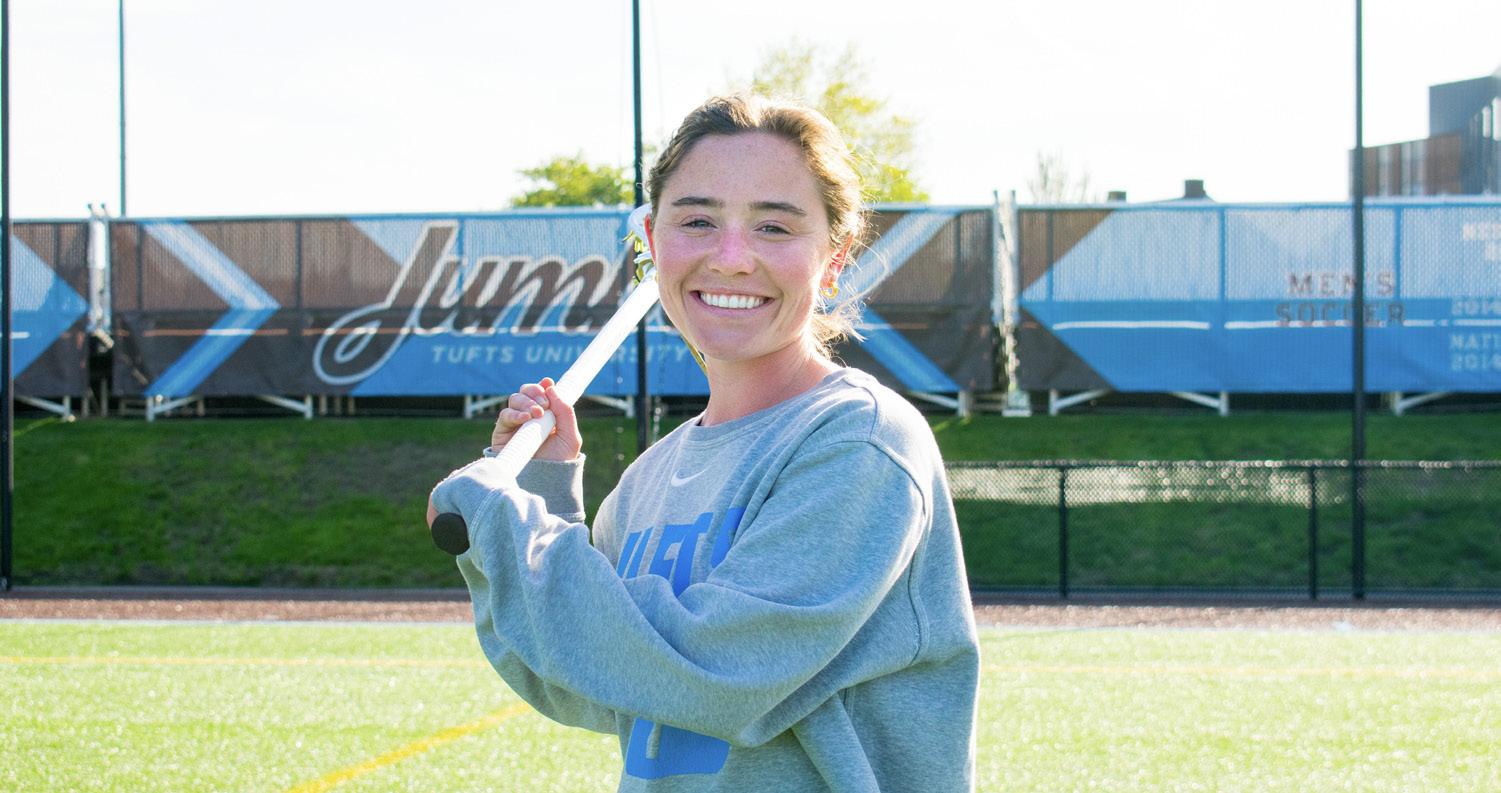
it would be broken,” Black said. “I have no attachment to the record, only to the strength of women’s lacrosse at Tufts.”
with a goal in the second quarter of a March 23 game against Christopher Newport University, graduating senior attacker Margie Carden became the all-time leading points scorer in Tufts women’s lacrosse history, breaking a record that had stood for almost 30 years.
Carden has been unstoppable throughout her college career, and her accomplishments are almost too many to list. She burst onto the scene as a first-year, scoring 69 goals to break the team single-season record of 62. Seven of those goals came in Tufts’ NCAA Final Four matchup against The College of New Jersey, as her outstanding performance sent Tufts to the title game.
As a sophomore, she tied her own single-season goals record, and in her junior season, she added 59 more goals, breaking the school record of 192 in the process. She holds three of the four top goal-scoring seasons in Tufts history and has received All-NESCAC honors in each of her first three seasons, making the second team in 2022 and the first team in 2023 and 2024. After completely rewriting the program’s record books, she’ll leave Tufts as one of the most decorated athletes the school has ever seen.
However, she never could have imagined all of the success she’d have with the Jumbos before her first season. when asked if she imagined breaking any records before coming to Tufts, she said, “Definitely no. I thought that I would have some sort of role in getting our team to some of these championship games. I didn’t know what it would be.”
Rebecca Black (LA’96), whose alltime leading points record of 271 points Carden broke, was happy to see her mark fall. “I always hoped
Black remembers Tufts women’s lacrosse being competitive during her career, and she was a part of an ECAC-winning team — the 1995 equivalent of the NESCAC. However, Tufts couldn’t compete at the NCAA level then, so for her, it is exciting to watch the success the team is having now. She continues to follow the program: “I just have a real love for the game, and I have delighted in watching Tufts women’s lacrosse, year after year, crush it,” she said.
Just as Black hoped, Tufts women’s lacrosse has become one of the strongest NCAA Division III programs, and Carden’s success in lacrosse at Tufts is a reflection of that competitiveness. Tufts has appeared in four of the last five NESCAC championship games, winning the title in 2021 and 2022, the latter of which was Carden’s first year. Not only that, but they’ve also experienced success in the NCAA tournament, reaching the championship in Carden’s first year and the quarterfinals in each of the last two years. Carden mentioned her desire to win a championship as a major factor in her decision to play for the Jumbos.
“I knew every single year, I wanted to at least have an opportunity to win a championship,” Carden said. “At the time I was looking at Tufts, they had just started to really pick up their record.”
The competitiveness of Tufts women’s lacrosse during Carden’s career has helped her stats by simply giving her more opportunities to excel.
“Each year, we’re playing at least three or four more games than the typical team just from winning and moving on to the next round of the playoffs,” Carden said.
Carden credited her hard work, along with her Tufts teammates and coaches, for her success. “Strong work ethic allows you to even have a chance to pursue some of these goals,” Carden said. “I’ve just had a lot of support from my teammates and my coaches, and I’ve felt like they really believed in me.”
As for her skill set, Carden identified her vision and lacrosse IQ as two major assets. “I think being able to see the field really well is important, especially to be a dynamic offensive player,” Carden said. “You need to show up physically, but being able to read the play and the situation is something that can separate an average player from someone who’s performing at the top of their game pretty consistently.”
One thing that both Black and Carden acknowledged was the role of their teammates in their individual success. “My teammates were terrific. we believed in each other we all wanted to win,” Black said. “This isn’t like swimming or tennis, where an individual can shine without the support of the team. Here, you really need the whole team in order for individuals to shine.”
Carden also spoke to the supportive culture of her team. “I think [it’s] just knowing you’re surrounded by so many people who really want to get better … to bring the best that they can to the field each day,” Carden said. “Having that support and people who really, really want to win has been awesome.”
Thanks to the development of new talent, Carden’s role on the team has changed since her first year. During her first and sophomore years, she led Tufts in points by 28 and 15, respectively. In her junior year, however, she was second on the team behind rising senior and midfielder Ella Lesperance, who set a new Tufts single-season points
record with 92, and this year, rising senior and attacker Allie Zorn has led the team in points, with Carden and Lesperance close behind. The emergence of a more complete group of attackers has helped take some of the pressure off Carden on offense, as she hasn’t had to carry the load by herself.
“I think [during my first] year … [I] felt maybe a little bit more pressure to be putting up a ton of points every single game, where now we have such a crazy talented group of attackers and midfielders,” Carden said. “I think that’s allowed my role to change. with the amount of attention you may see each game, you might not be the one finishing the play but getting it started.”
In this modified role, Carden remains a prolific goal scorer but has also had success in setting up teammates. while she scored over 25% of the Jumbos’ goals in her sophomore year, that percentage was just under 17% last year, and it’s been a similar story this season. However, Carden’s overall point production has remained remarkably consistent thanks to her rising assist totals, as she set a career high last year with 24 assists. The drop in her share of the Jumbos’ goals is also a reflection of her teammates’ increasing success — a trade-off that Carden will gladly take.
The ability to put the team first is a trait that Carden shares with Black. In talking about her record, Black said, “The truth is: It’s such a team sport. I only was able to score because other people were able, from the goalie all the way up, to get me the ball. “As far as her scoring record goes, she saw it as nothing more than the result of her doing her job on the team. “My role on the team was to be assisting in scoring because I was the attack player. … I don’t think I was particularly better
than anybody else. I just think that was my job on the team,” Black said. In spite of all of her success, Carden has remained laser-focused on achieving the team’s ultimate goals. “I think all the personal goals [and] achievements have been fun, but we haven’t gotten to that overarching goal that everyone has for the end of the season, so that’s definitely paramount,” Carden said.
Carden’s overarching focus has been on the success of the team and her drive to win, rather than merely to put up numbers, or to stand out. Not only are her personal accomplishments remarkable, but she’s also been able to adapt to a new role that helps her teammates thrive, even if it has taken some of the spotlight off of her. The fact that she’s continued to put up gaudy point totals is a testament to her hard work, adaptability and chemistry with her teammates. The program is undoubtedly better off thanks to all of the work that she has put in.
For her part, Black is grateful for the continued strength of Tufts women’s lacrosse, seeing it as a sign of the rising popularity of women’s sports in general.
“I’m appreciative that Tufts has put a lot of effort and energy into their athletics, in particular their women’s athletics because it’s so great to see all of the excitement around women’s sports,” Black said.
Carden’s departure no doubt leaves enormous shoes to fill for Tufts women’s lacrosse. That being said, the team’s consistent success, especially during her tenure, will no doubt make it that much easier for the Jumbos to continue recruiting elite talent and field competitive teams. There’s no reason to believe that Tufts lacrosse can’t continue to be among the very best Division III programs. And if she’s anything like Black, that will be a rewarding legacy.
when someone’s career profile reads off with top 20 spots in program history in 3-pointers made and points scored, two All-NESCAC seasons and two third team D3hoops.com AllRegion 1 acknowledgements, one expects to hear about a journey that was as smooth as the drive down Route 66. Yet, for graduating senior Sofia Gonzalez, this road was windy and unpredictable, though it still left her with everything she could have wanted from her collegiate experience.
From a young age, Gonzalez recognized basketball was a sport made for her, telling the Daily that her basketball journey began at age 5, “playing on the low hoops.”
Pushed by her father, Christopher — a coach at the University of California, Santa Barbara — Gonzalez received several offers and had initially committed to another school before the pandemic took that opportunity away from her and brought her to Tufts. Yet that radical change, she said, was “God’s gift to me … [because it’s] led me to so many opportunities and friendships and memories that I would have not been able to make.”
Gonzalez remarked on the challenge that was the pandemic, acknowledging how, for the first time, “You had to learn how to keep yourself accountable.” Arriving at Tufts in fall 2021, when campus protocols were still heavily restricted, Gonzalez acknowledged the pivotal role being on the women’s basketball team played in getting her settled. “It was like you had your own family within this giant school,” she said.
‘ we look good doing it. Like, let’s just keep doing it.’ And then we did it before our first game, [in my first] year. And then it kind of just rolled into its own tradition that it then became before every single game.” After they would film their elaborate, collaborative dances in the pregame, they would wait to see if they earned the victory and therefore earned fans the right to see their newest two-step. while she did not get many playing opportunities in her first year, only getting 86
transformation from the bench to the best in the business.
The transformation proved effective, as Gonzalez went from scoring 2.7 points per game as a first-year to scoring 11.3 points per game, earning herself a spot in the starting lineup she would never lose. Once she entered the starting five, Gonzalez became the shooter that the team had been looking for, shooting 39.2% from 3-point range while making 78 triples. This success earned Gonzalez a spot on the All-NESCAC Second Team.
The excitement didn’t end there, as Tufts won their first three NCAA tournament games to set up an Elite Eight showdown with Christopher Newport University on a snowy Saturday evening in Medford. The game was electric from the tip, with both teams trading blows. Gonzalez assisted an O’Brien 3-pointer with nine minutes to play to cut the Jumbo deficit to one and bring the crowd to its feet. Unfortunately for the Jumbos, the undefeated Captains
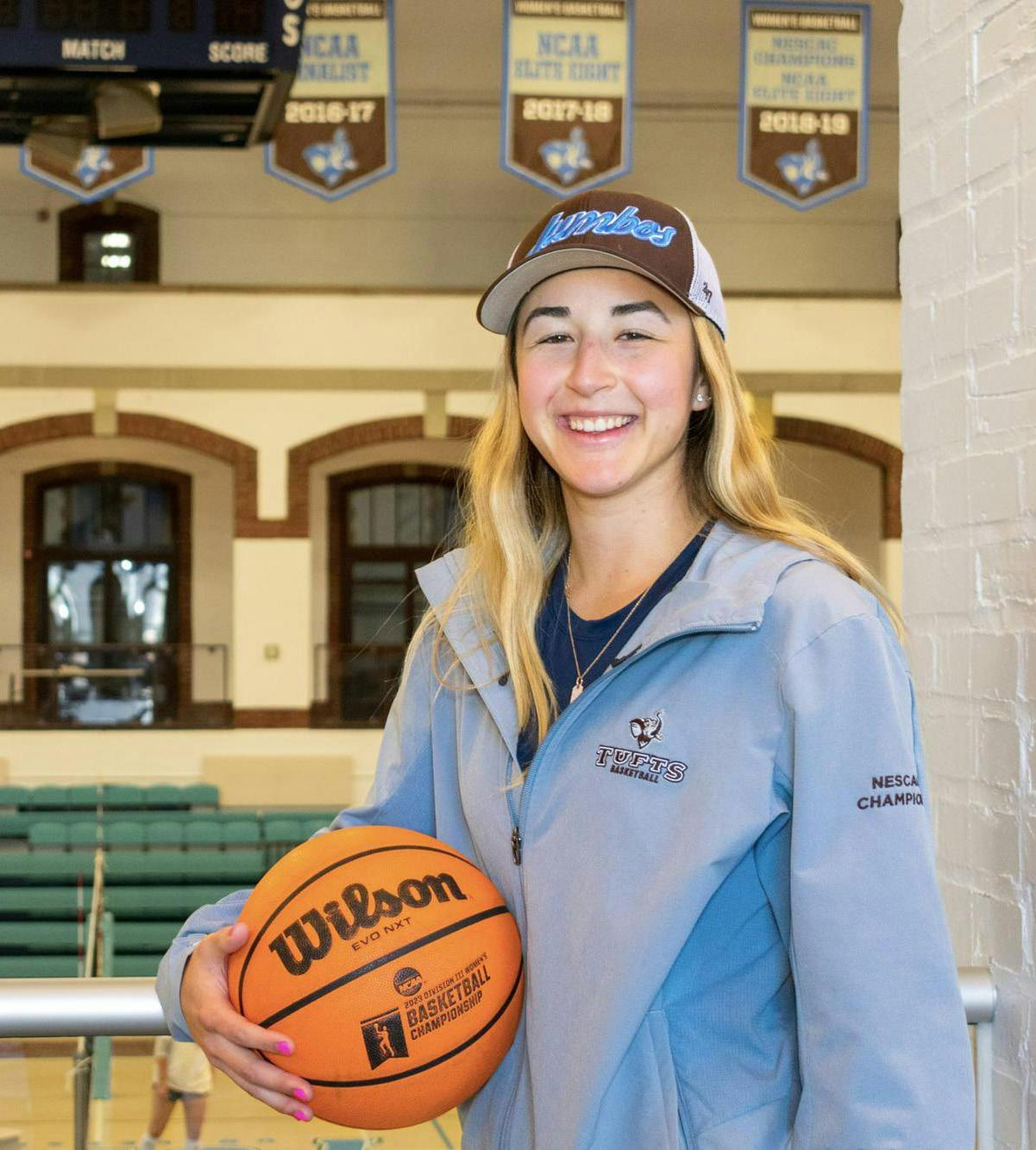
while the team faced more difficulties in her final two seasons, Gonzalez continued to enhance her play, adding additional elements to her game. As a junior, she increased her creativity, averaging 1.8 assists per game, a career high. In her senior year, she once again made a massive jump on both sides of the floor, recording a career high 13.4 PPG, 6.0 RPG and 58 steals, while moving herself into the top 20 in program history in points, 3-pointers made and free throw shooting percentage, earning All-NESCAC First Team honors and being named to the D3hoops. com All-Region 1 second team. w hen looking back and reflecting on her place in the record book, Gonzalez looked at the other names on the list, pointing to Jumbo legends like Maggie Russell (LA’24) and Erica DeCandido (LA’20), and said, “I’m very proud. It’s a very relieving feeling that my work, after four years, has put me in a position to be in that list at all, because I’ve looked at the list before [and] those are the greats of the greats of Tufts [women’s] basketball. And while personally, I know I’m great, I don’t think that I’m up there, but it’s amazing to even be considered that I’m on that list after the countless hours that I’ve put into the sport and [the] dedication that I put [into] this team.”
One way that Gonzalez was able to quickly adapt to life on the East Coast was by building strong bonds with the other members, especially graduate student point guard Callie O’Brien. The two developed a unique tradition that quickly grew a life of its own: TikTok.
As Gonzalez tells it, “ we had made a joke TikTok in the locker room, before our first practice, and then me and Callie, just kind of bonded. [ we were] like,
minutes, Gonzalez was able to gain a lot of knowledge and experience from the upperclassmen on the team, learning “how to bring people together and how to make sure that the team is cohesive” — skills that would prove valuable in her later years.
After a year spent on the bench, Gonzalez went back to California after her firstyear campaign with a mentality that “I’m going to work so hard that there should not be a reason that [head coach Jill Pace] shouldn’t be playing me.” To do so, she worked out “two, three times a day, every single day, basically, over that summer” and made a dramatic
Just as she did, the team as a whole made a giant leap in the 2022–23 season, winning 24 games for only the 10th time in program history, including winning the NESCAC regular season title with a buzzer-beater win over Trinity on Senior Day. The two teams would meet again on the Cousens Gym floor two weeks later in the NESCAC championship game, with the Jumbos looking for the divisional crown. In the biggest moment of her career, Gonzalez stepped up, making three triples and scoring 15 points as the Jumbos clinched the NESCAC title and cut down the Cousens nets, in what she called “one of the most exciting moments of my life.”
would respond with a 21–6 run to close out the game and end the Jumbos’ terrific campaign. Gonzalez still remembers the game vividly, describing it as “the coolest moment I think I’ve had here at Tufts. I vividly remember how many people were there, and that is something that I always think about whenever I go to shoot at Cousens. … I think that it really made me feel that it wasn’t a [Division] III basketball game; it felt like it was really real. Also, to be able to say that you made the Elite Eight is something else that’s really just incredible to say.”
Before finishing her interview with the Daily, Gonzalez gave one last piece of advice to the teammates taking the mantle from her and the other members of the Class of 2025: “All gas, no brakes. Just know that there’s no better time than now to just keep pushing and working hard because at the end of the day, you’re going be a senior, and you’re going to be graduating and probably never playing a legit collegiate basketball game again, so there’s no reason to not try as hard because you don’t get another opportunity to do it.”
As for Gonzalez, while she might not get another opportunity to be a collegiate basketball player, she will always remain in the Jumbo record books as a name to chase from beyond the arc. If someone wants to pass her, there will only be one way to get there: all gas, no brakes.
A lone white shirt wrestled through a sea of defenders, deftly maneuvering the ball while shrugging off a host of aggressive tackles. Despite his shirt being pulled, the young 5-foot-6-inch winger was unfazed, keeping balance and gliding past his markers before threading a pass to graduating senior forward Anthony Bhangdia, whose shot was deflected back into play and into the path of the tenacious winger who pounced on the loose ball and buried it in the bottom right corner.
1–0 Tufts. The deadlock was broken in a fiery NESCAC semifinal against Middlebury. This was graduating senior midfielder Ethan Feigin’s first goal for Tufts, a moment that inspired an injury-ridden team to the NESCAC title in 2021. Seventy-one games later, Feigin prides himself on the same bravery, dedication and confidence that his memorable career opener was built on.
“For that goal, there were four [first-years] on the pitch at the time, and we were the ones who passed to one another and got the ball up to him, and he was the one who put it in the back of the net. It was electric,” graduating senior defender Owen Denby wrote in an email to the Daily.
when asked to describe his teammate, Denby pointed toward Feigin’s inspiring attitude and style of play.
“The two words I would use to describe him are dynamic and extremely hardworking,” Denby wrote. “Ethan was a menace on the ball, and we all knew that his favorite part of the game, and what he was probably best at, was taking defenders on 1v1 and getting the best of them.”
Denby further praised Feigin’s defensive work rate as a winger, emphasizing his ability to track back and recover the ball. As a player who excels in tight spaces and taking on defenders in the final third, transitions often offer wingers respite, allowing them to slowly jog back into action. Feigin, however, would press aggressively without the ball, often tracking opponents deep into his own half.
A hallmark of Feigin’s game has always been his dribbling prowess, a skill he developed early on in his playing days. As a smaller player, Feigin was aware of his strengths and looked to similarly built professionals for inspiration. Some of his early memories of the beautiful game came from watching his older siblings.
“I have always had a similar style of play, being one of the smaller players on the team from a young age, I had to rely on technique and soccer [IQ] which are two things I pride myself on to this day,” Feigin wrote in an email to the Daily. “My early memories of soccer were mostly kicking a ball around on the sidelines of my older siblings’ games,
just wishing I could be out there playing with them.”
Much like his favorite player, Eden Hazard, who terrorized defenders across Europe for more than a decade, Feigin’s strength on the ball is a major skill he carries with him. Being able to strategically place his body between defenders while alternating feet with soft touches is a skill he has built from years of practice.
“I always tried to model my game after him and I constantly copied the things he did while playing in the backyard or playing around with friends,” he wrote. “Naturally, [Lionel] Messi was also a massive inspiration as he was dominant for so long and loved to dribble, which is something I always try as well.”
Feigin discussed his mental growth as a player over his Tufts career, citing early experiences that shaped his mentality going forward.
“I think I’ve evolved a lot mentally as a soccer player over my four years at Tufts. Coming in to school, everyone is used to being one of the top players on their club or high school team, but then suddenly you have to reprove yourself every single day,” he wrote “I remember one of my first practices, one of the older players tackled me hard in practice and I went flying to the ground, sitting there thinking ‘wow, this is going to be a rough time.’ As I got more comfortable, and smarter with the ball, I was able to work around these problems.”
Despite first-year nerves, Feigin fondly recalls many early memories and impressions of the program, emphasizing the bond he felt with his team from the first day he set foot on campus.
“while soccer was incredibly important to everyone, I think the biggest difference between club soccer and college soccer is the off the field brotherhood that develops,” he wrote. “From the first time I stepped foot on campus, I realized how much the small moments really mean – team meals in Dewick, [FIFA] tournaments, locker room celebrations, even just hanging out together, those are some of the best times.”
One of Feigin’s pieces of advice to younger players in the program is to enjoy every little moment and to be the best teammate possible at all times. Denby reiterated the importance of the team’s culture and the role Feigin played in maintaining it over the years.
“Ethan also loves to have a good time and is someone who really understands that the culture of the Tufts Men’s Soccer Team is just as, if not more important than the actual soccer — he is one of the biggest proponents of this,” Denby wrote.
w ith eight goals and 10 assists, Feigin’s creative playmaking ability is second to none. The winger strives to create an impact in all of his games and possesses stunning
passing accuracy that opens up space beyond opposing defenders.
Alongside his teammates, his coaches have been pivotal to his development as a player both on and off the field. Feigin holds deep gratitude for his family’s sacrifices and support in his athletic journey.
“From the start, my parents and family … have allowed me to pursue soccer, even making the 8-hour drive from DC on multiple occasions each season,” he wrote. “On the field, I couldn’t have ever had success without amazing teammates around me and a great coaching staff. Each and every player I have been teammates with has helped me in some way, whether on the field or off, and for that I am incredibly grateful.”
Some of Denby’s fondest memories with Feigin include studying abroad in Spain and experiencing some of Europe’s elite teams from the touchline. The senior defender also praised Feigin’s leadership this year, emphasizing his motivational presence to others despite carrying an injury.
Going forward, Feigin will be working in finance in Boston and is excited to see the team’s evolution in the coming years. There’s no doubt his presence will be missed and his legacy fondly remembered by everyone who had the chance to catch a glimpse of Tufts’ very own No. 23.
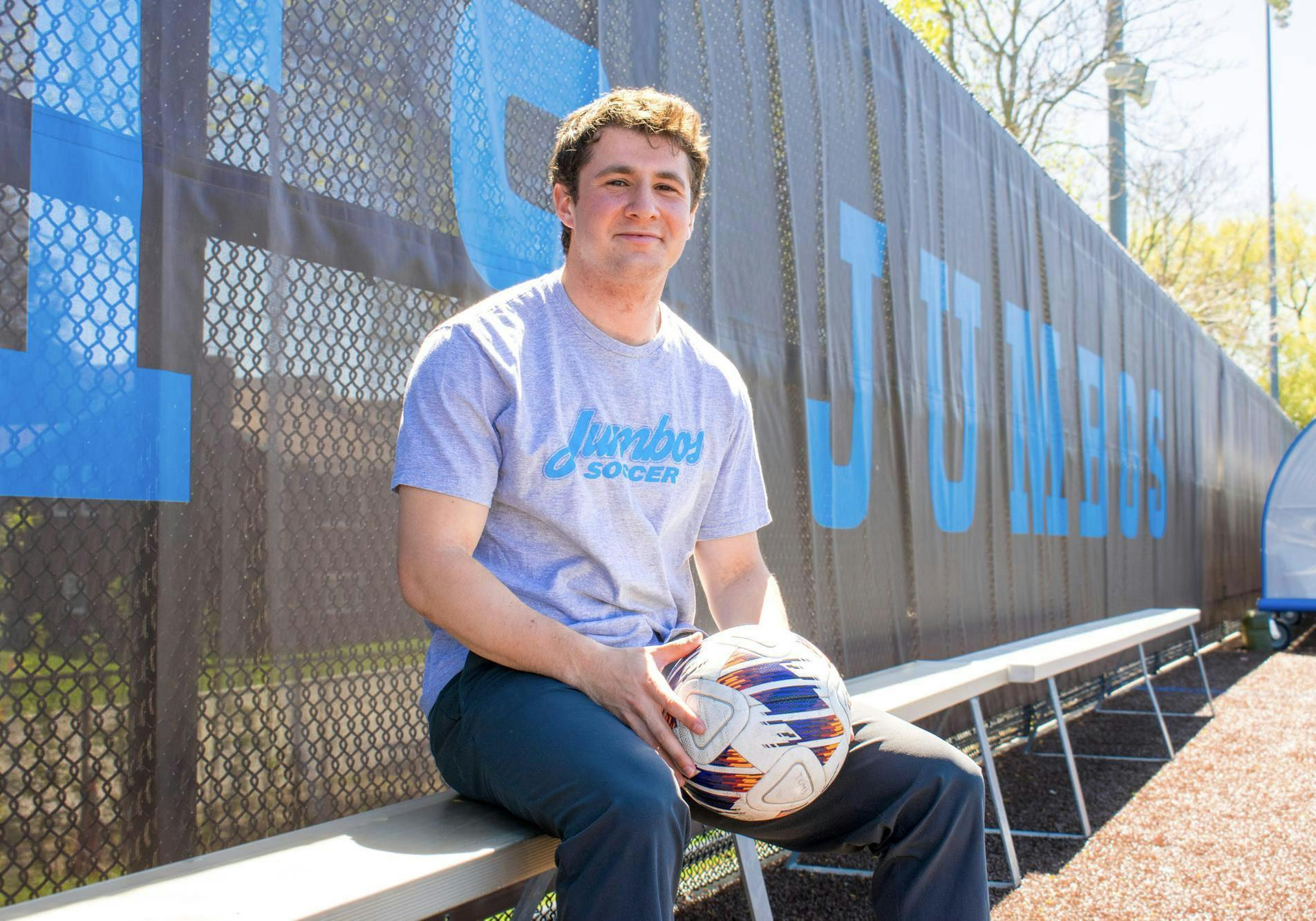
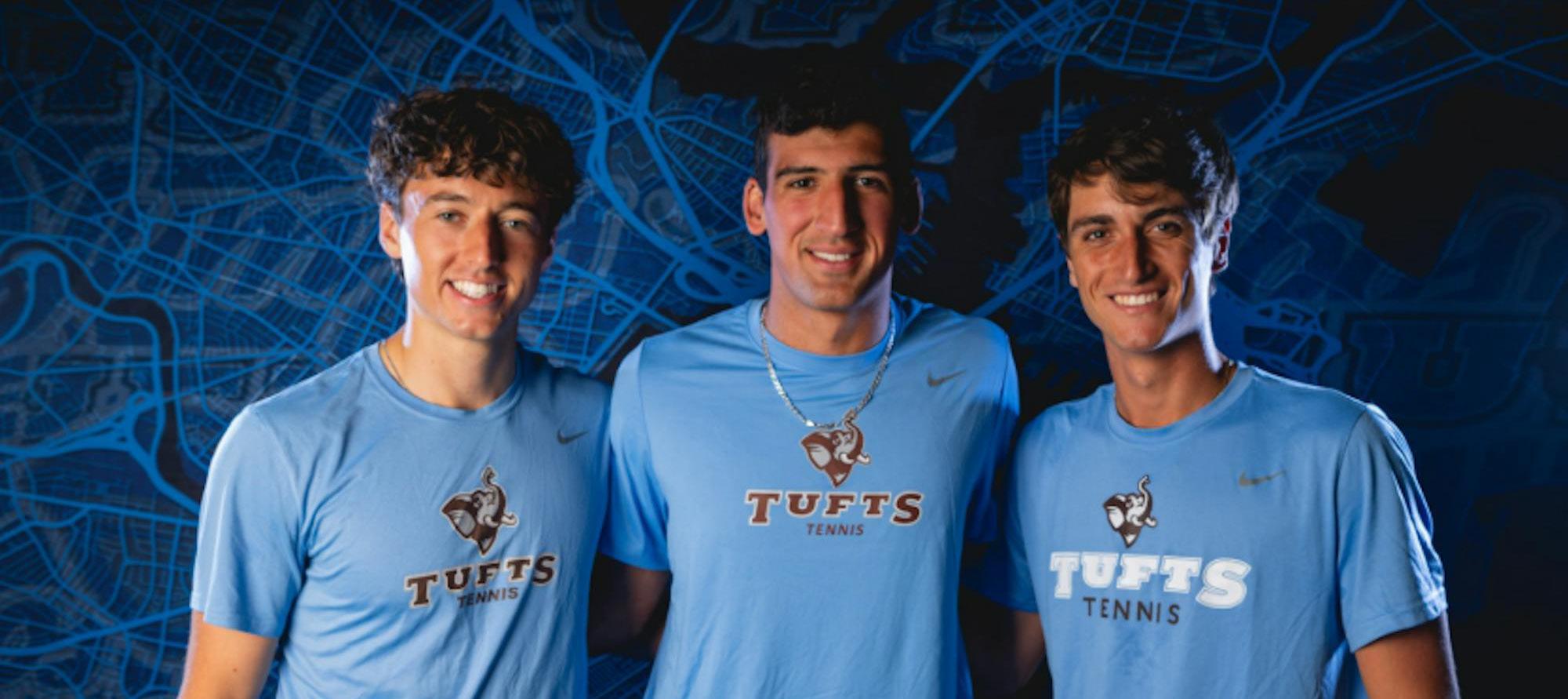
Vuksanovic credits much of his training drive to a competitive team environment.
After graduating, Acaroglu is staying in the United States for work, a decision grounded in the community he built here.
For Tufts men’s tennis graduating seniors Vuk Vuksanovic, Derin Acaroglu and Lachie Macintosh, the past four years have been about more than sets, stats and standings. Together, they’ve helped build one of the most competitive tennis programs in the country, and along the way, they’ve grown into leaders, teammates and friends whose legacy will be felt long after their last matches are played.
A big change
If you ask Vuksanovic to recall the earlier stages of his Tufts journey, he starts with disarming honesty: “when I came to Tufts, I really didn’t care about tennis. I really just used tennis to get into Tufts, even though my grades were good. So once I got in, I didn’t care about … my contribution to the team.”
He explained the other mental aspects of his formative period: “I wanted to be a fun guy to hang around, but nothing on the court. … I loved to complain, especially when we were at practice. … Nothing to discourage anyone, but more just [to] get laughs out of guys.”
Over time, that changed. By junior year, Vuksanovic had stepped into the role of captain and redefined what leadership meant to him. “I needed to be more serious to the guys because what I do is what other guys are going to do in the future. If I set a bad example about complaining … then people are going to pick up on it. So I needed to dedicate my time and commit to changing my personality a lot,” he said.
Vuksanovic’s evolution didn’t go unnoticed by teammates. “Vuk’s grown massively,” Macintosh said. ”[He’s] always had this fun playboy side to him. Still has it. But one thing that he’s really developed is his leadership; this more serious and headdown mindset has come on. … He had his capstone project the other day, and … it was so great. I mean, I don’t think we’re that surprised. It’s just comparing him to his [first] year. … It was really impressive.”
Acaroglu echoed the sentiment: ”[His first] year, his main goal, let’s say, was not tennis. He certainly liked to enjoy himself off the court. But senior year … he didn’t go out once [and] was really, really focused, and obviously that brought him a lot of success. … He always worked hard. But I think he realized that tennis was what he wanted to do. … And yeah, you saw what he did. He won regionals.”
“Guys wanting to play, it really gives you motivation. … Sometimes, I like to beat my own teammates rather than, like, beating someone else,” Vuksanovic said, laughing. “It gives me pleasure to let them know that I’m the best guy on the team.”
But, Vuksanovic admits, the most memorable moments with the team happened off the court.
“It’s genuinely like the experiences, memories that we create with each other outside of the court that really get to me,” he said.
The Acaroglu way
If Vuksanovic brought the flair, Acaroglu brought the foundation.
“Day in, day out. He’s always working. He never really complains about his work,” Macintosh said. “we have this funny saying, that it’s just like the Acaroglu way, that you don’t really question it; you don’t think twice about things. You just do it.”
That unshakable mindset powered Acaroglu through one of the most consistent careers in program history. “My sophomore season, I went undefeated in the regular season,” he said. “That was pretty cool, just to be able to consistently win matches. … Me and Vuk came runner-up in the [Intercollegiate Tennis Association] doubles [rankings] in the fall of my sophomore year.” In his sophomore year, Acaroglu impressively boasted singles wins over No. 3 Middlebury, No. 3 Claremont-MuddScripps (ranked later in the season) and No. 1 Case western Reserve University, regularly defending the three and four positions.
But Acaroglu says his real development wasn’t all about winning. ”[My first] year, when it got deep, late into the season, I was mentally a little bit burnt out, and I had to learn from that experience,” he said. “I think I’ve been able to be mentally tougher and to handle my emotions better, on and off the court. So I think that’s my biggest sign of growth.”
He and Macintosh arrived at Tufts from the United Kingdom. “we sort of bonded over that together,” Macintosh recalled. “I admire how Derin has immersed himself in it and tried to keep an open mind.”
“He’s made some good friends here, me being one of them, but people outside the team too,” Macintosh said.
And what will Acaroglu miss most? “NCAA, Final Four, playing in the national championship — that’s gonna stay with me forever,” he said. “I will miss tennis, but I’ll miss the time that we have to bond outside of the court. And it could just be having a couple of drinks at the house, just hanging out with the guys — that’s what I’m gonna miss.”
Mind over match
Macintosh’s story is one of quiet determination. “I didn’t expect the level to be so high,” he said about his first year. “Played some matches in the lower half of the lineup my first year, in my sophomore year … I was sort of in and out of the lineup at [No.] 5 and [No.] 6, and I was like, screw this. I don’t want to be fighting for spots anymore. I want to be a really solid part of the lineup.”
Macintosh was determined to turn his goal into a reality. “I made a big jump over that summer, played a lot of tournaments, played a lot of tennis, came back, had a good fall, good spring and secured my spot at [No.] 3,” Macintosh recalled.
His effort did not go unnoticed. “Lachie’s one of the hardest working guys I’ve ever met, and not just that, he’s just the epitome of a team guy, and he’ll do anything for his teammates,” Acaroglu said. “He told me, ‘I want to play in the lineup after my sophomore year,’ and he went and he played [No.] 3 the next year. … when he wants to do something, he always gets it done.”
Macintosh recognizes that the discipline and habits he built on the court have shaped how he approaches life beyond tennis.
“I couldn’t imagine my Tufts experience without it. … From figuring out how to change things in my technical game to how to approach certain matches, to how to be with certain teammates, to how to approach coaches … it’s taught me … how to stay committed and to sacrifice things for the greater good,” he said. “I obviously love tennis, so that’s what’s driven me
through all the suffering and gave me some of those high moments.”
Even in academics, he embraced every moment at Tufts.
“I do love classes, honestly as weird as it sounds. I love learning and being lectured. Most of the professors here are really good, and I feel like I’ve learned a lot,” he said. “I’ll miss the day-to-day interactions you get going from class to class, outside your classrooms, within classrooms, dining halls, dorm rooms, … living next to all your friends — the unstructured downtime, that’s something I don’t think I’m going to get in the future. … Tufts has taught me a lot.”
One memory stands out: “[The Intercollegiate Tennis Association National Fall Championships] my junior year was a lot of fun. I had some good wins and fun matches. [The] Bowdoin match last spring was really, really fun and intense on the outdoor courts. we had a lot of people watching, and it was just a really good win and a way to turn our season around,” Macintosh said.
Lessons in leadership
Leadership didn’t come naturally to the three seniors: It was earned.
“we’re all … very extroverted people,” Vuksanovic said. “we all love to talk to people. And I feel like we just like to be the guys who are loved by everyone. Sometimes, especially if you’re captain of the team, you can’t always be loved and can’t always expect to be loved.”
That balance, being both fun and firm, shaped how all three men led. The results of their leadership are reflected in the team’s stellar performances this season: a regular season record of 19–1, undefeated at home and in the conference in the regular season, and ranked No. 1 in the region by the NCAA.
As a graduating senior, looking back, Macintosh framed his leadership as a lesson for others.
“Make the most of your time here because it does go fast,” he said. “Just enjoy yourself. Don’t take things too seriously.”
The final set
Now, the trio prepares for life after Tufts. They feel pride in what they’ve accomplished and emotion in what they’re leaving behind. In their time at Tufts, they’ve been players, captains and friends. But more than anything, they’ve been anchors, steadying the program and each other. As they walk off the court as Jumbos after one final season, they leave behind a legacy of brotherhood, effort and belief — values that will echo for years to come.
Max Druckman, Ilan Tauber, Ben Goldberg and Elliot Smith-Chauss Executive Sports Editor and Contributing Writers
Baltimore Orioles’ Hall of Fame third baseman Brooks Robinson once said, “ whether you want to or not, you do serve as a role model. People will always put more faith in baseball players than anyone else.” For young baseball players who matriculate to Tufts and try out for the club baseball team, it is the squad’s seniors, not the professional players in the lofty heights of Major League Baseball, who serve as their role models. In recognition of those seniors’ immense contributions to the program over their four years at Tufts, some of the team’s underclassmen wanted to pay tribute.
Nolan Mulay
In baseball, the second baseman is usually the shortest player on the field. what they lack in stature, though, they often make up for in attitude, effort and character. Graduating senior Nolan Mulay is no exception. As the Jumbos’ leadoff hitter, Mulay was consistently one of the loudest voices in the dugout. Always ready to cheer on his teammates, his infectious personality and booming laugh kept his teammates engaged and inspired. In a message to the Daily, rising senior and captain Matthew DiFiore wrote, “Nolan’s upbeat personality always kept the mood light and fun at practice and in games. His energy is contagious, and you could always count on Nolan to start a rally and get the guys going. Nolan routinely had the best at bats on the team and set a tone for everyone to follow.” with a smooth right-handed swing, Mulay routinely kicked off games and innings with a leadoff hit. Scorching line drive singles were the norm, often serving as a catalyst for crooked innings. with his glove, Mulay was a vacuum cleaner at second, gobbling up ground balls with ease and turning smooth double plays. He was a key factor in the Jumbos’ 2024 New England Club Baseball Association championship run. Off the field, Mulay studied economics and entrepreneurship, and he could sell the heck out of redemption toys. Hailing from Colfax, Calif., a town of under 2,000 people, he brought a west Coast flair and an unwavering appetite for the game to the team. “His passion for club baseball is unmatched, in a way that makes playing the game with him so much more fun,” rising sophomore Harrison Sternberg wrote in a message to the Daily. w hil e baseball can be stressful and tedious, Mulay always saw the bright side of a game. He showed up to every practice, game and team event with a smile, ready to crack a joke. He made everyone, from the first-years to the seniors, feel included and ready to play. Further, he often offered nuggets of
wisdom regarding academics, on topics ranging from which professors’ classes to take to how to approach a final presentation. The team will surely be less vibrant, energetic and fun without him. Put simply, Mulay is someone that players “love having on [their] team.”
Kendrick Freeman
No championship run is possible without clutch performances by star players. Graduating senior Kendrick Freeman delivered exactly that in helping Tufts Club Baseball secure its first NECBA championship this fall. Between a sliding-catch-turned-double play in the quarterfinals and three hits with four RBI during the semifinals and finals, Freeman’s performance was nothing short of legendary. He graduates from the program as one of the most impactful players in recent memory.
Though Freeman, a right-handed outfielder and pitcher from East Granby, Conn., brings a calm presence, his results are anything but. Simply put by rising sophomore Mathew Long, “His bat did the talking.” A NECBA AllStar, Freeman was one of the most powerful hitters in the league, as well as a Gold Glove defender. In his senior campaign, he recorded a .449 batting average, a .567 on-base percentage and a team-leading .735 slugging percentage. He recorded 22 hits and led the team with an astounding 12 extra-base hits and 27 RBIs. His power was also present in his junior year, as he led the team with two home runs, the most recent over-the-fence home runs to date for the team.
Beyond his stats, Freeman has been a phenomenal teammate and an integral part of the team these past few years. Sternberg reflected that “Kendrick has a quiet confidence that raises our level of play consistently.” His former coach, Eric Epstein, reflected that Kendrick is “one of the most dedicated and loyal guys.” He added that Freeman approached every practice and game with a focused attitude that the rest of the team took their cue from. Rising sophomore Jackson Ehrlich described Freeman in a similar vein, noting his hard work, perseverance and humility.
Rising sophomore Yuv Sakhalkar wrote that, in getting to know Freeman, he’s found him to be “unbelievably kind, easygoing, and authentic.” He added, “I respect the hell out of Kendrick and am definitely going to miss his company.” It is without a doubt that the whole team echoes that sentiment. There will be a huge hole to fill in centerfield as the club team looks ahead to next season. The team is grateful for everything Freeman has brought to the club both on and off the field and wishes him all the luck in the world as he heads to law school next fall.
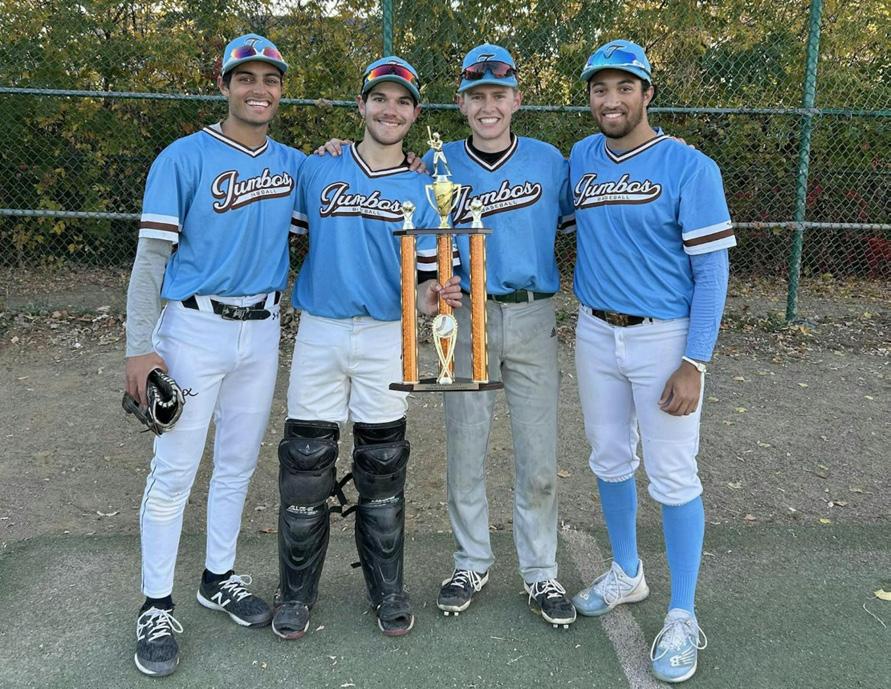
Jacob Messeri Baseball Hall of Famer Miller Huggins once proclaimed, “A good catcher is the quarterback, the carburetor, the lead dog, the traffic cop and sometimes a lot of unprintable things, but no team gets very far without one.” Graduating senior captain Jacob Messeri, affectionately called “JMess” by his teammates, perfectly encapsulates a catcher’s spirit. Messeri embodied reliability and heart. He came to every practice without fail, prepared with the team’s helmets and a bucket of balls, even when his Acura — older than some of the team’s first-years — refused to start. His sociability — seen through digs about Juan Soto joining his beloved New York Mets or personal stories about hitting with Minor League third baseman Brandon Drury — kept practices loose and spurred team camaraderie. On the field, he squatted for hours on end, uncomplaining in spite of claims from the younger players that his old age made him “unc.” In the championship game, playing through a knee injury, Messeri caught all seven innings, calmly guiding rising sophomore pitcher Chris Kwon through the final three high-intensity innings.
Off the field, Messeri served as a role model and mentor for the younger classes. As co-head of education for the Tufts Financial Group, he was responsible for the instruction of new first-year members. writing about Messeri’s role in his Tufts academic journey, rising junior Parker Goodman and current TFG member wrote in a message to the Daily, “I attribute almost everything to him.” Messeri was eager to make new team members feel welcome, frequently offering his home to host team social events. His generosity extended beyond the club members. Long wrote, “Following our intrasquad game, one Jacob
Messeri — sitting behind the wheel of a large white van and sporting a Paul Skenes esque mustache — offered a young neighborhood boy a ride home after his ride fell through.” while Messeri is heading off into the world of New York City finance as an investment banking analyst at Solomon Partners, his presence will undoubtedly be felt in each of the club baseball players who were lucky enough to have shared the diamond with him.
Richard “Dick” Diamond
Nearly every underclassman on the club baseball team has a similar story about their first practice. The first person they met was graduating senior Richard Diamond, and he always took his time to introduce himself and make them feel at home. w hile navigating the role of a player captain is notoriously difficult, Diamond excelled at bridging this divide.
Sternberg wrote about how “the community he brings to this team has made this … into more than just a team for me. … It’s a family, a group of guys I know I can count on.”
On the field, he flourished as the team’s Swiss Army knife, manning positions in both the infield and outfield on his way to a prestigious 2022 NECBA All-Star award. Despite personal success, consecutive firstround losses to Vermont in the 2022 and 2023 NECBA playoffs left him deeply dissatisfied.
Elected captain in his sophomore year, he went to great lengths to grow the team. This effort paid dividends in the fall 2024 season as the Jumbos went 11–1 with a league-leading six mercy rule victories in the regular season. Just as importantly, he served as a welcoming leader and role model for younger players. Rising sophomore wyatt Bolduc wrote in a message to the Daily about a game in which Diamond took a few moments to go “up to my parents and was very nice and
kinda made it a point to talk to them and get to know a little about me.” This small gesture is emblematic of Diamond’s leadership style, in which little efforts combined to create a cohesive team. During the playoff run, he also served a key role, especially in the semifinals against Providence. He went three for four with two clutch extra-base hits and scored the tying run in a comeback win. The next game, he vanquished losses of the past two years, raising the NECBA championship trophy in front of his enthusiastic cadre of fans.
Off the field, Diamond studied data science and worked as a teaching assistant for Computer Science 61. As president of Baseball Analytics at Tufts, Diamond placed highly in multiple competitions, including winning the 2022 Society for American Baseball Research Diamond (no relation) Dollars Case Competition. His competitive nature came out in intramural sports, particularly on the soccer pitch, where he often found himself on opposing ends of the pitch with his baseball teammates. Following graduation, he plans to move to washington, D.C., and wor k as a consultant.
Diamond’s powerful bat and versatile glove will leave a noticeable hole in the lineup. Perhaps more importantly, his leadership will be missed by all on the team. The upward trajectory of the team is largely thanks to his efforts, and the players and leaders he has mentored will be sure to carry on his legacy, both on the field and off.
So, while Diamond, Freeman, Messeri and Mulay may never reach the big leagues, their contributions to the game at Tufts, on and off the field, will be long-lasting. They were, after all, NECBA champions, and you’ll never sing that.
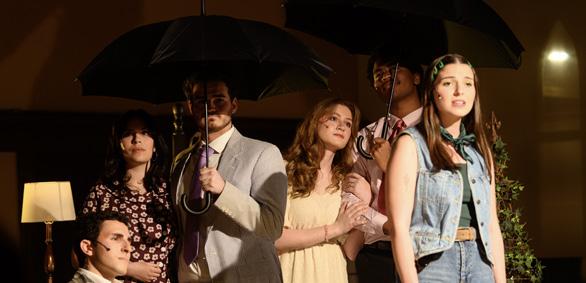
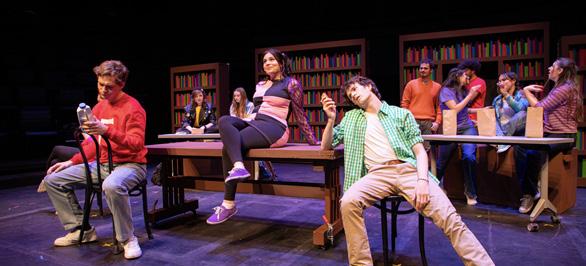
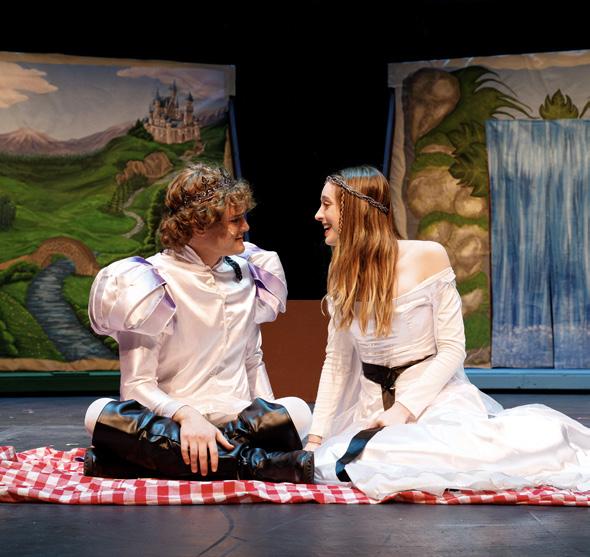
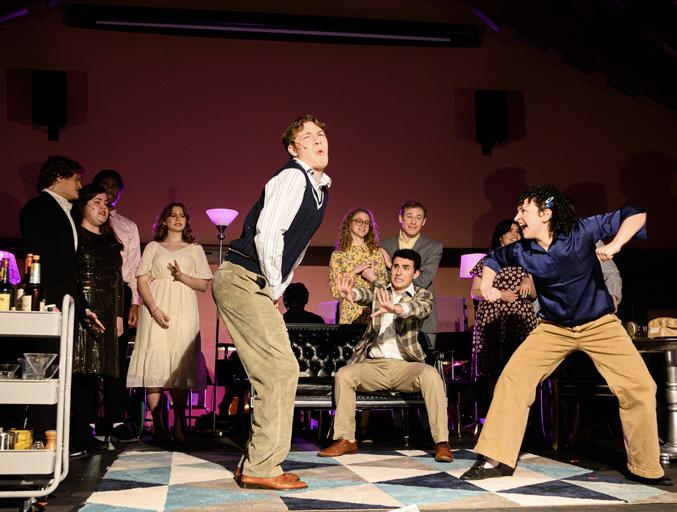
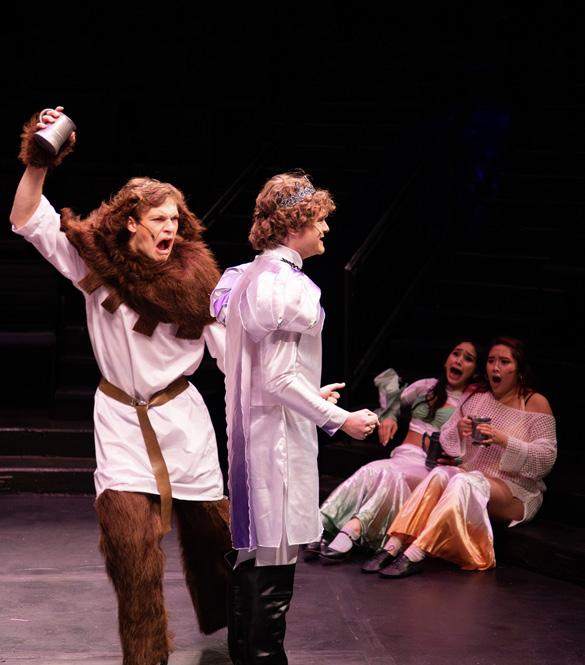
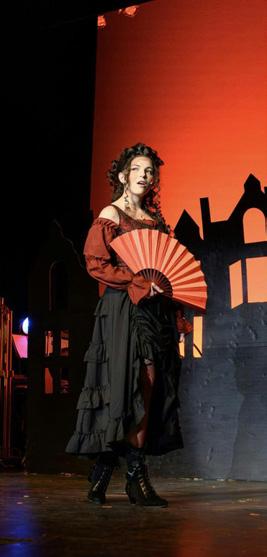

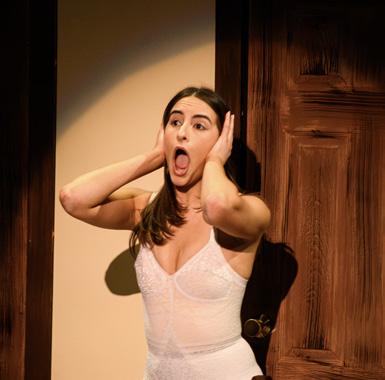
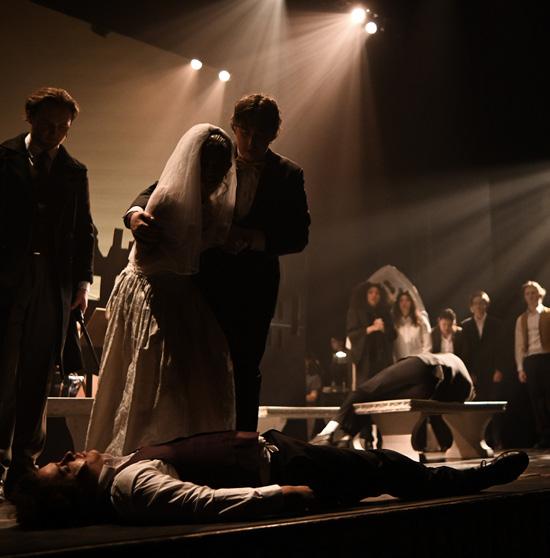
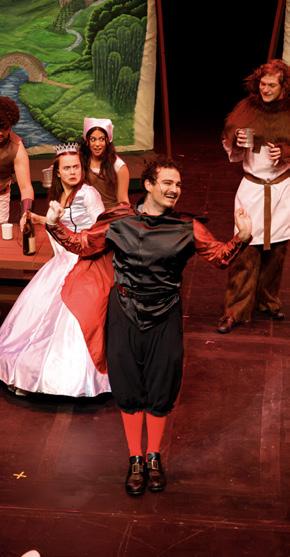
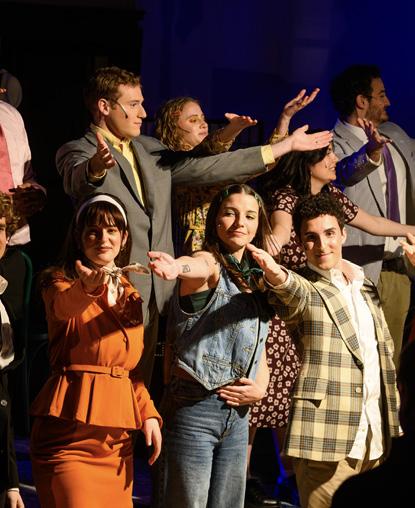
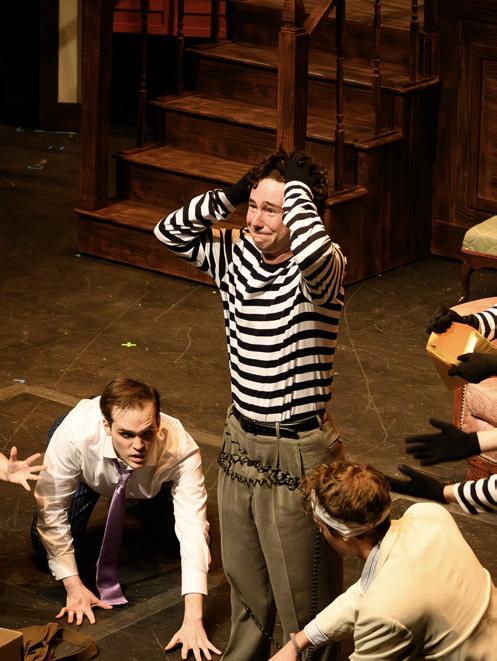
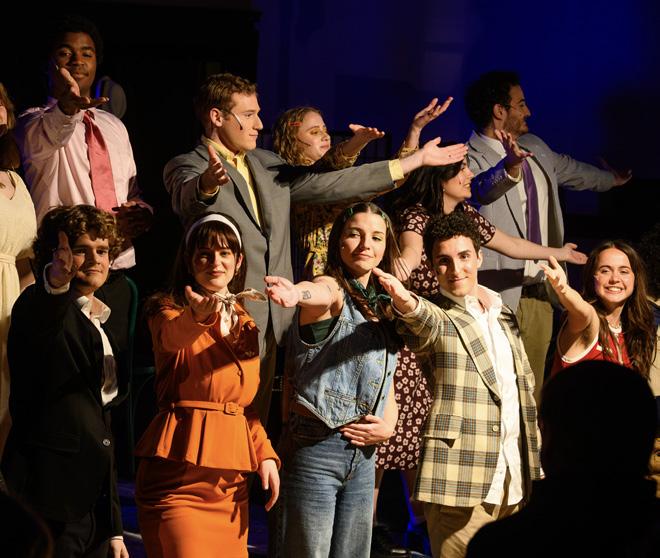
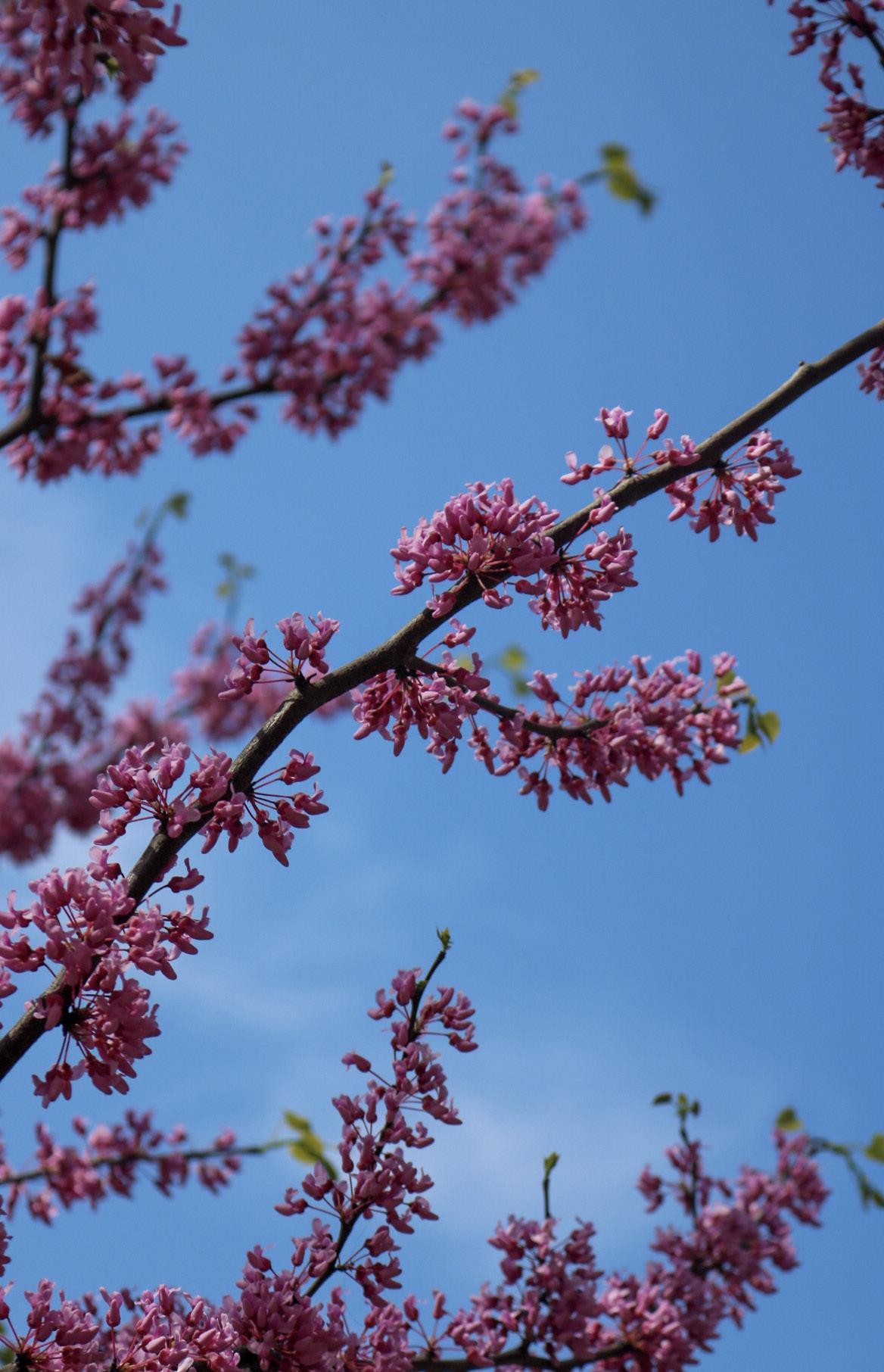
“A bright future beckons. The onus is on us, through hard work, honesty and integrity, to reach for the stars.” - Nelson Mandela